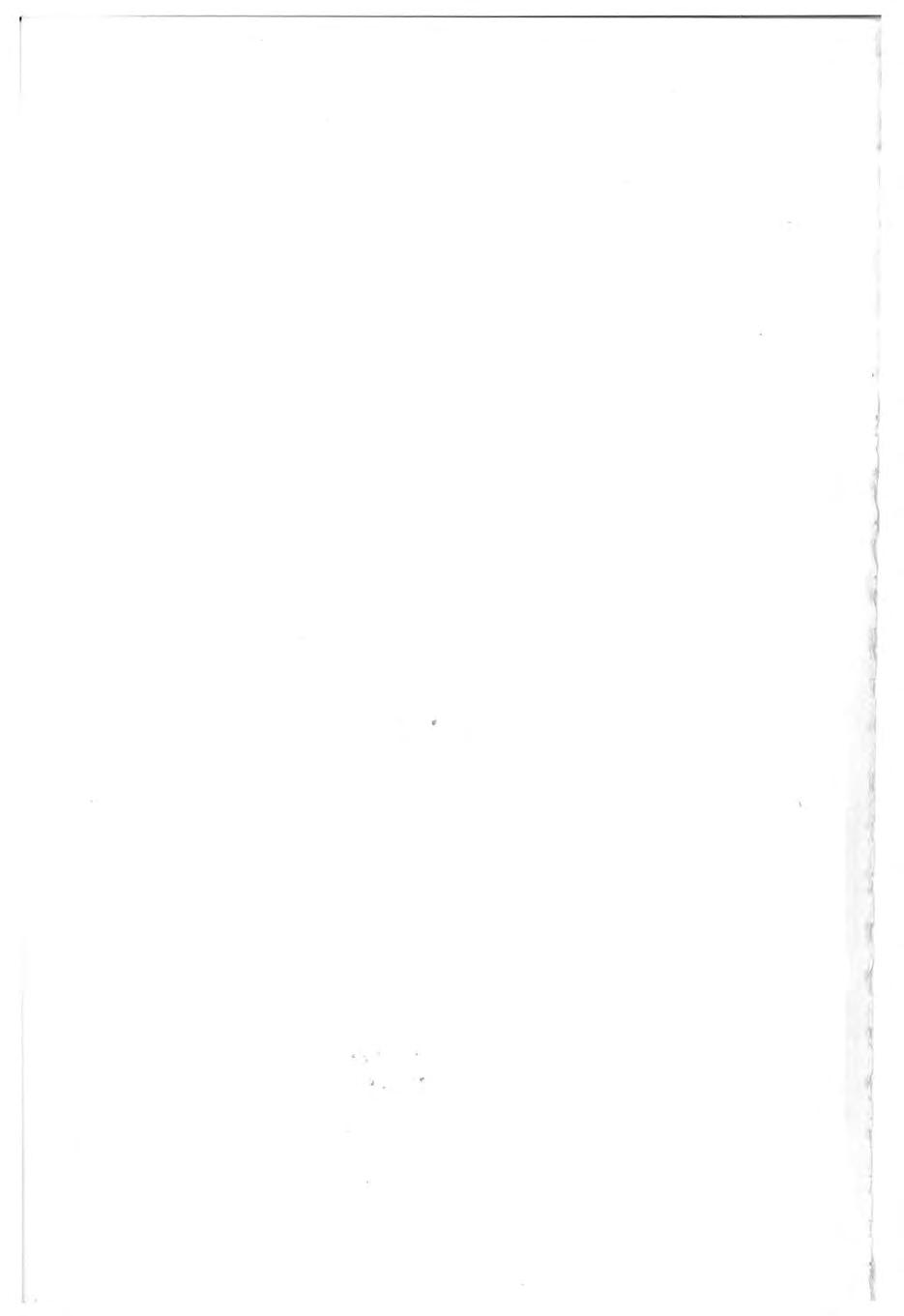PERU STATE COLLEGE
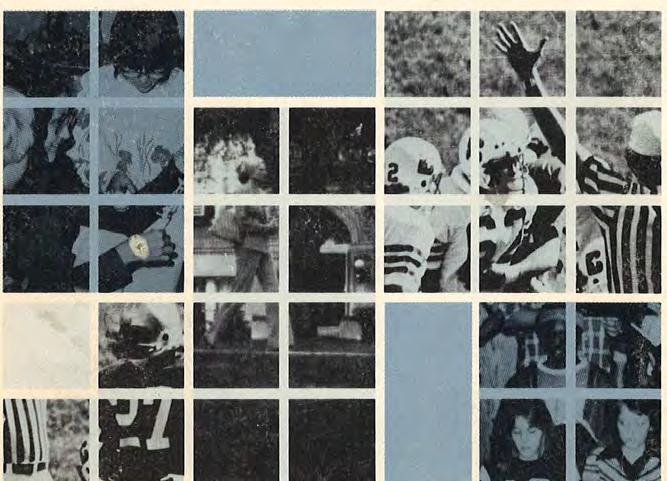
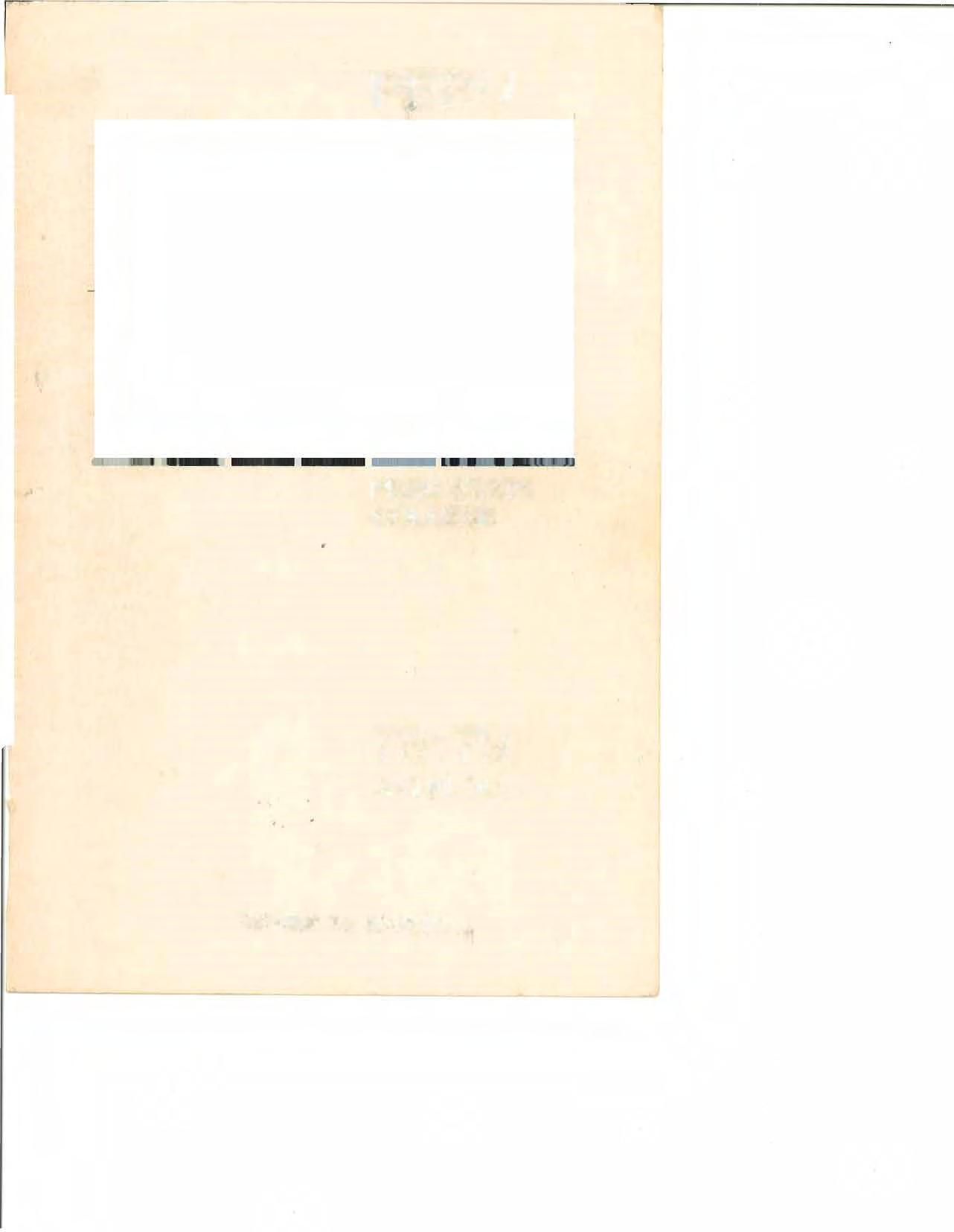
mwwPERu
78-79 CATALOG
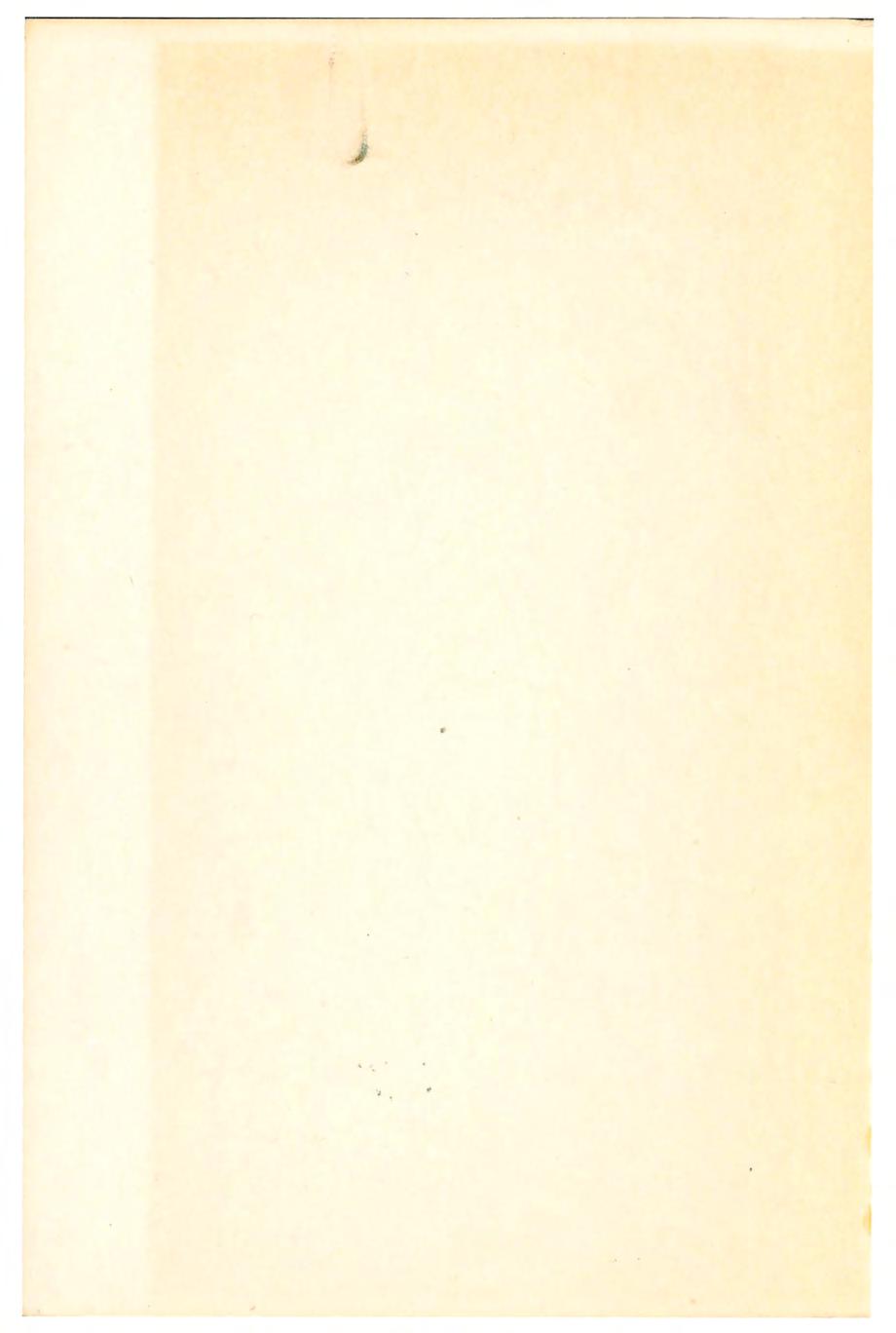
Technology degree.
Directed Electives To Total of 125 Hours: Hours may be selected from general studies beyond the required 30 hours; additional courses supportive of the resident of emphasis or the transfer technical major, or others as directed by the advisor.
GENERAL STUDIES PROGRAM
The purpos e of General Studies at Peru State is to provide undergraduate s with the concepts, understandings, skills, and values necessary for living purposefully in modern society. These studies, emphasizing the relation and unity of basic ideas from the several disciplines, are selected for their usefulness in helping to solve the common problems in both an individual and social context. To establish the unity of knowledge and experience, the distinct courses in general studies share common goals in the sense that they all should promote a spirit of inquiry, rel ate knowledge from various fields, and encourage continued liberal education on the part of the student. Specific courses are held to a minimum, with the intent that students should be encouraged to select those courses most appropriate to their educa tional needs.
OBJECTIVES OF GENERAL STUDIES
1. Promote the student's understanding of his rights, privil eges and responsibilities of particip at ion and leadership in a democratic society
2 Enc ourage intellectual curiosity.
3. Increase the student's ability to apply abstract knowledge to practical and concrete situations
4. Provide the opportunity to understand his interaction with his environment.
5 . Provide opportunity to develop physical, social and emotional maturity.
6. Increase the student's ability to read and listen with critical comprehension.
7. Increase his ability to convey ideas, feelings and / or experiences to others with clarity.
8. Provide the opportunity to establish educational and vocational go als .
9. Encourage the growth of desirable leisure time activities .
GENERAL STUDIES PROGRAM
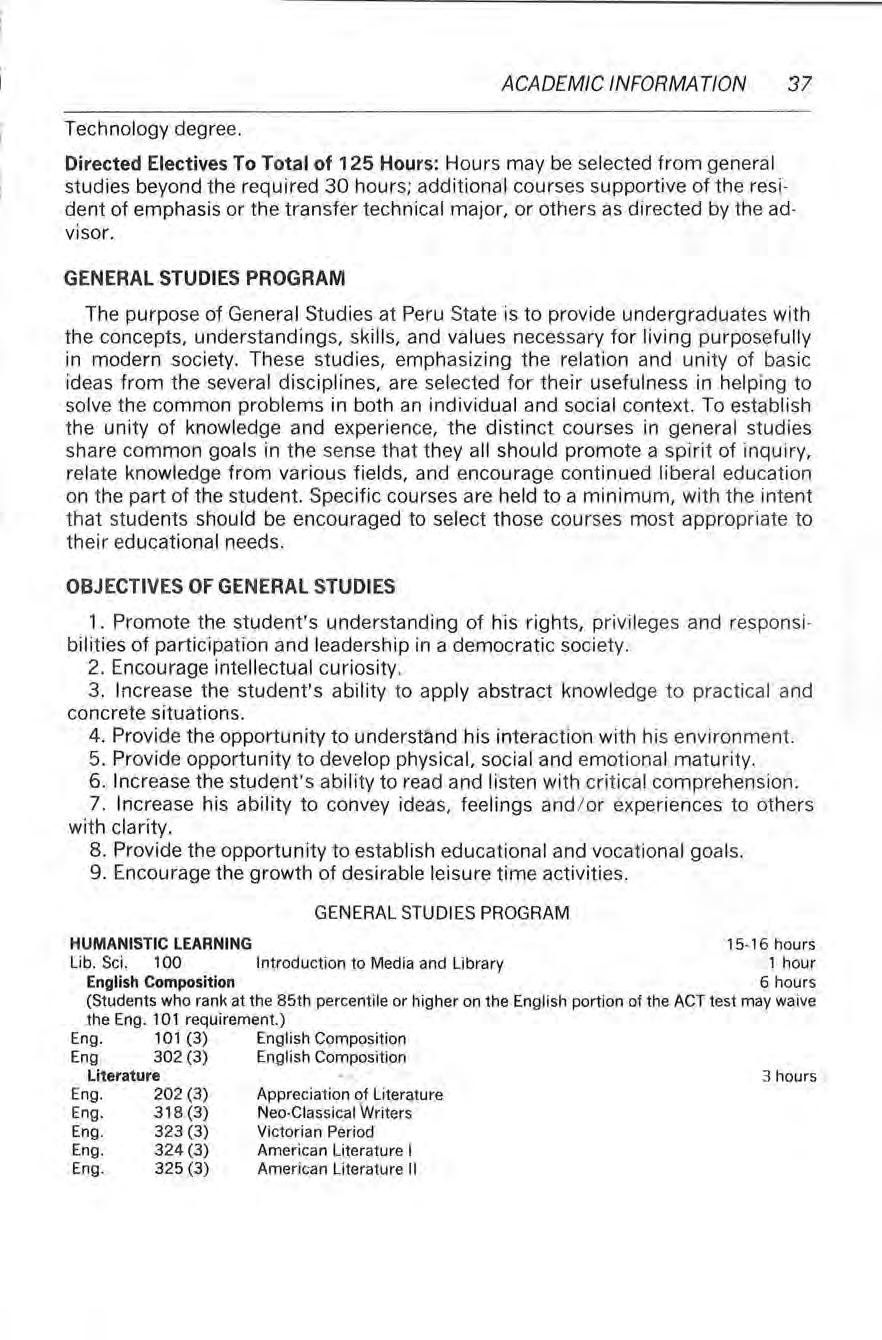
HUMANISTIC LEARNING 15-16 hours
Lib. Sci. 100
Introduction to Media and Library 1 hour
English Composition 6 hours (Students who rank at the 85th perce ntile or higher on the English portion of the ACT test may waive the Eng 101 requirement.)
Eng. 101 (3) English Composition
Eng , 302 (3) English Composition
Literature
Eng. 202 (3)
Eng. 318 (3)
Eng. 323 (3)
Eng. 324 (3)
Eng. 325 (3)
Appreciation of Liter&ture
Neo-Classical Writers
Victorian Period
American Literature I
American Literature 11
3 hours
ACADEMIC IN FORMATION 37
ACADEMIC INFORMATION
Communications
Speh. 152 (3)
Speh 254 (3)
M C 260 (3)
Fine Arts
Fundamentals of Spee ch
Public Speaking Radio and Television Announcing
Art 306 (2) Art Appreciation
Art 317 (3) Art History I
Art 318 (3) Art History II
Education Degree recipients must have completed Pol. Sci. 201 and three hours of American History Social and Behavioral Science (No more than 6 hours in history) Econ. 333 (3) Economic History of the U.S. Geog. 103 (3)
Soc. 340 (3)
P.E . Activities
P.E. 90(1)
P.E. 101 (1)
P E. 102(1)
P.E . 3 (1)
P E 5(1)
P.E. 103 (1)
P E 104(1)
P.E. 4(1)
P.E 8(1)
P E 9(1)
P E. 10(1)
P E 1 (1)
P.E 2 (1)
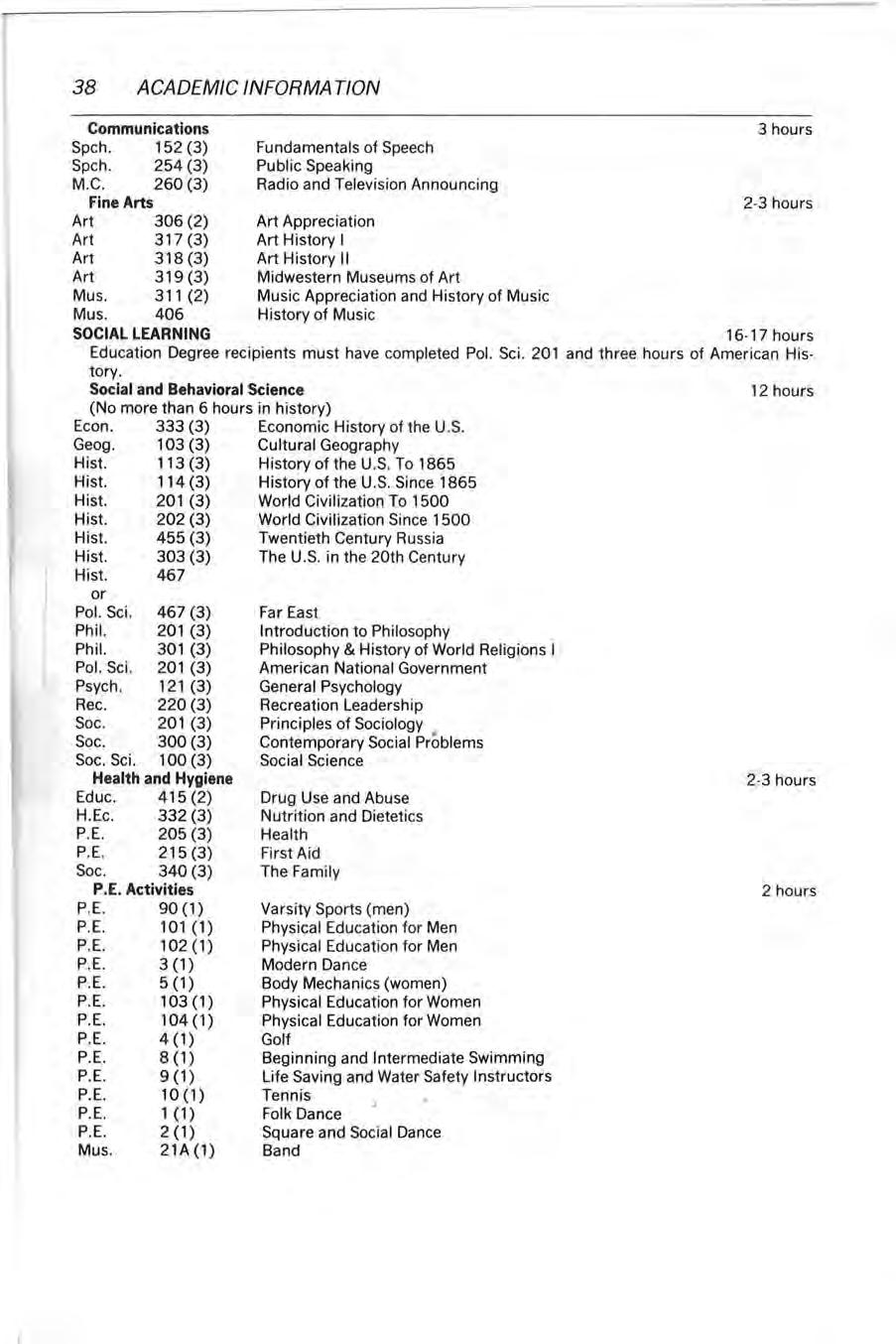
Mus . 21A (1)
Far East
Introduction to Ph ilosophy
Philosophy & History of World Religions I
American National Government
General Psychology
Recreation Leadership
Principles of Sociology
Contemporary Social Pr oblems
Social Science
Drug Use and Abuse
Nutrition and Dietetics
Health
First Aid
The Family
Varsity Sports (men)
Physical Edu cation for Men
Physical Education for Men
Modern Dance
Body Mechanics (women)
Physical Education for Women
Physical Education for Women
Golf
Beginning and Intermediate Swimming
Life Saving and Water Safety Instructors
Tennis
Folk Dance
Square and Social Dance
Band
12 hours
2 -3 hours 2 hours
38
Art 319 (3) Midwestern Museums of Art Mu s. 311 (2) Music Appreciation and History of Music Mus 406 History of Music 3 hours 2 -3 hours SOCIAL LEARNING 16- 17 hours
Cultural
Hist. 201
Hist. 202
World
Hist
455 (3) Twentieth
Hist. 303 (3) The
S
Hist 467 or Pol. Sci. 467 (3) Phil. 201 (3) Phil. 301 (3) Pol. Sci. 201 (3) Psych 121 (3) Rec
220 (3) Soc 201
Soc
300
Soc Sci. 100
Health and
Ec
Geography Hist. 113 (3) History of the U S To 1865 Hist. 114 (3) History of the U S Since 1865
(3) World Civilization To 1500
(3)
Civilization Since 1500
.
Century Russia
U
in the 20th Century
.
(3)
.
(3)
(3)
Hygiene Educ. 415 (2) H
332 (3) P.E . 205 (3)
P E 215(3)
PERU STATE COLLEGE
1978- 79 CATALOG EDITION
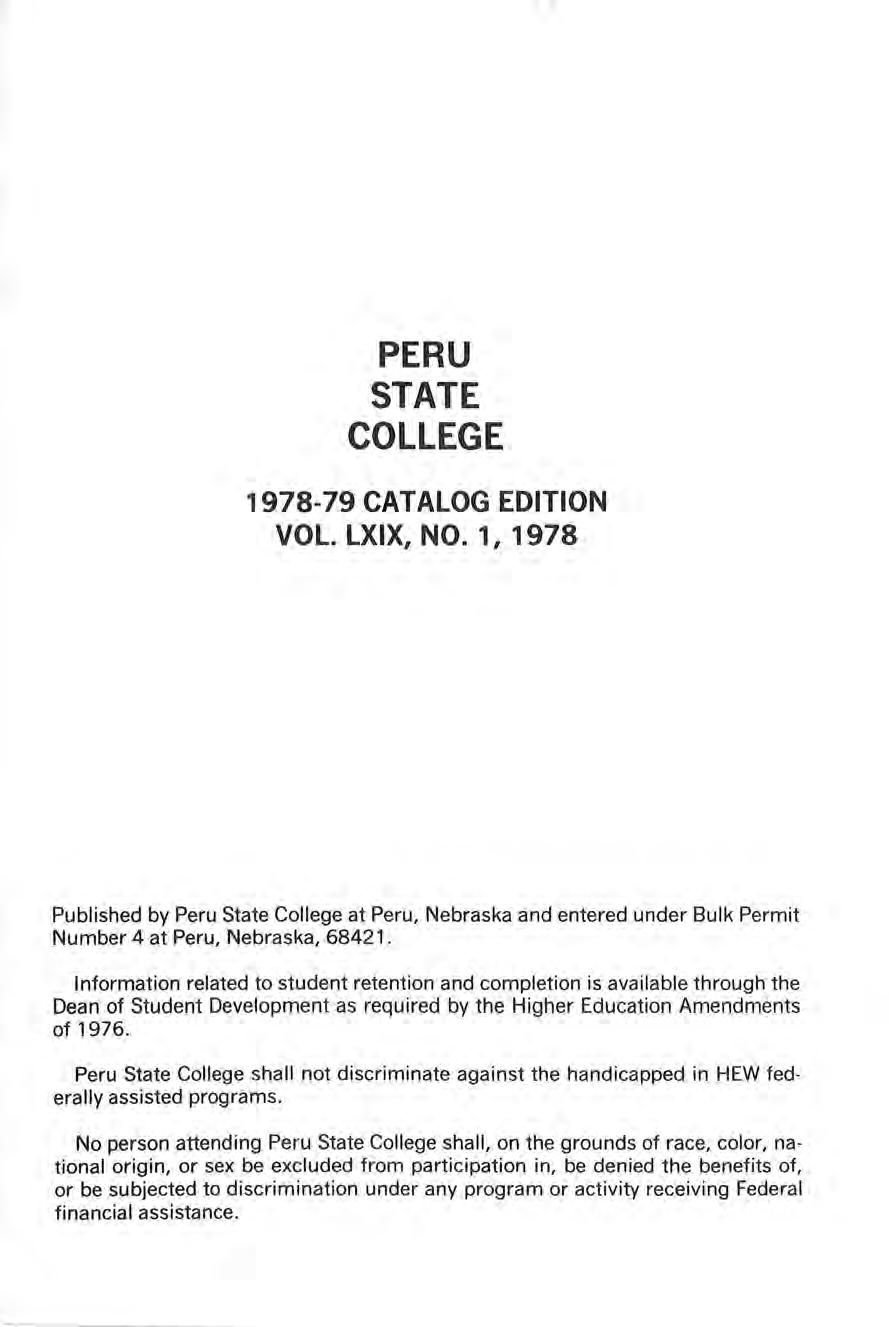
VOL. LXIX, NO. 1, 1978
Published by Peru State College at Peru, Nebraska and entered under Bulk Permit Number 4 at Peru, Nebraska, 68421.
Information related to student retention and completion is available through the Dean of Student Development as required by the Higher Education Amendments of 1976.
Peru State College sha ll not discriminate against the handicapped in HEW federally assisted programs.
No person attending Peru State College shall, on the grounds of race, color, national origin, or sex be excluded from participation in, be denied the benefits of, or be subjected to discrimination under any program or activity receiving Federal financial assistance.
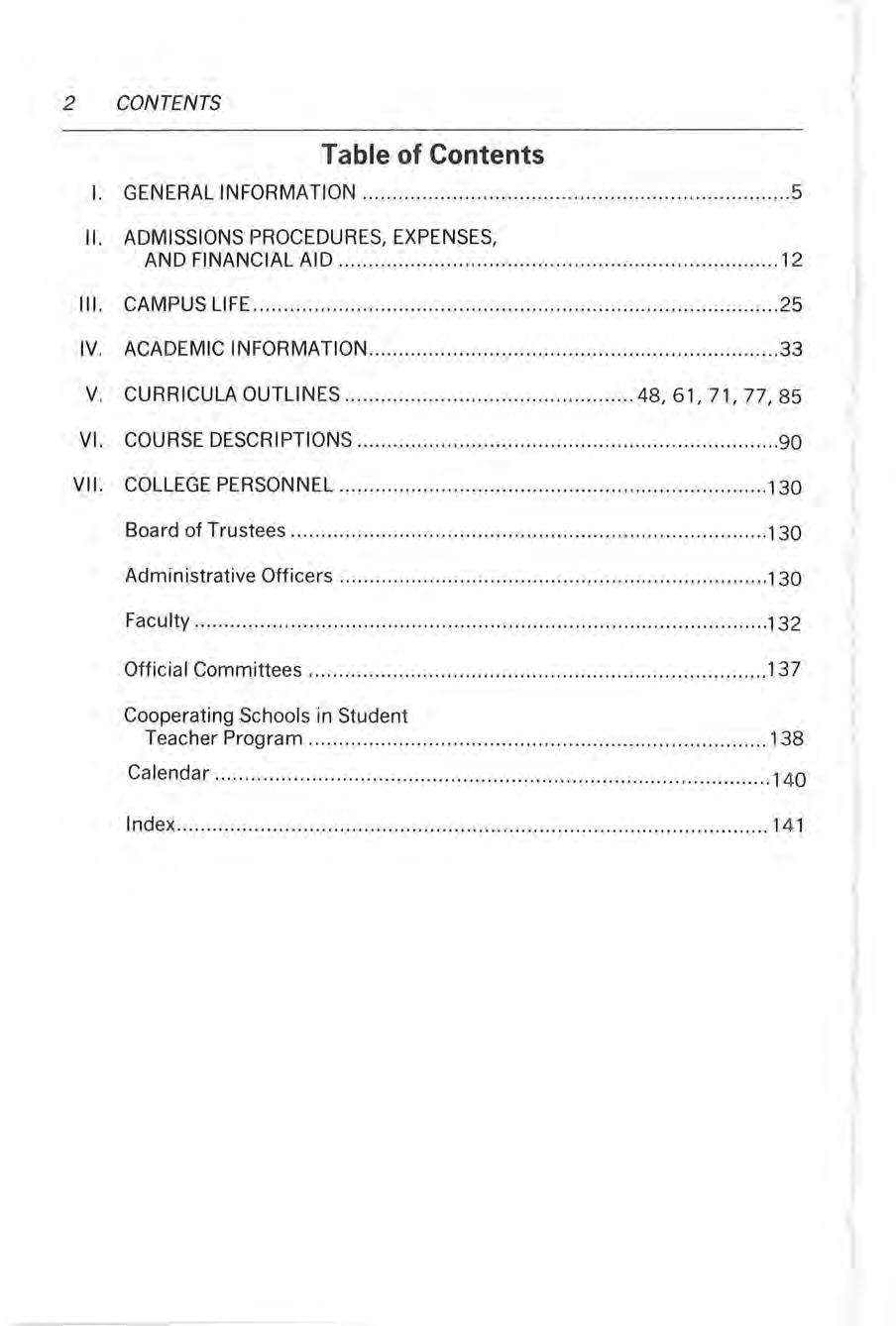
2 CONTENTS Table of Contents I. GENERAL INFORM ATION 5 II. ADMISSIONS PROCEDURES, EXPENSES, AND FINANCIAL A ID . . ...... . .... . . ... ........ . . . .. .... .. .......... .. . ..... .................. . 12 Ill . CAMPUS LIFE ...... . . ... . ....... .. .. .. . ... .... .. . . ... ... . . . ... . ........... .. ..... . . .. ...... .. . .. .... 25 IV ACADEMIC I NFORMAT ION 33 V CURRICULAOUTLINES 48, 61, 71, 77, 85 VI. COURSE DESCRIPTIONS ............. .. .. .. ....... .... . . . . .... . . ... .. .. ... . . ... .. .. ........... 90 VII. COLLEGE PERSONNEL 130 Board of Trustees 130 Administrative Officers 130 Facu lty 132 Off icial Committees 137 Cooperating Schoo l s in Student Teacher Program .... ...... ...... ... ...... ..... .... .. ...... .... .. ... ............. ... .. .... ... 138 Ca lendar 140 Index . ........................ .. . ..... . ...... ... .. ....... .... ..... ...... ... .... ....... ...... .. ... .... .. 14 1
An Introduction to Peru State College
Peru State is the oldest college in Nebraska and the third oldest teachertraining institution established west of the Missouri River. Peru was founded the same year Nebraska became a state For more than a century thousands of young people have crossed the Campus of a Thousand Oaks and have gone forth to become teachers and leaders in busine ss and industry in Nebraska and throughout the nation.
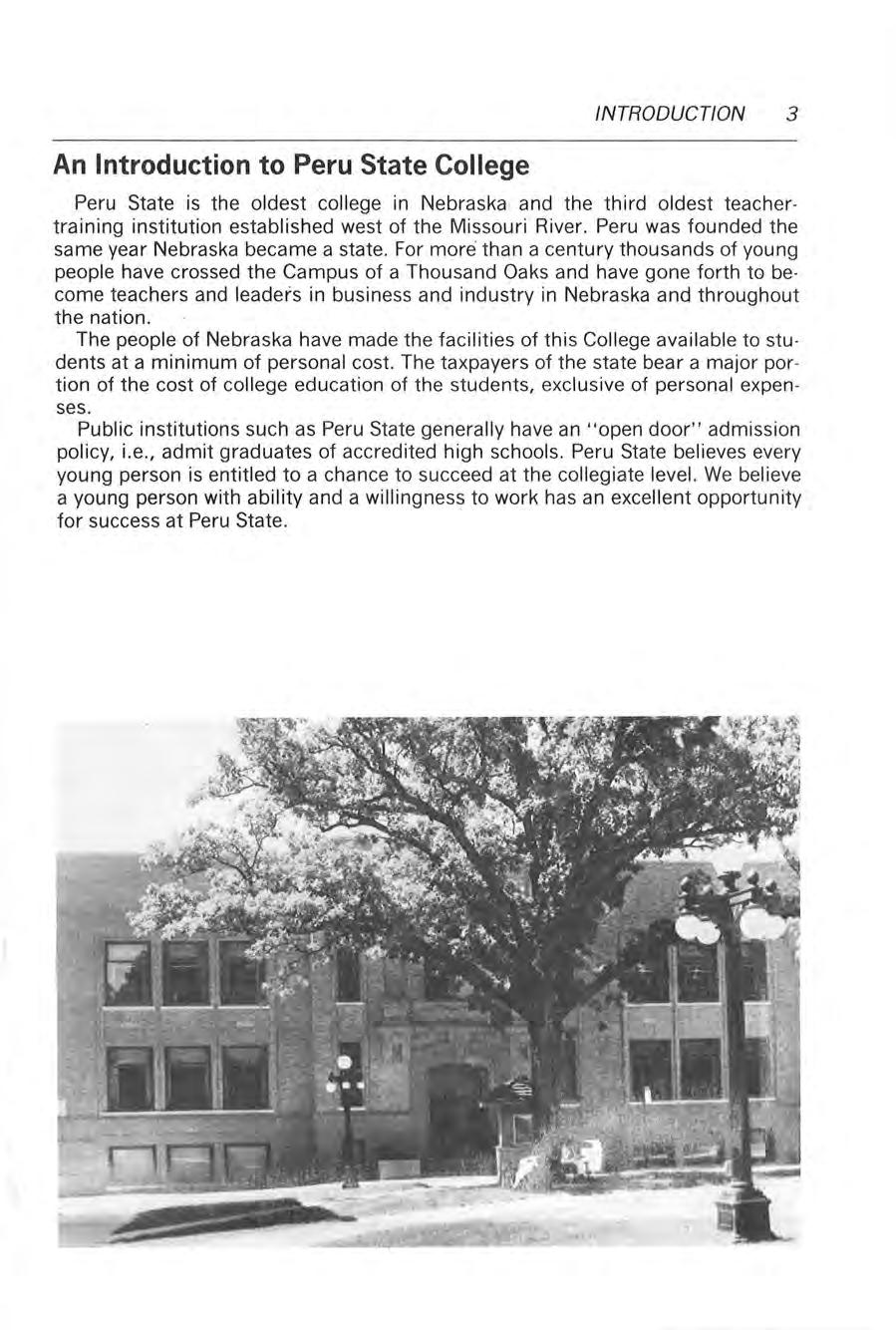
The people of Nebraska have mad e the facilities of this College available to students at a minimum of personal cost. The ta xpa yers of the state bear a major portion of the cost of college education of the students, exc lusive of personal expenses.
Public institutions such as Peru State generally have an "open door" admission policy, i.e., admit graduates of accredited high schools. Peru State believes every young person is entitled to a chance to succeed at the collegiate level. We believe a young person with ability and a willingness to work has an excellent opportunity for success at Peru State.
INTRODUCTION 3
INTRODUCTION
1 n1s College believes in academic excellence, in opportunities for personal growth, and in student self-determination consistent with the principles of a democratically organized society. The administration recognizes that college students are adu lts and should be involved in the decisions made on campus which affect them. The educational experience provided by the College is designed to enable students to learn, equip themselves for meaningful careers, and become productive members of society.
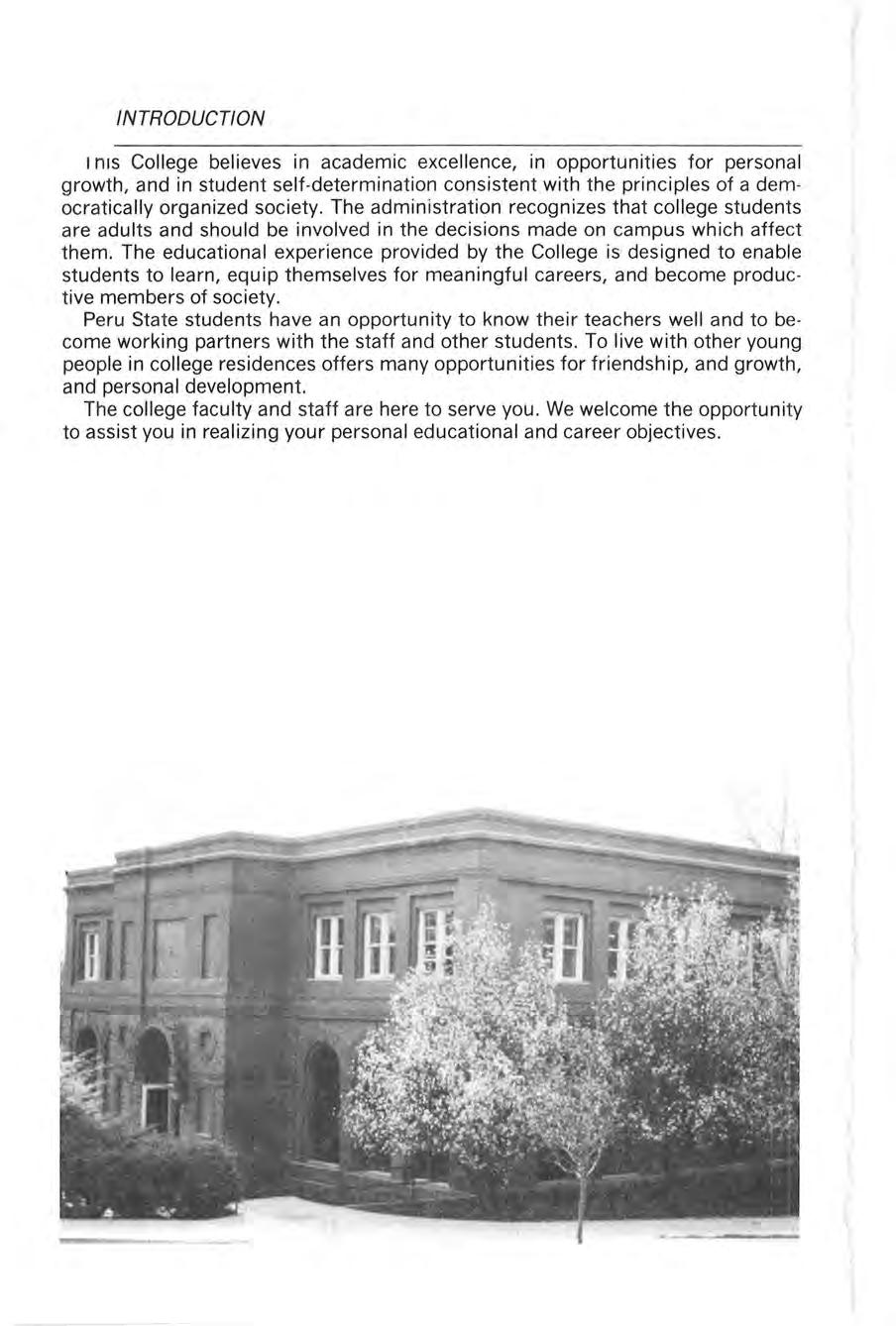
Peru State students have an opportunity to know their teachers well and to become working partners with the staff and other students To live with other young people in college residences offers many opportunities for friendship, and growth, and personal development.
The college faculty and staff are here to serve you We welcome the opportunity to assist you in realizing your personal educational and career objectives.
General Information
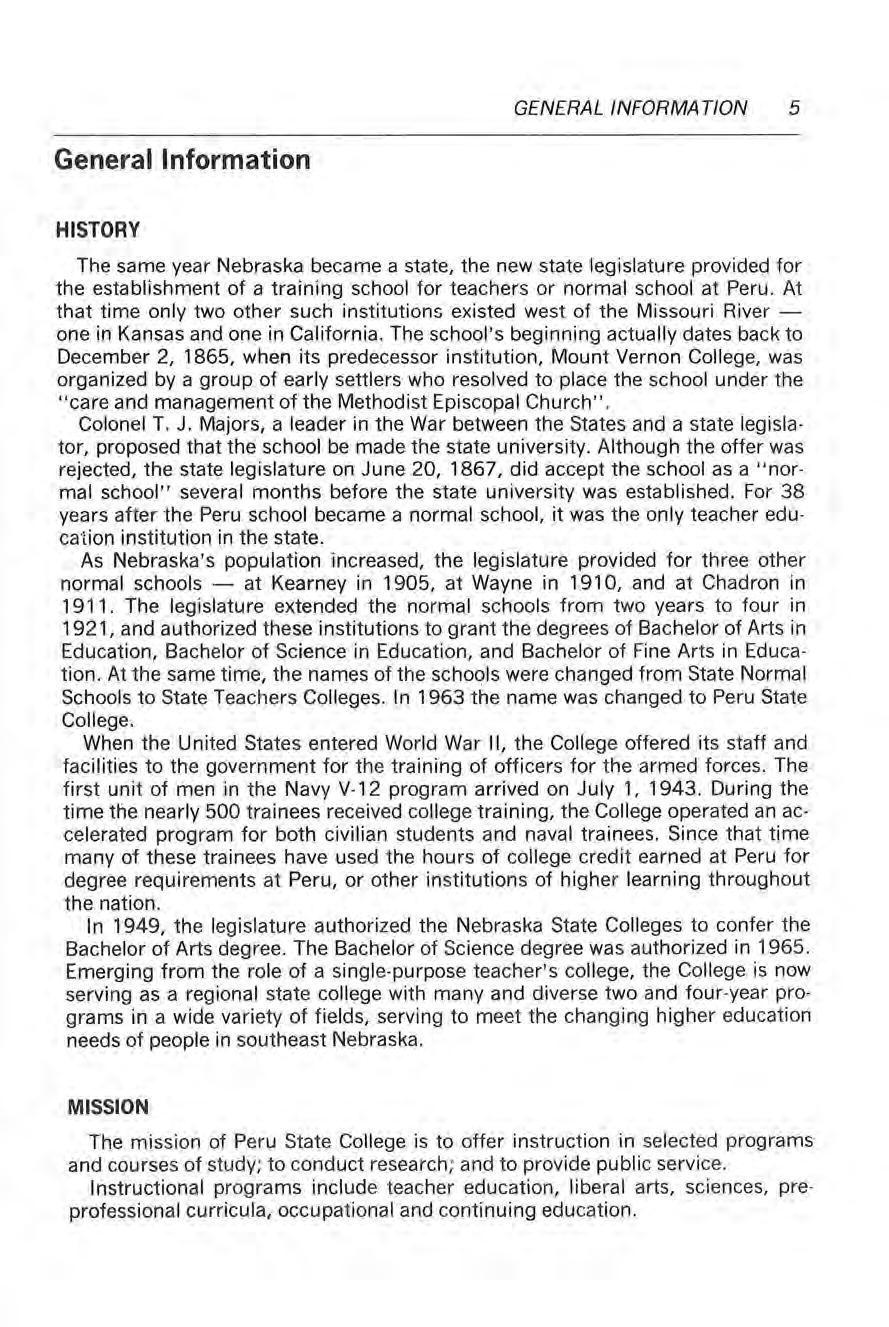
HISTORY
The same year Nebraska became a state, the new state legislature provided for the establishment of a training school for teachers or normal school at Peru. At that time only two other such institutions existed west of the Missouri Riverone in Kansas and one in California . The school's beginning actually dates back to December 2, 1865, when its predecessor institution, Mount Vernon College, was organized by a group of early settlers who resolved to place the school under the "care and management of the Methodist Episcopal Church".
Colonel T. J. Majors, a leader in the War between the States and a state legi slator, proposed that the school be made the state university . Although the offer was rejected, the state legislature on June 20, 1867, did accept the school as a "normal school" several months before the state university was established. For 38 years after the Peru school became a normal school, it was the only teacher education institution in the state
As Nebraska ' s population increased, the legislature provided for three other normal schools - at Kearney in 1905, at Wayne in 1910, and at Chadron in 1911. The legislature extended the normal schools from two years to four in 1921, and authorized these institutions to grant the degrees of Bachelor of Arts in Education, Bachelor of Science in Education, and Bachelor of Fine Arts in Education. At the same time, the names of the schools were changed from State Normal Schools to State Teachers Co lleges In 1963 the name was changed to Peru State College.
When the United States entered World War 11, the College offered it s staff and facilities to the government for the training of officers for the armed forces. The first unit of men in the Navy V-12 program arrived on July 1, 1943. During the time the nearly 500 trainees received college training, the College operated an accelerated program for both civilian students and naval trainees. Since that time many of these trainees have used the hours of college credit earned at Peru for degree requirements at Peru, or other institutions of higher learning throughout the nation.
In 1949, the legislature authorized the Nebraska State Colleges to confer the Bache lor of Arts degree. The Bachelor of Science degree was authorized in 1965. Emerging from the role of a single-purpose teacher's college, the Co ll ege is now serving as a regional state college with many and diverse two and four-year programs in a wide variety of fields, serving to meet the changing higher education needs of people in southeast Nebraska.
MISSION
The mission of Peru State College is to offer instruction in se lected programs and courses of study; to conduct research; and to provide public service.
Instructional programs include teacher education, libe ral arts, sciences, preprofessional curricula, occupational and continu ing education.
GENERAL INFORMATION 5
Research programs create new knowledge and provide a broader intellectual and factual basis for extended knowledge . Pub lic serv ic e activities enhance and promote effective living of the people served by the College through assisting in the solution of problems and in the development of increased sk ill s.
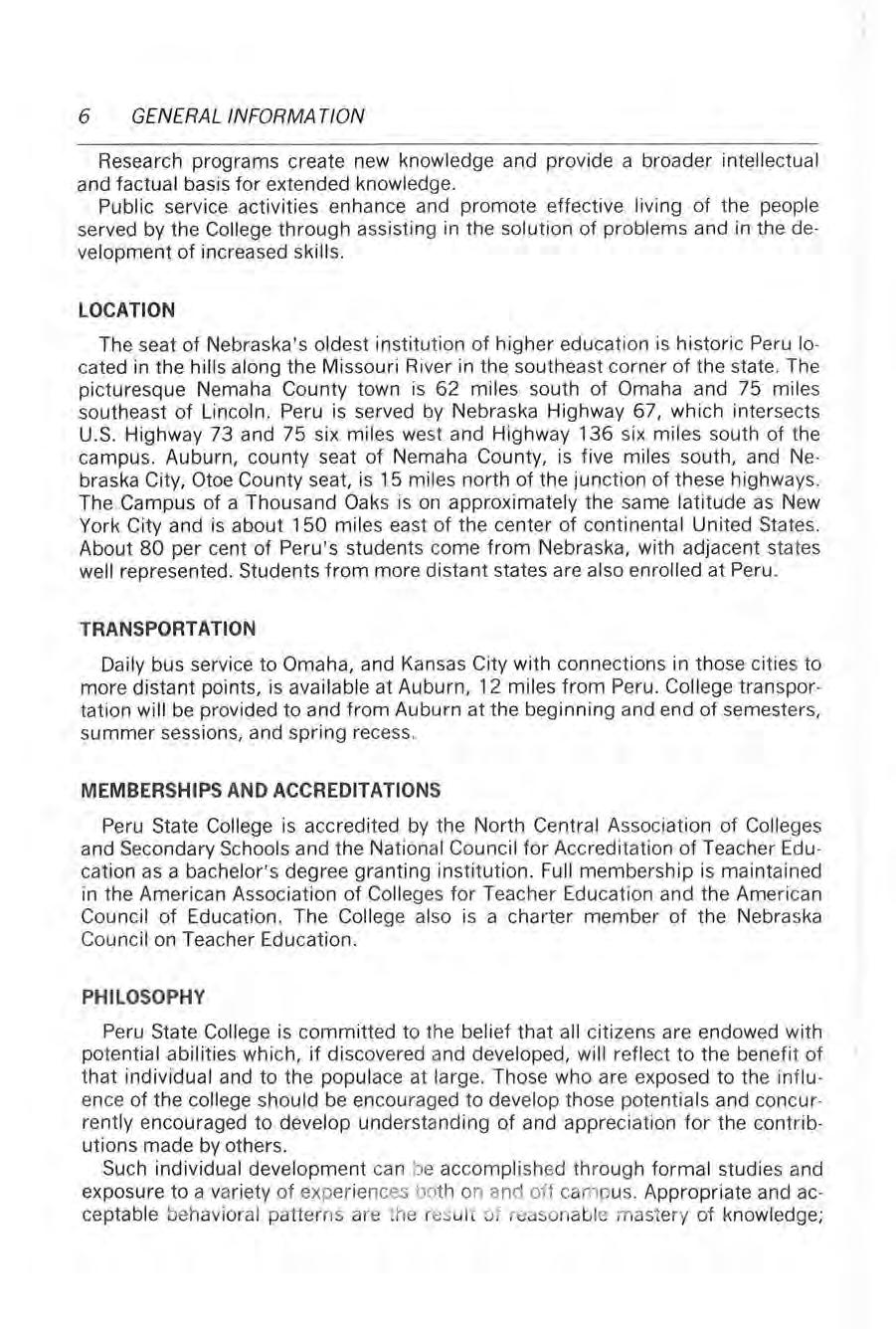
LOCATION
The seat of Nebraska's oldest institution of higher education is historic Peru located in the hills along the Missouri River in the southeast corner of the state. The picturesque Nemaha County town is 62 miles south of Omaha and 75 miles southeast of Lincoln. Peru is served by Nebraska Highway 67, which inter sec ts U.S. Highway 73 and 75 six miles we st and Highway 136 six miles south of the campus. Auburn, county seat of Nemaha County, is five miles south, and Nebraska City, Otoe County seat, is 15 miles north of the junction of these highways The Campus of a Thousand Oaks is on approximate ly the same latitude as New York City and is about 150 miles east of the center of continental United States. About 80 per cent of Peru's students come from Nebraska, with adjacent states well represented. Students from more distant states are also enro ll ed at Peru.
TRANSPORTATION
Daily bus service to Omaha, and Kansas City with connections in those c iti es to more distant points, is ava ilabl e at Auburn, 12 miles from Peru. College transportation will be provided to and from Auburn at the beginning and end of semesters, summer sess ion s, and spring recess
MEMBERSHIPS AND ACCREDITATIONS
Peru State College is accredited by the North Central Assoc iation of Colleges and Secondary Schools and the Nation al Council for Accreditation of Teacher Education as a bachelor's degree granting institution. Full membership is maintained in the American Association of Colleg es for Tea c her Education and the Ame r ica n Council of Education. The Col lege also is a charter member of the Nebra ska Council on Teacher Education
PHILOSOPHY
Peru State College is committed to the bel ief that al l citizens are endowed with po te ntial abilities which, if d isco vered an d developed, will reflect to the benefit of that individual and to the populace at large. Those who are ex posed to the influence of the college should be encouraged to develop those potentials and concurrently encouraged to develop understanding of and appreciation for the contributions made by others .
Such individual developm e nt can be accomplish ed through formal studies and exposure to a variety of ex perienc es bo t h o n and off ca mp us. Appropr iate and acceptable behavi ora l patterns are he r es u1 · of easo nabl e mast ery of know ledge;
6
GENERAL IN FORMAT/ON
acquisition of certain skills and techniques, appreciation and understanding of areas beyond narrow personal interests, and from meaningful religious and social experiences.
GOALS
To increase the quality and diversity of programs to provide for the differing aptitudes, interests, and needs of the people it serves.
To intensify a milieu of academic excellence.
To enhance the intellectual cooperation between the liberal and applied arts .
To promote involvement of both students and faculty in experimental and creative research.
To strive to be a more effective public service institution .
To offer continuing and occupational education for personal and career enrichment.
To explore new and creative educational opportunities for students
To serve as a transitional educational institution for students pursuing various occupational, vocational, and professional objectives.
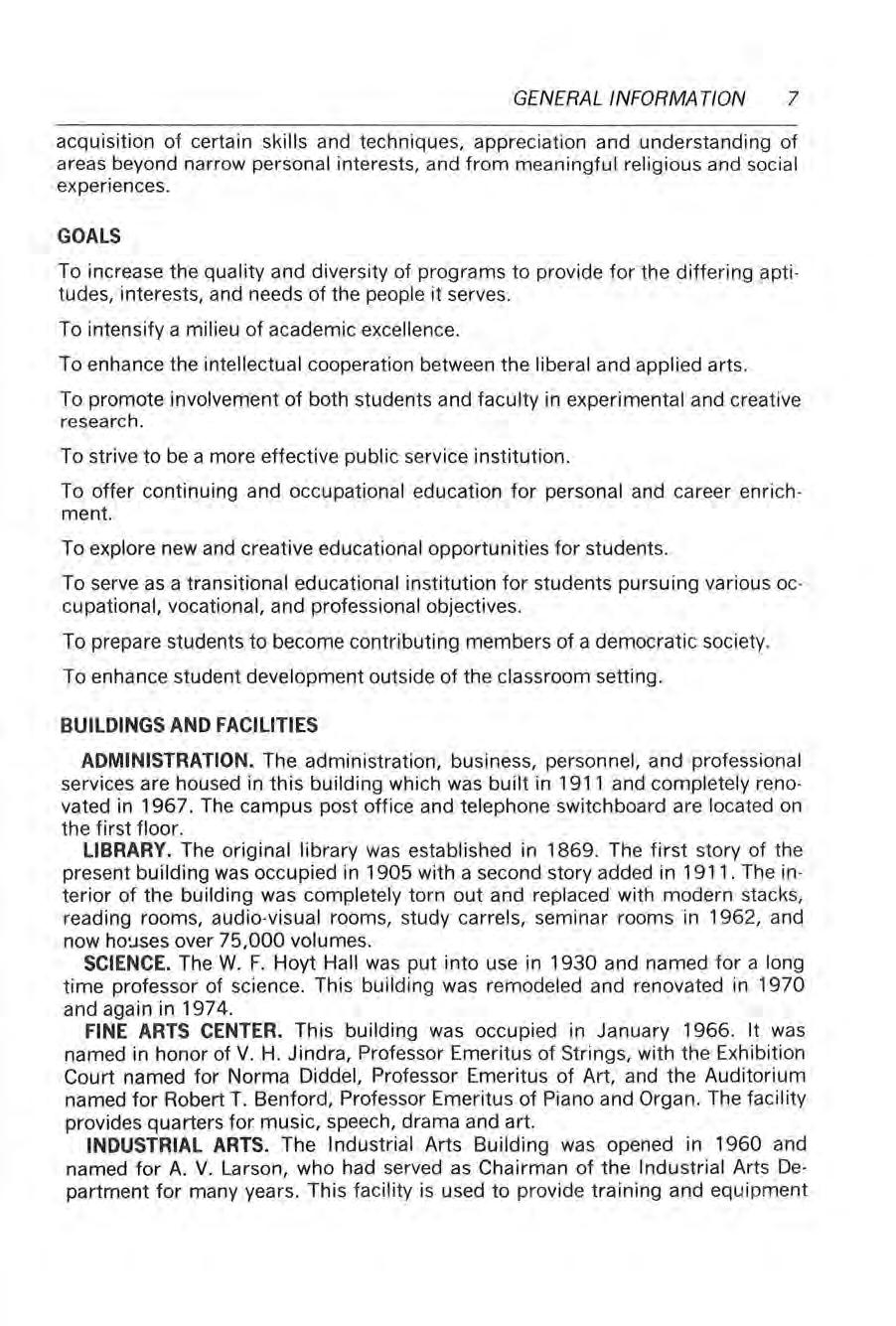
To prepare students to become contributing members of a democratic society.
To enhance student development outside of the classroom setting.
BUILDINGS AND FACILITIES
ADMINISTRATION. The administration, business, personnel, and professional services are housed in this building which was built in 1911 and completely renovated in 1967. The campus post office and telephone switchboard are located on the first floor.
LIBRARY. The original library was established in 1869 . The first story of the present building was occupied in 1905 with a second story added in 1911 . The interior of the building was completely torn out and replaced with modern stacks , reading rooms, audio-visual rooms, study carrels, seminar rooms in 1962, and now ho:..ises over 75,000 volumes.
SCI ENCE. The W. F. Hoyt Hall was put into use in 1930 and named for a long time professor of science This building was remodeled and renovated in 1970 and again in 1974.
FINE ARTS CENTER. This building was occupied in January 1966. It was named in honor of V. H. Jindra, Professor Emeritus of Strings, with the Exhibition Court named for Norma Diddel, Professor Emeritus of Art, and the Auditorium named for Robert T. Benford, Professor Emeritus of Piano and Organ The facility provides quarters for music, speech, drama and art.
INDUSTRIAL ARTS. The Industrial Arts Building was opened in 1960 and named for A. V. Larson, who had served as Chairman of the Industrial Arts Department for many years. This facility is used to provid e training and equipment
GENERAL INFORMA T/ON 7
GENERAL IN FORMAT/ON
in power mechanics, electricity-electronics, industrial crafts, woodworking, metal working, drafting, graphic arts, photography, and related areas
EDUCATION. Built in 1916 and named in honor of a founder of the College, the T. J . Majors Campus School became the Education Building when the legislature phased out laboratory schools in 1967 . Besides housing the School of Education, it also contains the business education, geography, and home economics departments.
AUDITORIUM. The original facility built in 1922 was completely remodeled in 1969, with a seating capacity of approximately 650. Campus closed-circuit radio station is located in the south wing over the lobby
GYMNASIUM. The gymnasium evolved from remodeling of the original College Chapel building in 1921, through recons t ruction projects in 1928 and 1949, to the present facility which houses two basketball floors, gymnastics and wrestling rooms, tile swimming pool, locker and shower rooms for men and women, as well as physical education offices and classrooms.
OAK BOWL. Concrete seats were built on the west side of a natural bowl in 1955, to provide seating for more than 2,500 spectators at athletic events . Complete dressing rooms for home and visiting teams were added to the area in 1968. Surfaced tennis courts are south of the Oak Bowl; the baseball diamond is north of the playing field
COMPU T ER CENTER. The Computer Center, located on the first floor in the Administration Building, is designed to serve students, faculty and the college administration as an instructional and administrative tool. This IBM computing system "understands" several programming languages, including Fortran, Cobol, RPG, and APL. The center is operated on an "open shop" basis, giving studen t s hands -on experience in programming and operating modern computing equipment.
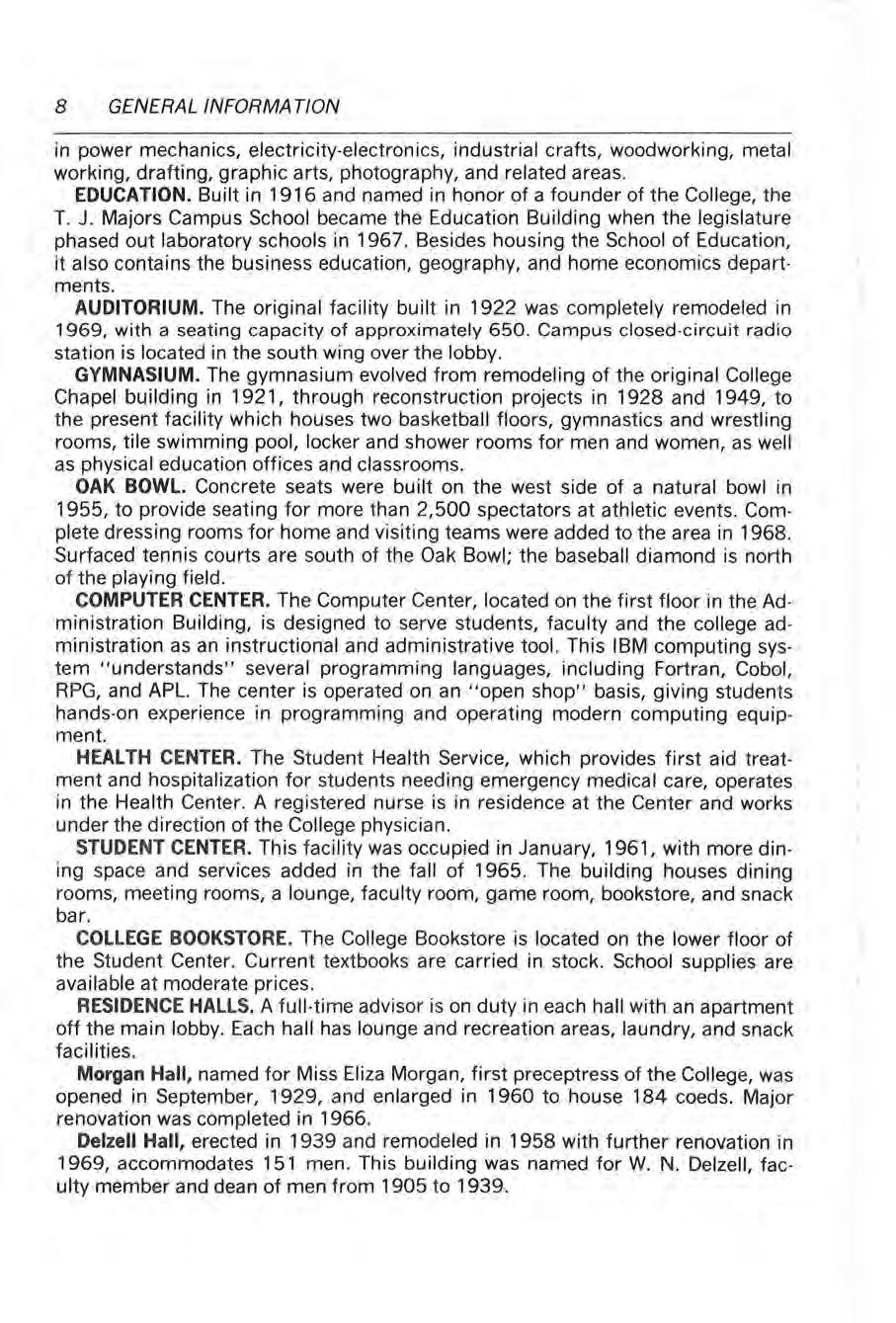
HEAL TH CE NTER. The Student Health Service, which provides first aid treatm ent and hospitalization for students needing emergency medical care, operates in the Health Center. A registered nurse is in residence at the Center and works under the direction of the College physician
STUD ENT CENTER . This facility was occupied in January, 1961, with more dining space and services added in the fall of 1965. The building houses dining rooms, meeting rooms, a lounge, faculty room, game room, bookstore, and snack bar
COLL EGE BO OKST ORE. The College Bookstore is located on the lower floor of the Student Center . Current textbooks are carried in stock. School supplies are available at moderate prices.
RES ID ENCE HAL LS. A full -time advisor is on duty in each hall with an apartment off the main lobby. Each hall has lounge and recreation areas, laundry, and snack facilities.
Morgan H a ll, named for Miss Eliza Morgan, first preceptress of the College, was opened in September, 1929, and enlarged in 1960 to house 184 coeds. Major renovation was completed in 1966.
Del zell Hall, erected in 1939 and remodeled in 1958 with further renovation in 1969, accommodates 151 men This building was named for W. N. Delzell, faculty member and dean of men from 1905 to 1939.
8
Majors Hall. The 90 -man East Wing was built in 1960 and named for A D. Majors, long time governing Board member and nephew of founder T. J. Majors In 1965, a 122-man West Wing was added.
CENTENNIAL COMPLEX. The co-educational seven-unit complex is almost a community in itself, housing 234 students in six structures . Dedication of these facilities took place in 1967 during celebration of the College ' s Centennial year, each unit being named in honor of long-term faculty members. Students are housed in suites of two or three bedrooms, living room, and full bath.
Davidson, Palmer, Clayburn, Mathews Halls, accommodates both men and women. Neal Hall is used as an auxiliary building for special events.
MARRIED STUDENT HOUSING. Five housing units containing eight twobedroom apartments and six one-bedroom apartments, were completed for occupancy in 1956, in a park-like setting east of the Oak Bowl. All are furnished with basic kitchen equipment.
Nicholas Hall at Centennial Complex was converted to apartments for married students in 1970. Pate Hall at Centennial Complex is used to house guests. Each apartment contains kitchen-dining area, living room, full bath, and one or two bedrooms. All are furnished.
FACULTY HOUSING. Two units were completed in 1956, containing two onebedroom apartments, four two -bedroom apartments, and two three-bedroom apartments for faculty use. Kitchen appliances furnished.
CAMPUS ABBREVIATIONS
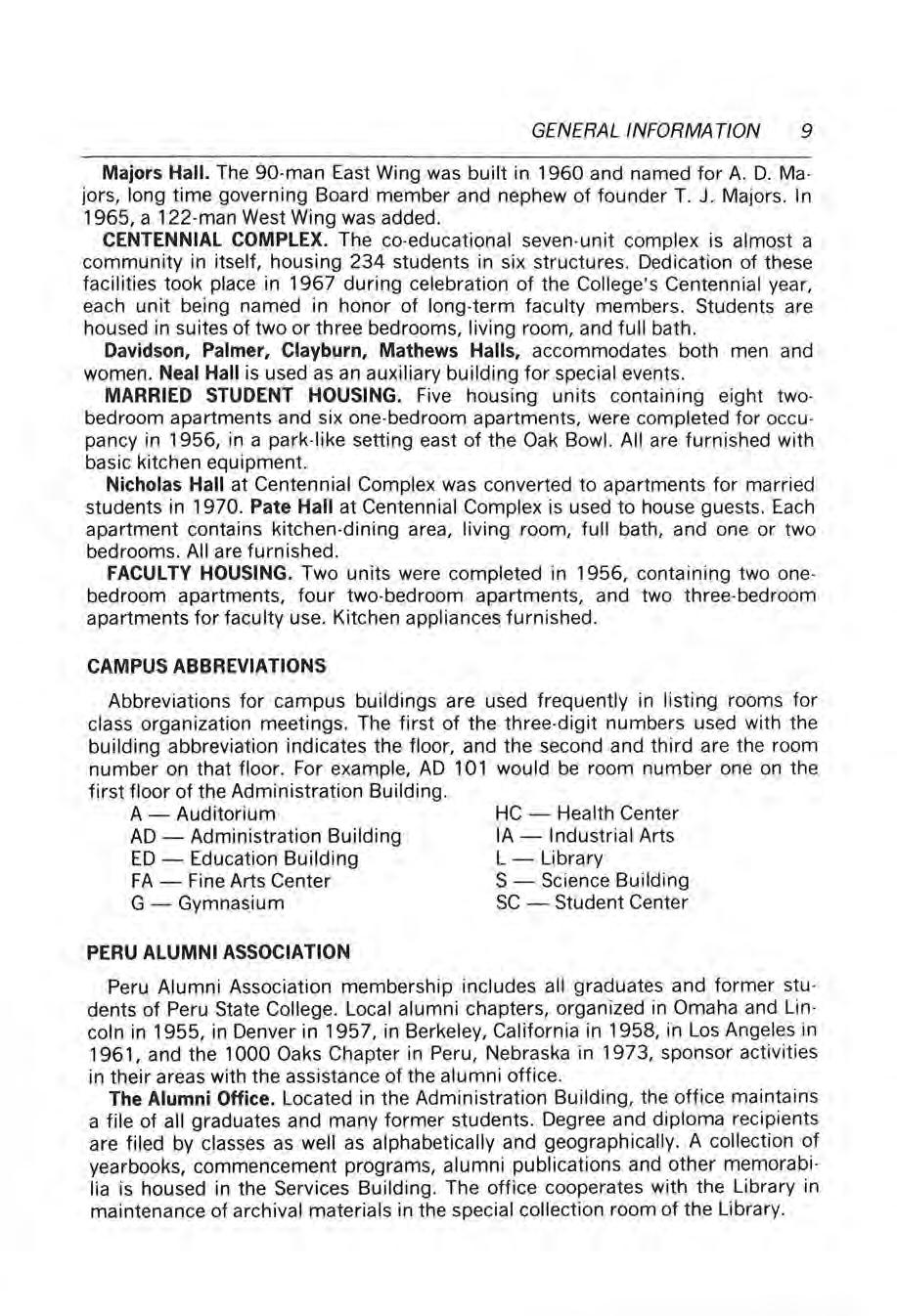
Abbreviations for campus buildings are used frequently in listing rooms for class organization meetings. The first of the three-digit numbers used with the building abbreviation indicates the floor, and the second and third are the room number on that floor. For example, AD 101 would be room number one on the first floor of the Administration Building.
A - Auditorium
AD - Administration Building
ED - Education Building
FA - Fine Arts Center
G - Gymnasium
PERU ALUMNI ASSOCIATION
HC - Health Center
IA - Industrial Arts
L - Library
S - Science Building
SC - Student Center
Peru Alumni Association membership includes all graduates and former students of Peru State College. Local alumni chapters, organized in Omaha and Lincoln in 1955, in Denver in 1957, in Berkeley, California in 1958, in Los Angeles in 1961, and the 1000 Oaks Chapter in Peru, Nebraska in 1973, sponsor activities in their areas with the assistance of the alumni office.
The Alumni Office. Located in the Administration Building, the office maintains a file of all graduates and many former students. Degree and diploma recipients are filed by classes as well as alphabetically and geographically . A collection of yearbooks, commencement programs, alumni publications and other memorabilia is housed in the Services Building . The office cooperates with the Library in maintenance of archival materials in the special collection room of the Library.
GENERAL INFORMATION 9
GENERAL INFORMATION
The Peru Stater, an alumni magazine, is distr i buted three times each year to alumni, former students, and friends of the College
PERU ACHIEVEMENT FOUNDATION
As a result of the work of a group of alumni, the Peru Achievement Foundation was organized in June, 1955, and incorporated as a non-profit corporation for educational and charitable purposes on May 21, 1962.
Organized for the promotion and support of Peru State College, the Foundation has as its primary purpose: "to aid, assist , and promote the educational program, faculty, employees, students, and to encourage the attendance ... of worthy and deserving students , and to grant scholarships and student loans to deserving students."
This purpose is accomplished through the solicitation and acceptance of "gifts, grants, devises and beque sts of real or personal property, or both, and to hold, administer, use and dispose of the sam e, both principal and income . .. " from alumni and friends of the Colleg e .
Since the beginning in 1955, the Peru Achievement Foundation has provided scholarships; administered scholarships for various organizations, individuals and groups; furnished all matching funds for the National Defense Student Loan Program; provided for the furnishings of the small dining room in the Student Center; and has in other w ays promoted the College.
THE FAMILY EDUCATION RIGHTS AND PRIVACY ACT OF 1974
The primary purpose for maintaining student records at Peru State College is to assist students in their educational endeavors and to reflect institutional action. It is the policy of Peru State College to provide students the right to inspect, review, and challenge education records as provided in the Family Education Rights and Privacy Act of 1974 (Buckley Amendment).
A publication which contains detailed information about the Buckley Amendment is entitled "Access to and Dissemination of Information About Students at Peru State College. " It is available upon request at the Office of Student Services Students are also advised of their right to file complaints concerning alleged failures by the College to comply with the requirements of the Buckley Amendment Complaints are to be addressed to this ag ency : The Family Education Rights and Privacy Act Office (F.E.R.P.A.), Department of Health, Education and Welfare , 330 Independence Avenue, S.W., Washington, D.C. 20201 .
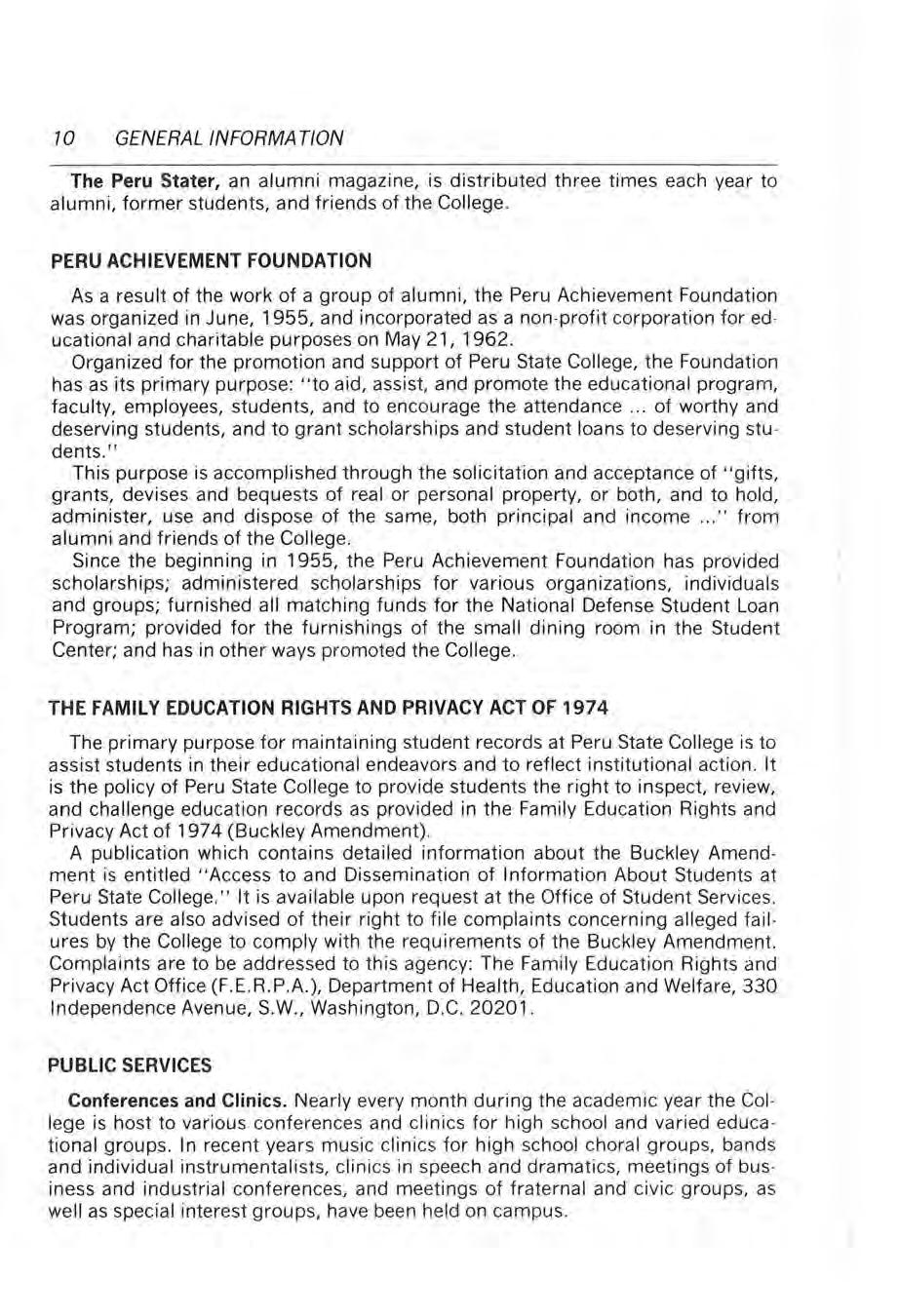
PUBLIC SERVICES
Conferences and Clinics. Nearly every month during the academic year the College is host to various conferences and clinics for high school and varied edu cational groups. In recent years music clinic s for high school c hor al groups , band s and individual instrumentalists, clini c s in sp eec h and dramatics, meetings of business and industrial conferences , and me etings of fr aternal and civic groups, as well as special inter est groups, have been he ld on campus .
10
Program of Continuing Education. This is a program designed to make the institution serve the educational needs of the entire region which the College serves Consequently, both credit and non-credit courses are taken to the public, both off. campus and on-campus, the purpose being to supply or update skills for employment or job advancement, to help working people obtain courses which will eventually lead to a degree, and to help people of the area attain additional skills or knowledge which can enrich their leisure hours. Peru State College supports the philosophy that education is a life-long process and should be pursued by an individual throughout his entire lifetime. Through this program, the College hopes to make it possible for citizens within our service area to participate in this endeavor.
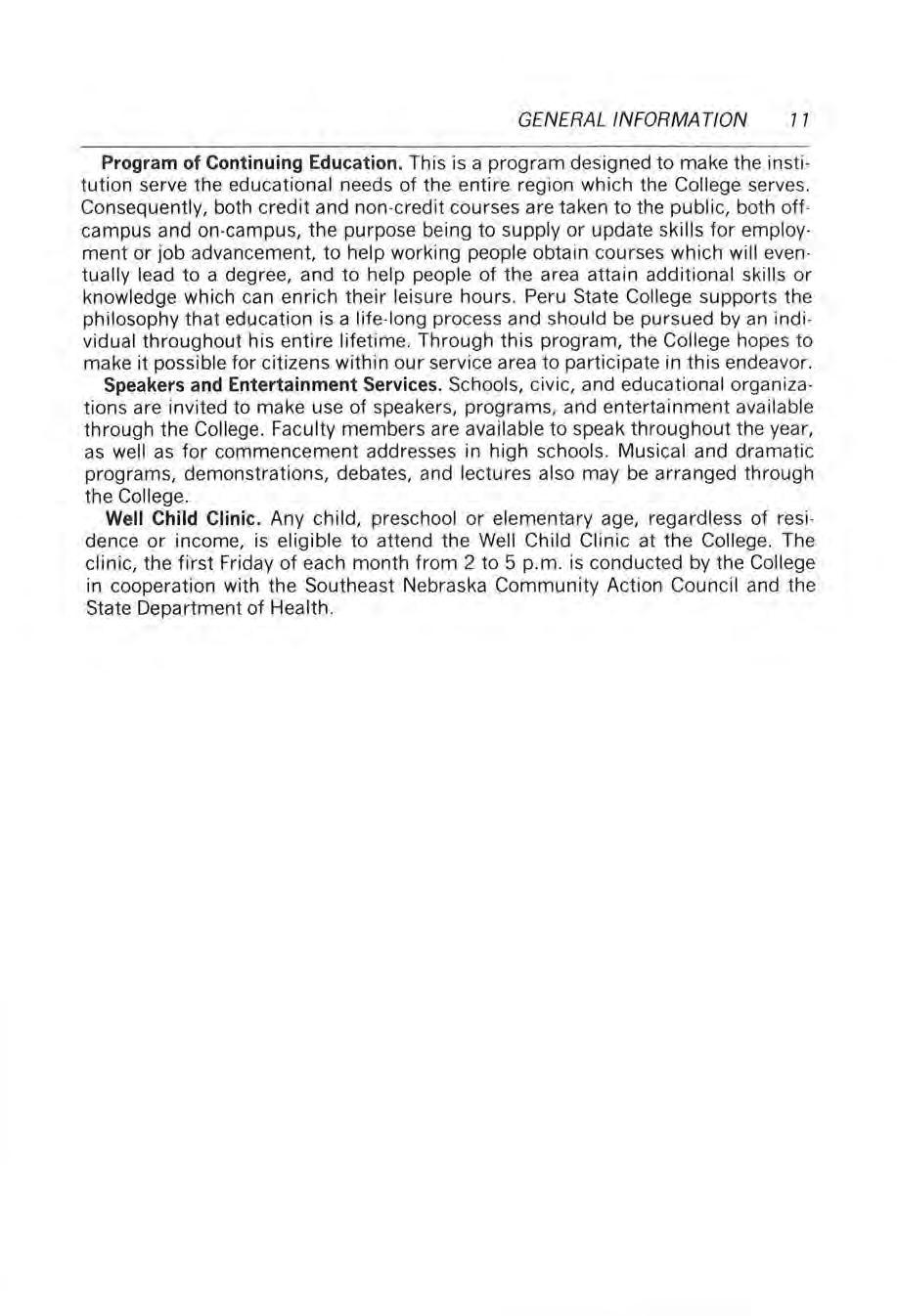
Speakers and Entertainment Services. Schools, civic, and educational organizations are invited to make use of speakers, programs, and entertainment available through the College. Faculty members are available to speak throughout the year, as well as for commencement addresses in high schools Musical and dramatic programs, demonstrations, debates, and lectures also may be arranged through the College.
Well Child Clinic. Any child, preschool or elementary age, regardless of residence or income, is eligible to attend the Well Child Clinic at the College. The clinic, the first Friday of each month from 2 to 5 p.m. is conducted by the College in cooperation with the Southeast Nebraska Community Action Council and the State Department of Health.
GENERAL IN FORMATION 11
Admissions Procedures, Expenses, and Financial Aid
Admission to Peru State College is granted to any individual who has graduated from an accredited Nebraska high school and who has not previously attended college. Out-of-state students who choose PSC generally have a good academic record in high school. The "open admissions" policy for Nebraska residents has proven time after time that highly motivated students can succeed at PSC althoug h their academic performance in high school was below their capabilities. If you are in doubt about the likelihood of your success at PSC, you are encouraged to discuss your qualifications, goals and motivation with the experienced counselors in the Office of Admissions. For advice or for information about specific programs, please feel free to write, call or visit the Office of Admissions, Peru State College, Peru, Nebraska 68421 (phone 402 / 872-3815, Ext. 221 ).
APPLICATION PROCEDURE
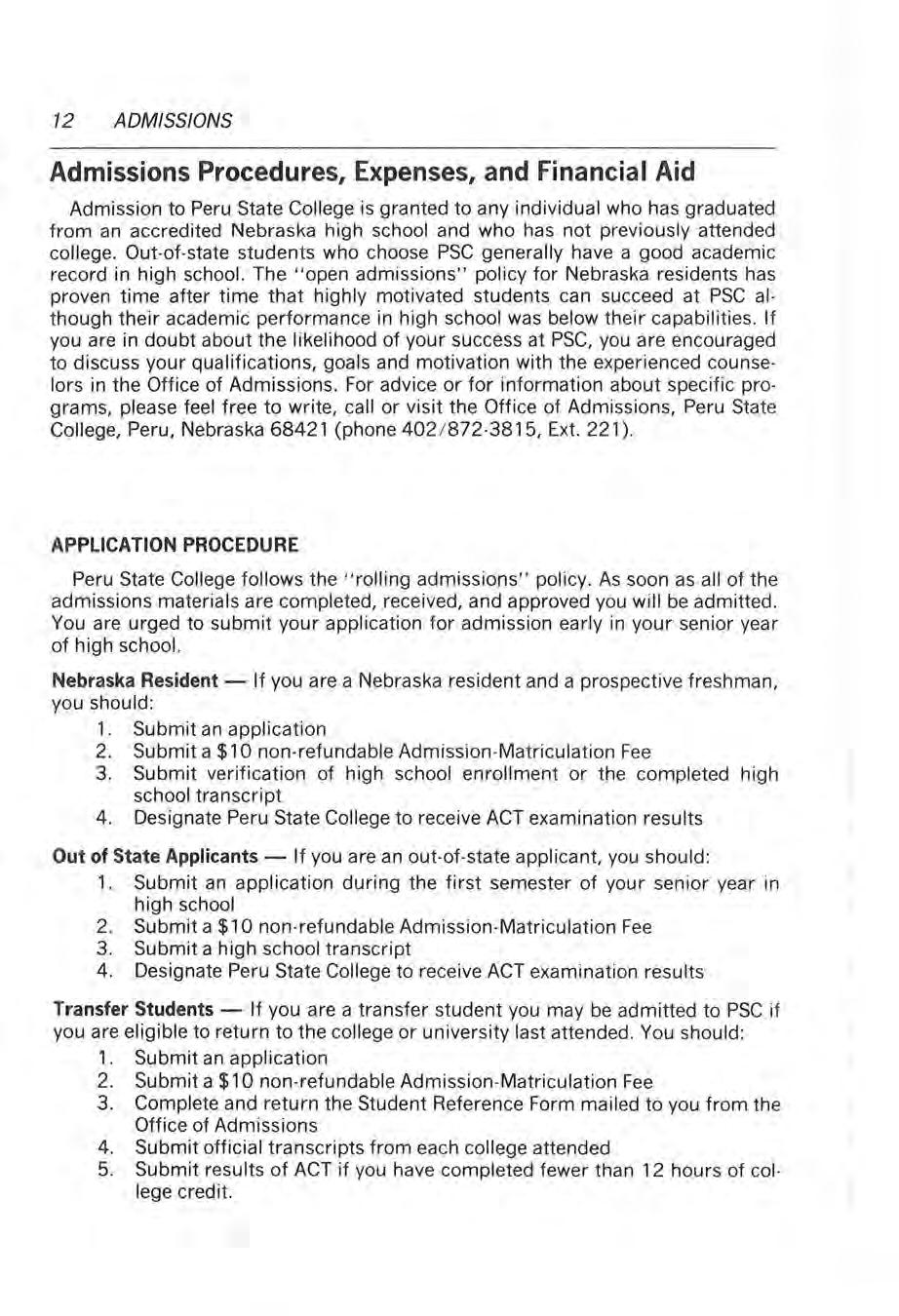
Peru State College follows the "rolling admissions" policy. As soon as all of the admiss ions materials are completed, received, and approved you will be admitted You are urged to submit your application for admission early in your senior year of high school.
Nebraska Resident - If you are a Nebraska resident and a prospective freshman, you should:
1. Submit an application
2. Submit a $10 non-refundable Admission-Matriculation Fee
3. Submit verification of high school enrollment or the comp leted high school transcript
4. Designate Peru State College to receive ACT examination results
Out of State Applicants - If you are an out-of-state applicant, you should:
1. Submit an application during the first semester of your senior year in high school
2. Submit a $10 non-refundable Admission-Matriculation Fee
3. Submit a high school transcript
4. Designate Peru State College to receive ACT examination results
Transfer Students - If you are a transfer student you may be admitted to PSC if you are eligible to return to the college or university last attended. You shou ld :
1. Submit an application
2 . Submit a $10 non-refundable Admission-Matriculation Fee
3. Complete and return the Student Reference Form mailed to you from the Office of Admissions
4. Submit official transcripts from each college attended
5. Submit results of ACT if you have completed fewer than 12 hours of college credit.
12 ADMISSIONS
ADMISSION OF COMMUNITY COLLEGE GRADUATES
Applicants who have received an Associate of Arts degree or Associate of Science degree from an accredited community college will submit the same materials required of transfer applicants, as listed above. Associate of Arts programs are reviewed and approved by the Academic Affairs Commission of Peru State College.
GUIDELINES FOR TRANSFER STUDENTS
1. Peru State College will accept credit earned at other accredited colleges and universities. Upon receipt of the applicant's transcripts from other institutions, an evaluation will be made by the Registrar regarding total credit accepted and specific degree requirements which have been met. The student will work out his major requirements with his faculty advisor.
2 . Applicants transferring from a non-accredited college must meet all the admission requirements for transfer students listed above. Credits earned at non -accredited institutions will be accepted on a provisional basis. This credit will be validated upon satisfactory completion of 30 semester hours of degree credit at Peru State College.
3. Students seeking admission while on probation at the college last attended, if accepted, are placed on probation for one semester and are subject to all policies of probation in this College.
4. Students who have been suspended from another college will not be considered for admission until the period of suspension has expired and facts related to the dismissal are provided.
5. A maximum of 66 semester hours from a community college may be applied toward a degree at Peru State .
6. An applicant who has received the Associate of Arts degree may be determined as having met the General Studies requirements of Peru State College. Such programs are reviewed and approved by the Academic Affairs Commission of Peru State College.
ADMISSION OF NON-HIGH SCHOOL GRADUATES

Those persons who are not high school graduates, but who are otherwise prepared and recommended for college level work, may be admitted as special students. A college aptitude and the G.E.D (General Education Development) test may be used to determine the applicant level of ability and his qualification for admission. For additional information, please contact the Registrar or Director of Admissions
READMISSION POLICY
All undergraduate students who have previously attended PSC and were admitted to pursue an academic program, students who withdraw during a semester or discontinue studies a semester or more (summer excluded), and all post-
ADMISSIONS 13
.
graduates seeking an additiona l academic program must apply at the Office of Admissions for readmission.
Applicants should apply for readmission at least four weeks prior to the opening date of the semester or session for which they desire readmission.
Students are generally readmitted for the semester or summer term they wish to again commence their studies provided they left the co ll ege in good standing
Students who interrupted their stud ies and were on academic probation will generally be readmitted for the semester or summer term they wish to reenter provided they are in good standing with regard to a ll other related concerns
Students who were academica lly suspended during a semester or summer term will not be considered for readmission until two semesters have elapsed (summer session excluded).
Previously suspended students who are readmitted will, in general, be subjec t to permanent suspension if they are suspended for a second time.
Students readmitted to the co ll ege can continue under the guidel in es of their previous academic program as outl in ed in the general col lege bulletin of the year of first entry provided they meet the normal progress policy. Some additiona l requirements may be expected because of possible changes within respective programs . In addition, readmitted students shou ld not expect continuance in a program that has been or is being phased o ut of the c urri culum.
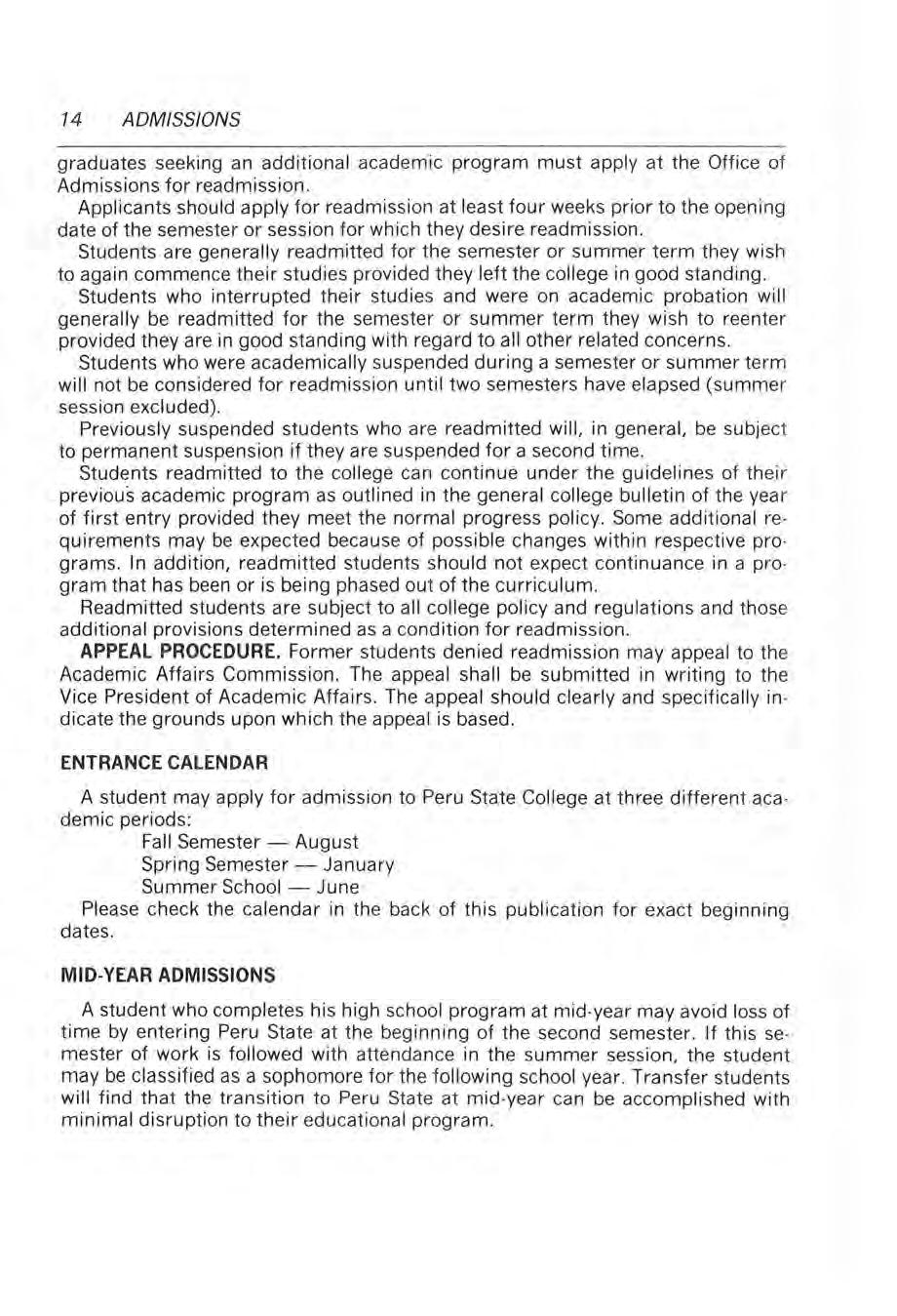
Readmitted students are subject to all co ll ege policy a nd regulations and those additiona l provisions determined as a cond iti on for readmission.
APPEAL PROCEDURE. Former students denied readmission may appea l to the Academic Affairs Commission . The appeal sha ll be submitted in writing to the Vice President of Academic Aff a ir s. The appea l should c lear ly and spec ific ally indicate the grounds upon which the appea l is based .
ENTRANCE CALENDAR
A student may apply for admiss ion to Per u State College at three different academic periods:
Fall Semester - August
Spring Semester - January
Summer Schoo l - Jun e
Please check the ca lend ar in t he back of th i s publication for exact beginning dates
MID-YEAR ADMISSIONS
A student who comp letes his high schoo l program at mid-year may avo id loss of time by entering Peru State at the beginning of the second semester. If this semester of work is followed with attendance in the summer sess ion, the student may be c lass ified as a sop homore for the fo ll ow ing school year. Transfer students will find th at the transition to Peru State at mid -year can be accomp li shed with minimal disrupt ion to their edu c ational program .
14
ADMISSIONS
Tuition and Fees
(Subject to change)
ESTIMATED COSTS PER SEMESTER
Fixed Costs
Tuition (15 credit hours)
Fees, Student Center, Programs, Health I.D
Board and Room (18 Meal Plan)
Delzell or Morgan Hall
Total-Living at Delzell / Morgan
Total -Living at Complex
ESTIMATED VARIABLE COSTS PER SEMESTER Registration of Car (Once Per Year)
Tuition, Fee and / or Board and Room charges may be changed at any time by the Board of Trustees of the Nebraska State Colleges .
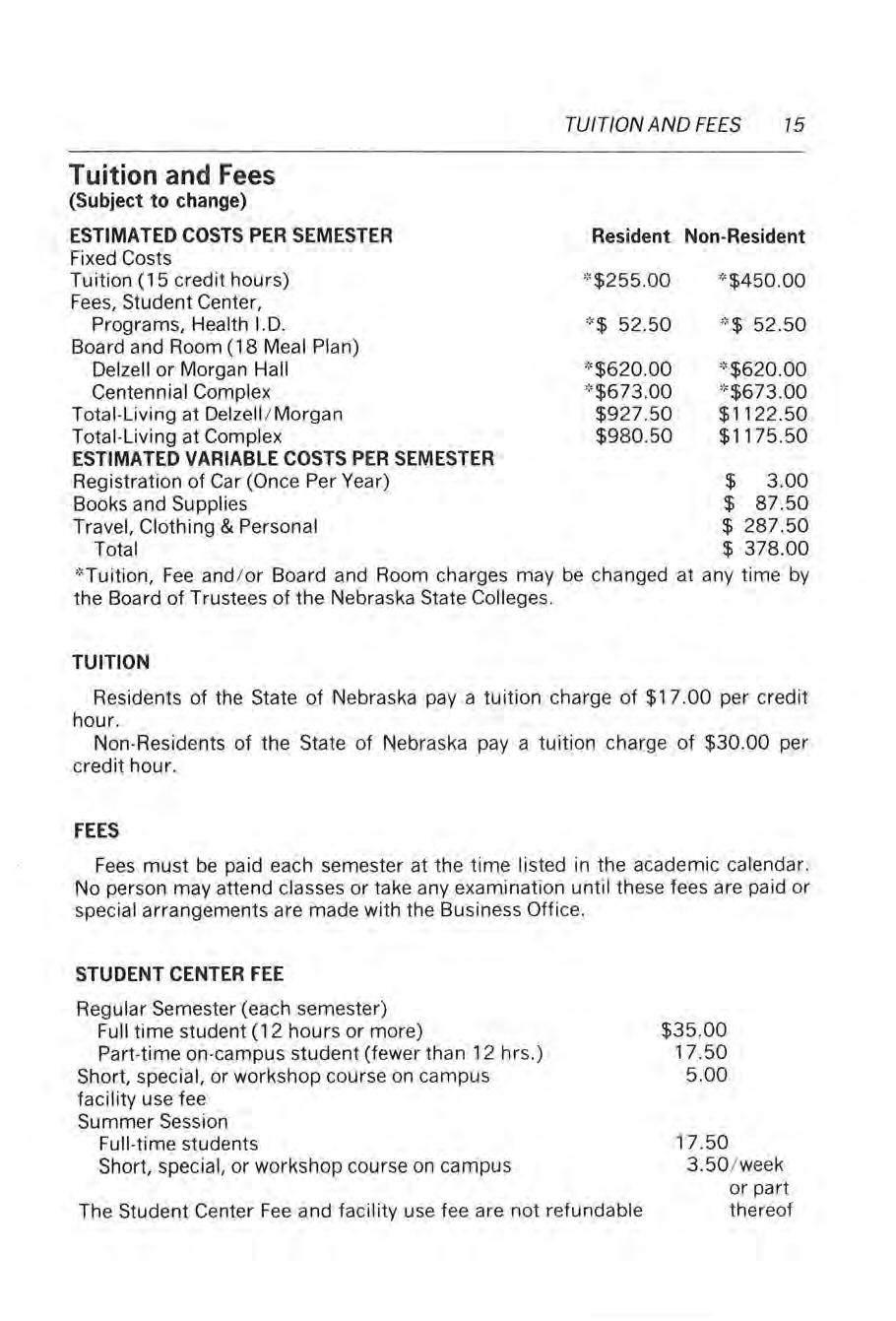
TUITION
Residents of the State of Nebraska pay a tuition charge of $17 .00 per credit hour.
Non-Residents of the State of Nebraska pay a tuition charge of $30 00 per credit hour .
FEES
Fees must be paid each semester at the time listed in the academic calendar . No person may attend classes or take any examination until these fees are paid or special arrangements are made with the Business Office.
STUDENT CENTER FEE
Regular Semester (each semester)
Full time student (12 hours or more)
Part -time on-campus student (fewer than 12 hrs )
Short, special, or workshop course on campus
facility use fee
Summer Session
Full-time students
Short, special, or workshop course on campus
The Student Center Fee and facility use fee are not refundable
/ week or part thereof
Centennial
Complex
Books and
Travel, Clothing &
Total TUITION AND FEES
Resident Non-Resident ,: ' $255.00 ,;, $ 52.50 ,:, $620 00 ,:, $673.00 $927.50 $980.50 ,:, $450 .00 ,:,$ 52.50 ,:,$620.00 ,:,$673.00 $1122 .50 $1175.50 $ 3.00 $ 87 50 $ 287 50 $ 378.00
Supplies
Personal
15
'~
$35.00 17.50 5.00 17
3.50
50
TUITION AND FEES
STUDENT PROGRAMS FEE
Regular semester (each semester)
(All students enrolled in seven or more hours)
The Student Programs Fee is not refundable.
HEALTH CENTER FEE
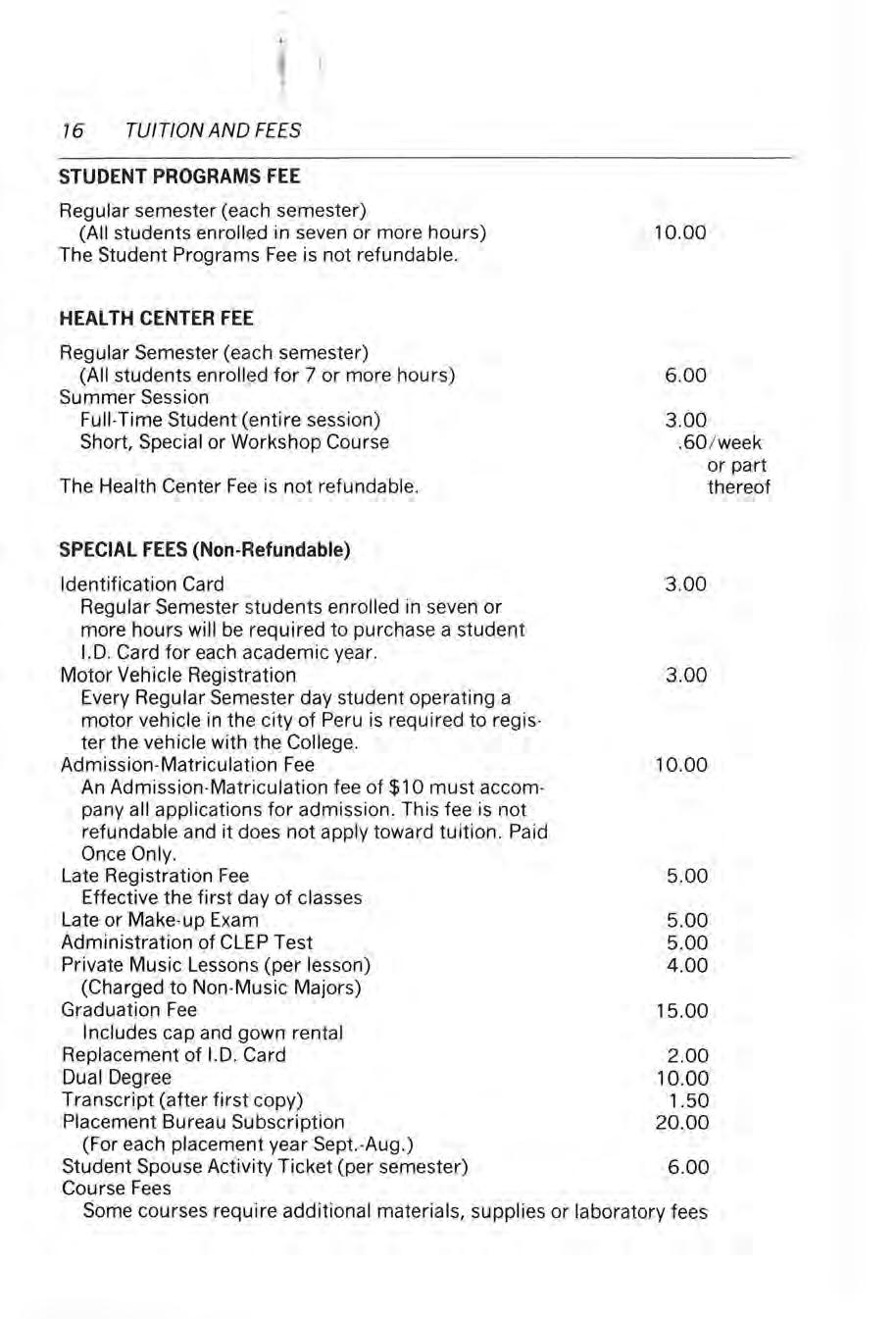
Regular Semester (e ach semester)
(All students enrolled for 7 or more hours)
Summer Session
Full -Time Student (entire session)
Short, Special or Workshop Course
The Health Center Fee is not refundable
SPECIAL FEES (Non-Refundable)
Identification Card
Regular Semester students enrolled in seven or more hours will be required to purchase a student
I.D. Card for each academic year .
Motor Vehicle Registration
Every Regular Semester day student operating a motor vehicle in the city of Peru is requ i red to register the vehicle with the College .
Admission -Matriculation Fee
An Admission -Matr iculation fee of $10 must accompany all applications for admission This fee is not refundable and it does not apply toward tuition. Paid Once Only.
Late Registration Fee
Effective the first day of classes
Late or Make-up Exam
Administration of CLEP Test
Private Music Lessons (per lesson)
(Charged to Non-Music Majors)
Graduation Fee
Includes cap and gown rental
Replacement of I.D . Card
Dual Degree
Transcript (after first copy)
Placement Bureau Subscription
(For each placement year Sept-Aug.)
Student Spouse Activity Ticket (per semester)
Course Fees
Some courses require additional materials, supplies or laboratory fees
16
10.00 6.00 3.00 .60 / week or part thereof 3 .00 3 .00 10.00 5.00 5.00 5.00 4 00 15.00 2.00 10.00 1.50 20 00 6 .00
BOARD AND ROOM CHANGE (Subject to Change)
Room and Board Rates
Room and Board: 18 Meal Plan
Delzell and Morgan Halls
Centennial Complex
Room and Board: 10 Meal Plan
Delzell and Morgan Halls
Centennial Complex Room Only (juniors and seniors only)
Delzell and Morgan Halls
Centennial Complex Private Room (optional)
1978 Summer Sessions (Per Session) (Room Only)
Room and Board Installment Plan
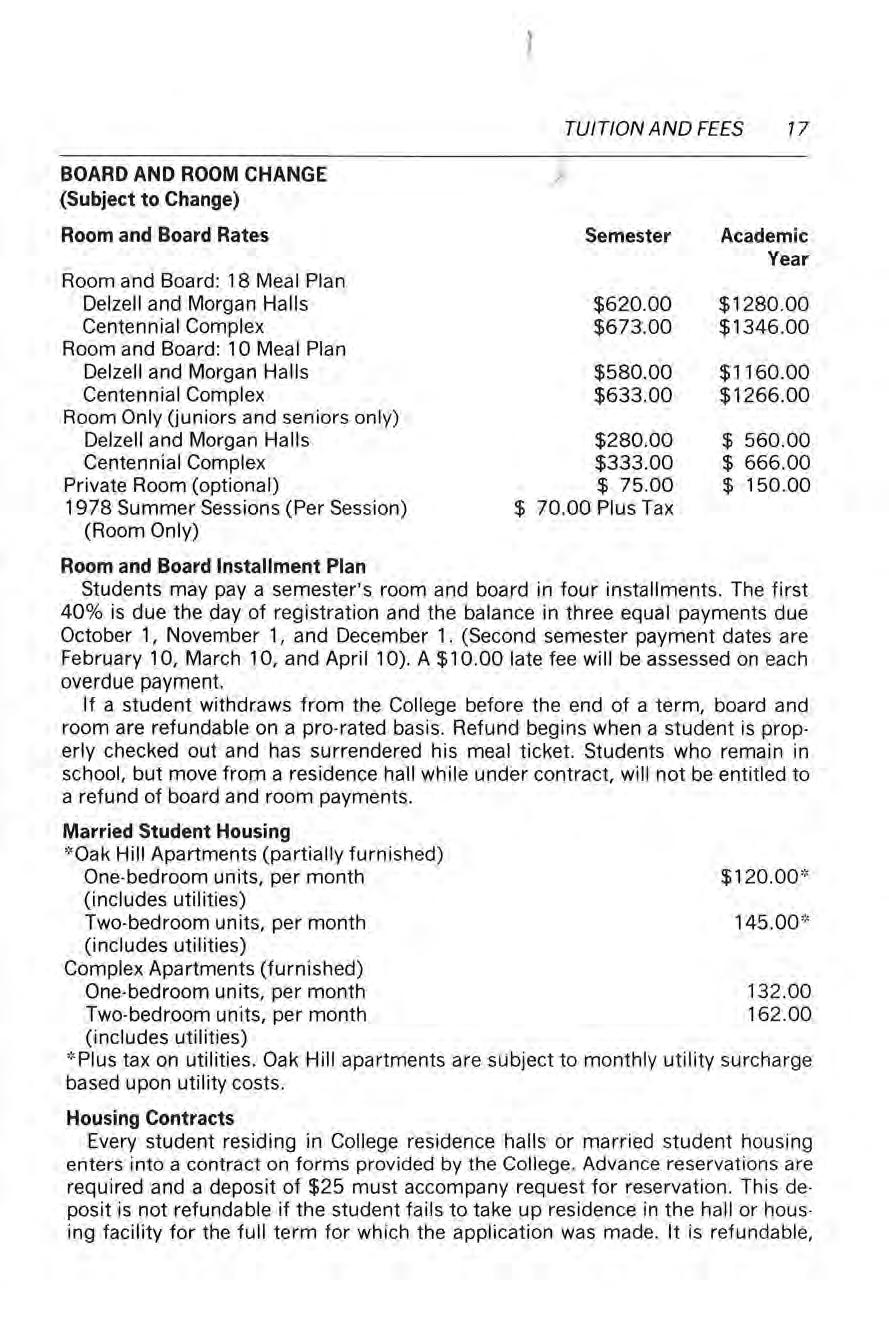
Students may pay a semester's room and board in four installments . The first 40% is due the day of registration and the balance in three equal payments due October 1, November 1, and December 1 . (Second semester payment dates are February 10, March 10, and April 10). A $10.00 late fee will be assessed on each overdue payment.
If a student withdraws from the College before the end of a term, board and room are refundable on a pro-rated basis. Refund begins when a student is properly checked out and has surrendered his meal ticket. Students who remain in school, but move from a residence hall while under contract, will not be entitled to a refund of board and room payments
Married Student Housing
'~ Oak Hill Apartments (partially furnished)
One-bedroom units, per month
(includes utilities)
Two-bedroom units, per month
00 ':' (includes utilities)
Complex Apartments (furnished) One -bedroom units, per month
(includes utilities) ,:,P lus tax on utilities . Oak Hill apartments are subject to monthly utility surcharge based upon utility costs.
Housing Contracts
Every student residing in College residence halls or married student housing enters into a contract on forms provided by the College. Advance reservations are required and a deposit of $25 must accompany request for reservation This deposit is not refundable if the student fails to take up residence in the hall or housing facility for the full term for which the application was made . It is refundable,
$ TUITION ANO
.,., Semester Academic Year $620 .00 $1280 .00 $673 .00 $1346 .00 $580.00 $1160..00 $633.00 $1266 00 $280.00 $ 560.00 $333.00 $ 666.00 $ 75.00 $ 150 .00 70.00 Plus Tax
FEES 17
$120.00':'
145
132.00 Two
162.00
-bedroom units, per month
FINANCIAL AID
less deduction tor damage to the buildings and / or equipment, at the end of the term, provided the student is in residence tor the full term, or the student withdraws from the College because of reasons beyond his control, as determined by the College.
TUITION REFUNDS
Refunds will be made only after required withdrawal procedur es are completed. Refunds will be made as of date of approved withdrawal, from the College . Tuition refunds may be made for a reduction in class hours through the final date tor adding classes .
FEE REFUNDS
Proportionate refunds will be made to students totally withdrawing from College within a given period. Fees will not be refunded unless collected in error The following schedule will be followed in refunding tuition:
FINANCIAL AID
The purpose of financial assistance is to provide students with sufficient funds to meet all costs of obtaining a college education beyond what they and their parents are able to provide. Thus, financial aid enables many students from low and middle income families to attend college who could not otherwise afford that opportunity .
Any assistance granted is awarded according to the financial need of the applicant. (Financial need is the difference be t ween the money a student and his parents can provide tor an education and the costs of that education .) To be considered tor assistance, the applicant must demonstrate financial need.
Financial assistance to qualified applicants is available in the form of loans, grants, scholarships, and college work. A student who qualifies for one program of financial aid may not necessarily qualify for another.
"Financial packaging" permits the Director of Financial Aid to tailor a program of financial assistance to meet the monetary needs of the individual student tor one academic year. A financial package i s worked out on the basis of a careful estimate of the applicant's estimated resources and educational costs for the school year
A package usually consists of two or more types of aid and normally is equal to the student's financial need. A typical package, in which the need is $1000 might
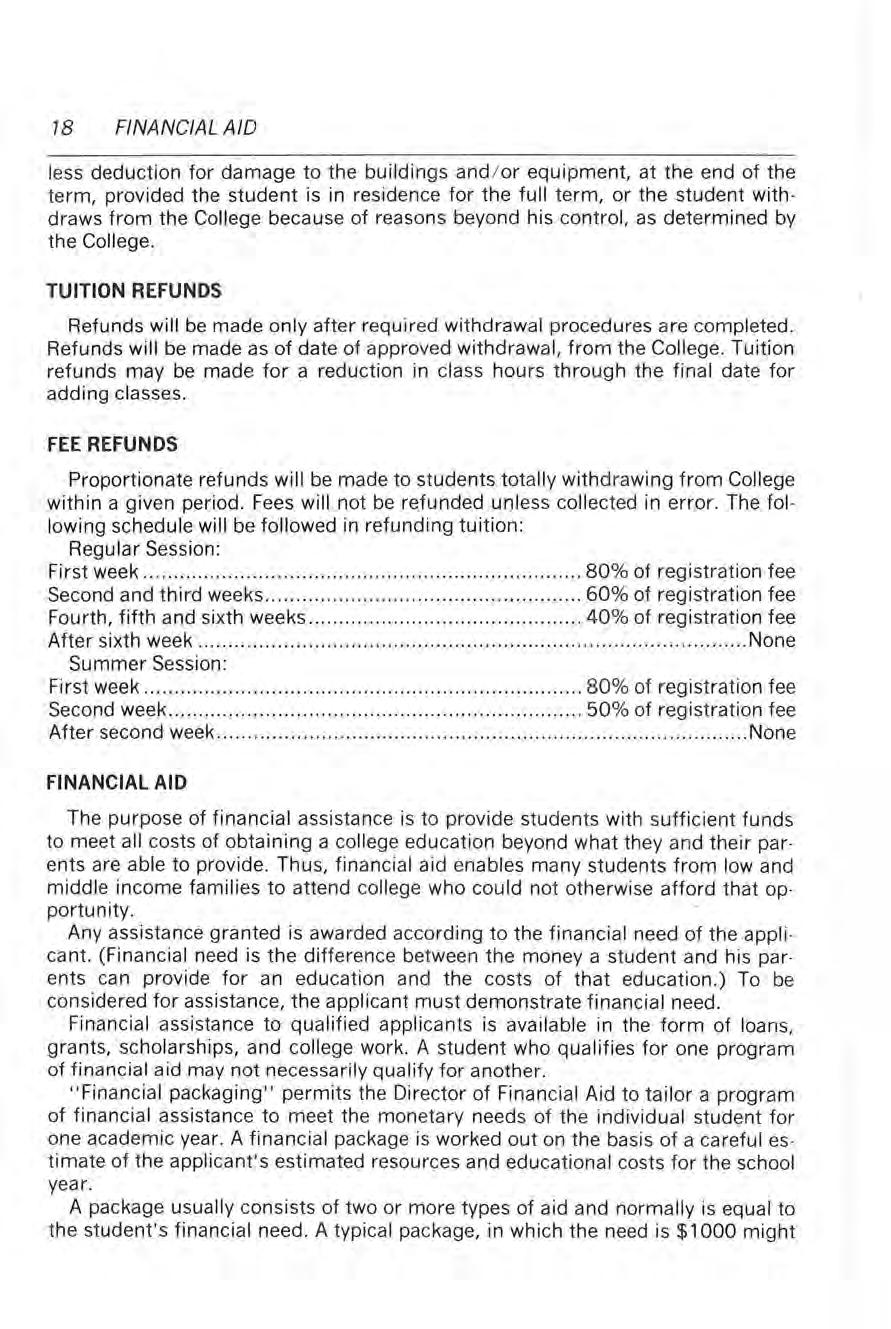
18
Regular Session: First week .......... .... .............. .... ..... ...... .... . ....... ................. 80 % of registration fee Second and third weeks 60 % of registration fee Fourth, fifth and sixth weeks .... ......... .. ............ . ...... .. ......... 40 % of registration fee After sixth week None Summer Session: First week .... .............. .. .. .. ... .... .............. .. ... .. . .. .............. .. . 80 % of registration fee Second week 50 % of registration fee After second week ...... .. . ...... ....... ........... .... ... . .... ................. .. ... .. .. . ...... .. ..... .. None
be as follows: National Direct Loan, $350; scholarship, $150; and College WorkStudy, $500.
Funds for the operation of the different financial aid programs are drawn from Federal and Institutional sources.
APPLYING FOR FINANCIAL ASSISTANCE
Any student who needs financial assistance, or desires to apply for a scholarship, should contact the Director of Financial Aid. Students are advised to begin the application procedure well before the deadline date, because establishing financial need is often a lengthy process. Applications for financial assistance for the coming year should be submitted to the Financial Aids office by April 15.
FEDERALLY FUNDED PROGRAMS
Basic Educational Opportunity Grant - BEOG. The Higher Education Amendments of 1972 established a Basic Educational Opportunity Grant. The size of the grant is determined after considering the cost of attending the college and the Family Educational contribution. This family contribution is determined from a Financial Statement which is a part of the Application.
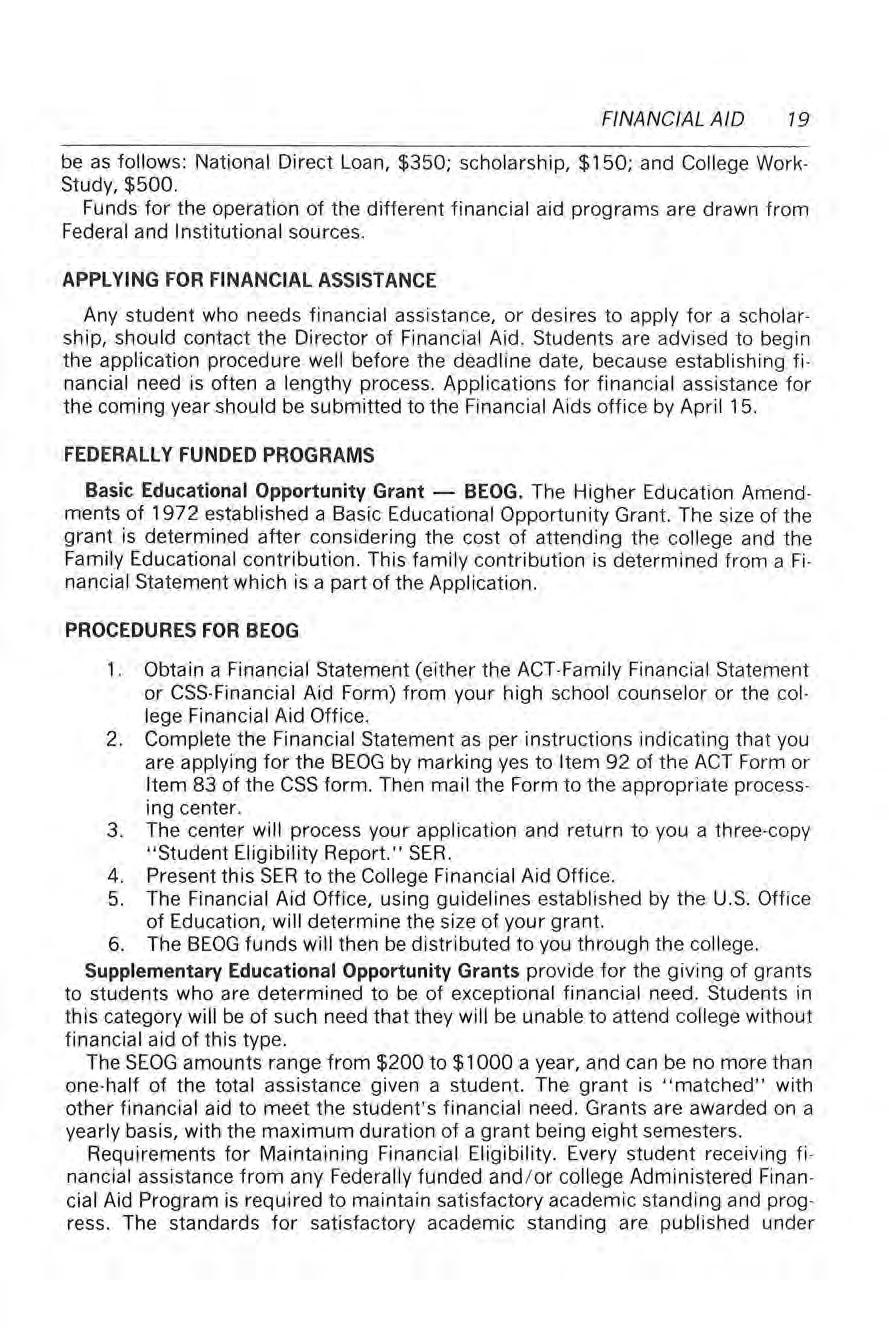
PROCEDURESFORBEOG
1. Obtain a Financial Statement (either the ACT-Family Financial Statement or CSS-Financial Aid Form) from your high school counselor or the college Financial Aid Office.
2. Complete the Financial Statement as per instructions indicating that you are applying for the BEOG by marking yes to Item 92 of the ACT Form or Item 83 of the CSS form. Then mail the Form to the appropriate processing center.
3. The center will process your application and return to you a three-copy "Student Eligibility Report." SER.
4. Present this SER to the College Financial Aid Office.
5. The Financial Aid Office, using guidelines established by the U.S Office of Education, will determine the size of your grant.
6. The BEOG funds will then be distributed to you through the college .
Supplementary Educational Opportunity Grants provide for the giving of grants to students who are determined to be of exceptional financial need. Students in this category will be of such need that they will be unable to attend college without financial aid of this type.
The SEOG amounts range from $200 to $1000 a year, and can be no more than one-half of the total assistance given a student. The grant is "matched" with other financial aid to meet the student's financial need Grants are awarded on a yearly basis, with the maximum duration of a grant being eight semesters.
Requirements for Maintaining Financial Eligibility. Every student receiving financial assistance from any Federally funded and / or college Administered Financial Aid Program is required to maintain satisfactory academic standing and progress. The standards for satisfactory academic standing are published under
FINANCIAL AID 19
FINANCIAL AID
"scholarship standards" in the academic information section of this catalog. The standards for Satisfactory Academic Progress as defined for Financial Assistance are published in the "College Student Handbook" and in the "Financial Aids Student Handbook."
SCHOLARSHIPS
Board of Trustee Scholarships. The Board of Trustees of the Nebraska State Colleges provides full tuition scholarships for current graduates of Nebraska High Schools who have demonstrated outstanding academic achievement. This achievement is assessed by high school class rank and performance on the entrance examinations. These scholarships are renewable to cover four regular academic years A special application is required for this scholarship.

Cooperating School Scholarships. One -Half Tuition Scholarships are granted to designated graduates from school systems which assist Peru State College in the training of Education majors. This scholarship is applicable to one -half of the basic tuition cost for the equivalence of eight semesters of college studies Inquiries concerning this scholarship should be directed to your High School.
Special Activity Tuition Waiv er . Financial assistance in the form of Partial Tuition Waivers are provided to students with special abilities in Athletics, Art, Debate, Drama, Journalism, Music, etc. Applicants for these awards should submit the Financial Aid Application indicating a desire to be considered for this scholarship. The applicant will then be contacted by the appropriate College official to determine the student 's qualification. These are approved for only one academic year and may be renewed
Special State of Nebraska Tuition Waiver. Partial Waivers are awarded to worthy students who have financial need.
Foreign Student Scholarships. Full-tuition scholarships are awarded annually to qualified undergraduate students who are citizens of other countries
Peru Achievement Foundation Scholarships. Through the generosity of alumni and friends of Peru State College, the Peru Achievement Foundation, Inc., awards scholarships which have been established on a permanent basis.
A listing of the amounts and qualifications for Scholarships that are awarded through the Foundation can be found at the conclusion of the information on Financial Aid.
Students may make application for a specific scholarship or any available scholarship on the College's scholarship application form, which may be obtained from the office of the Director of Financial Aids.
College Work-Study is intended primarily for students from low-income families and permits them to earn a part of their college expenses. During the time they are attending classes full time, the student can work a ma x imum of 15 hours per week. During vacation periods the students may be allowed to work 40 hours per week. Work -Study jobs are usually on-campus, and are vital to the efficient operation of the College.
National Direct Student Loans are low interest, long term loans made to students who need financial assistance in meeting educational expenses To be eligi-
20
ble, the student must be in good standing and be registered as a half-time student.
Federally Insured Student Loans are intended primarily for students who do not qualify for the other programs of financial assistance but who, nonetheless, need financial help.
INSTITUTIONALLY FUNDED PROGRAMS
College Work jobs are similar to the Work-Study jobs in pay scale, type of work performed, and hours worked.
Memorial Loan Funds established by various donors include: the $200 Willie Ethel Crone Loan Fund, established in 1943 by Miss Ruth Crone in memory of her mother; the $300 Harriet Louise Lindstrom Loan Fund, established in 1946 by the late C. R. Lindstrom and Mrs. Lindstrom in memory of their daughter; the Mrs. Eva Fischer Loan Fund provided in 1962 by a $500 bequest by the late Mrs . Eva Fischer of Beatrice; the Towne Loan Fund provided by a $1,411.24 bequest by the late Norman L. Towne of Bozeman, Montana, husband of the late Lola Howe Towne, class of 1906; the $250 Patricia Buethe Loan Fund, established in 1962 by friends of the late Mrs. L. Chris Buethe.
Loans from the College Loan Fund and Memorial Loan Fund are generally made on a short-term basis.
NEBRASKA CONGRESS OF PARENTS AND TEACHERS SCHOLARSHIPS
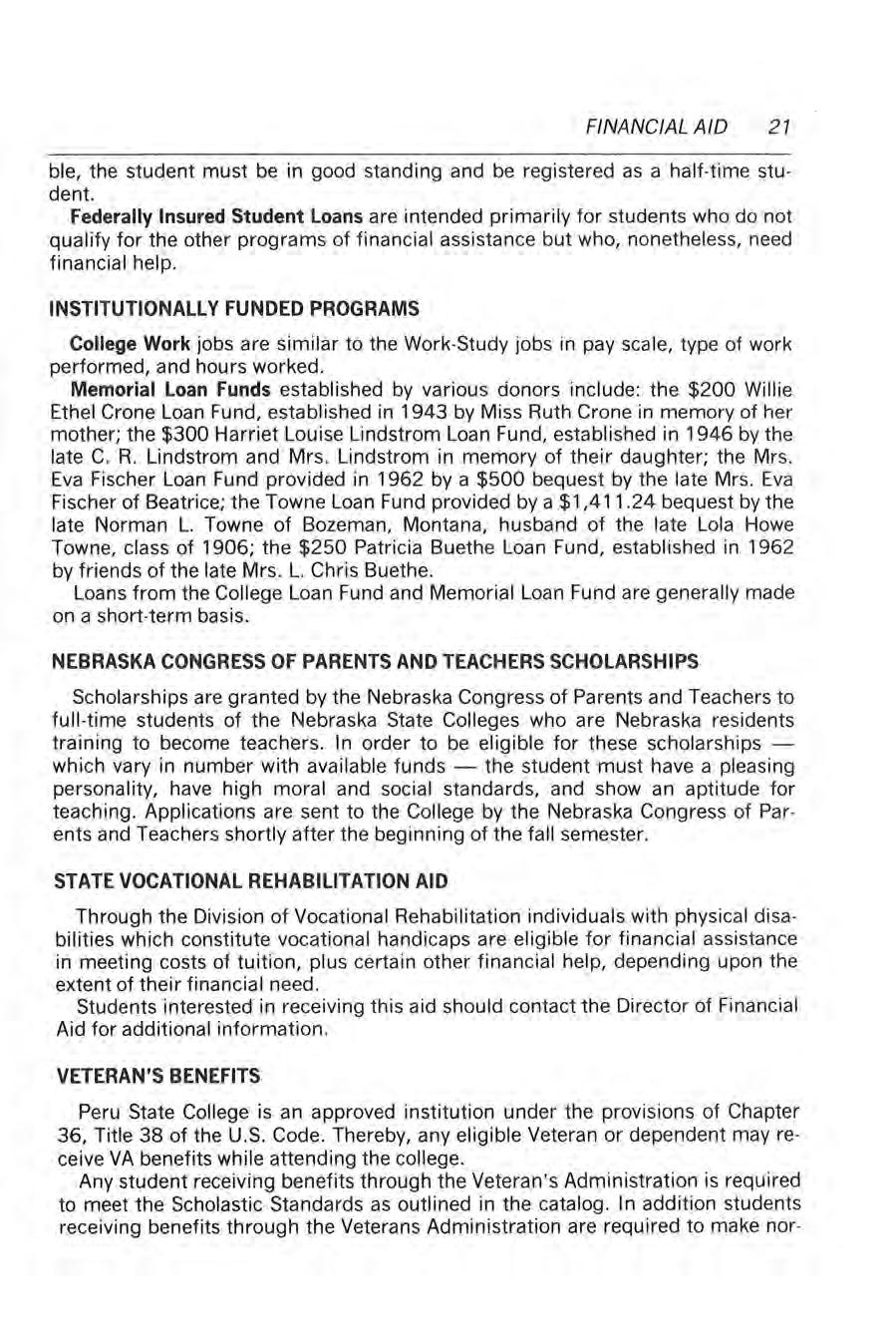
Scholarships are granted by the Nebraska Congress of Parents and Teachers to full -time students of the Nebraska State Colleges who are Nebraska residents training to become teachers. In order to be eligible for these scholarshipswhich vary in number with available funds - the student must have a pleasing personality, have high moral and social standards, and show an aptitude for teaching. Applications are sent to the College by the Nebraska Congress of Parents and Teachers shortly after the beginning of the fall semester.
STATE VOCATIONAL REHABILITATION AID
Through the Division of Vocational Rehabilitation individuals with physical disabilities which constitute vocational handicaps are eligible for financial assistance in meeting costs of tuition, plus certain other financial help, depending upon the extent of their financial need.
Students interested in receiving this aid should contact the Director of Financial Aid for additional information.
VETERAN'S BENEFITS
Peru State College is an approved institution under the provisions of Chapter 36, Title 38 of the U.S. Code. Thereby, any eligible Veteran or dependent may receive VA benefits while attending the college .
Any student receiving benefits through the Veteran ' s Administration is required to meet the Scholastic Standards as outlined in the catalog. In addition students receiving benefits through the Veterans Administration are required to make nor-
FINANCIAL AID 21
FINANCIAL AID
mal progress toward their educational objectives as defined in the col lege catalog. For more information contact the Financial Aid office at Peru State College.
AWARDS
Alpha Mu Omega Freshman Award. Presented by Alpha Mu Omega, honorary mathematics fraternity, to a member of the freshman c lass for excel lence in mathematics
A. V. and Wilhelmina Larson Memorial Industrial Arts Award. A $100 scho larship to be presented to a student completing his sophomore year who demonstrates promise as a teacher in the area of industrial arts.
B. E. Swenson, Jr., Athletic Award. Established in 1925 by Bert E. and Stella Swenson in memory of their son, B. E., Jr ., and their parents who made possible their early education at Peru. Juniors and seniors are eligible and no student shall rece iv e the award more than once. Basis for judgin g: 100 points. GeneralCharacter and personality, 15; Scholarship, 15; Loyalty to school tradition, 20; Athletics - Must rece iv e school letter in at least two different sports, in cluding either major or minor sports, 50 points. Th e two letters need not be earned in any one year.
Business Club Award. Presented by the United Business Education Association to an outstanding student in Business Education.
Dramatic Club Awards. Presented each year to the senior man and senior woman who have contributed most to dramatics during the four years in the College.
Kappa Delta Pi Educational Award. Presented by the Beta Mu Chapter of Kappa Delta Pi, national honorary educat ion al fratern ity, to the freshman whose scho larship and professional attitude are outstanding.
Louise Mears Geographical Award. Presented to a student with high scho lastic performance in the field of geography.
Neal S. Gomon Award. The Nea l S. Gomon Award is presented annua ll y to the Pedagogian staff member who is voted most outstanding in his contributions to the paper.
John C. Christ Award. An awa rd established in honor of Dr John C. Christ, Prof esso r of Biological Science. The award of f if ty dollars is to be g iv en to an outstanding high sc hool sen ior who plans to major in th e natural sciences at Peru State Co ll ege.
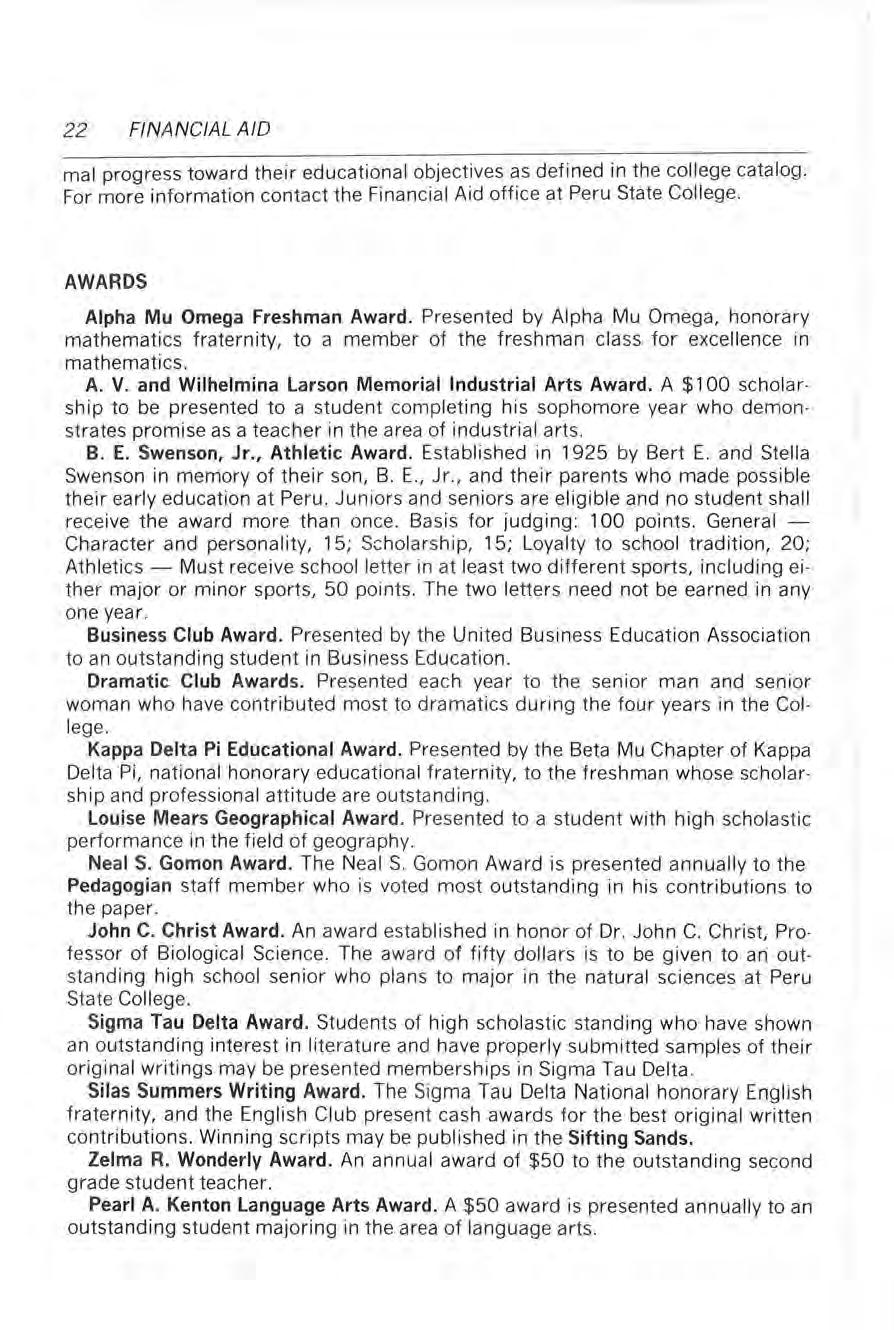
Sigma Tau Delta Award. Students of high scho la stic stand ing who have shown an outstanding interest in lit erature and have properly submitted samples of their origina l writings may be presented memb erships in Sigma Tau Delta.
Silas Summers Writing Award. The Sigma Tau Delta National honorary English fraternity, and the English Club present cash awards for the best origina l written contributions. Winning scripts may be published in the Sifting Sands.
Zelma R. Wonderly Award. An annual award of $50 to the outstanding second grade student teacher.
Pearl A. Kenton Language Arts Award. A $50 award is presented annua ll y to an outstand in g student majoring in the area of language arts.
22
Helen E. Cole Pollard Founders Award. Presented at spring honors convo ca tion to the senior who during his collegiate career has demonstrated loy alty and service to the College.
Mac Dunning Industrial Arts Award. A $50 annual cas h grant to an outstanding student in the area of indu stria l arts.
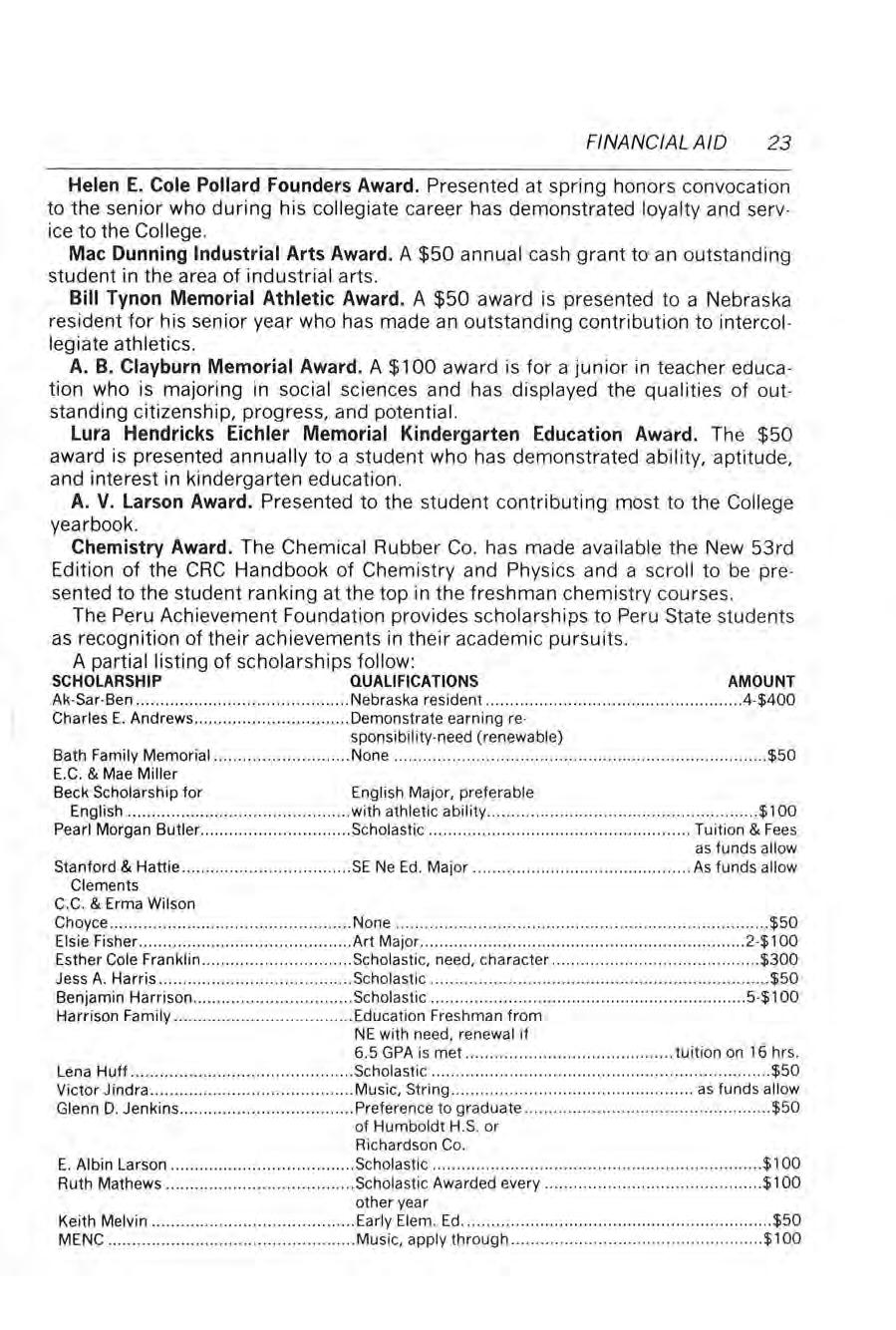
Bill Tynon Memorial Athletic Award. A $50 award is presented to a Nebraska resident for his senior year who has made an outstanding contribution to intercollegiate athletics
A. B. Clayburn Memorial Award. A $100 award is for a junior in teacher education who is majoring in social sciences and has displayed the qualities of outstanding citizenship, progress, and pot ential.
Lura Hendricks Eichler Memorial Kindergarten Education Award. The $50 award is presented annually to a student who has demonstrated ability, aptitude, and interest in kindergarten education.
A. V. Larson Award. Presented to the student contr ibuting most to the College yearbook.
Chemistry Award. The Chemical Rubber Co. has made available the New 53rd Edition of the CRC Handbook of Chemistry and Physics and a scroll to be presented to the student ranking at the top in the freshman chemistry courses .
The Peru Achievement Foundation provides scholarships to Peru State students as recognition of their achievements in their academic pursuits.
A partial listing of scholarships follow :
FINANCIAL AID 23
SCHOLARSHIP QUALIFICATIONS AMOUNT Ak-Sar -Ben Nebraska resident.. .4-$400 Charles E. Andrews ..... ...... . . . ................ . . Demonstrate earning responsibil ity-need (renewab le) Bath Family Memorial . ... .. ..... . ... . . .. . . ....... None ... .. ... .. .. . ... . ... .. .... ... ....... .. .. . . ........... . . .... .. .. . ...... . .... $50 E.C & Mae Miller Beck Scholarship for English Major , pr efe rable English with ath letic ability $100 Pearl Morgan Butler Scholastic Tuition & Fees as fund s allow Stanford & Hattie SE Ne Ed Major As fund s allow Clements C C & Erma Wilson Choy ce None $50 Elsie Fisher Art Maj o r 2-$ 100 Esther Cole Franklin Scholastic, ne ed, c haracte r $300 Jess A Harris Scholastic $50 Benjamin Harrison Scho lastic 5-$100 Harrison Family ... ... . ... .... ... .... ... . .. . . .. ...... Education Fre shm a n
NE with
newal
6.5 GPA
tuition o n 16 hrs Lena Huff Scholastic $50 Victor Jindra Music, String as funds a ll ow Glenn D Jenkins Preference to
$50 of Humb oldt H .S. or Richard so n
E. Albin Larson ..... . ... .. ..... ..... . ......... . ...... Scho la sti c ........ . .. .. .... .......... . .. ..... .. .. . ....... ...... .. . .. .. . .. . .... $100 Ruth Mathews Scho lastic Award ed
$100
year Keith Melvin . ....... .. .... .. . .. .. ......... . .. ... . .... . Early Elem. Ed . ..................... .............. .. .. . . . .. . . .. .. ... ......... .$50 MENC ........... ........ .. ....... . .. . . .......... . ..... .. Mu sic, apply through ... ........ . . ....... .. .. . .. ........ . .. .. .. .. . ....... $100
from
nee d, re
if
is met
graduate
Co
every
other
FINANCIAL AID
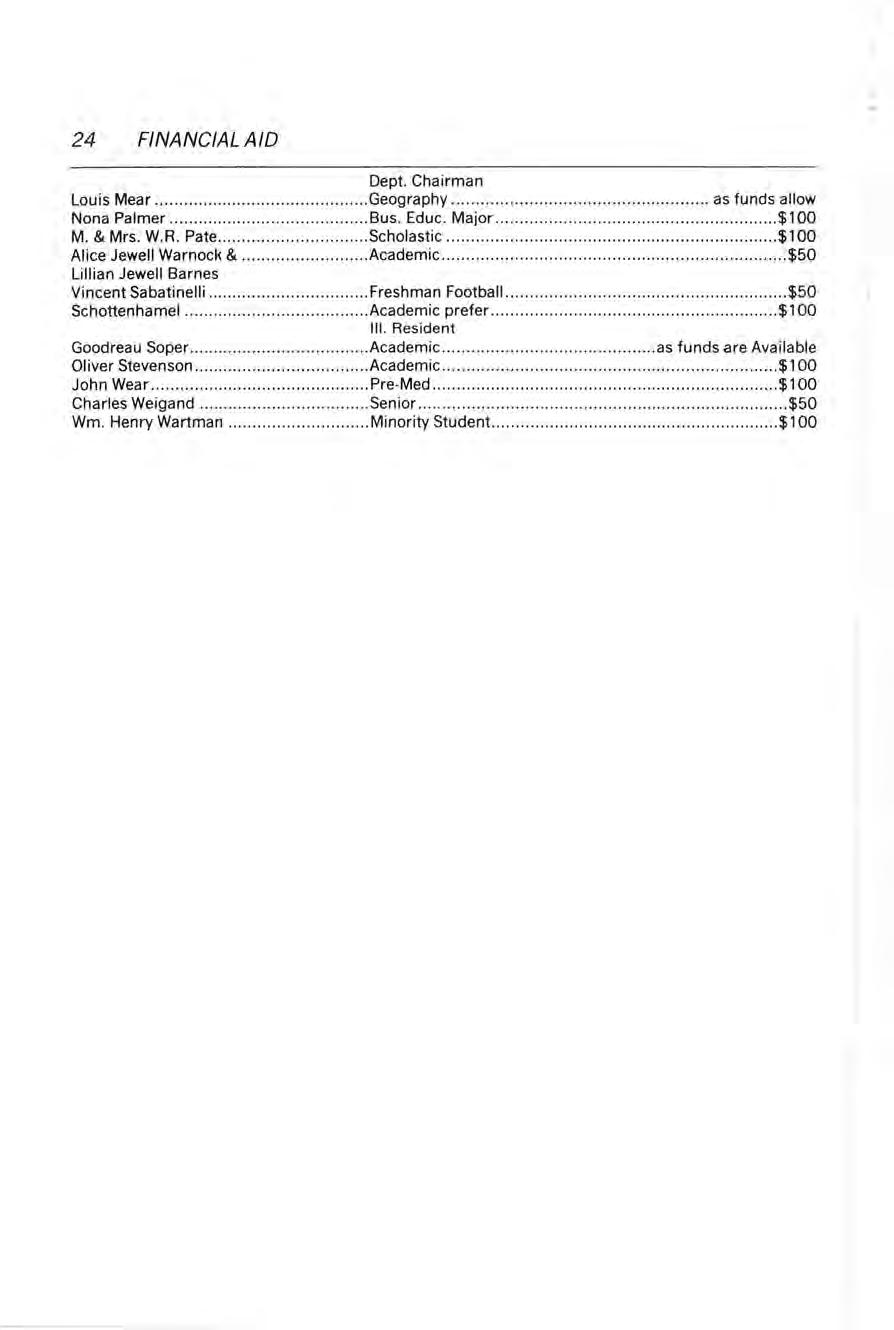
24
Dept. Chairman Louis Mear Geography as funds allow Nona Palmer Bus Educ. Major $100 M. & Mrs W R. Pate Scholastic $100 Alice Jewell Warnock & Academic $50 Lillian Jewell Barnes Vincent Sabatinelli Freshman Football $50 Schottenhamel Academic prefer $100 Ill. Resid ent Goodreau Soper .. ..... ...... . .. .... .... ....... ...... Academi c .. . .......... . .... .. ..... . .. .... .. .......... as funds are Available Oliver Stevenson ...... .. .. ...... .. ... .. .. ...... . .... Academic ....... .. ......... .. ..... .. ..... .. .......................... .... ... .. $100 John Wear Pre-Med $100 Charles Weigand Senior $50 Wm. Henry Wartman Minority Student $100
Campus Life
The College has as its constant goal the best possible adaptation of its educational opportunities to the interest, needs, and abilities of each student.
Each student is assigned to a faculty advisor who is qualified to advise him in his field. Students needing advice before the opening of the college year are invited to arrange a conference with the Admissions Office of the College by definite appointment.
ORIENTATION
Prior to the opening of classes, the College arranges a Welcome Week program, which is designed to give special attention to problems of students who are entering the College. Both Freshmen and transfer students are to attend. The program acquaints the student with his new environment and offers him a helpful introduction to campus life. He completes tests and is assigned to a faculty advisor who is available to assist the student throughout his college career in defining goals to be reached in college and give information regarding appropriate curriculums and courses. Opportunity to meet members of the faculty and other members of the student body is afforded through social events.
COUNSELING AND TESTING SERVICES
During the college experience, students sometimes feel the need for assistance in dealing with their problems, whether they be personal, vocational, educational, or social. To aid students in coping with these concerns, a counseling psychologist within the Office of Student Development acts as an initial contact. Depending upon the nature of the difficulty, the student may be counseled by that office or referred to other campus services.

The Office of Student Development handles cases involving vocational choice, educatio1al planning, and cases which involve social or psychological problems. In some instances cases irivolving social or psychological dysfunction are referred to clinical psychologists or psychiatric social workers available through the Blue Valley Mental Health Association in Auburn, Nebraska.
Students needing tutoring, study skills counseling, or help in developmental reading may be referred to the Teaching-Learning Center.
In add ition to the above services, pastoral counseling is available through the auspices of the United Ministries to Higher Education .
Peru State routinely administers the American College Assessment Program, the College Level Examination Program, and the Teacher Education Program. In addition, other tests are available on an individual basis in the areas of mental ability, personal adjustment, and interest in conjunction with the Office of Student Development.
CAREER PLANNING & PLACEMENT SERVICES
The Placement Center at Peru State College offers a wide range of services available to al! students and alumni in career preparation. It assists students in
CAMPUS LIFE 25
CAMPUS LIFE
contacting employers through campus in terv iews, job referrals, job-seeking techniques and by supporting their job applications through documentation and records. The Center also provides informal assistance to students leaving the college to seek summer employment or part-time work, by helping them identify potential employers.
The career / occupational library in the Center provides students with a background of general and specific information, related to their field of study, for interviewing purposes and graduate study programs . Also it includes assistance in the form of brochures and pamphlets in constructing resumes and letters of application.
Also available through the Center are Career Alternative / Life Planning workshops designed to provide practical application of knowledge and skills gained in college to career areas.
There is a nominal fee for sending credentia ls and the mailing of vacancy lists which are issued periodically. The fee includes service from September 1 to August 31 of the following year.
STUDENT HEALTH SERVICE
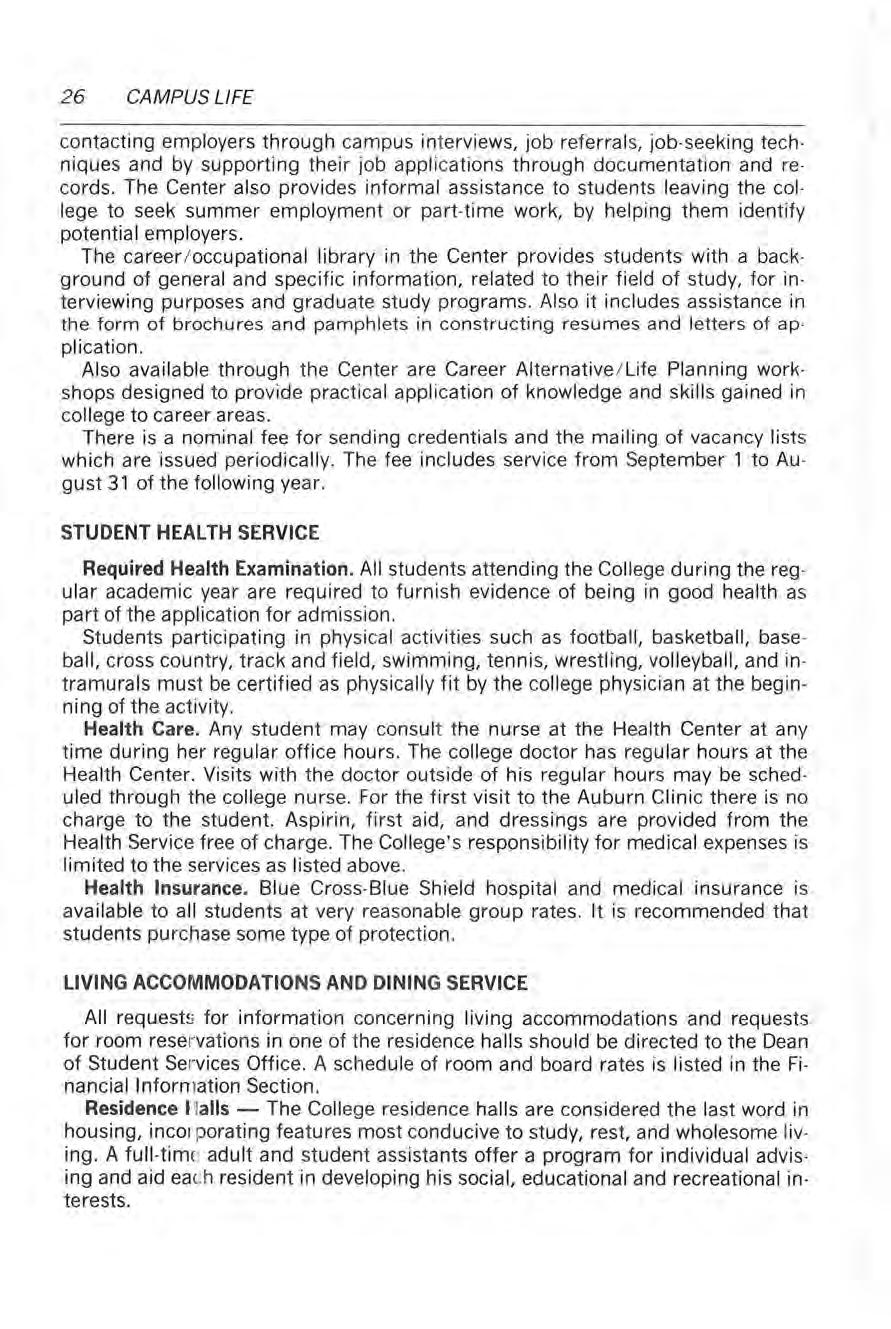
Required Health Examination. All students attending the College during the regular academic year are required to furnish evidence of being in good health as part of the application tor admission .
Students participating in physical activities such as football, basketball, baseball, cross country, track and field, swimming, tennis, wrestling, volleyball, and intramurals must be certified as physically fit by the co ll ege physician at the beginning of the activity.
Health Care. Any student may consult the nurse at the Health Center at any time during her regular office hours. The college doctor has regular hours at the Health Center. Visits with the doctor outside of his regular hours may be scheduled through the college nurse. For the first visit to the Auburn Clinic there is no charge to the student. Aspirin, first aid, and dressings are provided from the Health Service free of charge. The College's responsibility tor medical expenses is limited to the services as listed above.
Health Insurance. Blue Cross-Blue Shield hospital and medical insurance is available to all students at very reasonable group rates. It is recommended that students purchase some type of protection .
LIVING ACCOMMODATIONS AND DINING SERVICE
All requests tor information concerning living accommodations and requests tor room rese rvations in one of the residence halls should be directed to the Dean of Student Se 1-vices Office. A schedule of room and board rates is listed in the Financial Information Section.
Residence Malls - The College residence halls are considered the last word in housing, inco1 porating features most conducive to study, rest, and wholesome living . A full -tim e adult and student assistants offer a program tor individual advising and aid ea c h resident in developing his social, educational and recreational interests.
26
Students are responsible for cleaning their own rooms. Cleaning equipment is available and may be checked out from the hall office Students are also responsible for supplying their own linen and bedding, including pillows and mattress pads. Residents are welcome to bring other personal belongings from home such as radios, stereos, etc Hot plates for cooking are not allowed.
The lower level of each hall is equipped with kitchen facilities, washers and dryers, and recreation equipment such as pool and ping pong tables
All unmarried freshman and sophomore students, except those living with parents or guardians, must live in college residence halls Exceptions to this will be handled by the College on an individual basis, with requests for exceptions to be submitted to the Dean of Student Service . For details concerning specific regulations of the residence halls refer to the "Residence Hall Contract" which may be obtained from the Office of the Dean of Student Services.
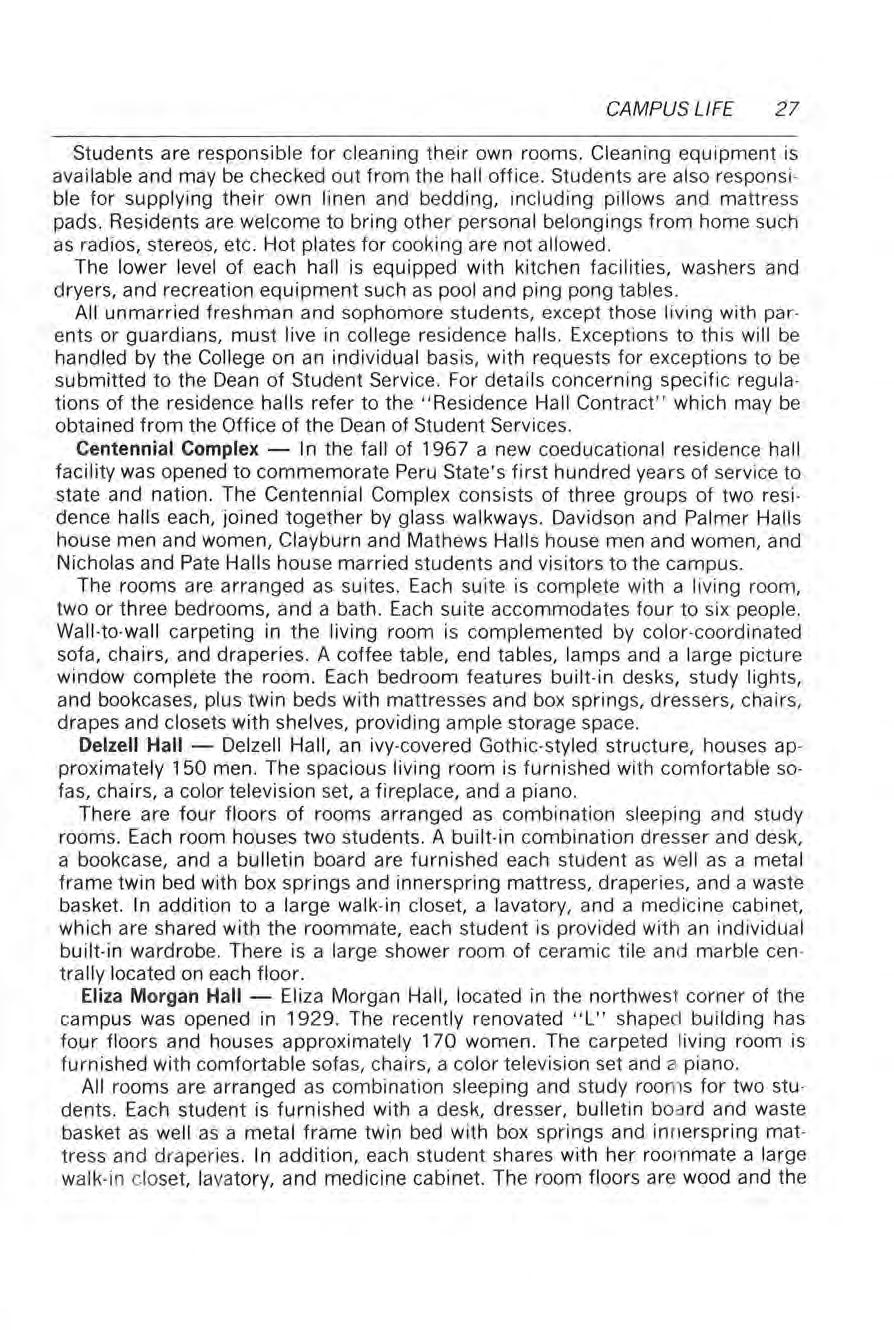
Centennial Complex - In the fall of 1967 a new coeducational residence hall facility was opened to commemorate Peru State's first hundred years of ser vice to state and nation. The Centennial Complex consists of three groups of two residence halls each, joined together by glass walkways. Davidson and Palmer Halls house men and women, Clayburn and Mathews Halls house men and women, and Nicholas and Pate Halls house married students and visitors to the campus.
The rooms are arranged as suites. Each suite is complete with a living room, two or three bedrooms, and a bath. Each suite accommodates four to six people. Wall -to-wall carpeting in the living room is complemented by color-coordinated sofa, chairs, and draperies . A coffee table, end tables, lamps and a large picture window complete the room. Each bedroom features built -in desks, study lights, and bookcases, plus twin beds with mattresses and bo x springs, dressers, chairs, drapes and closets with shelves, providing ample storage space.
Delzell Hall - Delzell Hall, an ivy-covered Gothic-styled structure, houses approximately 150 men. The spacious living room is furnished with comfortable sofas, chairs, a color television set, a fireplace, and a piano.
There are four floors of rooms arranged as combination sleeping and study rooms. Each room houses two students. A built-in combination dresser and desk, a bookcase, and a bulletin board are furnished each student as well as a metal frame twin bed with box springs and innerspring mattress, draperies, and a waste basket. In addition to a large walk-in closet, a lavatory, and a me d icine cabinet, which are shared with the roommate, each student is provided with an individual built-in wardrobe. There is a large shower room of ceramic tile and marble centrally located on each floor .
Eliza Morgan Hall - Eliza Morgan Hall, located in the northwes t corner of the campus was opened in 1929. The recently renovated "L" shaped building has four floors and houses approximately 170 women. The carpeted living room is furnished with comfortable sofas, chairs, a color television set and a piano.
All rooms are arranged as combination sleeping and study rooms for two students. Each student is furnished with a desk, dresser, bulletin bo ard and waste basket as well as a metal frame twin bed with box springs and in ne rspring mattr ess and draperies. In addition, each student shares with her roommate a large walk-i n c lo set, lav atory, and medicine cabinet. The room floors are wood and the
CAMPUS LIFE 27
CAMPUS LIFE
corridors are carpeted. There is a large shower room centrally located on each floor.
Married Student Housing - Unfurnished one and two bedroom units are available in Oak Hill Housing. Each unit is equipped with a stove, refrigerator, washer, and dryer.
Furnished one and two bedroom apartments are available at the Centennial Complex. Laundry facilities are centrally located for use by all the residents.
Utilities are included in the rental fee for all married student housing. College operated housing for married students is leased on a semester basis, with the rent payable monthly in advance. A deposit is required and is refundable at the end of the lease period provided the property is left in good condition. Inquiries concerning these facilities should be directed to the Housing Office.
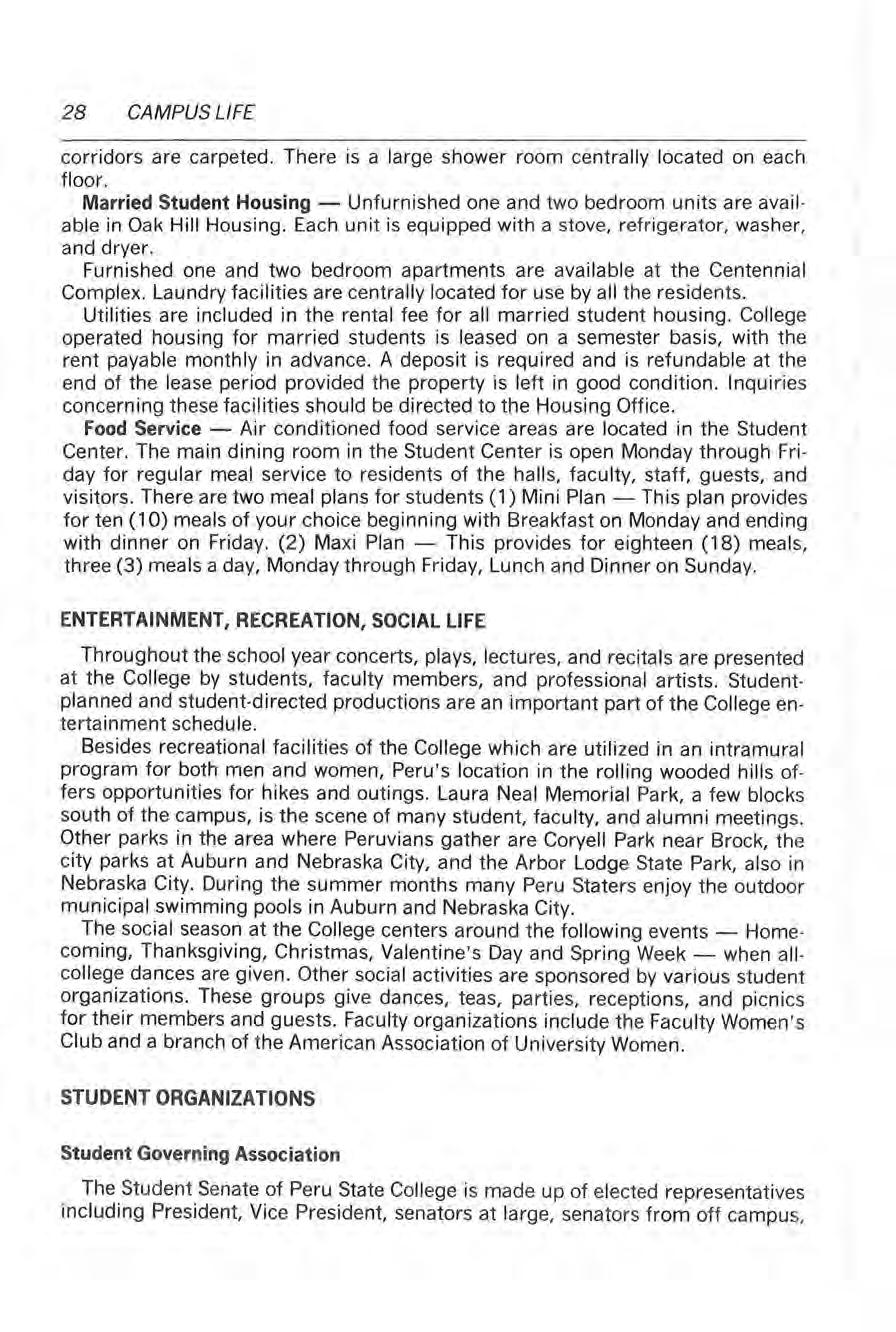
Food Service - Air conditioned food service areas are located in the Student Center. The main dining room in the Student Center is open Monday through Friday for regular meal service to residents of the halls, faculty, staff, guests, and visitors. There are two meal plans for students (1) Mini Plan - This plan provides for ten (10) meals of your choice beginning with Breakfast on Monday and ending with dinner on Friday. (2) Maxi Plan - This provides for eighteen (18) meals, three (3) meals a day, Monday through Friday, Lunch and Dinner on Sunday .
ENTERTAINMENT, RECREATION, SOCIAL LIFE
Throughout the school year concerts, plays, lectures, and recitals are presented at the College by students, faculty members, and professional artists. Studentplanned and student-directed productions are an important part of the College entertainment schedule.
Besides recreational facilities of the College which are utilized in an intramural program for both men and women, Peru's location in the rolling wooded hills offers opportunities for hikes and outings. Laura Neal Memorial Park, a few blocks south of the campus, is the scene of many student, faculty, and alumni meetings. Other parks in the area where Peruvians gather are Coryell Park near Brock, the city parks at Auburn and Nebraska City, and the Arbor Lodge State Park, also in Nebraska City. During the summer months many Peru Staters enjoy the outdoor municipal swimming pools in Auburn and Nebraska City.
The social season at the College centers around the following events - Homecoming, Thanksgiving, Christmas, Valentine's Day and Spring Week - when allcollege dances are given. Other social activities are sponsored by various student organizations. These groups give dances, teas, parties, receptions, and picnics for their members and guests. Faculty organizations include the Faculty Women's Club and a branch of the American Association of University Women.
STUDENT ORGANIZATIONS
Student Governing Association
The Student Senate of Peru State College is made up of elected representatives including President, Vice President, senators at large, senators from off campu s,
28
and class officers. The Senate is dedicated to bringing students' interests and opinions to a meaningful focal point in the operation of the College
The Student Senate has voting members on the following official college bodies: the College Affairs Council, Academic Affairs Commission, Library Committee, Teacher Education Committee, Institutional Relations Committee and Student Affairs Commission. SGA offices are located in the Student Center.
SENIOR, JUNIOR, SOPHOMORE, AND FRESHMAN classes are considered definite organizations. Each class is assisted with its activities by a member of the faculty, who acts as sponsor during the school year.
MEN'S HALL COUNCILS AND WOMEN STUDENTS ASSOCIATION are representative councils selected by the residents of the men's and women's residence halls, respectively. The governing bodies of the halls handle problems and plan social activities for the residents.
Educational and Social
The CONCERNED BLACK STUDENTS is open to all students interested in promoting the understanding of people.
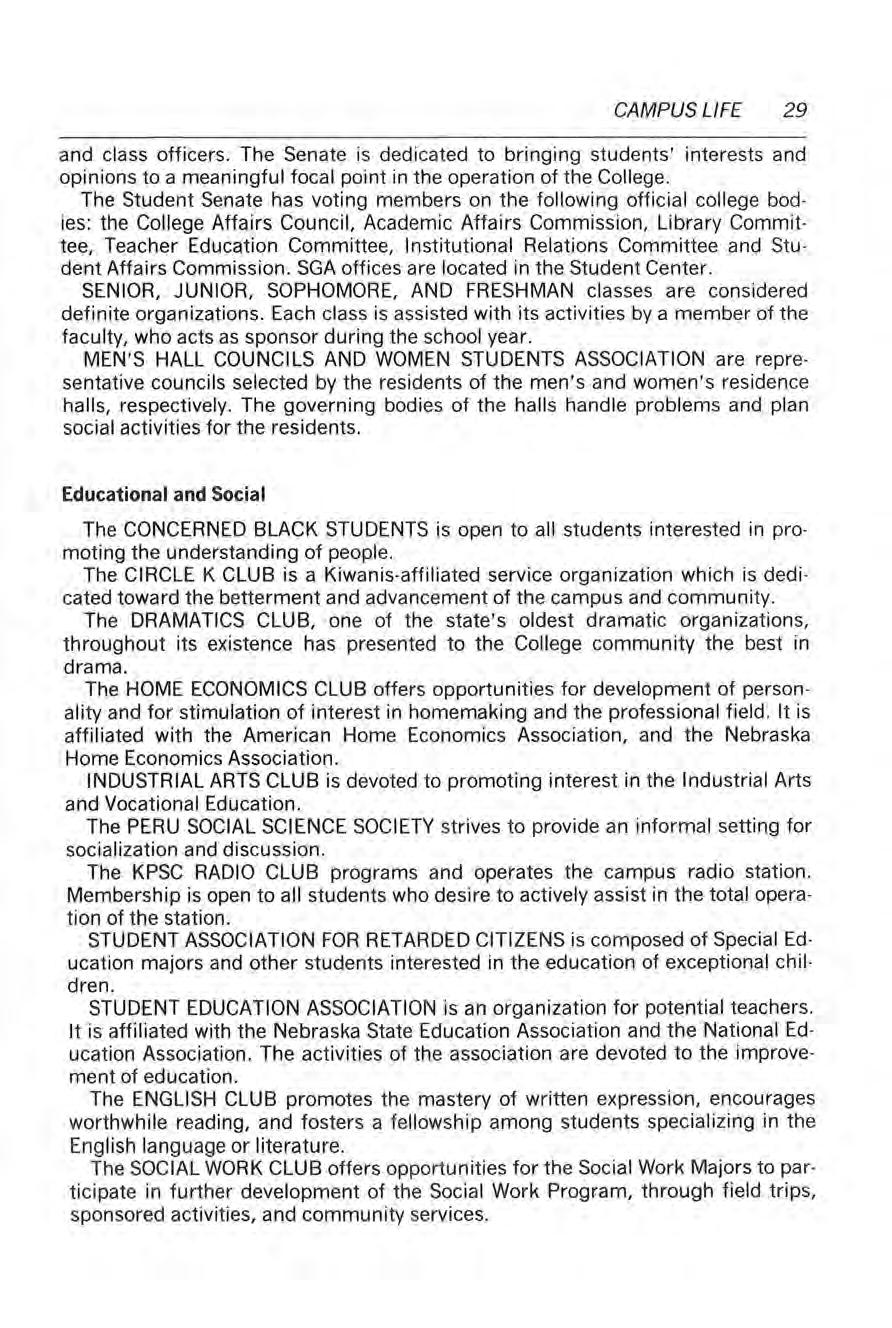
The CIRCLE K CLUB is a Kiwanis-affiliated service organization which is dedicated toward the betterment and advancement of the campus and community
The DRAMATICS CLUB, one of the state ' s oldest dramatic organizations, throughout its existence has presented to the College community the best in drama
The HOME ECONOMICS CLUB offers opportunities for development of personality and for stimulation of interest in homemaking and the professional field. It is affiliated with the American Home Economics Association, and the Nebraska Home Economics Association.
INDUSTRIAL ARTS CLUB is devoted to promoting interest in the Industrial Arts and Vocational Education .
The PERU SOCIAL SCIENCE SOCIETY strives to provide an informal setting for socialization and discussion
The KPSC RADIO CLUB programs and operates the campus radio station. Membership is open to all students who desire to actively assist in the total operation of the station.
STUDENT ASSOCIATION FOR RETARDED CITIZENS is composed of Special Education majors and other students interested in the education of exceptional children.
STUDENT EDUCATION ASSOCIATION is an organization for potential teachers. It is affiliated with the Nebraska State Education Association and the National Education Association. The activities of the association are devoted to the improvement of education.
The ENGLISH CLUB promotes the mastery of written expression, encourages worthwhile reading, and fosters a fellowship among students specializing in the English language or literature.
The SOCIAL WORK CLUB offers opportunities for the Social Work Majors to participate in further development of the Social Work Program, through field trips, sponsored activities, and community services.
CAMPUS LIFE 29
Religious
Two religious groups are avai lable to Peru Staters. These groups are the Fellowship of Christian Athletes and Peru Students for Christ.
Music
The PERU CHORUS, open to all students, is devoted to the stud y and performance of good choral literature.
The BAND PROGRAM is divided into three divisions - the Marching Band, the Concert Band, and the Instrumental Ensembles.
STUDENT M.E.N.C. The Student Chapter of the Nebraska Music Educators Association and the Music Educators National Conference i s open to all students interested in music The club sponsors in strumenta l and vocal clinics and other musical productions annually .
Athletic
The "P" CLUB membership is made up of Peru State College students who have lettered in any intercollegiate sport. The fostering of good sportsmans hip i s the club's purpose.
The WOMEN'S ATHLETIC ASSOCIATION is open to students interested in women's physical education and athletics.
The FELLOWSHIP OF CHRISTIAN ATHLETES (FCA) is an organizat ion open to all student-athletes interested in sharing their belief in God.
Pep
PERU STATE COLLEGE CHEER LEADER S are chosen after a tryout before a panel of faculty and staff. They lead chants and boost spirit at ath leti c events.
Honorary
ALPHA MU OMEGA, honorary mathematics fraternity, aims to develop and promote interest in the study of mathematics Students who have or are current ly enro lled in analyt ica l geometry with above average grades in mathematics are eli gible for membership .
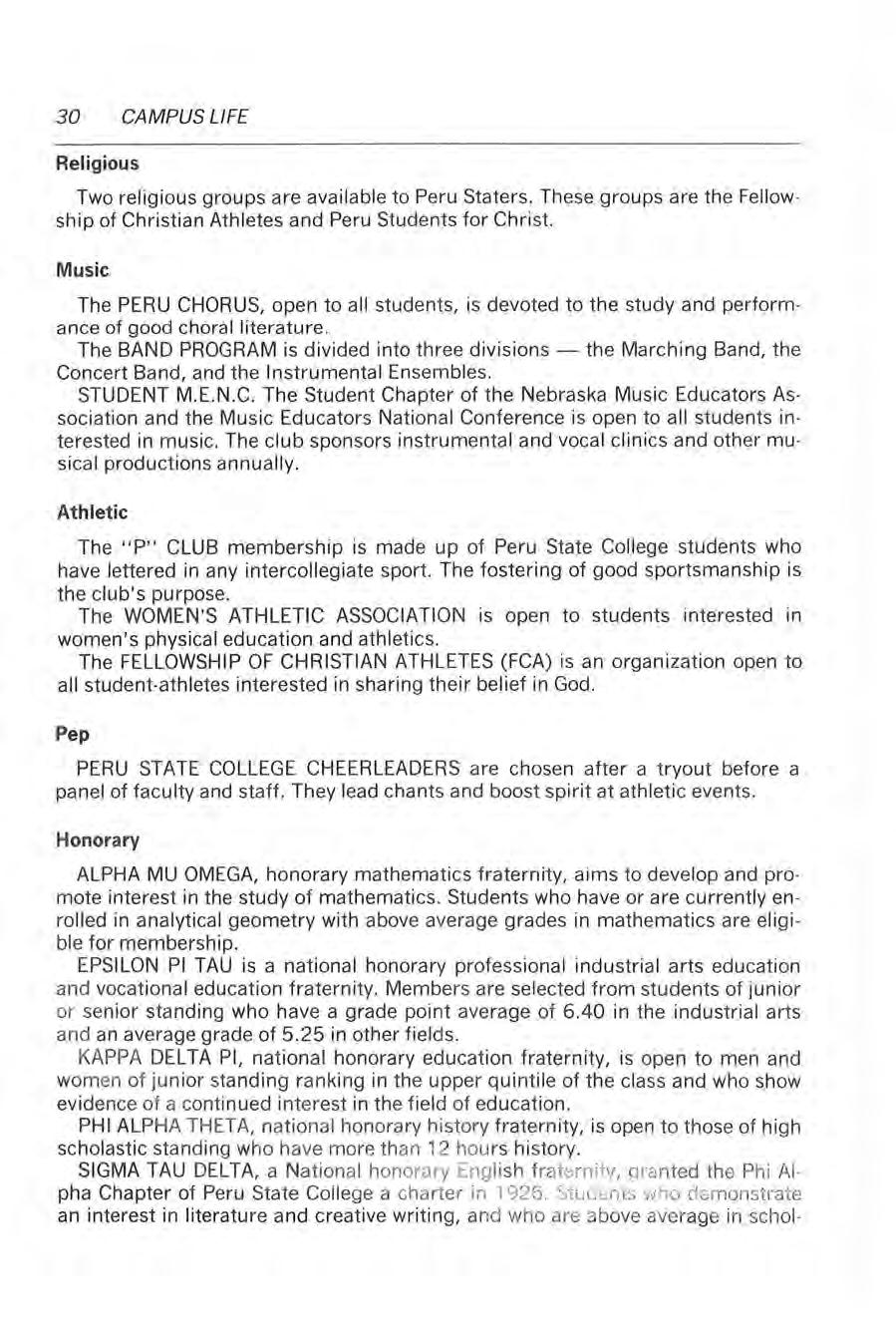
EPSILON Pl TAU is a national honorary professional industri al arts education and vocational education fraternity. Members are selected from students of junior or senior stand ing who have a grade point average of 6.40 in the industrial arts and an average grade of 5.25 in other fields.
KAPPA DELTA Pl, national honorary education fraternity, is open to men and wom en of j unior standing r a nking in the upper qu intil e of the class and who show evidenc e of a continued interest in the fie ld of education
PHI ALP HA THETA, natio nal hon ora ry h istor y fraternity, is open to those of high scholastic standing who have m or e th an 12 ho u rs history.
SIGMA TAU DELTA , a Nation al hono rar y Eng lish fr aternity , gran ted th e Ph i Alpha Chapter of Peru State Coll ege a cha rter in 1926. Stud ents who demonstrate an interest in literatur e and creative writing, and w ho are ab ove ave rag e in sc ho l -
30
CAMPUS LIFE
arship are eligible for membership . The local fraternity aids the English Club in publishing Sifting Sands.
BETA BETA BETA, professional honorary biology fraternity, is open to juniors and seniors whose field of concentration is biological science . Candidates for membership must be above average in scholarship and must plan to make biology their permanent interest.
GAMMA THETA UPSILON, international honorary geographical society, is open to students who have high scholastic standing in three membership classes; regular, honorary, or associate. ·
PHI BETA LAMBDA The local chapter, Epsilon Tau, is a business fraternity affiliated at both the state and national levels Membership is open to all students interested in business.
LAMBDA DELTA LAMBDA is an honorary fraternity for all people who are interested in physical science.
WHO'S WHO Among Students in American Universities and College s annually determines the number of students with senior standing in the College who may be selected for this honor. These honorees are selected by a committee of student s and faculty on the ba s is of scholarship, leadership and participation in academic and extracurricular activities, citizenship and service to the College, and promise of future usefulness in business and society.
Stud ent Publication s
Th e Pedagogian is the official college newspaper . It is published weekly during the academic year under the supervision of the journalism instructor. Although contributions are welcomed, the majority of the writing and editing is done by the students in journalism classes
Th e Stud ent Life Handbook is published in the late summer by the Office of Student Services. The publication serves as a guide to campus living for all students .
Sifting Sa nd s is a magazine of student writing published each spring by the English Club and Sigma Tau Delta.
Campu s Radi o
KPSC is the call number for the Peru State College radio station. Thi s station broadcasts to buildings on the campus, and serves as a laboratory for radio and speech classes
STU DE NT CO NDUCT
Each student is expected to conduct himself in accordance with the regul ation s of the college and such laws of the City, State, and Federal Government s as appl y to matters of personal conduct.
The College reserves the righ t to exclude at any time students whos e conduct is deemed unde sirable or injurious to the best intere st s of the Colle g e, or of the student.
Fo r deta iled information regarding student condu ct, see the Peru State College Code of St udent Conduct and the Student Life Handboo k.
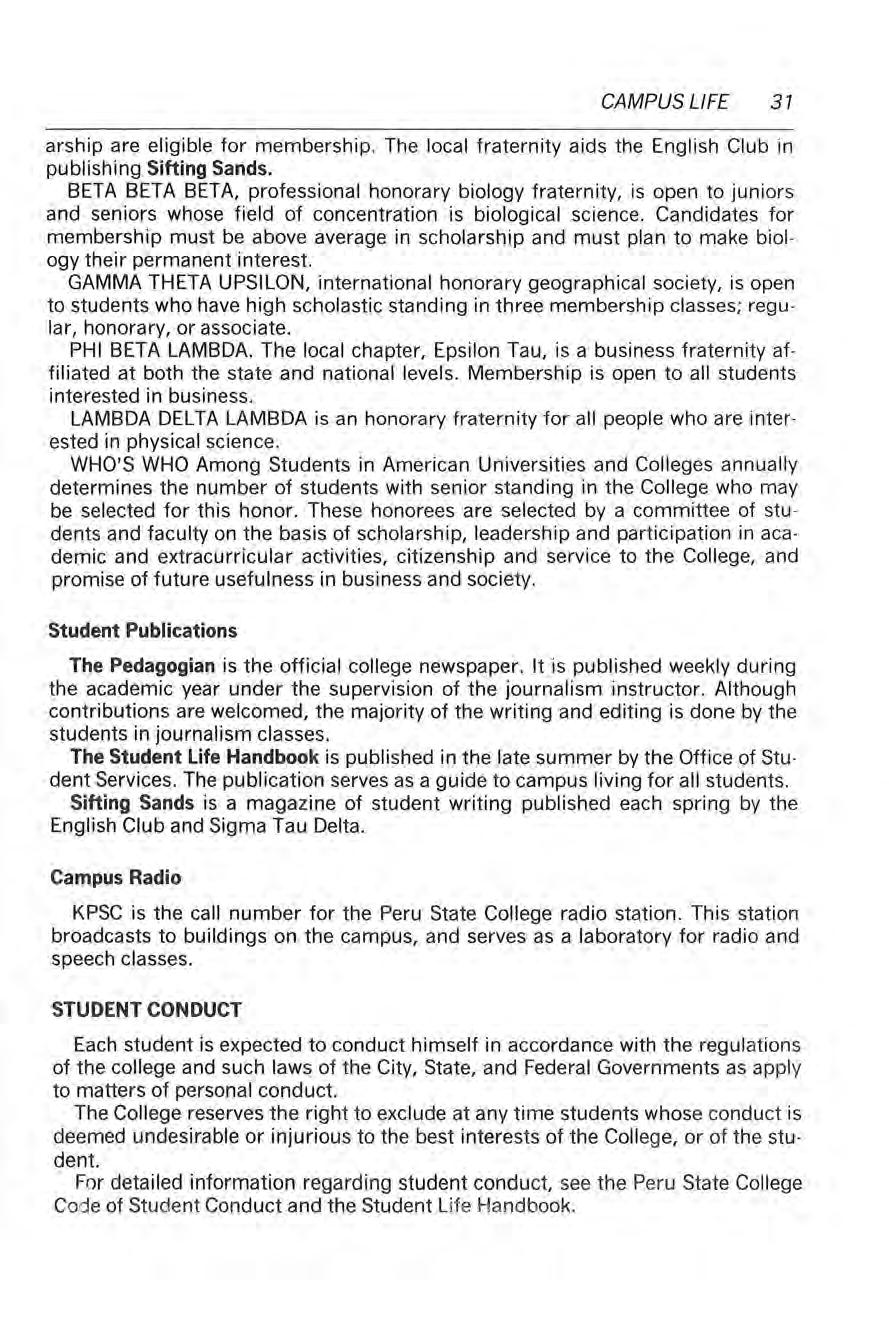
CAMPUS LIFE 31
CAMPUS LIFE
AUTO REGISTRATION AND PARKING
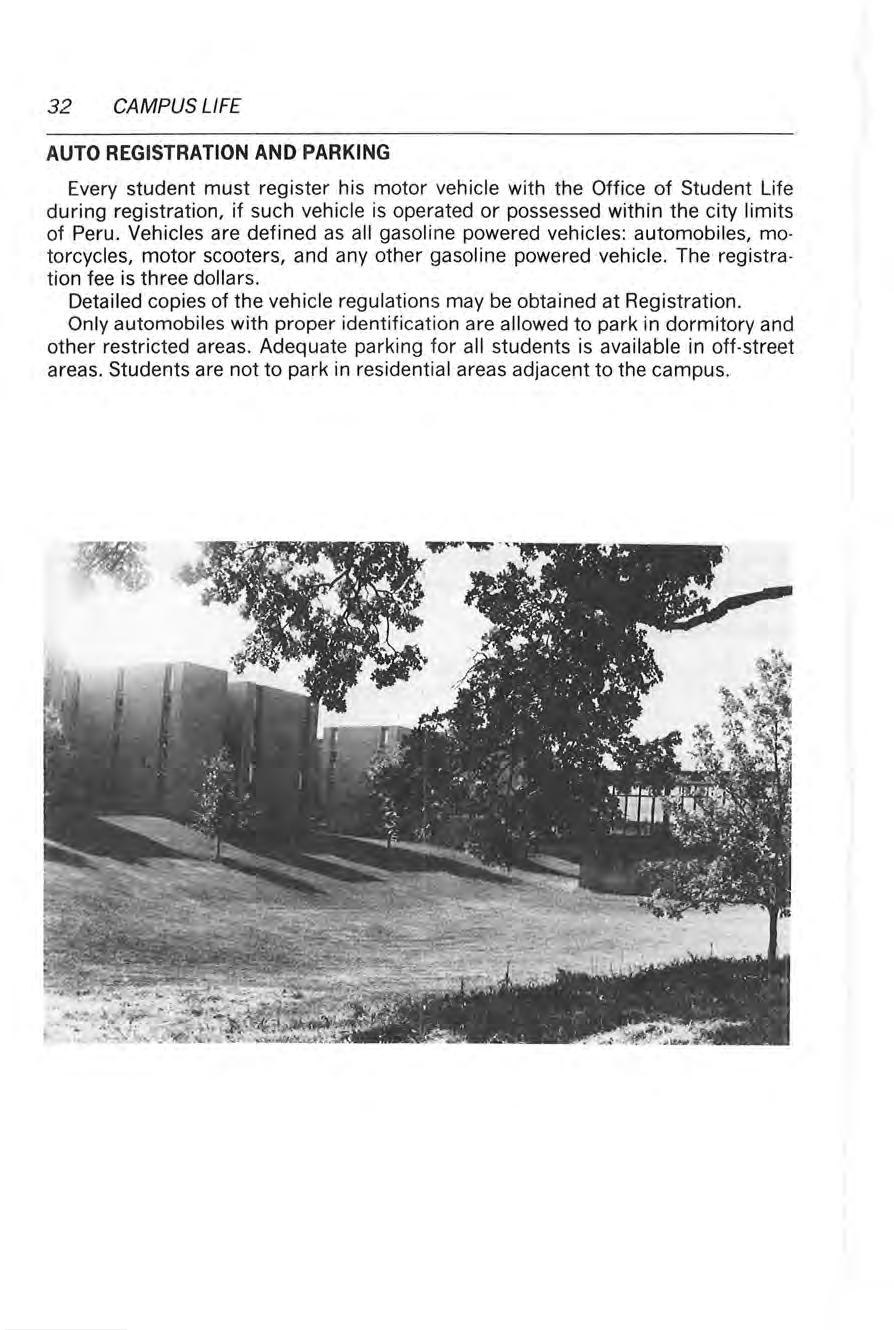
Every student must register his motor vehicle with the Office of Student Life during registration, if such vehicle is operated or possessed within the city limits of Peru. Vehicles are defined as all gasoline powered vehicles: automobiles, motorcycles, motor scooters, and any other gasoline powered vehicle. The registration fee is three dollars.
Detailed copies of the vehicle regulation s may be obtained at Registration
Only automobiles with prop er identification are allowed to park in dormitory and other restricted areas Adequate parking for all students is available in off-street areas. Students are not to park in resident ial areas adjacent to the campus .
32
Academic Information
The College is supported by the State of Nebraska for the purpose of meeting the educational needs at the college level of citizens of the state. The College is a multi-purpose regional institution with a broad variety of programs in general liberal arts, vocational -technical education, teacher education, and a variety of preprofessional or terminal vocational education programs culminating in a Bachelor of Arts, Bachelor of Science, or a Bachelor of Technology degree and Associate of Arts degrees in certain vocational areas. The College also provides programs of instruction for adults in learning centers throughout southeast Nebraska .
SELECTION OF PROGRAM OF STUDIES
The studies offered by the College include four-year professional curricula in elementary education and in secondary education; a four-year liberal arts program; a bachelor of science program flexible enough to satisfy a variety of interests and objectives; and a number of one -year and two -year terminal and pre-professional curricula.
In general, the various curricula offered by the College consist partly of general studies course and partly of specialized courses The general studies courses are those set forth as important for all individuals for effective living, regardless of their vocations. The specialized courses are those that prepare specifically for teaching or other vocations, or satisfy special avocational or cultural interests.

Upon enrolling, a student chooses a vocational objective or a major of principal cultural interest. This determines the curriculum that he will follow and the advisor who will guide him in his educational experiences. Th e choice may be tentative and may be changed later. Students who desire special assistance in selecting a vocational goal may request vocational counseling from thei r academic advisors and the Director of Placement.
Students who are undecided in regard to a vocational and / or educational goal may register in a general category .
DEGREES
The College is authorized by law and rules of the Board of Trustees of the Nebraska State Colleges to issue the following degrees:
Bachelor of Arts in Education (A . B. in Educ.) This degree is given to candidates whose field of concentration is in one of the following fields: Art, History and Social Science o r Language Arts.
Bachelor of Fine Arts in Education (B.F.A . in Educ.) Music.
Bachelor of Scienc e in Education (B.S. in Educ.) This degree is given to candidates whose field of concentration is in one of the following fields: Physical Education, Practical Arts, Mathematics and Science, Elementary Education or Library Science
Bachelor of Arts (A.B.) This degree is given to candidates without regard to field of concentration and without the professional education r equirements . (See Additional Requirements)
ACADEMIC IN FORMATION 33
ACADEMIC IN FORMATION
Bachelor of Science (B .S. ) This degree is given to candidates without the professional education and / or the modern language requirement .
Bachelor of Technology. This is an alternative degree for candidates who transfer from other institutions, having completed a prescribed one or two-year technical program. Students may elect to meet requirements for this degree rather than the usual requirements for the B.A. or B.S (See special requirements)
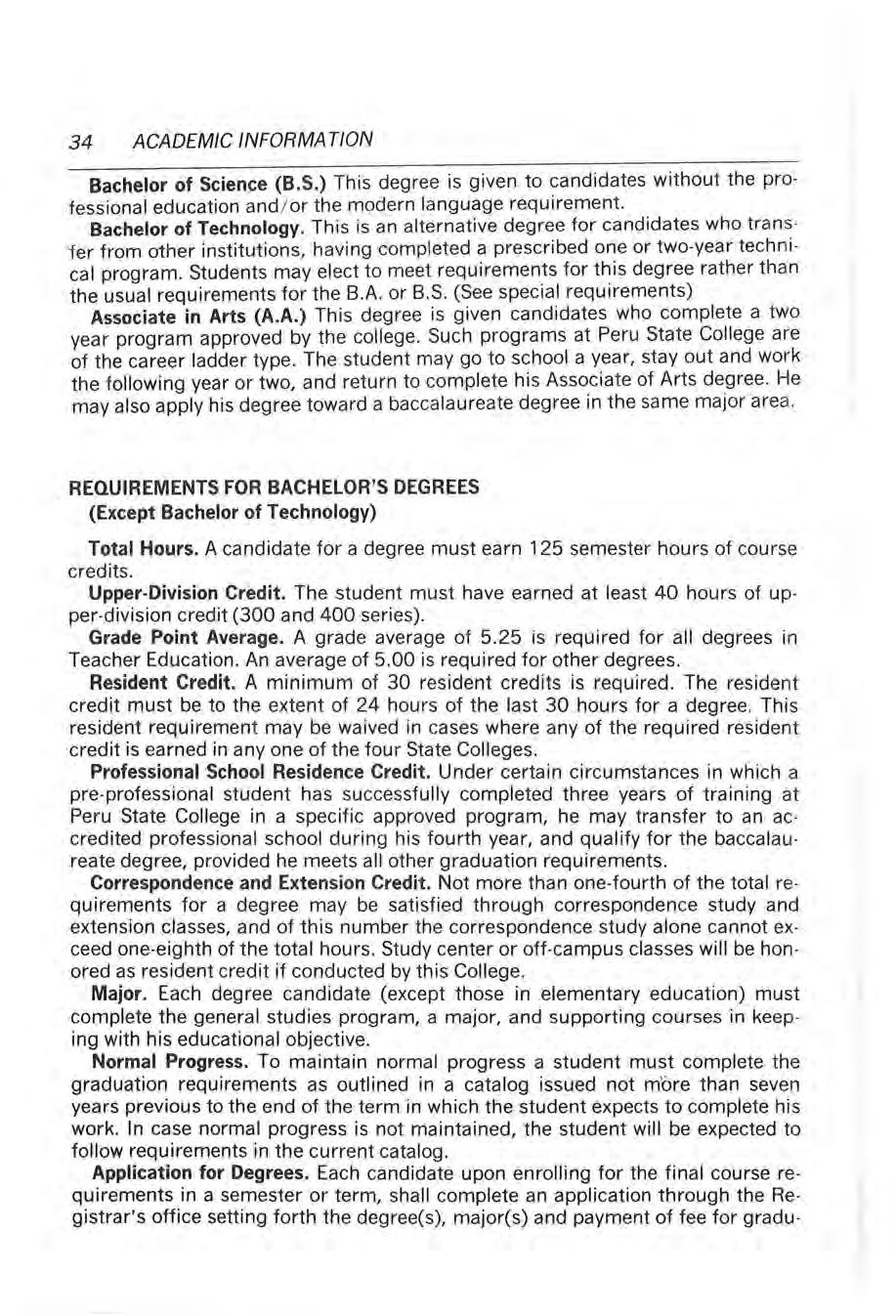
Associate in Arts (A.A.) This degree is given candidates who complete a two year program approved by the college. Such programs at Peru State College are of the career ladder type. The student may go to school a year, stay out and work the following year or two, and return to complete his Associa te of Arts degree. He may also apply his degree toward a baccalaureate degree in the same major are a.
REQUIREMENTS FOR BACHELOR'S DEGREES (Except Bachelor of Technology)
Total Hours. A candidate for a degree must earn 125 semester hours of course credits.
Upper-Division Credit. The student must have earned at least 40 hours of upper-division credit (300 and 400 series).
Grade Point Average. A grade average of 5 25 is required for all degrees in Teacher Education. An average of 5 .00 is required for other degrees.
Resident Credit. A minimum of 30 resident credits is required. The resident credit must be to the extent of 24 hours of the last 30 hours for a degree. This resident requiremen t may be waived in cases where any of the required resident credit is earned in any one of the four State Colleges.
Professional School Residence Credit. Under certain circumstances in which a pre -professional student has successfully completed three years of training at Peru State College in a specific approved program, he may transfer to an ac- · credited professional school during his fourth year, and qualify for the baccalaureate degree, provided he meets all other graduation requirements.
Correspondence and Extension Credit. Not more than one-fourth of the total requirements for a degree may be satisfied through correspondence study and extension classes, and of this number the correspondence study alone cannot exceed one-eighth of the total hours. Study center or off -campus classes will be honored as resident credit if conducted by this College.
Major. Each degree candidate (except those in elementary education) must complete the general studies program, a major, and supporting courses in keeping with his educational objective.
Normal Progress. To maintain normal progress a student must complete the graduation requirements as outlined in a catalog issued not more than seven years previous to the end of the term in which the student expects to complete his work. In case normal progress is not maintained, the student will be expected to follow requirements in the current catalog.
Application for Degrees. Each candidate upon enrolling for the final course requirements in a semester or term, shall complete an application through the Registrar 's office setting forth the degree(s), major(s) and payment of fee for gradu-
34
ation This application must be completed within the first five weeks of the semester or within the first two weeks of the first summer session.
CHANGE IN MAJOR
Students who elect to change their major at a point beyond the sophomore year should be aware of the probability of their graduation date being extended . Also, it may be necessary for the student to follow the requirements in the current bulletin, rather than the one in effect at the time of matriculation.
ACADEMIC PROGRESS
Academic Progress forms are maintained to guide and record the student's progress toward his graduation Two copies are maintained, one by the Registrar's office and the second by the student. The accuracy of each registration and the checking of all requirements are the final responsibility of the student.
GRADUATION REQUIREMENTS
In general, students will follow the graduation requirements as outlined in the bulletin current at the time of matriculation. Students whose progress toward a degree has been irregular or interrupted to a point of five years or more since the date of matriculation will meet the requirements of graduation in the most recent bulletin. Students for whom a progress sheet has been made, and who are making normal progress toward a degree, will continue in their original bulletin.
ADDITIONAL REQUIREMENTS FOR THE BACHELOR OF ARTS (A.B.) DEGREE
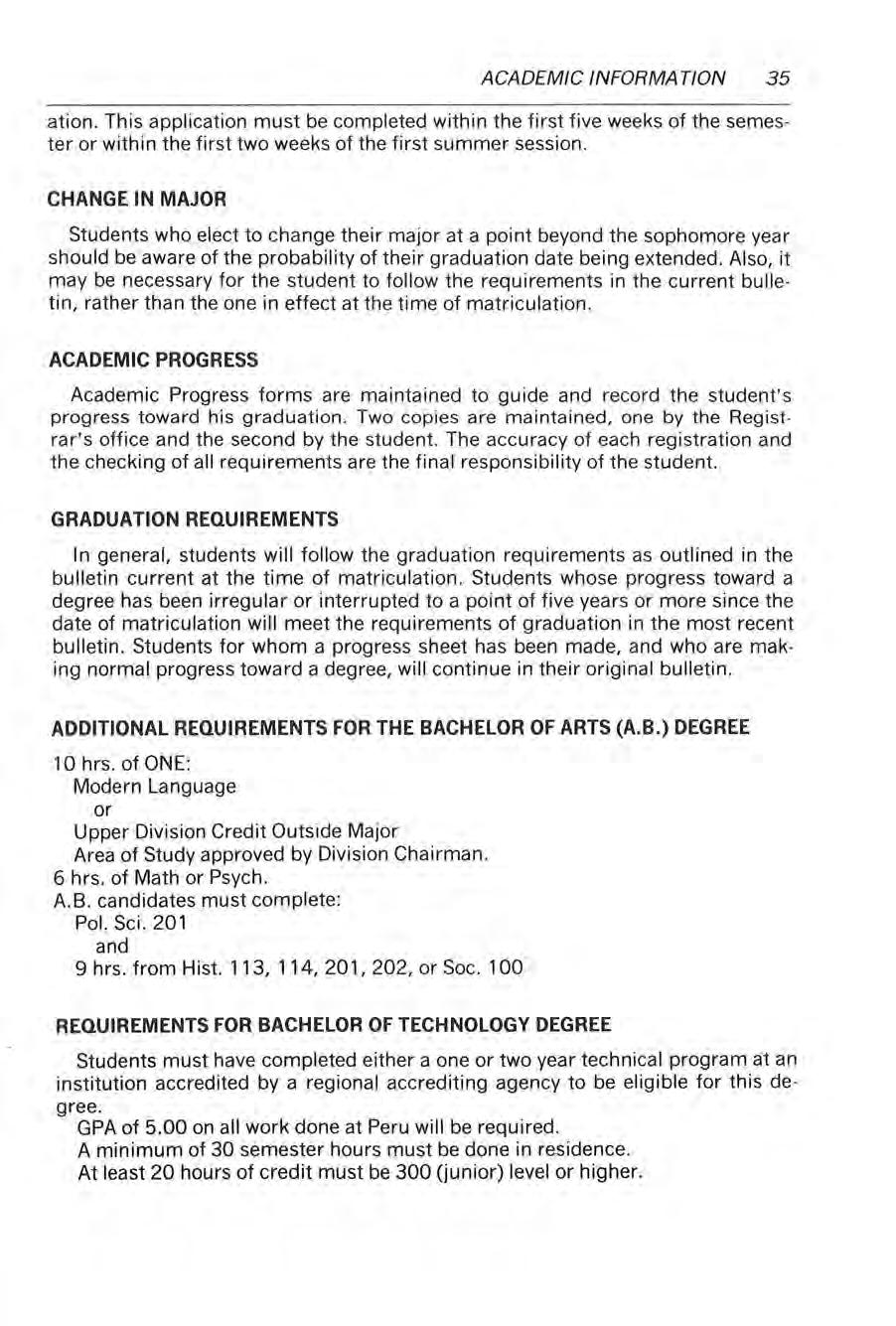
10 hrs . of ONE:
Modern Language or Upper Division Credit Outside Major Area of Study approved by Division Chairman .
6 hrs. of Math or Psych.
A.B candidates must complete: Pol. Sci . 201 and 9 hrs. from Hist. 113, 114, 201, 202, or Soc. 100
REQUIREMENTS FOR BACHELOR OF TECHNOLOGY DEGREE
Students must have completed either a one or two year technical program at an institution accredited by a regional accrediting agency to be eligible for this degree.
GPA of 5.00 on all work done at Peru will be required. A minimum of 30 semester hours must be done in residence.
At least 20 hours of credit must be 300 (junior) level or higher .
ACADEMIC IN FORMATION 35
ACADEMIC IN FORMATION
Students who have comp leted their programs at a non-accredited technical institution are subject to the same probationary provisions as are students seeking the B.S. and B.A. degrees who transfer from non -accredited institutions.
The degree for successful cand id ates will read Bachelor of Technology in whatever the transfer major is with an additional emphasis in whatever the resident area of emphasis is.
EXAMPLE: Bachelor of Technology in Food Service with additional emphasis in Biology
Program of Study at .Peru State College For Transfer Students With An A.A. or A.S. Degree
General Studies: Thirty semester hours required exclusive of hours used to fulfill resident area of emphasis. At least 3 hours selected from each area listed below and no more than 9 hours of the 30 hour total in any one area.
English Composition
Communications
Socia l & Behavioral Science
Applied Arts
Mathematics / Science
Literature / Fine Arts
Health & Hygiene / P.E.
Resident Area of Emphasis: Minimum of 25 semester hours. Courses selected by · student and advisor, but must be concentrated in one discipline. Composite grade average of "5" is required in courses making up this area of emphasis.
Transfer Technical Major: 60 semester hours maximum. This is the maximum number of hours from the A.A. or A.S degree applicable toward the 125 hours required for the Bachelor of Technology Degree.
Directed Electives To Total of 125 Hours: Hours may be se le cted from general studies beyond the required 30 hours; additional courses supportive of the resident area of emphasis or the transfer technical major, or others as directed by the advisor.
Program Of Study At Peru State College For Transfer Students Who Have Completed A Designated One Year Program General Studies: Thirty semester hours required exclusive of hours used to fulfill resident area of emphasis . At least three hours selected from each area listed below and no more than 9 hours of the 30 hour total in any one area.
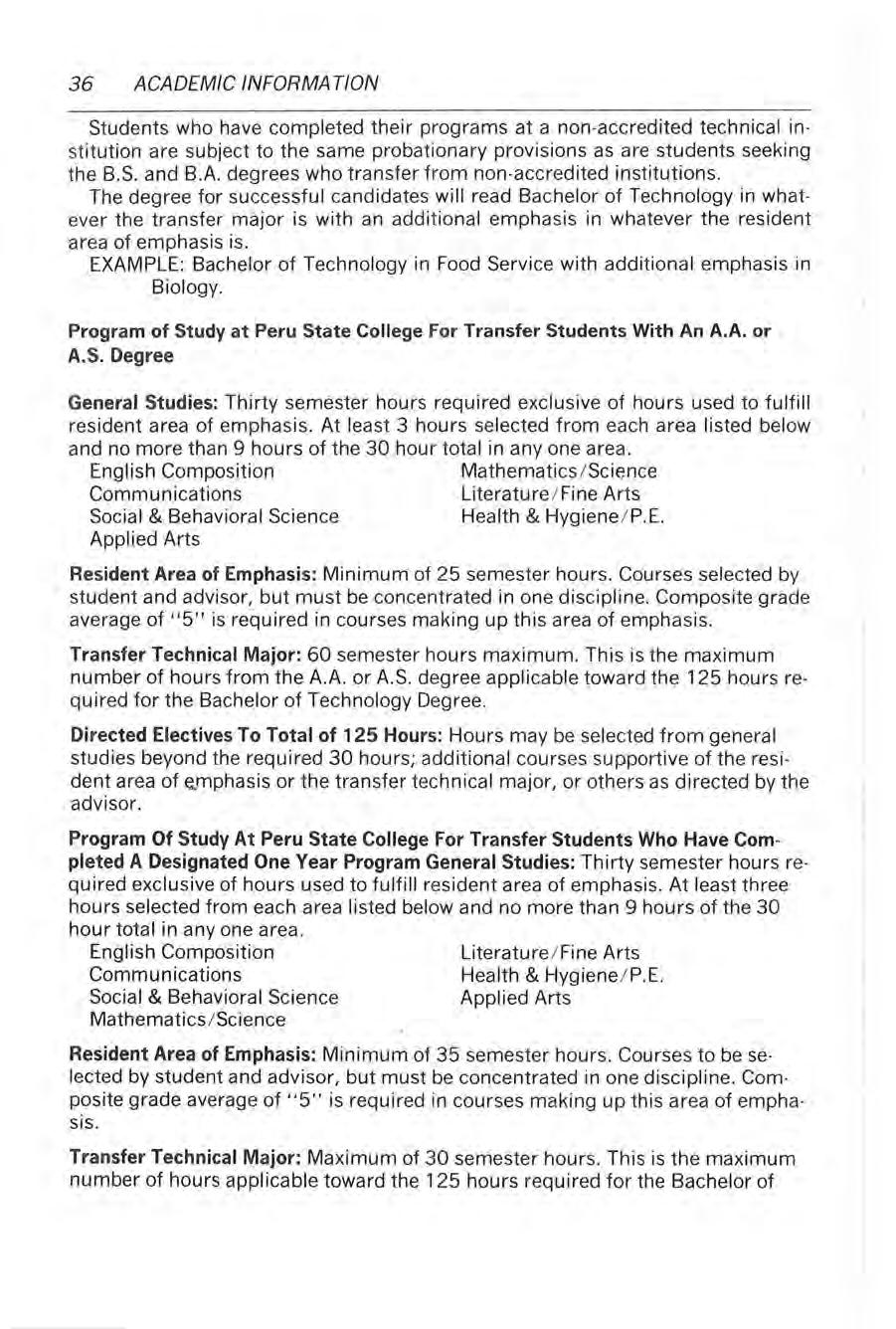
English Composition
Communications
Social & Behavioral Science
Mathematics / Science
Literature / Fine Arts
Health & Hygiene / P.E.
Applied Arts
Resident Area of Emphasis: Minimum of 35 semester hours. Courses to be selected by student and advisor, but must be concentrated in one discipline . Composite grade average of "5" is required in courses making up this area of emphasis.
Transfer Technical Major: Maximum of 30 semester hours. This is the maximum number of hours applicable toward the 125 hours required for the Bachelor of
36
SCIENTIFIC LEARNING
(Students who rank at the 85th percentile or higher on the mathematics section of the ACT test may waive the mathematics requirement.)
Business Mathematics
Elementary Descriptive Statistics
Probability
Logic and Sets
Geometry
Practical Trigonometry
Surveying
Slide Rule and Logarithms
Math Appreciation
Metric System
College Algebra
Introduction to Data Processing
Precalculus Mathematics
Basic Concepts of Mathematics
Algebra and Geometric Concepts
Statistics
Plant Biology
Animal Biology
General Chemistry I
General Chemistry 11
Physical Geology
Rocks and Minerals
Introduction to Fossils • Meteorology and Climatology
Biological Science (Elementary Educ. only)
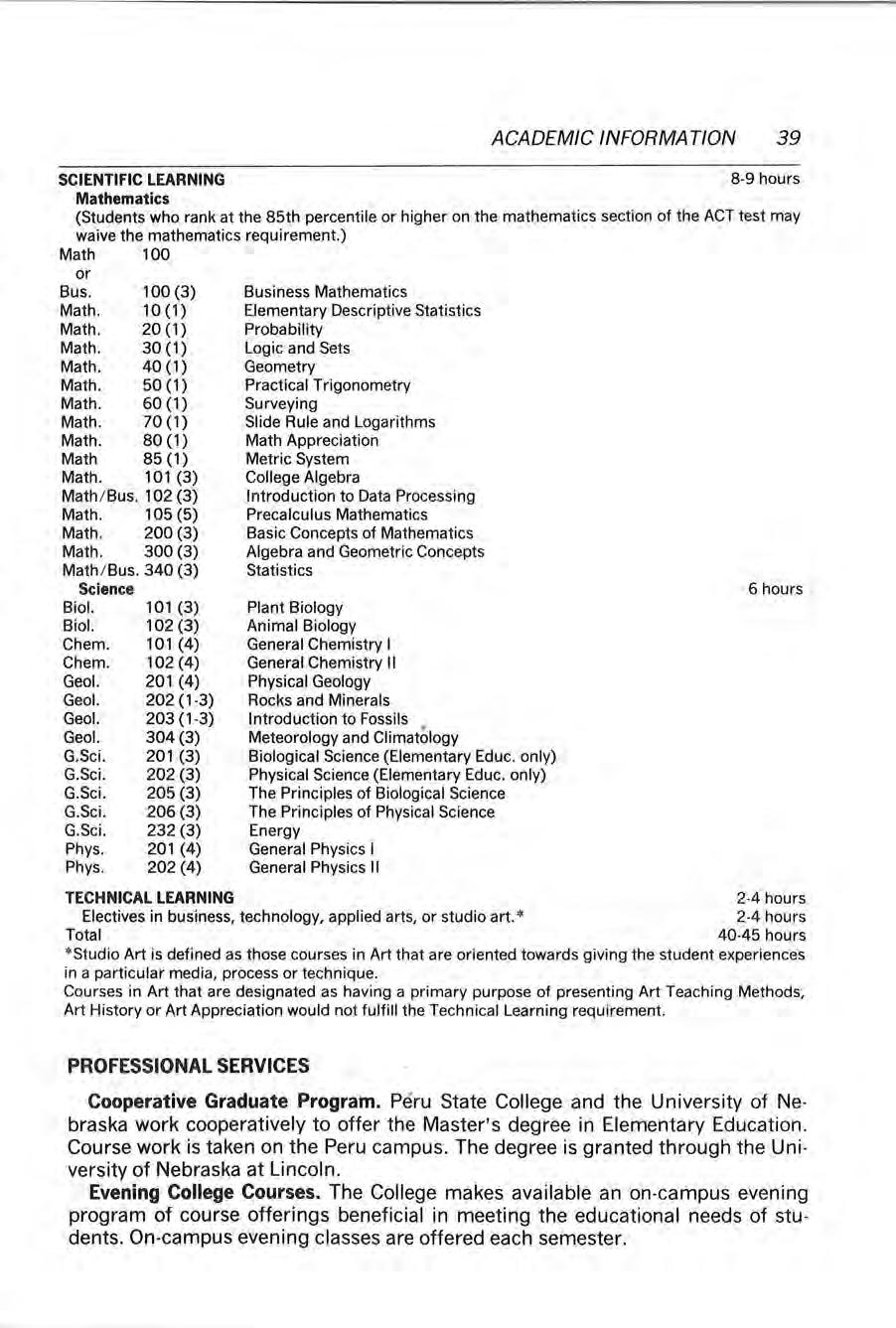
Physical Science (Elementary Educ . only)
The Principles of Biological Science
The Principles of Physical Science
Energy
General Physics I
General Physics II
TECHNICAL LEARNING
Electives in business, technology, applied arts, or studio art.*
Total
*Studio Art is defined as those courses in Art that are oriented towards giving the student experiences in a particular media, process or technique.
Courses in Art that are designated as having a primary purpose of presenting Art Teaching Methods, Art History or Art Appreciation would not fulfill the Technical Learning requirement.
PROFESSIONAL SERVICES
Cooperative Graduate Program. Peru State College and the University of Nebraska work cooperatively to offer the Master's degree in Elementary Education. Course work is taken on the Peru campus. The degree is granted through the University of Nebraska at Lincoln.
Evening College Courses. The College makes available an on-campus evening program of course offerings beneficial in meeting the educational needs of students. On-campus evening classes are offered each semester.
ACADEMIC IN FORMAT/ON 39
8
hours Mathematics
-9
Bus.
Math 100 or
100 (3)
Math. 10(1) Math 20 (1)
Math. 30(1)
50
60
70 (1)
80(1) Math 85 (1) Math 101 (3) Math / Bus. 102 (3) Math 105 (5) Math. 200 (3) Math. 300 (3) Math / Bus 340 (3) Science
101 (3) Biol. 102 (3) Chem. 101 (4) Chem 102
201
Math. 40 (1) Math.
(1) Math.
(1) Math.
Math
Biol.
(4) Geol.
(4) Geol. 202 ( 1-3)
Geol. 203 ( 1-3)
202
205
206
232
Geol. 304(3) G.Sci. 201 (3) G.Sci.
(3) G.Sci.
(3) G.Sci.
(3) G.Sci.
(3) Phys. 201 (4) Phys. 202 (4)
6 hours 2-4 hours 2-4 hours 40-45
hours
Continuing Education. The Continuing Education Division at Peru State College offers both credit and non -credit courses on campus and in surrounding communities. Requests for information should be sent to the Director of Continuing Education.
Summer Session. A 10-week summer session is divided into two five -week terms which makes it possible for a student to earn a maximum of 12 semester hours of credit, six hours in each term. Courses are available which make it possible for a recent high school graduate to begin his post secondary education during the summer. Request for information concerning the summer session and summer school bulletin should be directed to the Director of Summer Sessions
ADVANCED STANDING
This implies attainment beyond the minimum for admission to the College. The status may be acquired by ( 1) presenting work completed in another college; (2) demonstrating proficiency in a certain field, thus removing the requirement of certain prerequisites. The latter may be with or without credit.
TRANSFER CREDIT
Peru State College will accept in transfer credit earned at another college or university This condition applies also to credit earned on an interim basis at another college while essentially a student at Peru State College.
A transfer student who has earned an Associate of Arts or Associate of Science degree will be regarded as having met the general studies program of Peru State provided the program of the college frnm which the individual is transferring has been approved by the Academic Affairs Commission of this College. Special provisions apply to transfer students seeking a Bachelor of Technology Degree
ADMISSION FROM NON-ACCREDITED COLLEGES
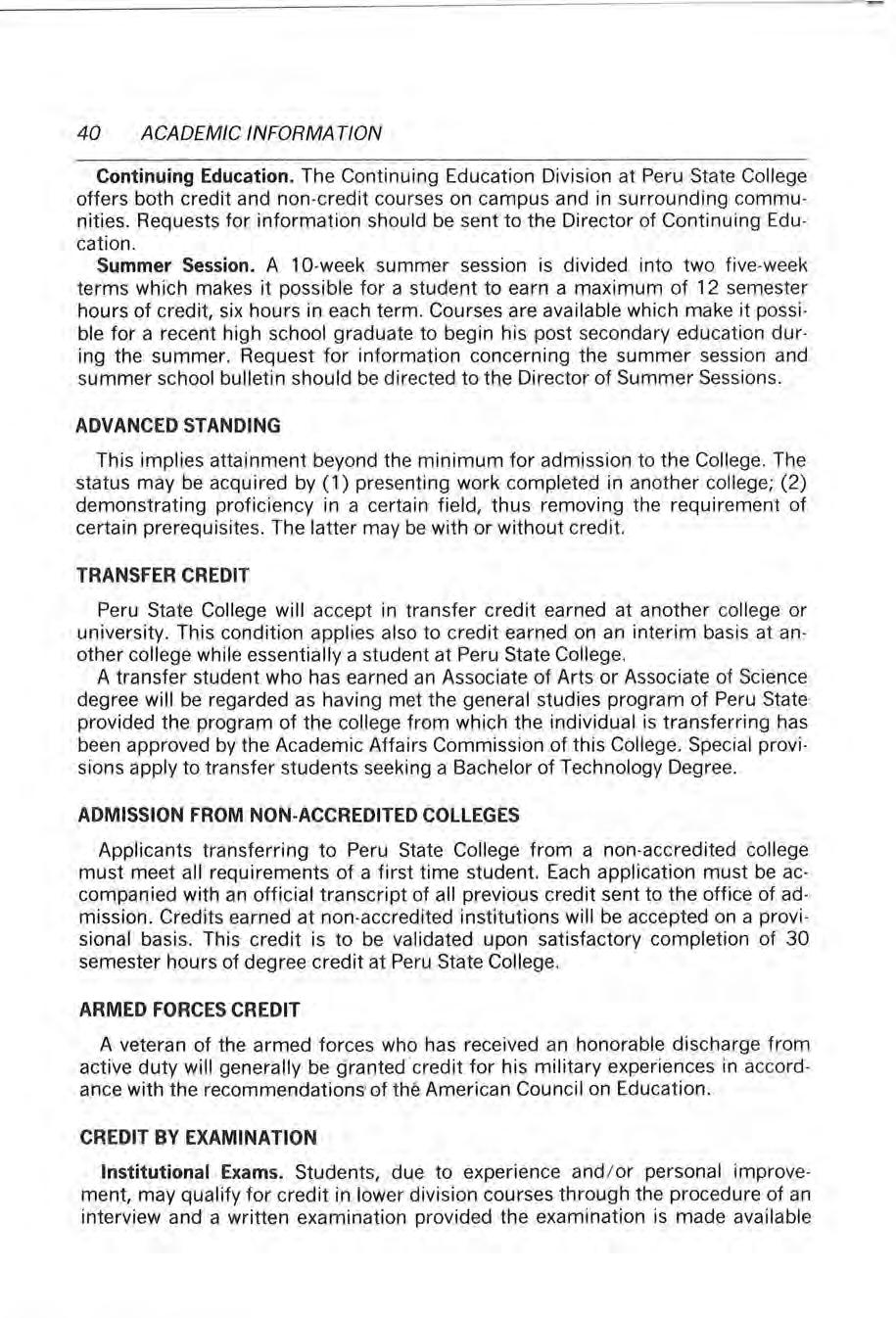
Applicants transferring to Peru State College from a non-accredited college must meet all requirements of a first time student. Each application must be accompanied with an official transcript of all previous credit sent to the office of admission. Credits earned at non-accredited institutions will be accepted on a provisional basis This credit is to be validated upon satisfactory completion of 30 semester hours of degree credit at Peru State College.
ARMED FORCES CREDIT
A veteran of the armed forces who has received an honorable discharge from active duty will generally be granted .credit for his military experiences in accordance with the recommendation s of th e American Council on Education.
CREDIT BY EXAMINATION
Institutional Exam s. Students, due to experience and / or personal improv ement, may qualify for credit in lower division courses through the procedure of an interview and a written examination provided the examination is made available
40 ACADEMIC INFORMATION
by the respective academic divisions . Th e student must, through an interview, satisfy a faculty committee that he has had a formal or informal experience in which the course content may have been acquired . If the committee deems the above conditions have been met, the student will be given a written comprehensive examination .
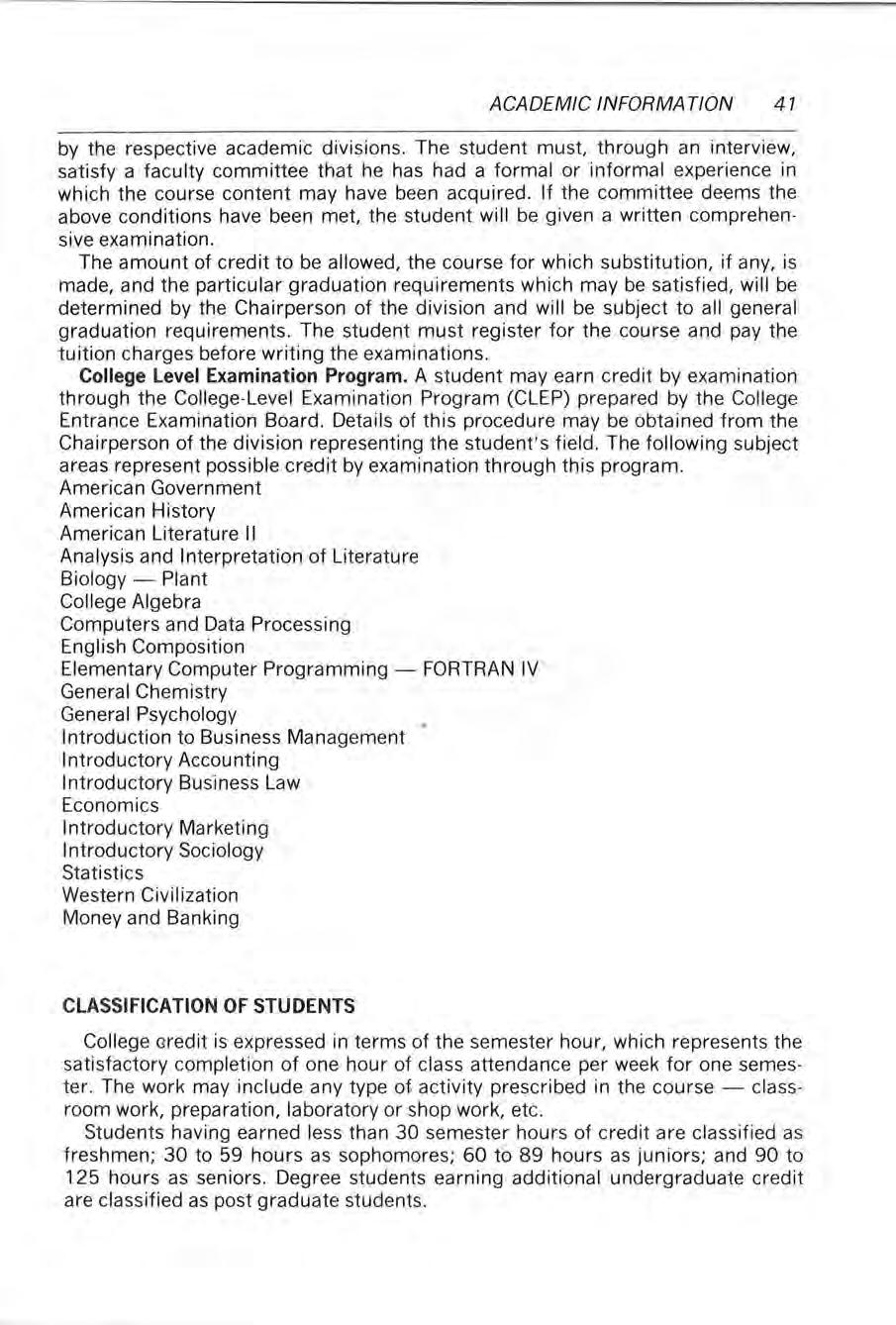
The amount of credit to be allowed, the course for which substitution, if any, is made, and the particular graduation requirements which may be satisfied, will be determined by the Chairperson of the division and will be subject to all general graduation requirements . The student must register for the course and pay the tuition c harges before writing the examinations.
College Level Examination Program. A student may earn credit by examination through the College-Level Examination Program (CLEP) prepared by the College Entrance Examination Board . Details of this procedure may be obtained from the Chairperson of the division representing the student's field . The following subject areas represent possible credit by examination through this program .
American Government
American History
American Literature 11
Analysis and Interpretation of Literature
Biology - Plant
College Algebra
Computers and Data Processing
English Composition
Elementary Computer Programming - FORTRAN IV
General Chemistry
General Psychology
Introduction to Business Management
Introductory Accounting
Introductory Business Law
Economics
Introductory Marketing
Introductory Sociology
Statistics
Western Civilization
Money and Banking
CLA SS IFICATION OF STUDENTS
College oredit is exp-ressed in terms of the semester hour, which represents the satisfacto r y completion of one hour of class attendance per week for one semest er. Th e work may include any type of, activity prescribed in the course - cla ssroom work, preparation, laboratory or shop work, etc.
Students having earned les s than 30 semester hours of credit ar e classified as freshmen; 30 to 59 hours as sophomores; 60 to 89 hours as juniors; and 90 to 125 hours as seniors. Degree students earning additional undergraduate credit ar e classified as post graduate students . ·
41
ACADEMIC IN FORMATION
ACADEMIC INFORMATION
ACADEMIC LOAD
The normal class load for a full time student is 12 to 16 semester hours The maximum load without special permission is 17 hours. Students with a grade point average of 7 .00 for the previous semester may apply to the Registrar for one additional hour, making a total of 18. An excess of 18 hours must be approved by the Chairperson of the division in which the student is majoring.
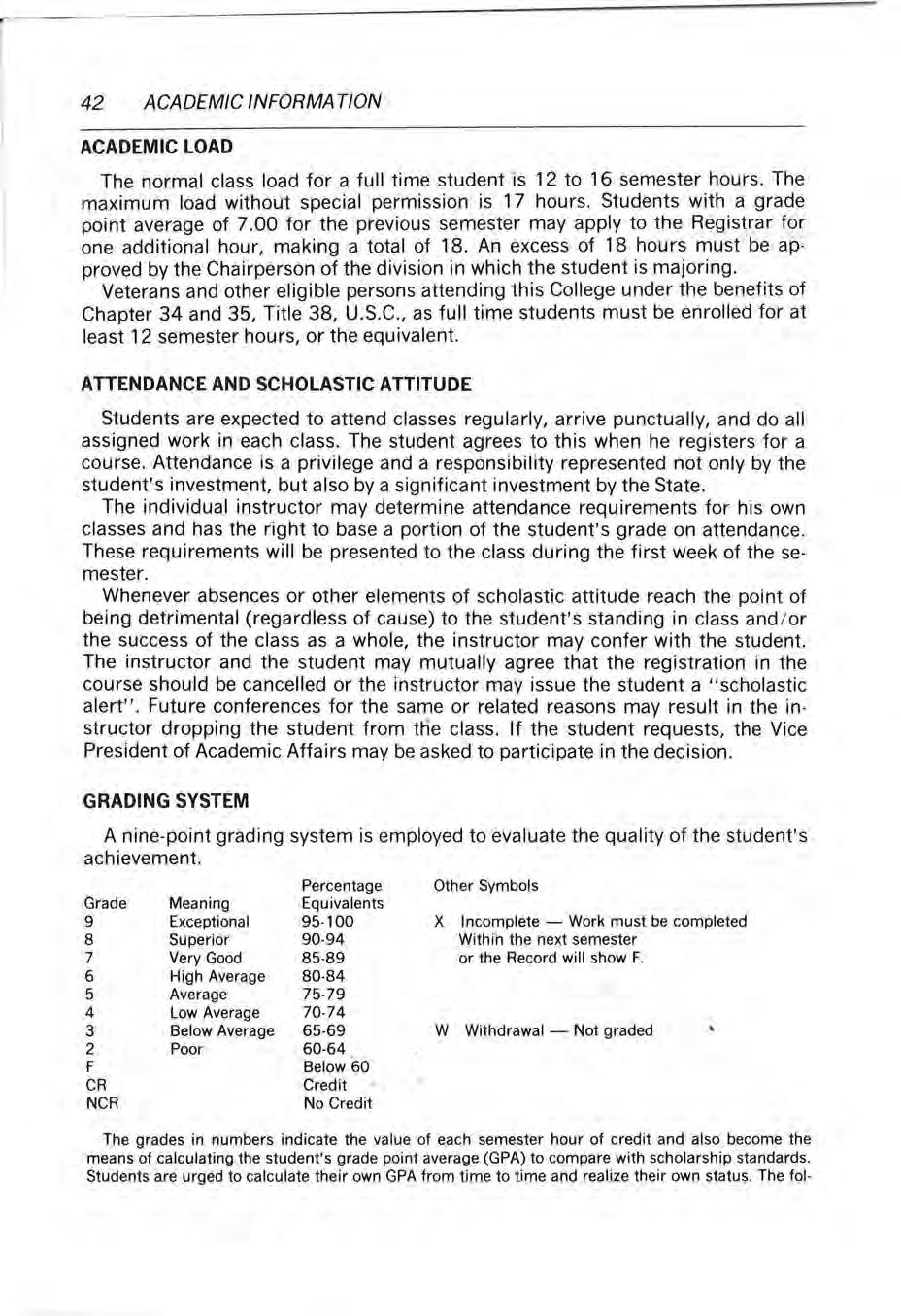
Veterans and other eligible persons attending this College under the benefits of Chapter 34 and 35, Title 38, U.S.C ., as full time students must be enrolled for at least 12 semester hours, or the equivalent.
ATTENDANCE AND SCHOLASTIC ATTITUDE
Students are expected to attend classes regularly, arrive punctually, and do all assigned work in each class. The student agrees to this when he registers for a course. Attendance is a privilege and a responsibility represented not only by the student's investment, but also by a significant investment by the State
The individual instructor may determine attendance requirements for his own classes and has the right to base a portion of the student's grade on attendance . These requirements will be presented to the class during the first week of the semester.
Whenever absences or other elements of scholastic attitude reach the point of being detrimental (regardless of cause) to the student's standing in class and / or the success of the class as a whole, the instructor may confer with the student. The instructor and the student may mutually agree that the registration in the course should be cancelled or the instructor may issue the student a "scholastic alert". Future conferences for the same or related reasons may result in the instructor dropping the student from tti e class. If the student requests, the Vice President of Academic Affairs may be asked to participate in the decision.
GRADING SYSTEM
A nine-point grading system is employed to evaluate the quality of the student's achievement.
Other Symbols
X Incomplete - Work must be completed
Within the ne xt semester or the Record will show F
W Withdrawal - Not graded
The grades in numbers indicate the value of each semester hour of credit and also become the means of calculating the student's grade point average (GPA) to compare with scholarship standards . Students are urged to calculate their own GPA from time to time and realize their own status The fol -
42
Grade 9 8 7 6 5 4 3 2 F CR NCR Meaning Exceptional Superior Very Good High Average Average Low Average Below Average Poor Percentage Equivalents 95 - 100 90 -94 85-89 80-84 75.79 70-74 65-69 60-64 •. Below 60 Credit No Credit
*This effects a lower GPA since credit value is part of divisor
Incomplete (X) work may be completed and cleared through the instructor to earn a passing mark, and this must be done within the next semester or the record will show F (Failing)
SCHOLARSHIP STANDARDS
A candidate for a baccalaureate degree must earn at least 125 semester hours with a minimum grade point average of 5.00. A minimum GPA of 5.25 must be earned for degrees in Education. A candidate for the Associate of Arts degree must earn at least 60 semester hours with a minimum grade point average o1 5.00.
To provide early information to students in regard to their academic work, grades are reviewed at the end of each nine weeks. A mid-term report for low or failing work is provided the student. A student receiving this notification should confer with the instructor, his faculty advisor, and the Dean for Student Development.
A student to be in good standing academically must maintain the required GPA for the respective degree being pursued. A notice of unsatisfactory scholarship is forwarded to the student by the Vice President of Academic Affairs at the end of the semester if the GPA is 4.0-4.99 The notice is not a penalty, but a warning to notify the student that improvement is needed.
Should a student's GPA be 2.00-3.99 at the end of the semester, the student is notified he is on academic probation for the next semester and will be subject to academic suspension if his GPA is still under 4.0 at the end of the probationary semester. Academic suspens ion is generally for two semesters.
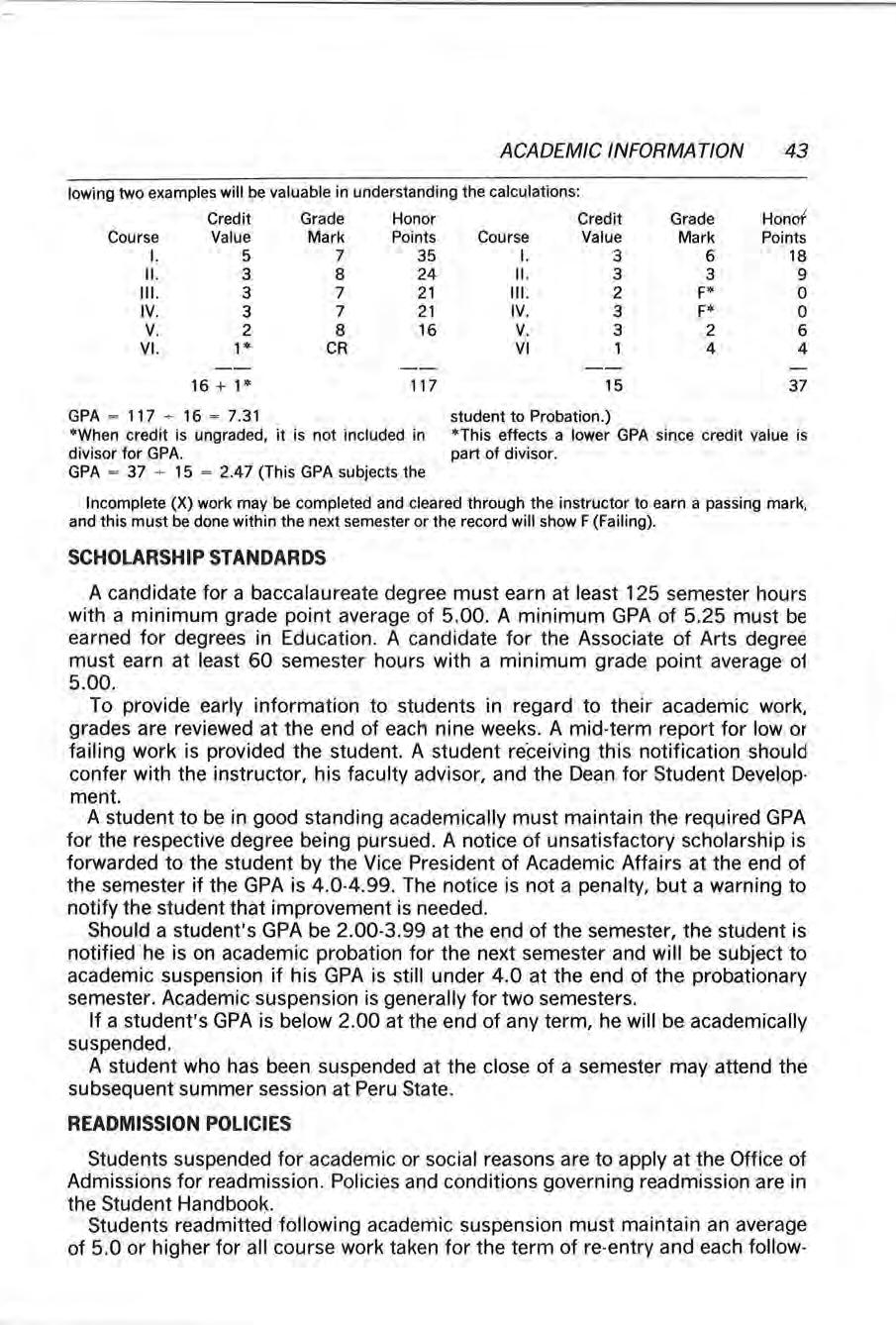
If a student's GPA is below 2.00 at the end of any term, he will be academically suspended.
A student who has been suspended at the close of a semester may attend the subsequent summer session at P~ru State.
READMISSION POLICIES
Students suspended for academic or social reasons are to apply at the Office of Admissions for readmission . Policies and conditions governing readmission are in the Student Handbook.
Students readmitted following academic suspension must maintain an average of 5.0 or higher for all course work taken for the term of re-entry and each follow-
ACADEMIC INFORMATION 43 lowing two examples will be valuable in understanding the calculations: Credit Grade Honor Course Value Mark Points I. 5 7 35 II. 3 8 24 Ill. 3 7 21 IV 3 7 21 V 2 8 16 VI. 1 * CR 16 + 1* 117 GPA = 117 + 16 = 7.31 *When credit is ungraded , it is not included in divisor for GPA GPA = 37 + 15 = 2.47 (This GPA subjects the Credit Grade Honot Course Value Mark Points I. 3 6 18 II. 3 3 9 Ill. 2 F* 0 IV. 3 F* 0 V. 3 2 6 VI 1 4 4 15 37
student to Probation.)
ACADEMIC IN FORMATION
ing term until the required composite G.P.A. of 4.00 has been achieved. Failure to meet the above condition for a term will result in academic suspension.
HONOR ROLL
At the end of each semester the Vice President of Academic Affairs publishes the Honor Roll, which includes the names of students who have earned a grade point average of 7 .25 and higher for that term. Students must be enrolled for a minimum of 12 hours credit.
GRADUATION HONORS
Graduation honors are conferred on bachelor's degree candidates who have earned a minimum of 60 hours in residence and associate degree candidates who have earned a minimum of 45 hours in residence. Only resident hours will be considered in the grade point average. Grades and credits earned at other colleges or universities are not applicable.
The scholastic requirements are as follows :
8.50 -9 00 With Highest Distinction
8.00 - 8.49 With High Distinction
7.25 - 7.99 With Distinction
AUDIT
To register for a course on an audit basis implies no credit. The student pays the regular tuition fee, and is not required to write tests, examinations, and / or papers. •
PRIVATE INSTRUCTION
Private instruction is available in music. Music students will receive private instruction without charge, in relation to their major Other students will pay the rate per lesson as listed in the Financial Information section of catalog.
REPEAT COURSES
A student may and is urged to repeat any course in which he has failed. There may be occasions when a student chooses to repeat a course purely for review, to be taken on an audit basis, without a change of grade.
TEACHING LEARNING CENTER
The college maintains this center in Room 202 of the Education Building. Professional staff members are avilii'able·to assist students and faculty members.
CHANGE IN REGISTRATION
The accuracy of each registration as related to class periods, sections, days and other possible conflicts is the responsibility of the student. Also, the ultimate responsibility for the meeting of all requirements rests with the student. In the event a change in program is unavoidable following a registration, the student must secure the approval of the advisor and the instructor . No courses may be added after the first two weeks of a semester. When applicable, a tuition refund will be
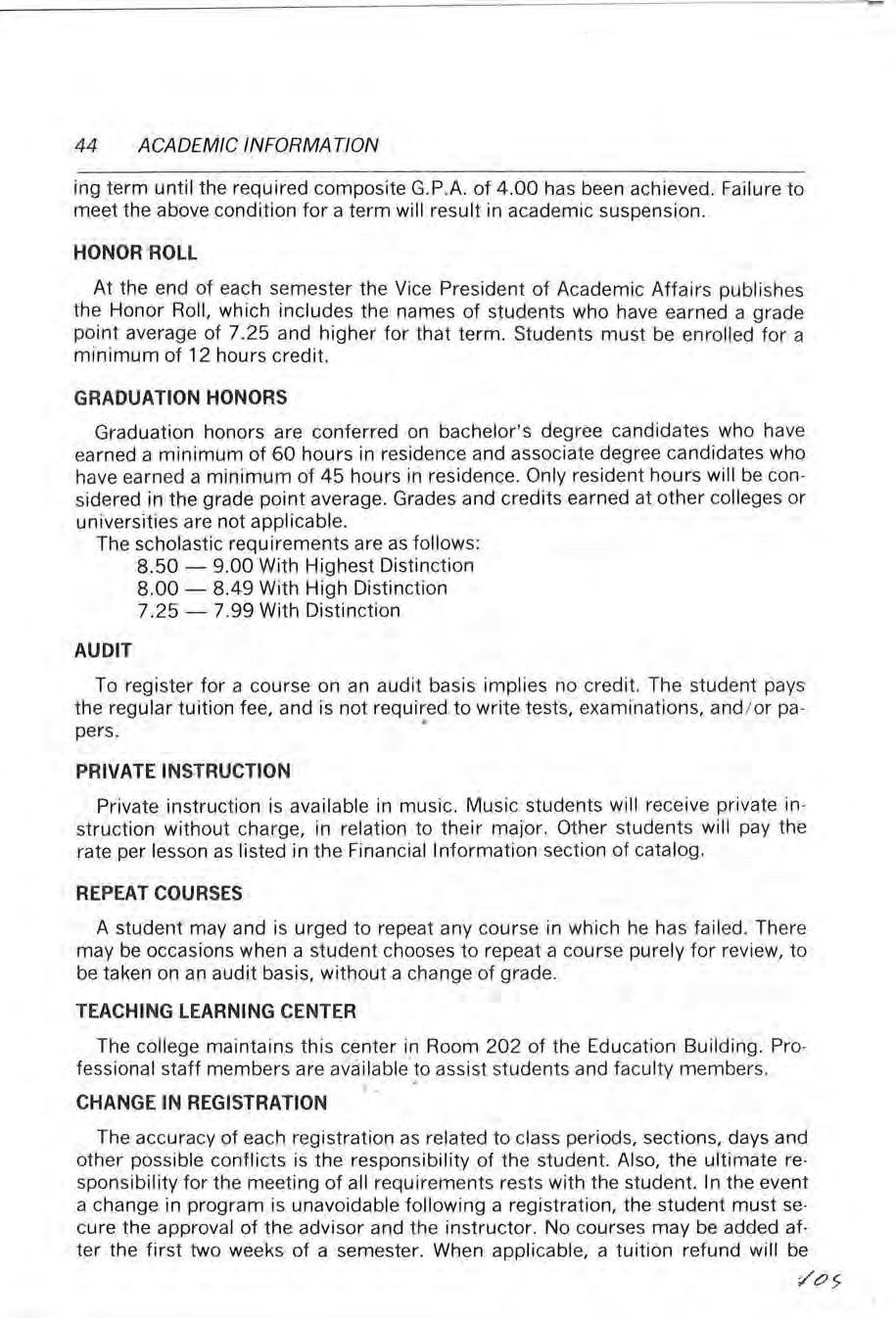
44
:/o~
made during the first two weeks of a semester.
WITHDRAWAL FROM CLASS
A student finding it necessary to withdraw from a class at any time must notify his advisor and the instructor and must officially withdraw at the Registrar's Office. Students withdrawing without official approval will be graded "F".
Withdrawal prior to the last two weeks of the term will be recorded as "W" on the permanent record . Withdrawal during the last two weeks and prior to the time of the final examination will result either in a grade of "W" or "F" depending on the grade at the time of withdrawal.
WITHDRAWAL FROM COLLEGE
If it is necessary for a student to withdraw from College, he secures the appropriate form from the Dean for Student Development. This form must be presented to identified members of the faculty for their signatures. The withdrawal form is filed in the Registrar's Office Proportionate tuitiori refunds will be made to students withdrawing from college within a given period according to the refund schedule.
TRANSCRIPTS
Each student may request and receive at any time one free transcript of his academic record. There is a fee of $1 .50 for each additional transcript. No transcript will be issued if the student has not met all financial obligations to the College .
PRE-PROFESSIONAL CURRICULA
Most professional schools require for entrance two or more years of college credit in general education or basic liberal arts courses which vary only slightly from one profession to another. Since such work is required for the professional curricula in training teachers, this College offers a variety of courses that serve as pre -professional education Suggested among these are those for prospective doctors, dentists, pharmacists, optometrists, nurses, veterinarians, lawyers, engineers, agriculturists, foresters, morticians, business executives, journalists and others. A student following a pre -professional program is urged to secure a bulletin from the institution to which he intends to transfer in order that specific requirements will be met. The various pre-professional programs are described under the appropriate school.
SEMI -PROFESSIONAL AND TERMINAL
Students who are unable to attend college four years or more and wish to prepare for vocations requiring less, t,ime in preparation will find a variety of educational opportunities in this College. There are increasing opportunities today for young people in the occupational area classified as semi -professional. A student interested in an occupation in the above classification should know the requirements of the particular professional or technical school to which he will transfer. It will then be possible for a counselor to assist him in making a parallel program of the required formal college courses Examples are noted in the appropriate schools.
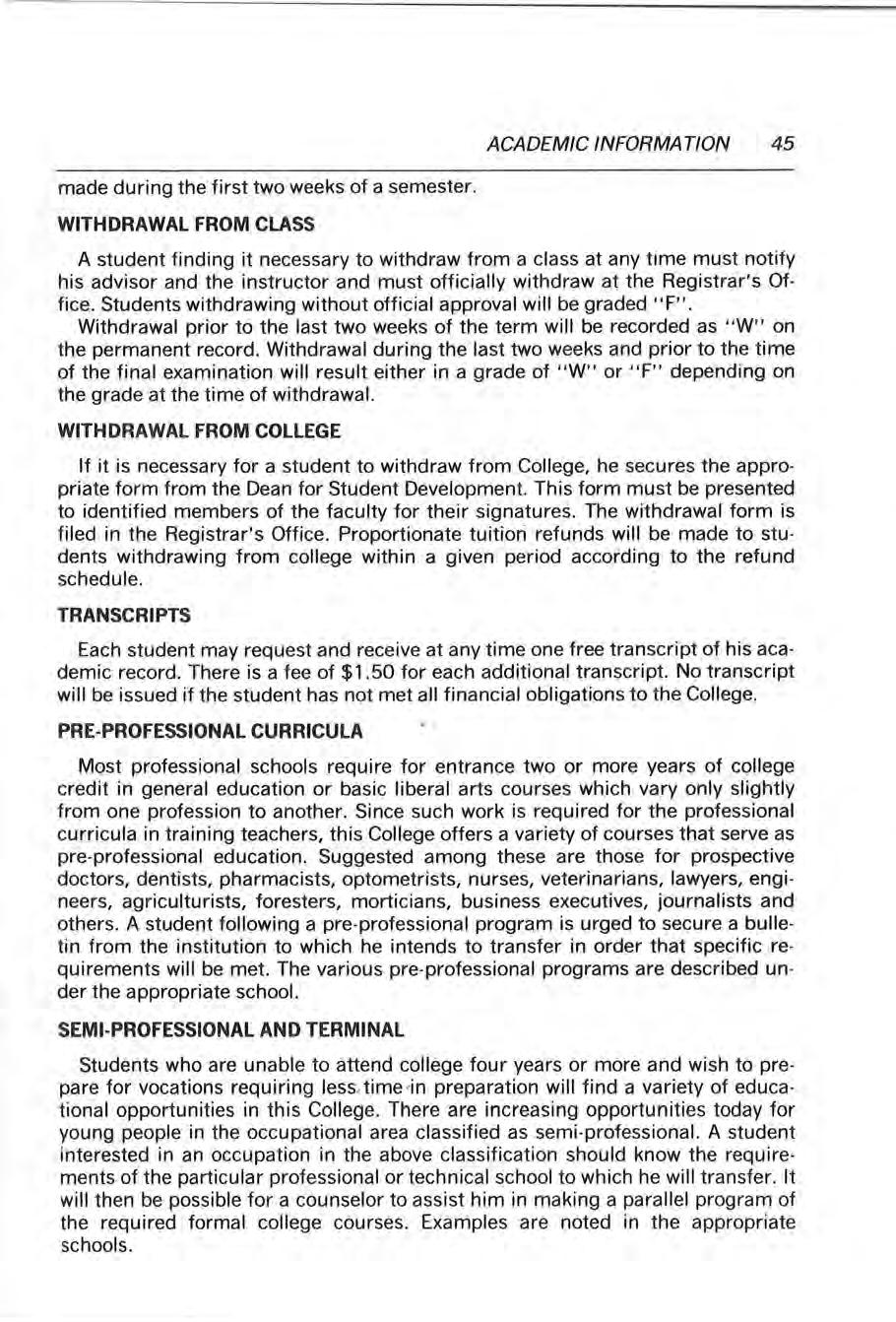
ACADEMIC INFORMA T/ON 45
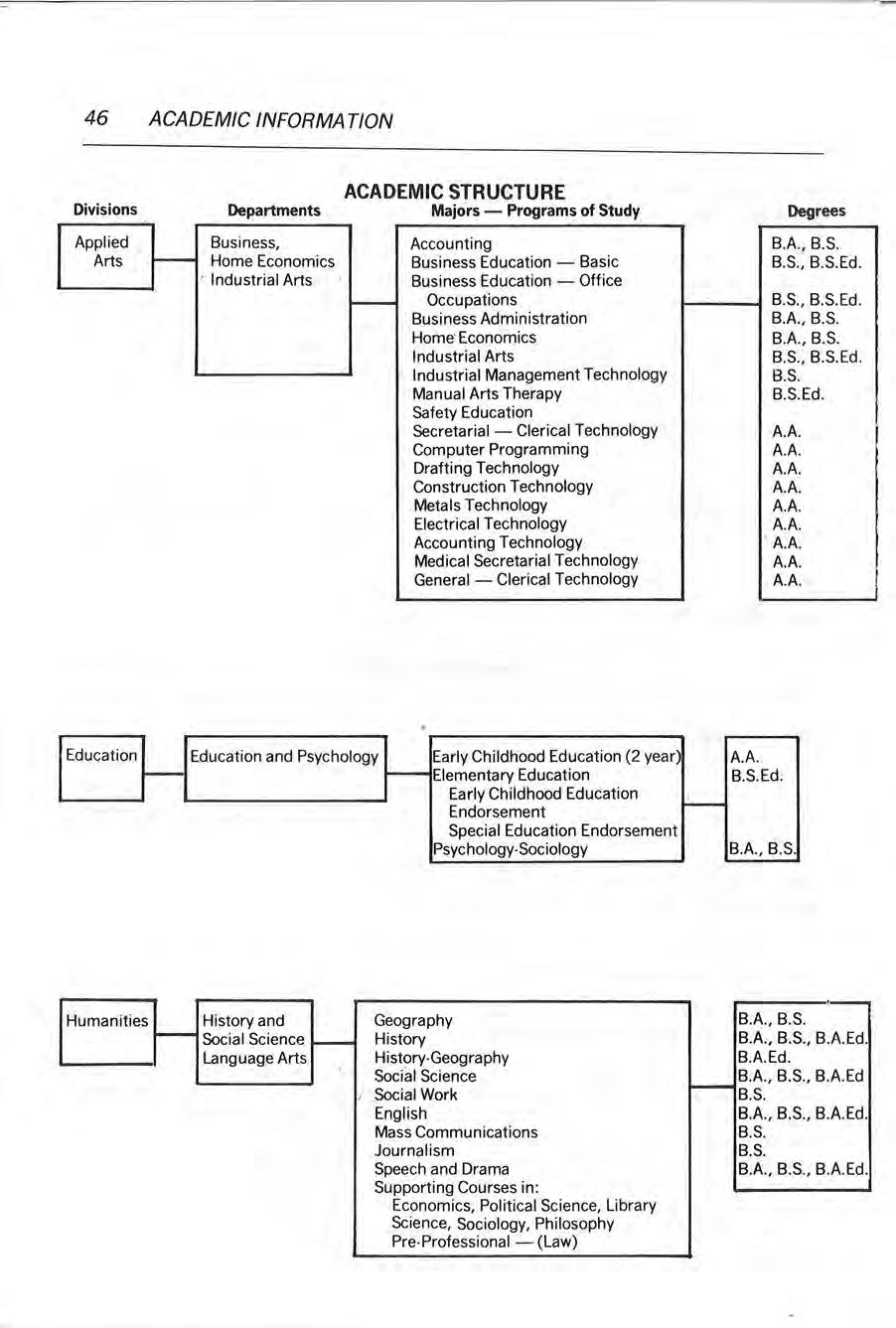
46
ACAD EMIC STRU CTURE Divi sion s Depa rtment s Majors - Programs of Study Degrees Applied Business, Accounting B.A.,B S Arts - Home Economics Business Education - Basic B S , B S.Ed. ' Industrial Arts Business Education - Office - Occupations B.S., B S Ed Business Administration B.A.,B.S. Home Economics B.A.,B.S. Industrial Arts S.S., S S Ed. Industrial Management Technology S.S. Manual Arts Therapy S S.Ed Safety Education Secretarial - Clerical Technology A.A. Computer Programming A.A. Drafting Technology A.A. Construction Technology A.A. Metals Technology A.A. Electrical Technology A A. Accounting Technology A.A. Medical Secretarial Technology A.A. General - Clerical Technology A.A. Education Education and Psychology Early Childhood Education (2 year) A.A. -- Elementary Education B.S Ed. Early Childhood Education EndorsementSpecial Education Endorsement Psychology-Sociology B.A.,B S Humanities History and Geography S.A.,B S - Social Science History S.A., B.S., S A EdLanguage Arts Hist?ry-Geography S.A . Ed . .. Social Science S.A., S.S., B.A.Ed Social Work - B.S. ' English S.A., S.S., B.A.Ed Mass Communications S.S. Journalism S S Speech and Drama S.A., S.S , S.A Ed. Supporting Courses in: Economics, Political Science, Library Science, Sociology, Philosophy Pre -Professional - (Law)
ACADEMIC INFORMATION
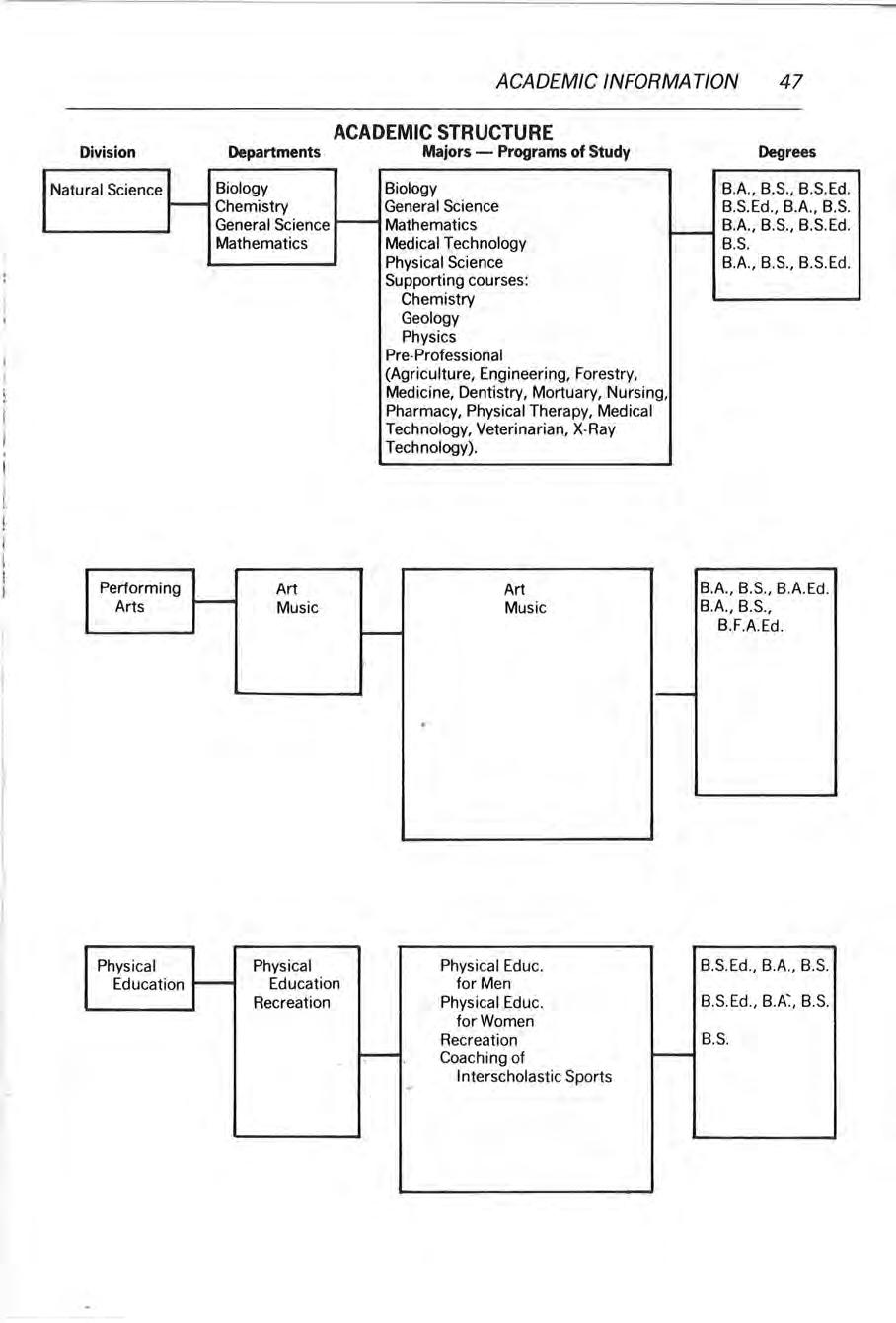
ACADEMIC INFORMATION 47 ACADEMIC STRUCTURE Division Departments Majors - Programs of Study Degrees Natural Science Biology Biology B.A., B.S ., B S Ed - Chemistry General Science B.S Ed , B.A., B.S General Science - Mathematics B.A., B.S., B S.EdMathematics Medical Technology B S Physical Science B.A., B.S., B S.Ed. Supporting courses : Chemistry Geology Physics Pre-Professional (Agriculture, Engineering, Forestry, Medicine, Dentistry, Mortu ary, Nursing, Pharmacy, Physical Therapy, Medical Technology, Veterinarian, X-Ray Technology) . Performing Art Art B.A., B.S., B.A . Ed . Arts - Music Music B.A.,B.S.,B F.A Ed. 1. Physical Physical Physical Educ B.S.Ed., B.A., B.S. Education - Education for Men Recreation Physical Educ B.S.Ed., BX, B.S. for Women Recreation B S - Coaching ofIn terscho lastic Sports .
Curricula Outlines
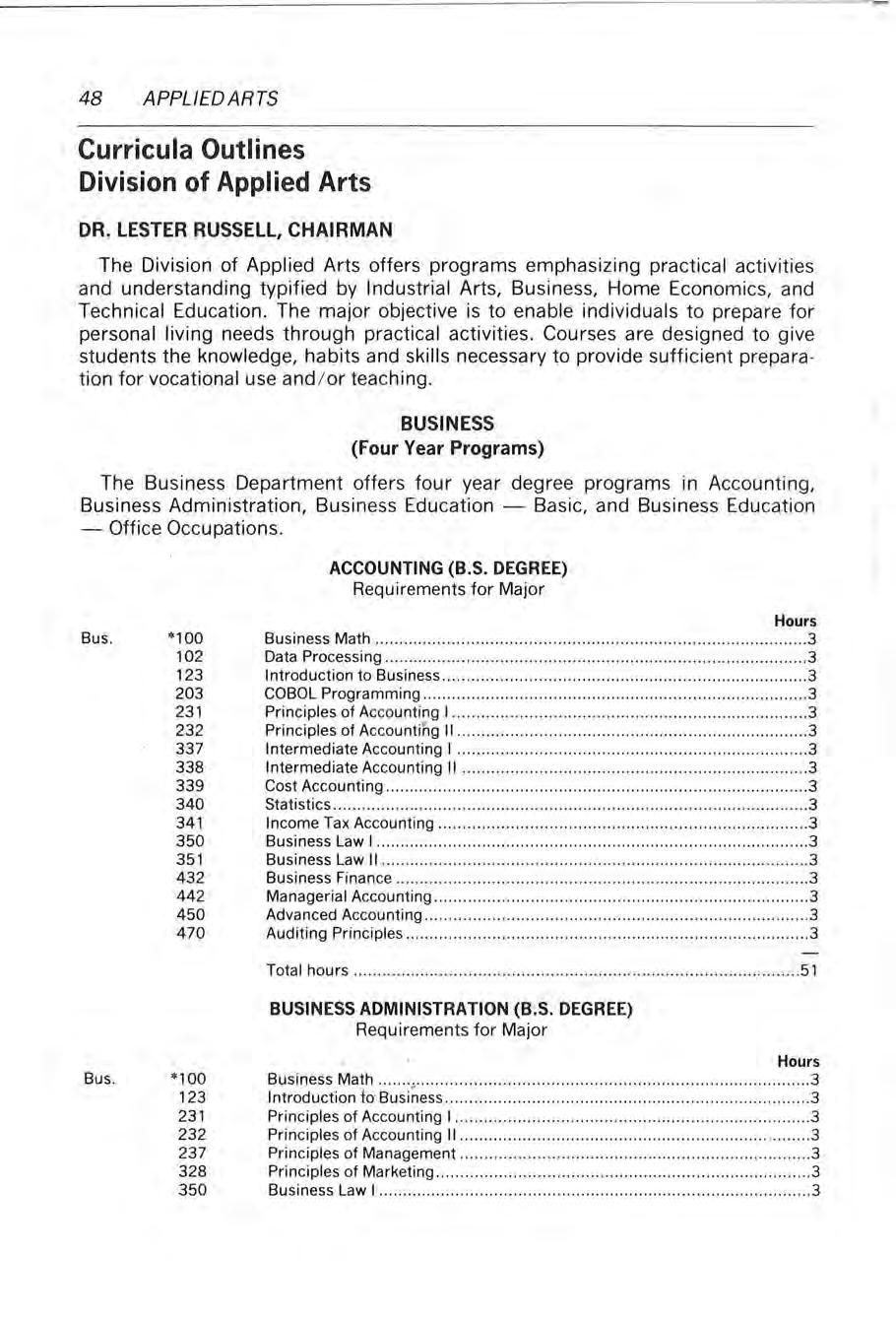
Division of Applied Arts
DR. LESTER RUSSELL, CHAIRMAN
The Division of Applied Arts offers programs emphasizing practical activitie s and understanding typified by Industrial Arts, Business, Home Economics, and Technical Education. The major objective is to enable individuals to prepare for personal living needs through practical activities. Courses are designed to give students the knowledge, habits and skills necessary to provide sufficient preparation for vocational use and / or teaching
BUSINESS
(Four Year Programs)
The Business Department offers four year degree programs in Accounting, Business Administration, Business Education - Basic, and Business Education
48 APPLIEDARTS
Office Occupations . Bus Bus *100 102 123 203 231 232 337 338 339 340 341 350 351 432 442 450 470 *100 123 231 232 237 328 350 ACCOUNTING (B.S. DEGREE) Requirements for Major Hours Business Math 3 Data Processing .......... ......... .... .. ...... .. .. .. ... .... ..... .. .... . .. .. .. ... .. ..... .. ..... .. .. ..... 3 Introduction to Business 3 COBOL Programming ........ .... .... ..... .. .. ... ....... ... . .. .. ...... ... ............ .. .. ......... .. .3 Principles of Accounting I ....... ....... ...... .. ..... ..... ....... .. .. .......... .. .... .. ............. 3 Principles of Ac counti fi g II 3 Intermediate Acc ounting I ......... .. ....... .. .. .. .. ..... ......... .. .. .. . .. ...... . .. ......... ...... 3 Intermediate Accounting II 3 Cost Accounting ..... ...... .............. .. ... ..... .. .. .... . ..... .... .... .. .. ...... ...... . .. .. . .. ....... 3 Statistics 3 Income Ta x Acc ounting 3 Business Law I ......... ........... ..... ............... . ..... .. .... ... .. .. .. ... .. .. .... ... .. .... ... ... .. .3 Business Law 11 3 Bu siness Finan ce ................... .. . .. .................. .. .... .. .. .. .. .......... .. ....... ..... ...... 3 Man ager i al Acc ounting 3 Advanced Ac counting .... ...... .. . .. ...... ..... .... ...... ... .... ... .... .. .... .... .... ... .. .... ....... 3 Auditing Prin c iples ..... .... ..... .. .. .. ... .. ......... . .. .. .. .. . .. .. .. .... .. .... .. ....... .. .. ...... . .. .. 3 Tot al hours .... .... .............. .... ......... ..... ............... ... .... ............ ......... .... ... .. .51 BUSINESS ADMINISTRATION (8.S. DEGREE) Requirements for Major . Hoo~ ~n~~~~~~~i:~~.s~·~;~~·~ ~: :: ::::: ::: ::::: :: :::: ::: ::::::::: ::::::: ::: :: :::: :::: :::: ::: ::: ::: :: :: ::::~ Prin c iples of Acc ounting I ...... .... .. ........ ............... ...... ............... .... ... .... ....... 3 Prin c iples of Accounting II .. .......... .. ................ .. ... .. ....... ........... .. ... .. .. ......... 3 Prin c iples of Man agement 3 Prin c iples of Marketing ...... .... ........ .... .. ..... .... ........ . .. ...... ...... ... .. .... .. .. ...... ... 3 Business Law I 3
-

Econ. 432 434 220 221 APPLIED ARTS 49 Bu sines s Finance 3 Personnel Management ........................... .... ... . .... .......... .. .... ......... .... ... ...... 3 Principles of Economics I 3 Principles of Economics 11 3 Se lected cou rse s in Business or Economics 15 Total hours 48 * Students who score at the 85th perce ntil e or above on the mathematical section of the ACT test may waive Business Math 100. If Business Math 100 is wa ived the stude nt must elect an additional 3 hours in Business Bus. Econ Bus. Econ. 102 123 231 232 235 237 328 350 432 220 221 102 123 220 222 231 232 235 250 325 334 350 220 221 BUSINESS EDUCATION Basic Business Requirements for Major Hours Introduction to Data Processing 3 In troduction to Business 3 Principles of Accounting I 3 Principles of Accounting 11 3 Business Machines 3 Principles of Man ageme nt 3 Principles of Marketing 3 Business Law 1 3 Business Fi nance 3 Principles of Economics I 3 Principles of Eco nomi cs 11 3 Selected courses in Business and Economi cs 12 Total hours 45 BUSINESS EDUCATION Office Occupations Requirements for Major Hours Int roduct ion to Data Processing 3 Introduction to Busine ss 3 In termediate Typewriting 3 Di cta tion and Transcription s 3 Principle s of Accou ntin g 3 Principles of Accounting 3 Business Machine s... ... ... .. .. .... .... ... ... .. .. .. .......... ... ................. .... ........ . ........ 3 Salesmanship 3 Secretarial-Procedures .................. .. ... ...... .. ................ .............. .. ..... . .. .... ... 4 :~~f;i:sdl:'(./t~i t.u;i~.:::::::::::::: ::: :::: :::: ::::::::: ::: ::::: ::::: : ::::::::: :::::: ::::: ::: :::: ::: :~ Principles of Economi cs 1 3 Principles of Eco nomi cs 11 3 Selected courses in Business and Eco nomi cs ............. ..... ......... .... .. ... ....... .. 5 Total hour s .45 I,;
50 APPLIEDARTS
BUSINESS
(Two Year Programs)
The Business Department offers Associate of Arts degree programs in Account • ing Technology, Computer Programming, General.Clerical Technology, Medical Secretarial Technology, and Secretarial •Science Technology. Students majoring in Accounting Technology are prepared for basic record keeping, report writing, tax and cost accounting, auditing procedures, use of business machines, and opera• tion of electronic data processing machines. Computer programming majors are prepared for positions in data processing. Majors in General.Clerical Technology and Secretarial•Science Technology are trained for employment in general busi• ness offices as well as for work in offices of lawyers, accountants, etc The Medi • cal Secretarial Technology prepares the student for work with doctors, pharma· cists, or other personnel in health fields.
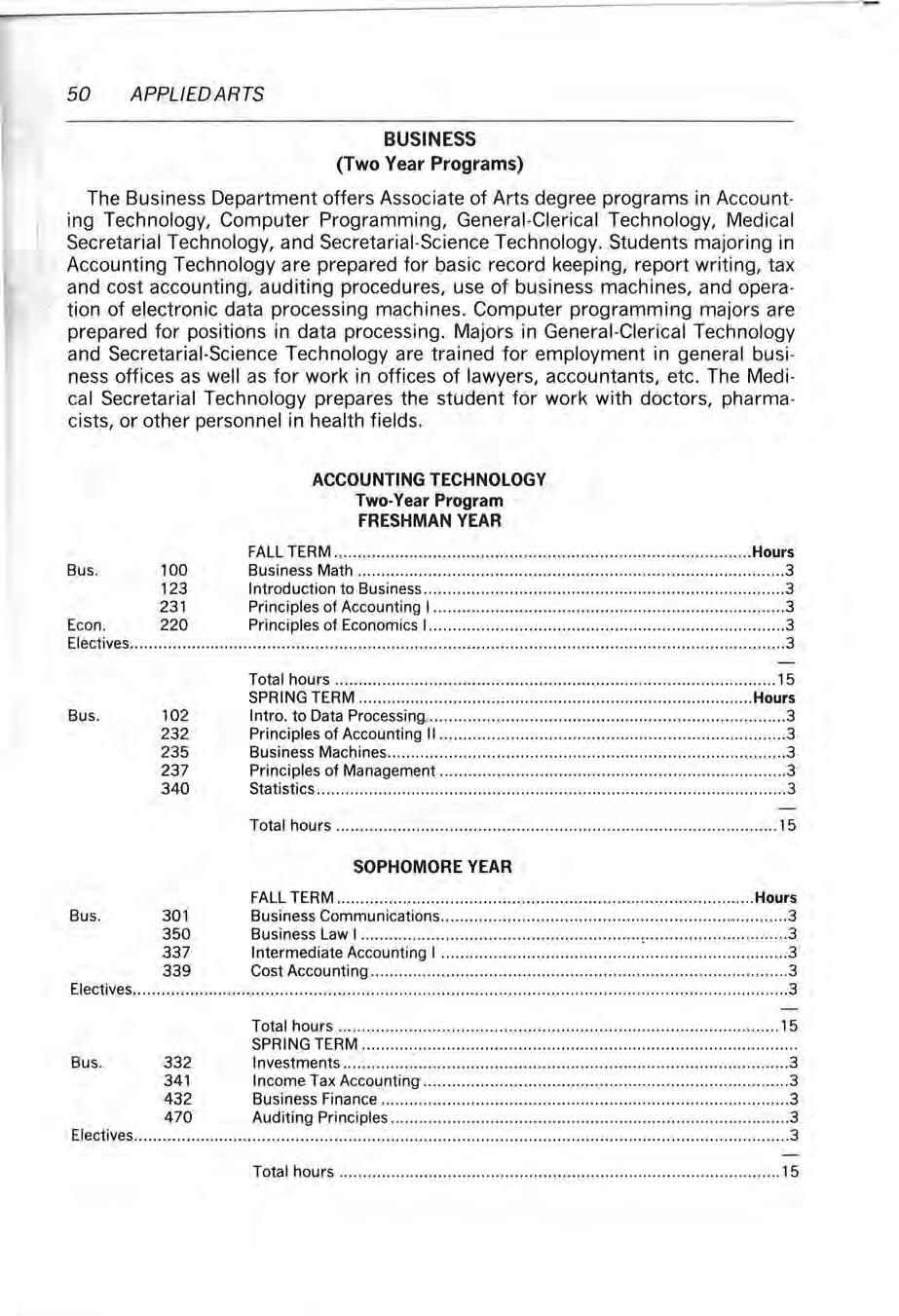
Two-Year Program FRESHMAN YEAR FALL TERM Hours Bus 100 Business Math 3 123 Introduction to Business 3 231 Principles of Accounting 1 3 Econ . 220 Principles of Economics 1.............. ......... .. .... ............. . .. ... ...... ... .. .... .. . .. ... .... 3 Electives 3 Bus. 102 232 235 237 340 Total hours 15 SPRING TERM Hours Intro to Data Processin g; 3 Principles of Accounting 11 3 Business Machines .3 Principles of Management 3 Statistics 3 Total hours 15 SOPHOMORE YEAR FALL TERM ......................... ..... .... .. .... ..... .... .. .......... ....... .. . ................. Hours Bus. 301 Business Communications 3 350 Business Law I 3 337 Intermediate Accounting I : 3 339 Cost Accounting 3 Electives 3 Total hours , 15 SPRING TERM Bus. 332 Investments .. ..... ... .. ..:.... .. . ... ... .. .. ..... ........ ......... .... ..... .... .. ... . ........ ..... ........ 3 341 lncomeTa x Accoljntin g 3 432 Business Finance ....... ............ ... ....... .. .. . .. ............. .. .. .... .... ... ... ..... .... .. .... .. .. 3 470 Auditing Principles 3 Electives ......... ......... .... ... .. ..... .... ..... ...... .. .... .. .. .................... .......... .. .. ..... .. ....... ... ....... .... .......... .. ....... 3 Total hours 15
ACCOUNTING TECHNOLOGY
*If student had algebra at the high school level and feel s competent in math, he may waive Busin ess Math.

APPLIEDARTS 51
COMPUTER PR OG RAMMING 1"110 m ll<<\, 'llO DG,\~ I,,..,_,_ General Edu cation 12 hours Requirements for Major 44 hours Required Hours Bus. 123 Introduction to Business 3 231 Principles of Accounting 1 3 232 Principles of Accounting 11 3 Bus / Math. 102 Introduction to Data Processing 3 203 COBOL Programming 3 204 FORTRAN Programming 3 400 Special Problems in Computer Programming 4 Math. 105 Precalculus Mathematics 5 106 Precalculus Mathematics 5 340 Statistics .... .............. ................... .... .... ..... .... ..... .. ... .. .. ....... .... .. ......... . ........ 3 At least nin e hours from: Bus. 235 Business Machines 3 237 Principles of Management 3 328 Principles of Market ing 3 337 Intermediate Accounting I 3 339 Cost Accounting .............................. .... . .. . ...... ... ..... .. .... .. ... ... .. .. .. .. ... .. .. ... .... 3 341 Income Ta x Accounting 3 Math. 309 Calculus with Analytic Geometry ......... .. ...... .. .. .. .... ... .. .. ...... ...... ........ ... .. ..... 5 310 Calculus with Analytic Geometry 5 Electives from science, mathematics, humanities, psychology , and Applied Arts 4 Bus Bus 100 121 . Total hours 60 GEN ERAL -CLERICAL TECHNOLOGY Two-Y ear Program FRE SHMAN YEAR - FALL Business Math ..... .......... . .. ....... ... .... .. ..... .... ..... ... ... ...... .. .. ........ .. .. .. .. ..... ..... 3 Beginning Typing 3 or 220 Intermediate Typing 3 123 Intro. to Business .... .. ........ ...... ... .... ....... .. .. .. .... .... ......... .. ..... .. .. .. .. .............. 3 222 Machine Transcription s I ....... .. ......... .. ..... .... ..... .... ..... ..... ...... .. ... .. ..... ... ..... .3 235 237 250 334 Elective 3 Total hours 15 FRE SHMAN YEAR - SPRING Business Machines 3 Prine of Management 3 Salesmanship .3 Advanced Typing .3 Electives 3 Total hours 15
60 HOURS TOTAL PROGRAM WITH AT LEAST 50 HOURS REQUIRED IN BUSINESS AND ECONOM· ICS

Students who have had previous in struc ti o n in typing are not to enroll in the beginning typing course without the approval of the instructor
Students who have had algebra or some other adva n ced work in math are not to enro ll in Business Math.
52 APPLIEDARTS Econ Bus Bus Speh HE c 220 231 301 350 102 222 325 433 152 130 SOPHOMORE YEAR - FALL Prine . of Economics 1..... ... ... ..... . .. ........ . . ... . ... .... ..... .. ... .. .. .. . . ... . .. . . .... . ........ ..3 Accounting 1 2·3 Bus. Communications ..... .. . .. . .. ... . . . ..... . . . .. ..... .. .... ... . . ....... . ... . .. ...... . ... .. ... . .... 3 Bu siness Law 3 Electives : 3·4 Total hour s 14-16 SOPHOMORE YEAR - SPRING Intro to Data Proc 3 Mac hin e Transcription 11 2 Secretarial Procedures 4 Office Management 2 Fundam e ntal s of Speech 3 Perso n al Imp roveme nt 2 Total h ours 16
Bus. Chem Bus B iol. Chem. 121 MEDICAL SECRETARIAL TECHNOLOGY Two-Year Program FRESHMAN YEAR - FALL Hours Beginning Typewriting 3 or 220 Inter m edia t e Typewriting 3 123 Intro. to Business 3 131 Elementary Shorthand 3 or 222 Dictation & Tr an s. V 3 222 100 101 132 or Machine Transcriptions I 3 Business Mathematics 3 General Chemist ry 4 Total hours 16 FRESHMAN YEAR - SPRING Hours lnt erm edia t e Shcirtharid ........ .... . ......... .. ...... .. .. ... . . ... .... . ......... .... .. .. .. .. .. ....... 3 or , 222 Dictation & Trans VI 3 222 235 433 102 102 or M ac hin e Transcriptions 11 2 Business Machines 3 Office Management 2 Genera l Biology 3 Ge n era l Chemistry .4 Total h o urs 14 or 15
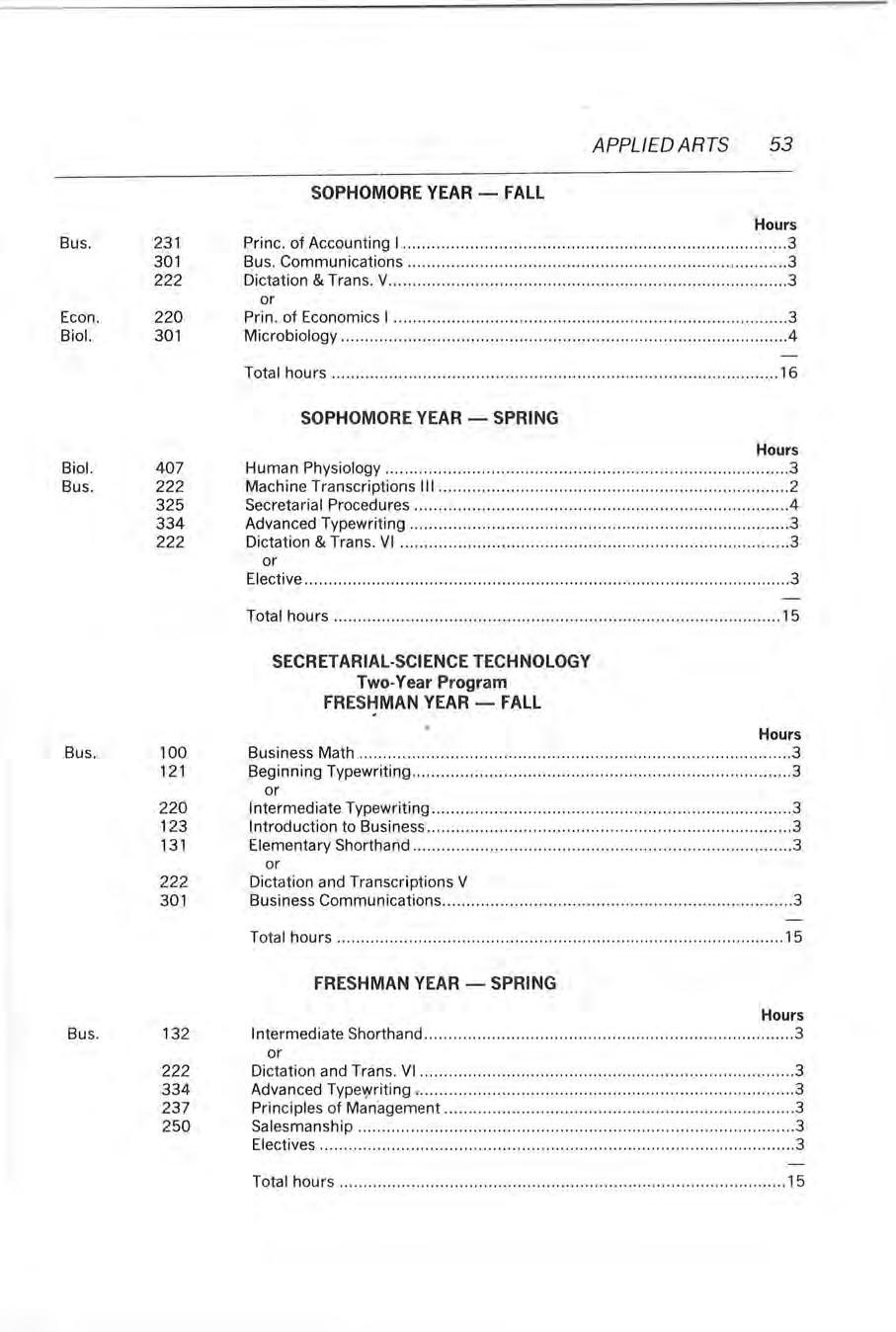
Bus Econ. Biol. Biol. Bus Bus. Bus . 231 301 222 220 301 407 222 325 334 222 100 121 220 123 131 222 301 132 APP LI ED ARTS 53 SOPHOMORE YEAR - FALL Hours Prine of Accounting 1 3 Bus. Communicat ions ............ . .. ... .. . . . ....... . ... ... . ........ ... ...................... ... . .. . .3 Dictation & Trans V 3 or Prin of Economics I 3 Microbio logy ........................ . ................................ . .... .. ......... . ...... .. ........... 4 Total hours ....... . ... . ..................... ........ ... ... .. .. ....... .. .. ...... .. ...... .. . .............. 16 SOPHOMORE YEAR - SPRING Hours Human Phys iology 3 Machine Transcriptions 111 2 Secretaria l Procedures 4 Advanced Typewriting 3 Dictation & Trans VI 3 or Elective 3 Tota l hours 15 SECRETARIAL-SCIENCE TECHNOLOGY Two-Year Program FRESHMAN YEAR - FALL Hours Business Math 3 Beginning Typewriting 3 or Intermediate Typewriting 3 Introduction to Business 3 Elementary Shorthand 3 or Dictation and Transcr i ptions V Business Communications ........ . .... . ... ..... . ... .... .... . .. .. ... .... ... . .. . . . .. ... .. .. . .. . .. . ..3 Total hours 15 FRESHMAN YEAR - SPRING Hours Intermediate Shorthand 3 or 222 Dictation and Trans. VI ............. .. .......... .. ............ .. ...... . .................... .. ........ 3 334 Advanced Type~riting , 3 237 Principles of Management 3 250 Salesmanship 3 Electives 3 Total hours 15
* Students with previous in struction in typing should not enroll without the approval of the instructor. Students who have had algebra or other advanced work in math should not enroll in Business Math. Students who are not eligible to take the above courses in the sequence suggested should select substitute business requirements or electives.
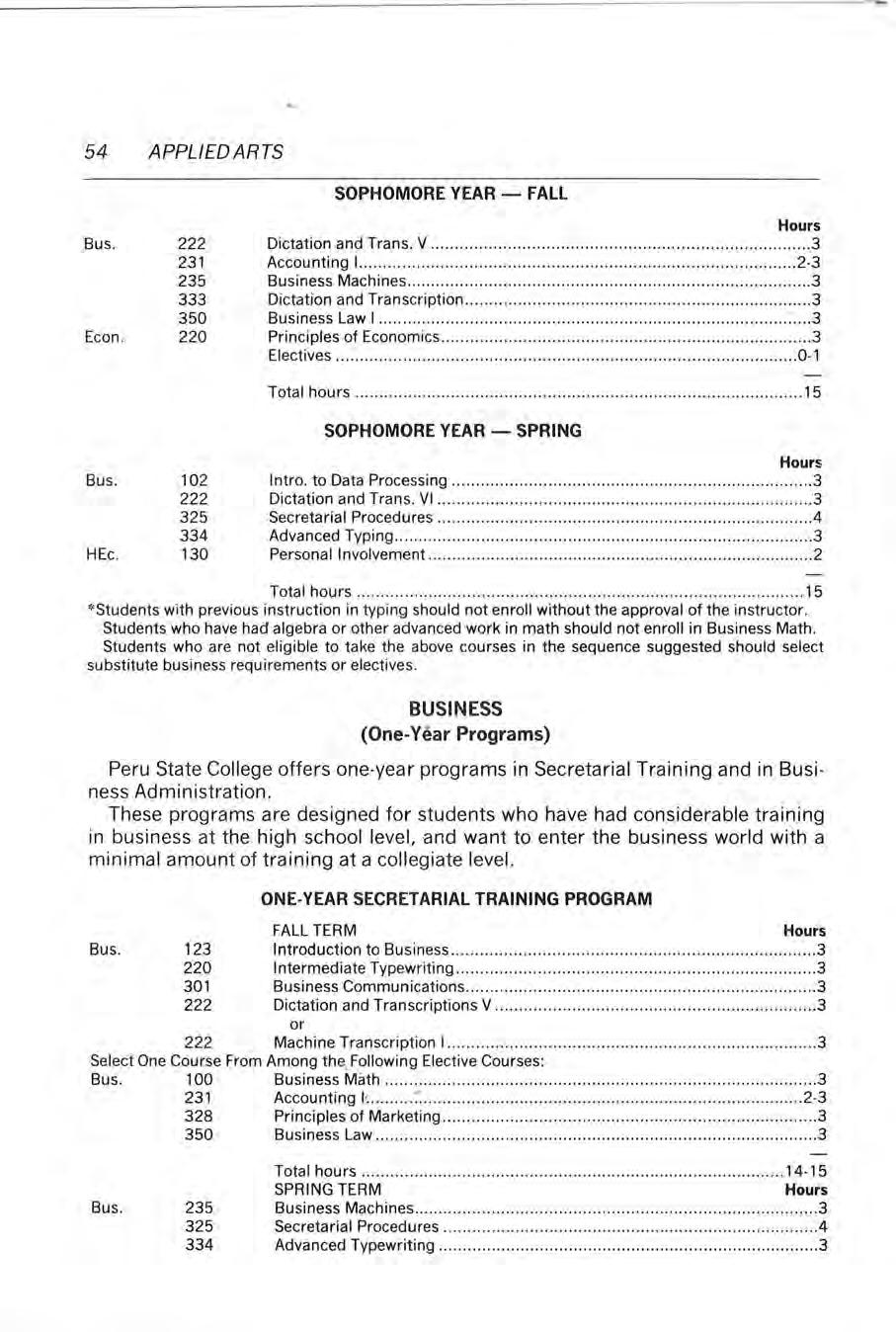
BUSINESS
(One-Y ea r Programs)
Peru State College offers one.year programs in Secretarial Training and in Busi• ness Administration.
These programs are designed for students who have had considerable training in business at the high school level, and want to enter the business world with a minimal amount of training at a collegiate level.
.. 54 APPLIEDARTS Bus Econ Bus HEc. 222 231 235 333 350 220 102 222 325 334 130 SOPHOMORE YEAR - FALL Hours Dictation and Trans. V 3 Accounting 12·3 Business Machines 3 Dictation and Transcription 3 Business Law 1 3 Principles of Economics 3 Electives 0.1 Total hours 15 SOPHOMORE YEAR - SPRING Hours Intro. to Data Processing 3 Dictation and Trans. VI 3 Secretarial Procedures .4 Advanced Typing 3 Personal Involvement 2 Total hours 15
Bus. 123 220 301 222 ONE-YEAR SECRETARIAL TRAINING PROGRAM FALL TERM Hours Introduction to Business 3 Intermediate Typewriting 3 Business Communications 3 Dictation and Transcriptions V 3 or 222 Machine Transcription 1 3 Select One Course From Among the, Following Elective Courses: Bus. 100 Business Math 3 Bus. 231 Accounting l• 2.3 328 Principles of Marketing ............ ...... ...... .. ..... . ..... ... .. .. .............. . ........ ... ........ 3 350 Business Law 3 235 325 334 Total hours 14·15 SPRING TERM Hours Business Machines 3 Secretarial Procedures .4 Advanced Typewriting 3
Upon successfully completing the above program , the business department will offer a ce rtifi ca te of completion to all students who achieve a 5 00 cumulative grade point aver ag e in all cours es tak en in the business department, and who receive a grade of no less t han a 4 in a spe cific ally r equired skill course
The Busines s Department will offer a ce rtifi cate of completion to those wh o successfully complete the above program
VOCATIONAL EDUCATION
For those seeking approval i'n-Vocational Office Occupation Education, the fol • lowing is required in addition to the ge neral degree requirement s:
major of 45
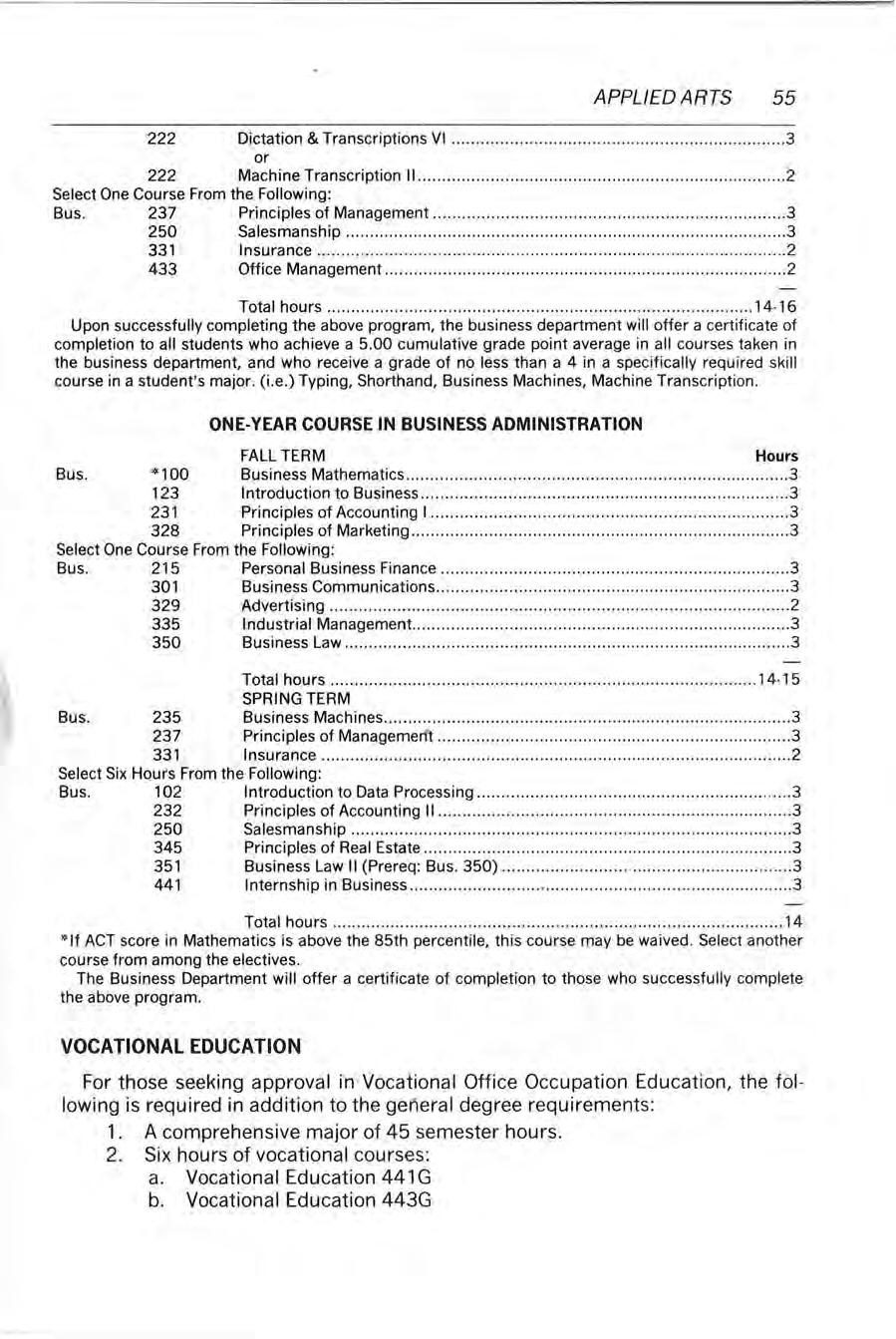
APPLIED ARTS 55 222 Dictation & Trans criptions VI 3 or 222 Machine Transcription 11 2 Select One Course From the Following : Bus 237 Principles of Manag ement 3 250 Salesmanship 3 331 Insurance 2 433 Office Managem ent 2 Total hours 14· 16
in a student' s major (i.e ) Typing , Shorthand, Business Machin es , Machin e Tran sc ription ONE -YEAR COURSE IN BUSINESS ADMINISTRATION FALL TERM Hours Bus. * 100 Business Mathemati cs . 3 123 Introduction to Busines s 3 2 31 Principles of Accounting 1 3 328 Principle s of Marketing .............. ..... .. .... ..... ........... ..... .. .. ..... .. .... .. .. .. ... .. .. ... .3 Select One Cour se From the Following: Bus 215 Personal Business Finan ce . 3 301 Business Communications 3 329 Advertising ...... ... .. .. .... ... .. .. . .. ........ ...... ... ....... ......... ..... .......... .. ...... ............ 2 335 Industrial Management. 3 350 Business Law .. .. . .. . .. ... .. .. ..... .. . .. ... ............... ......... ... .. .... .. ... .. ...................... 3 Total hours 14· 15 SPRING TERM Bus 235 Business Machines 3 237 Principles of Management .3 331 Insuran ce 2 Select Six Hour s From the Following: Bus. 102 Introduction to Data Processing 3 232 Principles of Accounting 11 ...•••.•••.•• •••. .•.• .• ..•.••• •• .• •.••• •••••• •... •••....• • .• •3 250 Salesmanship .3 345 Principles of Real Estate ........ ... .. .. ...... ...... ... .. .. .. ....... ... ...... .. .... .... .... ....... ... 3 351 Busines s Law II (Prer eq: Bus. 350) 3 441 Internship in Business 3 Total hours 14 * If ACT score in Mathematics is abov e th e 85th perce ntile, this cour se may be waived Select anoth er cour se from among the electives
1
comprehensive
semester hours 2. Six hours of vocational courses : a. Vocational Education 441 G b. Vocational Education 443G
A
APPLIEDARTS
3 Two years recent employment in the field to be taught or equivalent. One-half of this work experience (2,000 hours) can be satisfied by completing Voe. Educ. 444G for 3 hours credit.
4. Student teach in a reimbursable vocational program. If student teaching is not done in a vocationally approved program an additional 3 hours of vocational education is required.
5. Complete a minimum of 20 semester hours in technical areas and supporting courses.
ARTS (Four Year Programs)
The Industrial Arts department offers four year degree programs in Indu strial Arts,
and Industrial Management Technology .
MANUAL ARTS THERAPY
Stud ents who have a Bachelor of Scien c e in Edu ca tion degree with a major in Indu strial Arts may take additional training in Manual Arts Ther apy. This progr am i s in cooper ation with th e Veter a ns Administration Center Hospital at Wadsworth, Kan sas. Following gradu ation, th e student spends 10 weeks at the hospital. Upon succe ssful completion of the int ernship, th e stud ent is eligible for G.S . 6 Civil Service rating Detail s of the , program may be obtain ed from the Division Chairman.
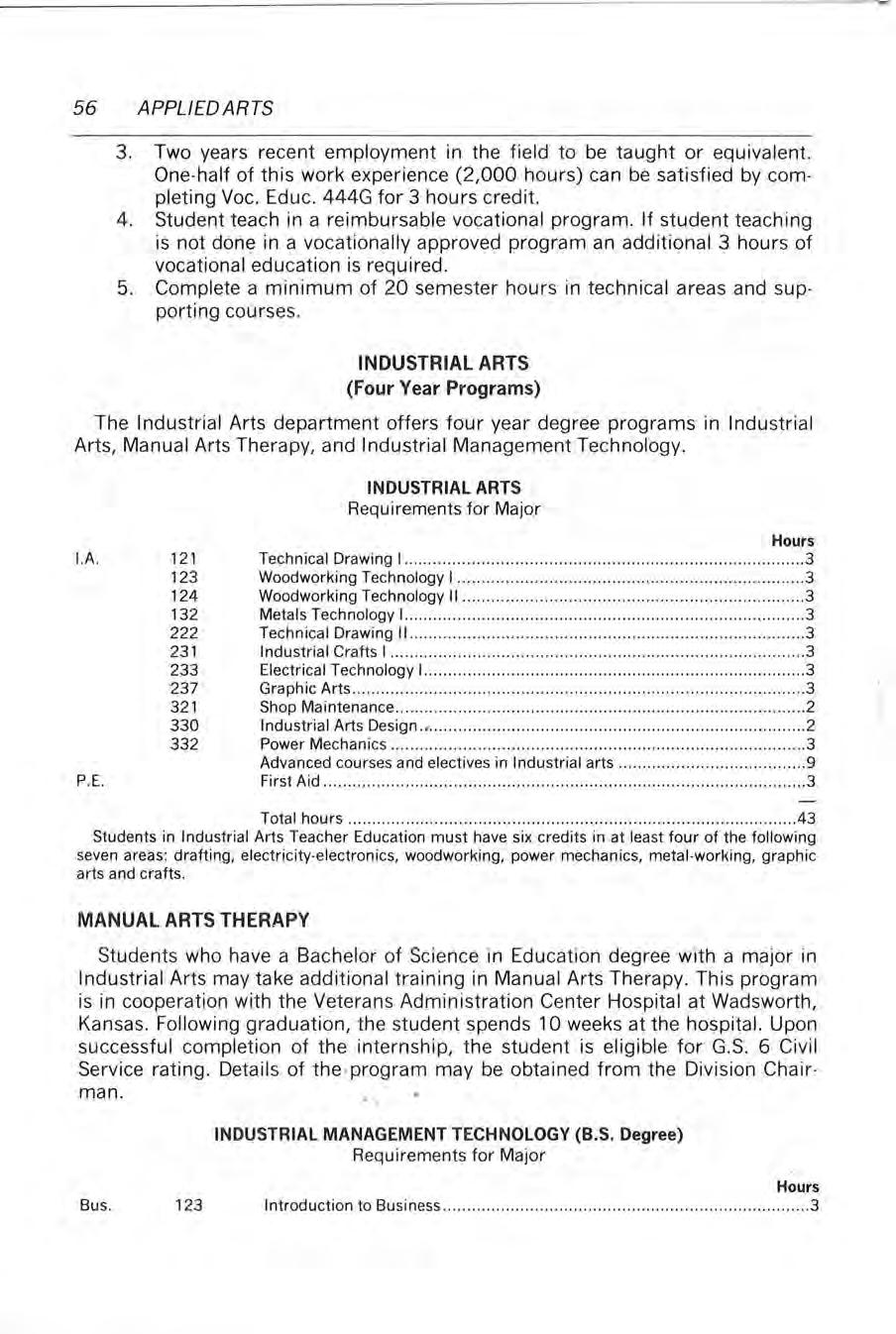
56
INDUSTRIAL
Manual
Therapy,
I.A P.E. 121 123 124 132 222 231 233 237 321 330 332 INDUSTRIAL ART S Requirements for Major Hours Te chnical Drawing 1 3 Woodworking Tec hnology I ........ ....... .. ....... ...... .............. ... .. .... .... .... .. ......... 3 Woodworking Te chnology II 3 Metals Techn ology 1 3 Tec hni ca l Drawin g 11 3 Indu stri al Craft s I 3 Electrical Technology 1 3 Graphic Arts 3 Shop Maintenan ce 2 Indu stri a l Art s De sign 2 Pow er Mec hani cs 3 Advanced cour se s and el ectives in Industri al arts 9 First Aid 3 Tot al hour s 43 Stud ents in Indu strial Art s Teacher Edu cation must have si x credit s in at least four of the following sev en ar eas: drafting , electri c ity -e lectroni cs , woodworking, pow er mechani cs , metal-working, graphi c art s and crafts
Arts
Bus 123 INDU STRIAL
Requirem ents for Major Hours Introdu ction t o Bu sin ess 3
MANAGEMENT TECHNOLOGY (B.S. Degree)
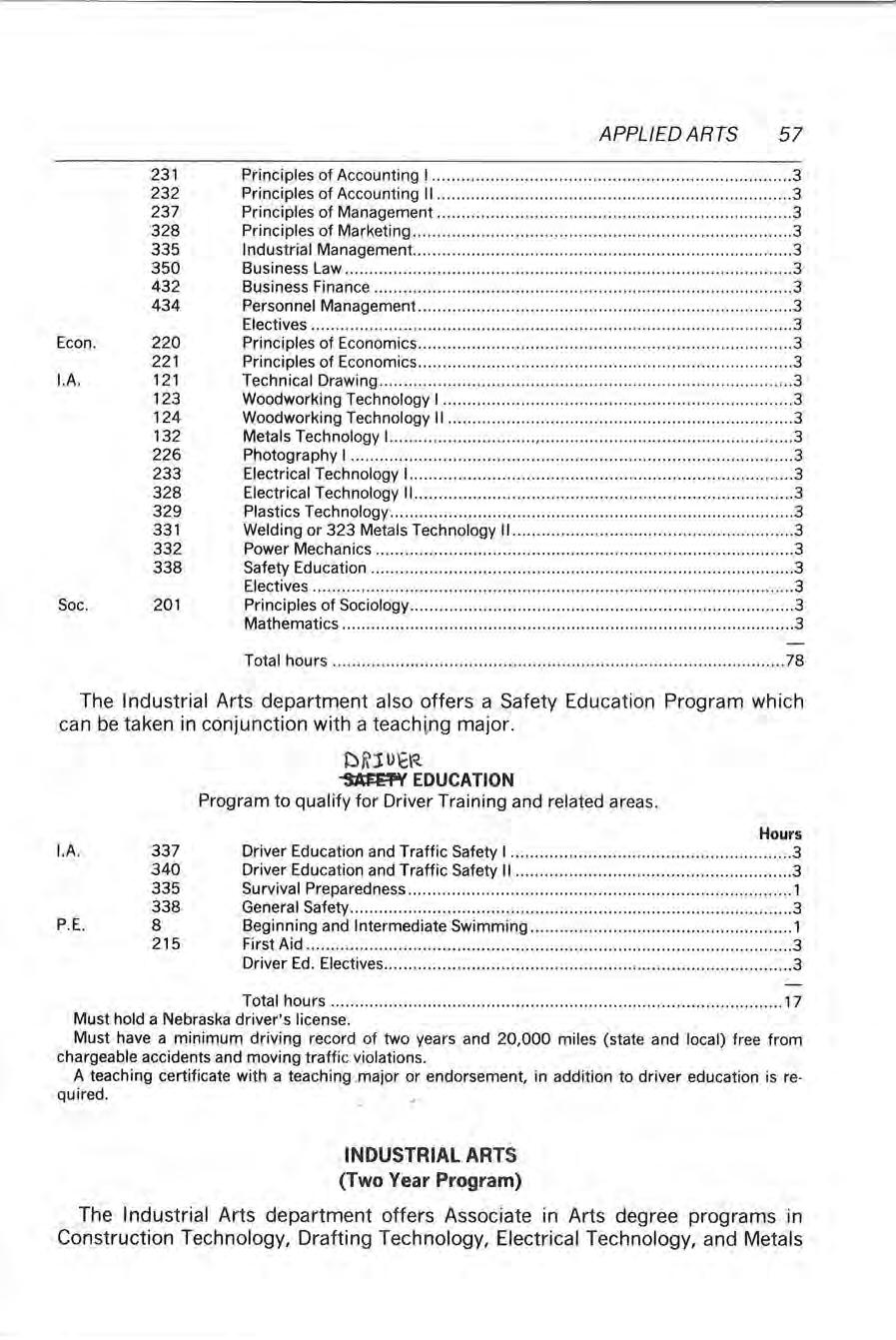
Econ. I.A. Soc 231 232 237 328 335 350 432 434 220 221 121 123 124 132 226 233 328 329 331 332 338 201 APPLIED ARTS 57 Principles of Accounting I 3 Principles of Accounting II 3 Principles of Management 3 Principles of Marketing 3 Industrial Management. 3 Business Law 3 Business Finance 3 Personnel Management 3 Electives 3 Principles of Economics 3 Principles of Economics 3 Technical Drawing 3 Woodworking Technology I ... ....... .. . .... .. . .. .... .. . ..... .. .... .. ..... .. .... . ....... .. ......... 3 Woodworking Technology 11 3 Metals Technology 1.................... ... ..... .., ....... ......... . .... ....... .... . .... .... ..... .. .... 3 Photography I 3 Electrical Technology 1.... ..... ... ........ . ... ...... ... .. ..... ..... ..... ... .......... ...... .. ........ 3 Electrical Technology 11 ................ ...... ... ...... .......... ............ ... ....... .. ... ... .. .. ... 3 Plastics Technology 3 Welding or 323 Metals Technology 11 3 Power Mechanics 3 Safety Education ........... .. .. .. . .. .. . .. ... . . ... ... . ............... . .. . ............ . . . .. .. . ... .. ...... 3 Electives 3 Principles of Sociology .... ...... .. .. .. .. ... .. ....... .... .. ..... . ..... .. ...... ... .... ... . ... ... . ...... 3 Mathematics 3 Total hours 78 The Industrial Arts department also offers a Safety Education Program which can be taken in conjunction with a teach lng major . I.A. P E 337 340 335 338 8 215 ~Rll>'E~ ~EDUCATION Program to qualify for Driver Training and related areas. Hours Driver Education and Traffic Safety I 3 Driver Education and Traffic Safety II 3 Survival Preparedness 1 General Safety 3 Beginning and Intermediate Swimming 1 First Aid 3 Driver Ed Electives 3 Total hours 17 Must hold a Nebraska driver's license Must have a minimum driving record of two years and 20,000 miles (state and local) free from chargeable accidents and moving traffic violations A teaching certificate with a teaching major or endorsement, in addition to driver education is re· quired INDUSTRIAL ARTS (Two Year Program) The Industrial Arts department offers Associate in Arts degree programs in Construction Technology, Drafting Technology, Electrical Technology, and Metals
Technology. Students who complete the Associate of Arts degree may continue to study for the four year degree with a major in Industrial Arts
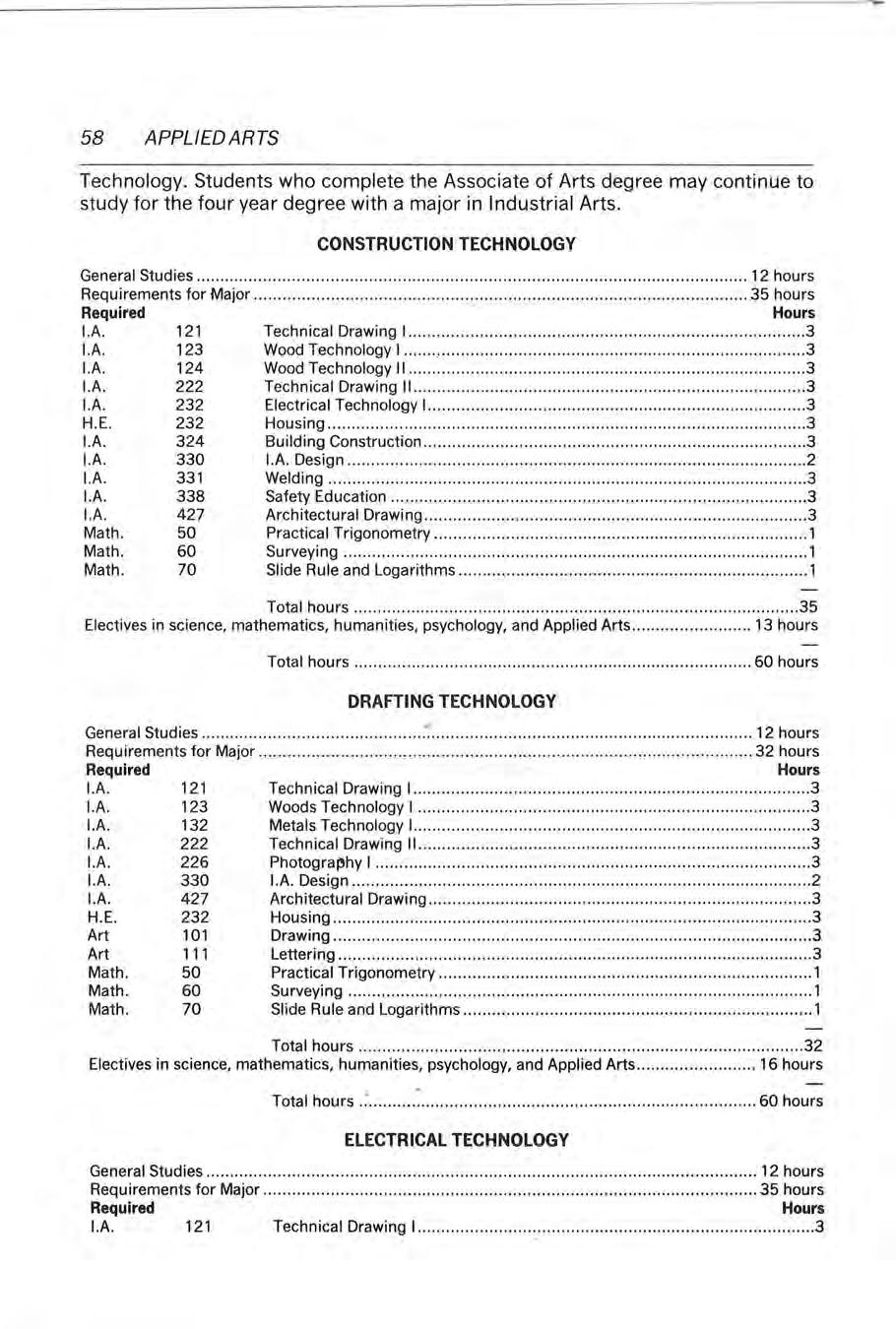
58 APPLIEDARTS
CONSTRUCTION TECHNOLOGY General Studies 12 hours Requirements for Major 35 hours Required Hours I.A. 121 Technical Drawing 1 3 I.A. 123 Wood Technology I 3 I.A 124 Wood Technology 11 .. ................. .......... .. ..... ..... .... ... ... .. .. ... ... ..... .. .... .... ....... 3 I.A. 222 Technical Drawing 11 3 I.A. 232 Electrical Technology 1 3 H E. 232 Housing 3 I.A 324 Building Construction 3 I.A. 330 I.A. Design ....... ..... .......... ....... ... ...... ... .. .... .. ... ... ..... .... .... .. ....... ................... 2 I.A. 331 Welding 3 I.A. 338 Safety Education .... ... .......... . ...... .... .... .......... ....... ................ ... ... .. ...... .. .. .... 3 I.A 427 Architectural Drawing 3 Math. 50 Practical Trigonometry .... .......... ...... ............. .. .. .. ..... ........ .... ........... ........... 1 Math. 60 Surveying 1 Math 70 Slide Rule and Logarithms 1 Total hours 35 Electives in science , mathematics, humanities, psychology, and Applied Arts 13 hours Total hours 60 hours DRAFTING TECHNOLOGY General Studies 12 hours Requirements for Major 32 hours Required Hours I.A. 121 Technical Drawing 1 3 I.A. 123 Woods Technology I 3 I.A. 132 Metals Technology 1 3 I.A 222 Technical Drawing 11 3 I.A 226 Photograi,hy I 3 I.A 330 I.A. Design 2 I.A 427 Architectural Drawing 3 H.E. 232 Housing 3 Art 101 Drawing 3 Art 111 Lettering .... ... ... ..... ... .. .. . .. .... ...... ... .. ... ...... . .. ... .. .. ..... ..... .. ...... .............. ... .. .. .3 Math. 50 Practical Trigonometry 1 Math . 60 Surveying .......... .............. ................... .. ..... ............... ......... .. ....... .............. 1 Math 70 Slide Rule and Logarithms 1 Total hours 32 Electives in science, mathematics, hui:nanities, psychology, and Applied Arts ..... .. ........ .......... 16 hours Total hours ' : 60 hours ELECTRICAL TECHNOLOGY General Studies ... ................ ........... .. .. ... .. ..... ......... ..... ..... ... .. ........ ......... . .. ....... .. .. .. .. .. ... .... ... 12 hours Requirements for Major 35 hours Required Hours I.A. 121 Technical Drawing 1 3
VOCATIONAL EDUCATION
For those seeking approval in Vocational Trades and Industrial Education, the following is required in addition to the general degree program.
1. A comprehensive major of 45 semester hours.
2. Six hours from the following Vocational courses :
a. Vocational Education 441 G
b. Vocational Education 442G
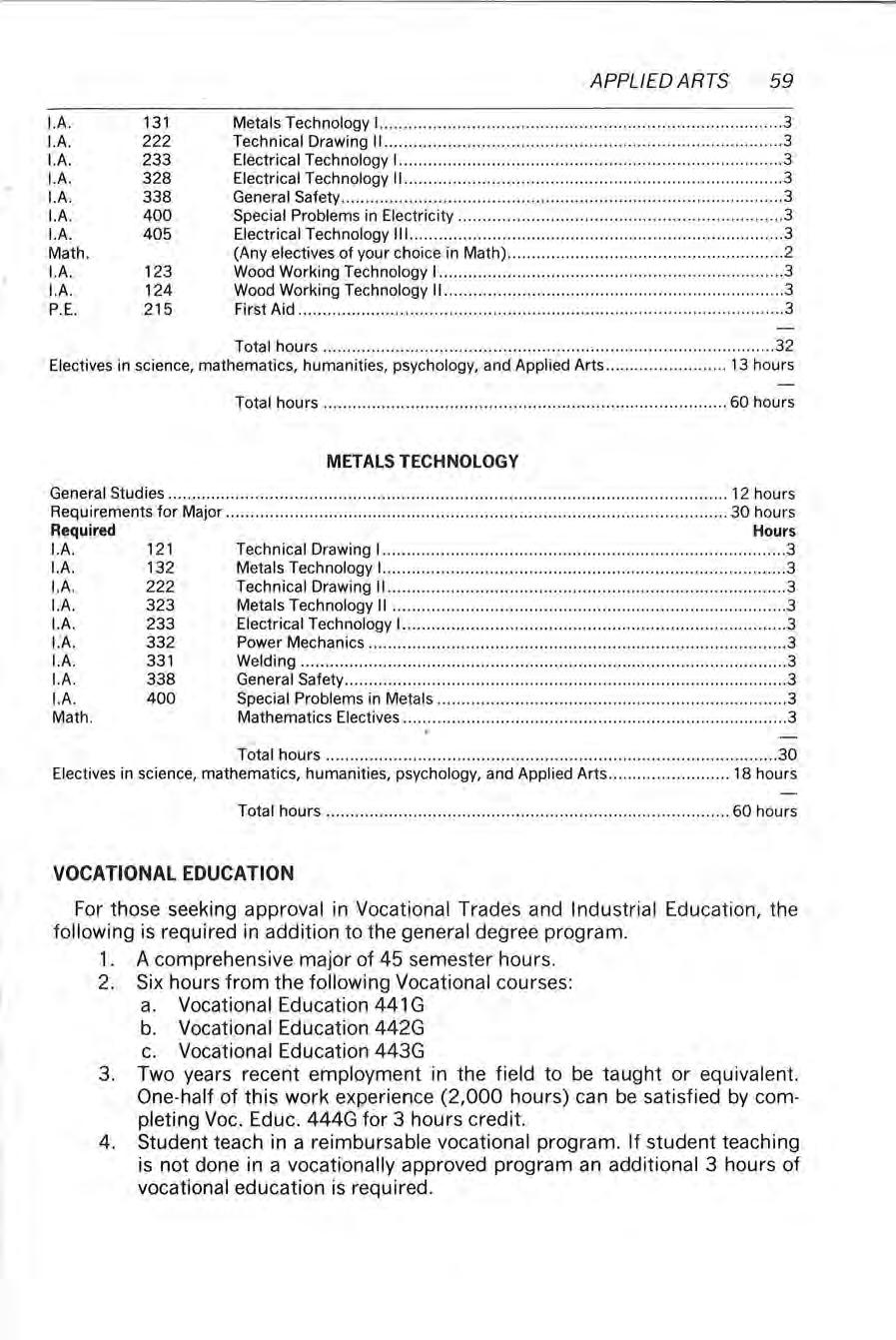
c. Vocational Education 443G
3. Two years recerit employment in the field to be taught or equivalent. One -half of this work experience (2,000 hours) can be satisfied by completing Voe. Educ. 444G for 3 hours credit.
4. Student teach in a reimbursable vocational program . If student teaching is not done in a vocationally approved program an additional 3 hours of vocational education is required.
I.A I.A I.A I.A I.A. I.A. I.A Math I.A. I.A . P.E. 131 222 233 328 338 400 405 123 124 215 APPLIED ARTS 59 Metals Technology 1 3 Technical Drawing 11 3 Electrical Technology 1 : 3 Electrical Technology 11 3 General Safety ........ . ... . ...... . .......... . .. .... ..... ... .. .. . .. .. .......... . . . . ...... ... ............ ..3 Special Problems in Electricity 3 Electrical Technology ll1.3 (Any electives of your choice in Math) 2 Wood Working Technology 1 3 Wood Working Technology 11 3 First Aid 3 Total hours , 32 Electives in science, mathematics, humanities, psychology, and Applied Arts 13 hours Total hours 60 hours METALS TECHNOLOGY General Studies 12 hours Requirements for Major 30 hours Required Hours I.A 121 TechnicalDrawingl 3 I.A . 132 Metals Technology 1............... .... ... .. .... .. . .. ........ ... ... ...... ........... . ...... . .... . ...... 3 I.A 222 Technical Drawing 11 3 I.A. 323 Metals Technology II .. ........... .... ........ . ...... ... .... ... ...... ... .. ......... .. ......... ... .. .. .3 I.A. 233 Electrical Technology 1 3 I.A 332 Power Mechanics .............. .. ..... . .. ....... .. ..... .. ..... .... ... .. .......... .. .......... . ......... 3 I A 331 Welding 3 I.A. 338 General Safety 3 I.A 400 Special Problems in Metals 3 Math. Mathematics Electives 3 Total hours 30 Electives in science, mathematics, humanities, psychology, and Applied Arts 18 hours Total hours 60 hours
5. Complete a minimum of 15 semester hours of technical course work directly related to the area of specialization to be t aught.
This four year degree program is also offered by the Division of Applied Arts .

60
APPLIEDARTS
HOME
D
FA MILY,
AN
CO NSU M ER EC ONOMICS
Required: H Ec 130 H.Ec. 133 H.Ec. 134 H.Ec 141 H. Ec 205 H Ec. 232 H Ec 322 H.Ec 302 H Ec. 321 H Ec 333 H.Ec 410 H Ec. 421 Econ . 220 Econ. 221 Bus 123 Elect 5 Hours From: Bus. 328 Bus. 329 Bus. 331 Bus 350 HOME ECONOMIC S (B.S. Degree ) Requirements for Major Hour s Personal Involvement 2 Food Preparation and Nutrition 3 Meal Management. . .. .. .. . . .. . . . . . ... .. .. .. . . .. .. . . .. ..... .... ....... ... . .. ... .. . . . .... . . . .... . . .. .... 3 Clothing Selection and Con struction 3 Selection, Use and Care of Household Equipment.. .... .. ........ .... ........ ....... .... 3 Housing 3 or Home Furnishing Child Development .. ............. . .. . .. . . ... . ...... . ..... .. ...... . . ... . ........... . ...... ... .. . ... . .. .3 or Human Relationsh i p Textiles .3 The Consumer in American Society .3 Home Management 3 Home Ee. Electives 6 Principles of Economics I 3 Principle s of Economics 11 3 Introduction to Bus'iness 3 Principles of Marketing 3 Advertising 2 Insurance , 2 Business Law 3 Total , , , , . , 50
Curricula Outlines
Division of Education
DR. M. L. LAND, CHAIRMAN
The Division of Education offers programs in Psychology and Teacher Educ ation. The Division has as its primary responsibility the preparation of effective teachers. The focus, then, of the teacher education curriculum is upon the acquisition and development of effective instructional skills by each student in the program.
OBJECTIVES OF TEACHER EDUCATION
Each teacher should be able to demonstrate behaviors which will help the learner to:
1. Acquire the greatest possible understanding of himself a~d an appreciation of his worthiness as a member of society.
2. Acquire understanding and appreciation of persons belonging to socioeconomic groups different from his own.
3. Achieve the fullest development of his academic potential.
4. Acquire a positive attitude for developing knowledge through the learning process.
5. Acquire health habits and an understanding of the conditions necessary for the maintenance of physical and emotional well-being.
6. Acquire the habits and attitud es associated with responsible citizenship.
7. Receive opportunity and encouragement to become competent in one or more fields of endeavor.
8. Understand and appreciate human achievement and the interdisciplinary nature of the natural sciences, the social sciences, the humanities and the arts.
9. Understand the opportunities for preparing himself for a productive life and encourage him to participate in these opportunities
10. Prepare for a world of rapid change and unforeseeable demands in which continuing education becomes a part of his adult way of life.
ADMISSION TO TEACHER EDUCATION CURRICULUM
Teacher candidates should apply for admission to teacher education during their sophomore year. Admission to the program is a prerequisite for student teaching Application forms are ayailable in rooms ED 200 and 201.
The Teacher Educ<!tion Committee is responsible for admission or denial to teacher education In all cases students will be informed of their status Students may request a hearing before the Teacher Education Committee by making written application to the Chairman, Division of Education and Psychology.
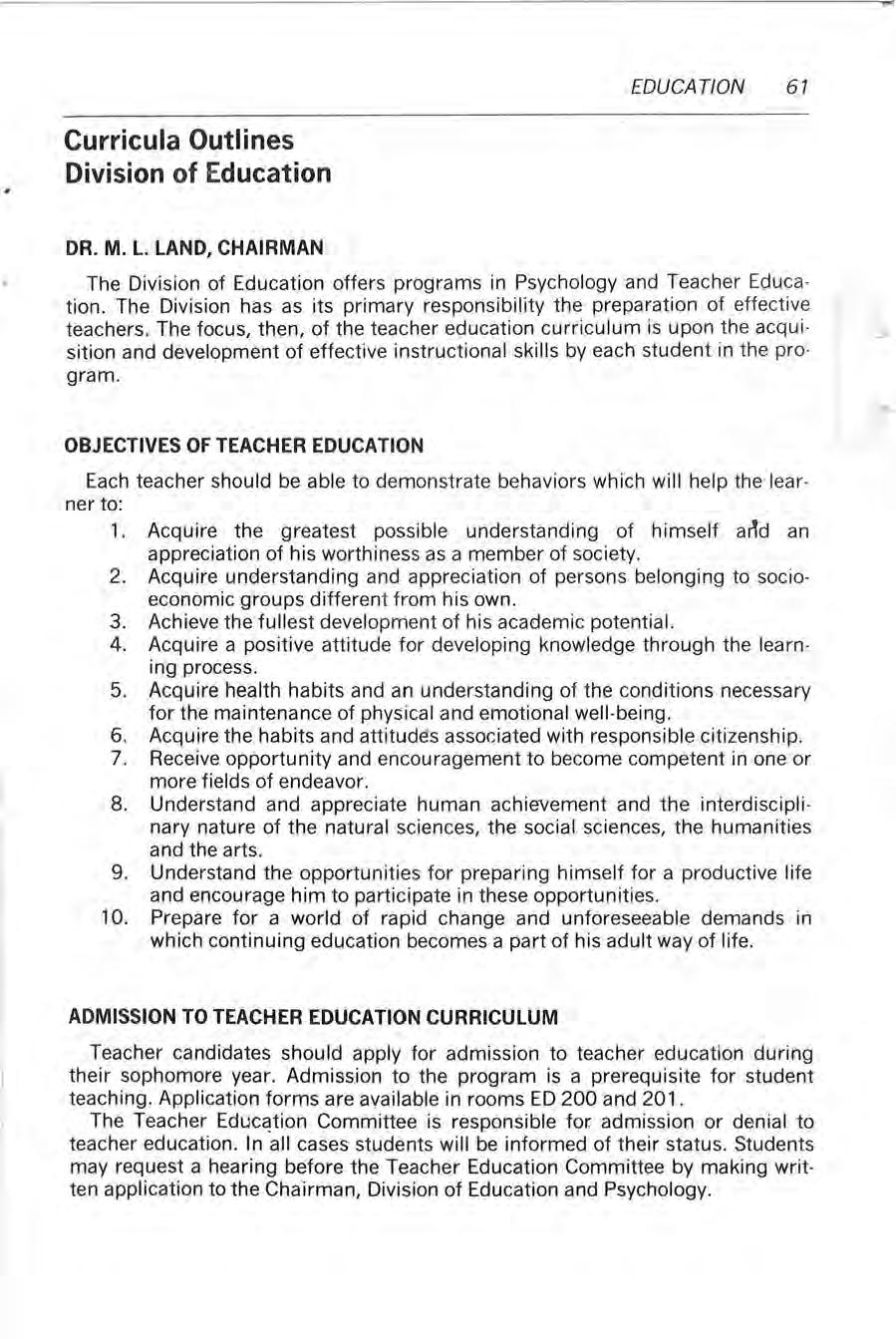
£DUCA TION 61
CRITERIA FOR ADMISSION TO TEACHER EDUCATION
1. Free from social probation.
2. Overall Grade Point Average of at least 5.25.
3. Overall Grade Point Average in major field of concentration of 5.25 .
4. Recommended by persons who by virtue of past association are in a position to know the student as a prospective teacher.
5. Evidence of proficiency in English and mathematics as indicated by scores at or above the fiftieth percentile on the ACT Program in the areas of English and mathematics. Students with scores less than this are required to achieve a grade of "5" or above in English 101 and / or a grade of "5" or above in Business / Mathematics 100, Mathematics 200 or other higher level mathematics course . Transfer students are expected to achieve equivalent scores on tests or equivalent grades in classes This policy becomes effective for the 1975 -76 academic year, and is in effect for those enrolling at Peru for the first time in the Fall of 1975.
A student may apply for admission to the Teacher Education Curriculum before he meets: (1) the Grade Point Average of 5.25; (2) is free from social probation; (3) meets the standardized test requirements and other requirements for full admission. No formal action is taken for Admission to the Teacher Education Program until written notice is received by the Director of Student Teaching regarding deficiencies in the student's application.
NEBRASKA TEACHER CERTIFICATION
Information regarding teaching certificates may be obtained from the Chairman of the Division of Education or from the Director of Teacher Certification, State Capitol, Lincoln, Nebraska, 68509.
ENDORSEMENT FOR TEACHING
All applicants are hereby advised that meeting academic or graduation requirements does not automatically complete requirements for institutional endorsement.
According to Nebraska Teacher Certification, the College has the responsibility of endorsing qualified persons for certificates . This responsibility has been delegated to the Teacher Education Committee. An endorsement indicates the grade level, subject field or area of specialization for which the teacher was especia lly prepared, and implies that the applicant has met appropriate standards of scholarship, sound mental and physical health, good citizenship, and moral character.
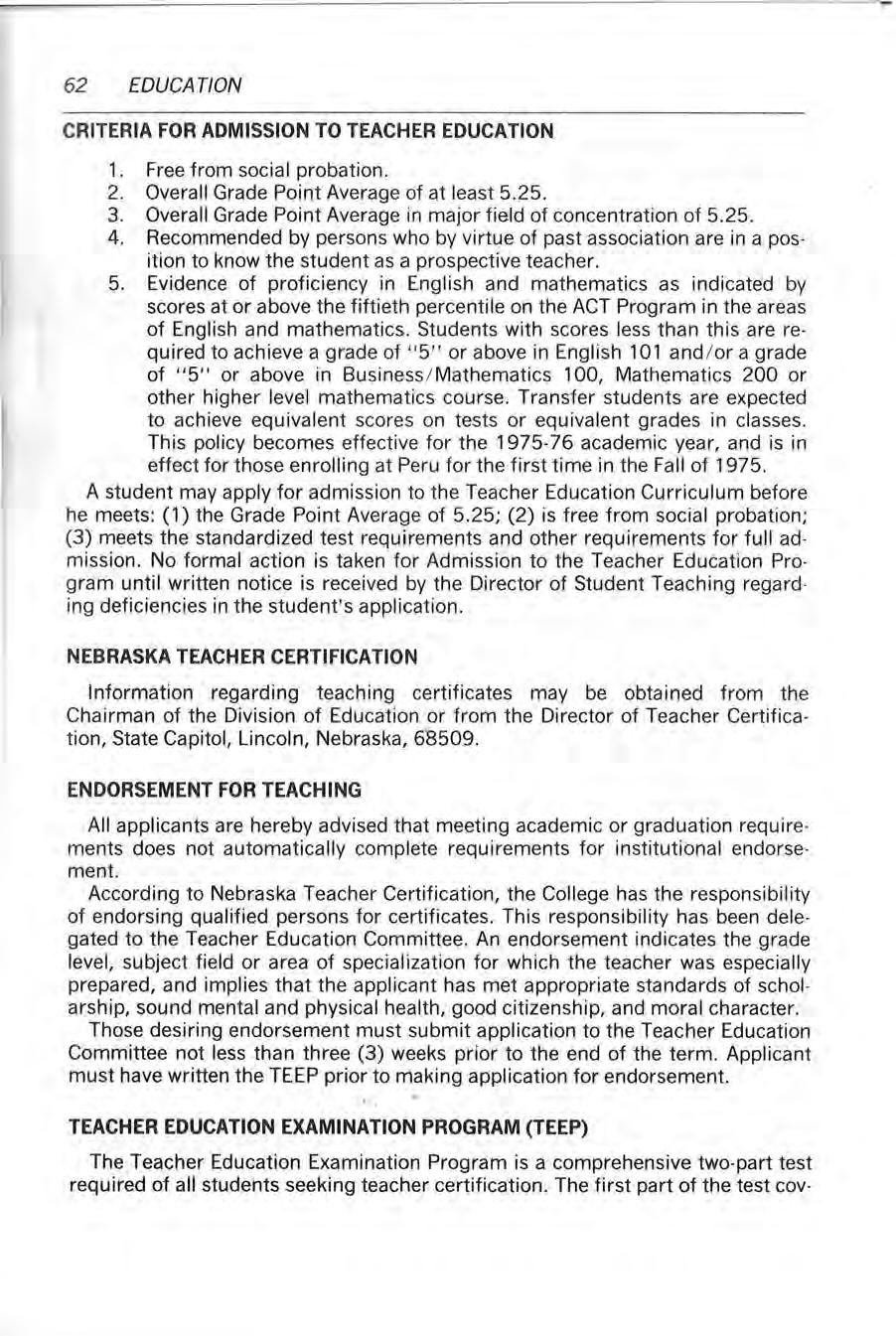
Those desiring endorsement must submit application to the Teacher Education Committee not less than three (3) weeks prior to the end of the term. Applicant must have written the TEEP priono making application for endorsement.
TEACHER EDUCATION EXAMINATION PROGRAM (TEEP)
The Teacher Education Examination Program is a comprehensive two-part test required of all students seeking teacher certification. The first part of the test cov-
62 £DUCA
TION
ers five areas in which competence i's considered basic to effective teaching : Social-Philosophical-Historical Bases of Education, Learning and Instruction, written English Expression, Cultural Background, and Science and Mathematics, the second part of the test is designed to gauge the candidate's knowledge and ab1l1ty for teaching a specific field. The test is given three times each year and takes approximately four hours.
THE PROFESSIONAL SEMESTER
Candidates must submit application for the Professional Semester before the end of the junior year.
To be eligible for assignment to student teaching, the student must meet the following requirements. .
1. The student must have been accepted into the teacher education curriculum.
2. The student must maintain all minimum criteria for admission to teacher education as a prerequisite to the professional semester.
3. The student must present evidence that he will have sufficient credits for the degree, one calendar year from the date of entry into the Professional semester.
4. The student must have completed the following : Elementary Secondary
Psych 121 Gen Psych Psych 121 Gen Psych
Educ 201 Fund of Teaching Educ 201 Fund of Teaching
Educ · 300 Models of Teaching Educ 400 Classroom Mang.
Educ 400 Classroom Manag. 6 hours of electives
Educ 401 Diagnosis and Assess . • Special Methods
Educ 409 Synthesis of Teaching Competencies
5. Each application for the professional semester must be approved by:
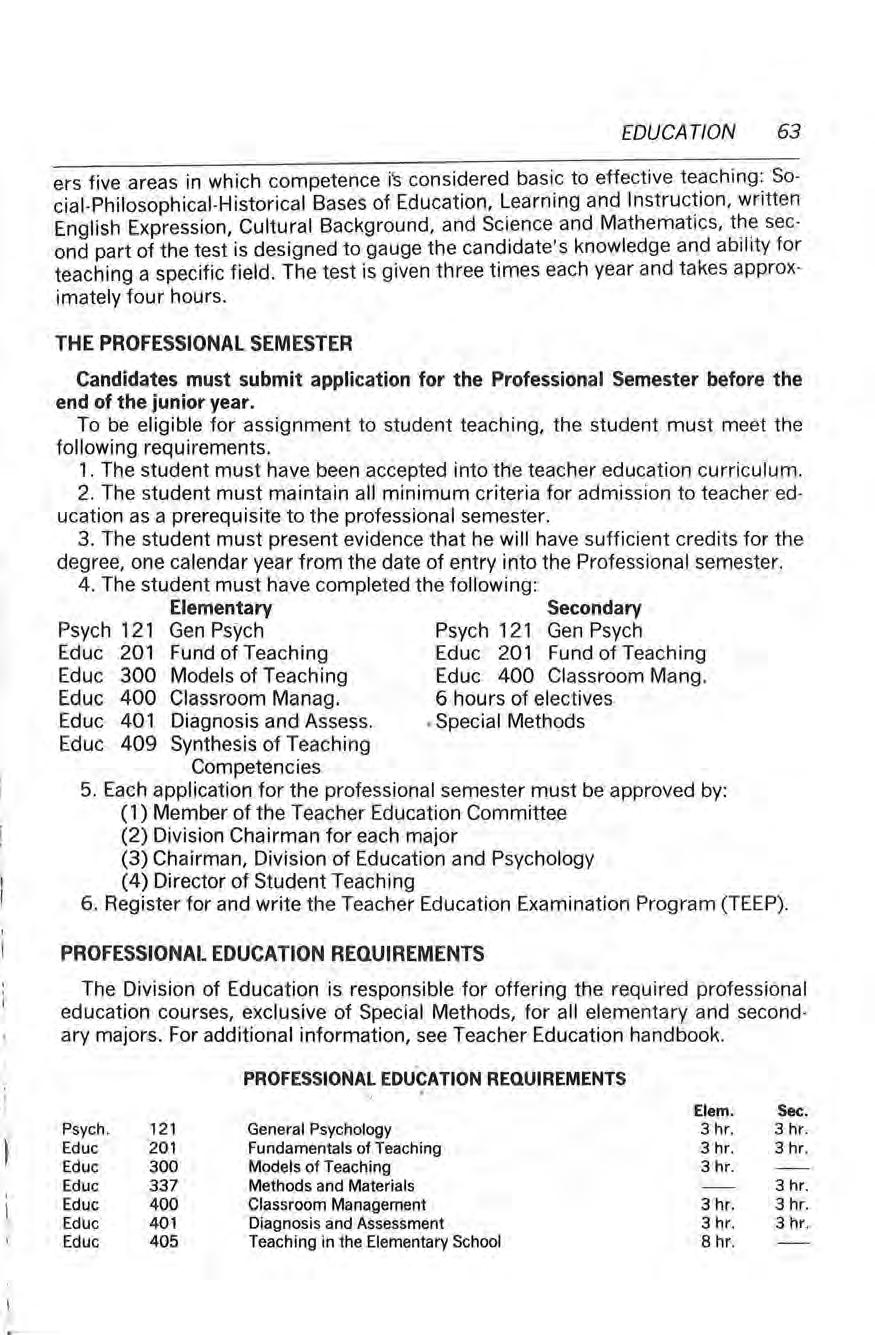
(1) Member of the Teacher Education Committee
(2) Division Chairman for each major
(3) Chairman, Division of Education and Psychology
(4) Director of Student Teaching
6. Register for and write the Teacher Education Examination Program (TEEP).
PROFESSIONAi. EDUCATION REQUIREMENTS
The Division of Education is responsible for offering the required professional education courses, exclusive of Special Methods, for all elementary and secondary majors. For additional information, see Teacher Education handbook.
PROFESSIONAL. EDU.CATION REQUIREMENTS
£DUCA TJON 63
Elem. Sec. Psych 121 General Psychology 3 hr 3 hr. Educ 201 Fundamentals of Teaching 3 hr. 3 hr. Educ 300 Models of Teaching 3 hr Educ 337 Methods and Materials 3 hr . Educ 400 Classroom Management 3 hr. 3 hr. Educ 401 Diagnosis and Assessment 3 hr 3 hr . Educ 405 Teaching in the Elementary School 8 hr.
.
64 £DUCA TION
Educ 409 Synthesis of Teaching Competencies
Educ 410 Student Teaching (elementary)
Educ 411 Student Teaching ( secondary)
Special Methods in Teaching Field
Electives - Secondary majors select from courses listed below
Total , ,
PROGRAM FOR SECONDARY TEACHERS
All students seeking an endorsement in secondary education must take Pol. Sci. 201, American National Government and 3 hrs. of American History .
In addition to all general and professional education requirements, the student must complete a major in one of the areas designated below Majors History.Geography
Art History
Biology Industrial Arts
Business Education Mathematics
English Music
Physical Education
Physical Science
Science (General)
* Social Science
Speech & Drama
* Additional endorsements possible - History, Geography, Economics, Political Science and Soc ial • ogy
Additional teaching endorsements in Coaching and Driver's Education are of. fered to complement any of the above majors .
Degree candidates seeking a teaching endorsement at the secondary level are further advised that to teach in a field outside of the major in a school accredited by the North Central Association, 24 hours are generally required. This latter con • dition does not necessarily imply that the candidate will qualify for a second en • dorsement.
SUGGESTED SEQUENCE FOR PROFESSIONAL EDUCATION COURSES - SECONDARY SOPHOMORE YEAR
Submit Application for Teacher Education JUNIOR YEAR
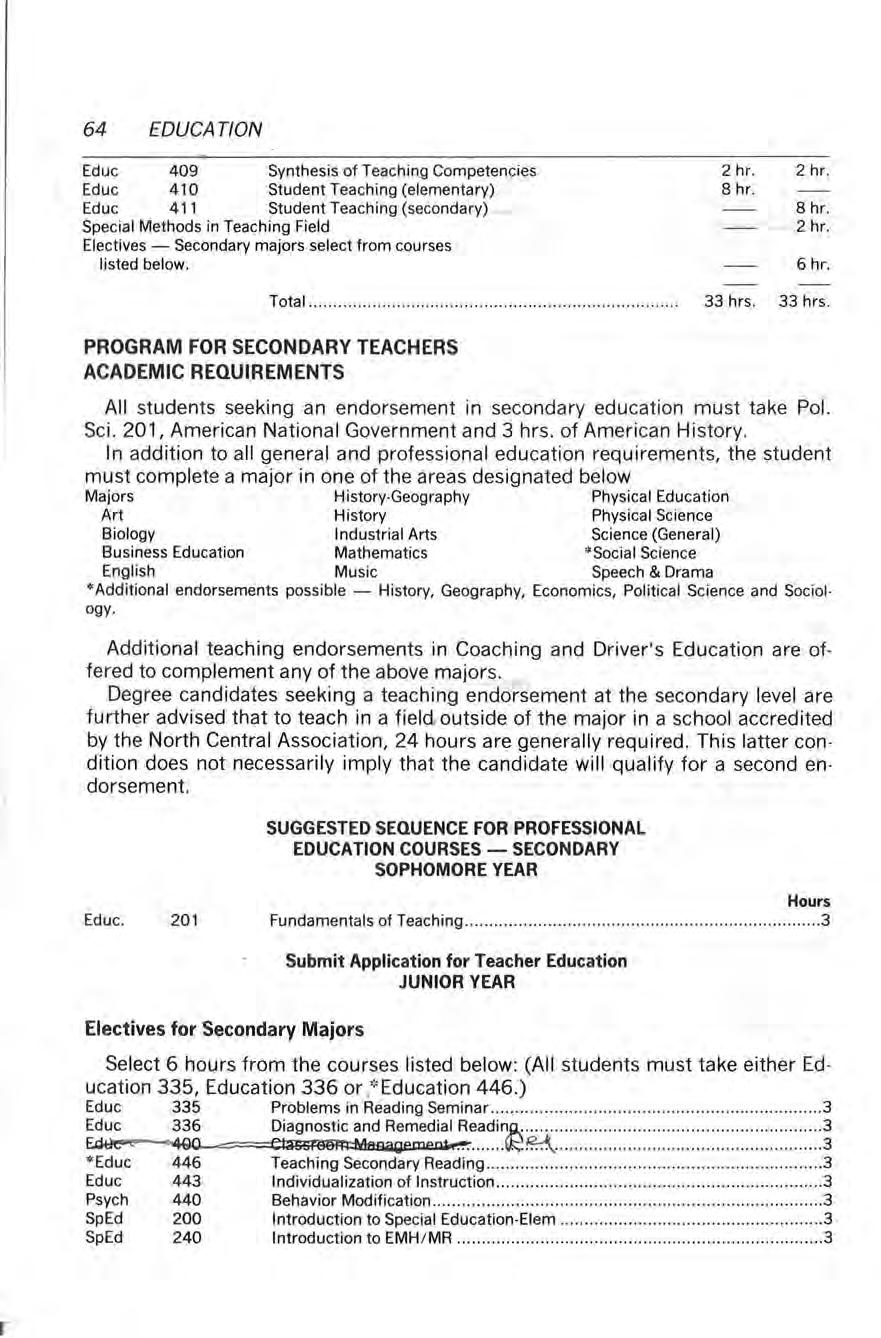
Electives for Secondary Majors
Select 6 hours from the courses listed below: (All students must take either Ed· ucation 335, Education 336 or ;:' EduGation 446 .)
hr. 2 hr.
8 hr. 2 hr 6 hr 33
33
ACADEMIC REQUIREMENTS 2
8 hr.
hrs
hrs
Hours Educ . 201 Fundamentals of Teaching ............. ....... .. .. .. .. .... .. .. .. .. ............ .. ..... ... .. .. ....... 3
Educ 335 Problems in Reading Seminar 3 Educ 336 Diagnostic and Remedial Readinp._ .. .. .. ........ ... .. ... .. ............................ ...... ... 3 E.dt! c < "4G O Classro~gernecu--- Us;-'12:7\ 3 * Educ 446 Teaching Secondary Reading 3 Edu c 4 43 Individualization of lnstruction 3 Psych 440 Behavior Modification 3 Sp Ed 200 Introduction to Special Education•Elem ..... .. ....... .. ........... ..... .. .... . .. .... ........ .3 SpEd 240 Introduction to EMH I MR .......... .. ............ .... .. .. ... .. .... ...... .. .... .. .. .......... ........ 3
(Four Year Programs)
The Department of Education offers four year degree programs in Elementary Education, Elementary Education with an endorsement in Early Childhood Education, Elementary Education with an endorsement in Special Education, and a Psychology-Sociology B.S. degree program.
ELEMENTARY MAJOR Requirements for Major
In addition to all general and professional education requirements, students must complete the following academic requirements . The candidate must also earn 24 hours in one academic area, an d 15 hours in each of two addit ional areas commonly taught in the elementary schools, along with 15 hours (electives). These "areas" represent the various instructional divisions of the College.
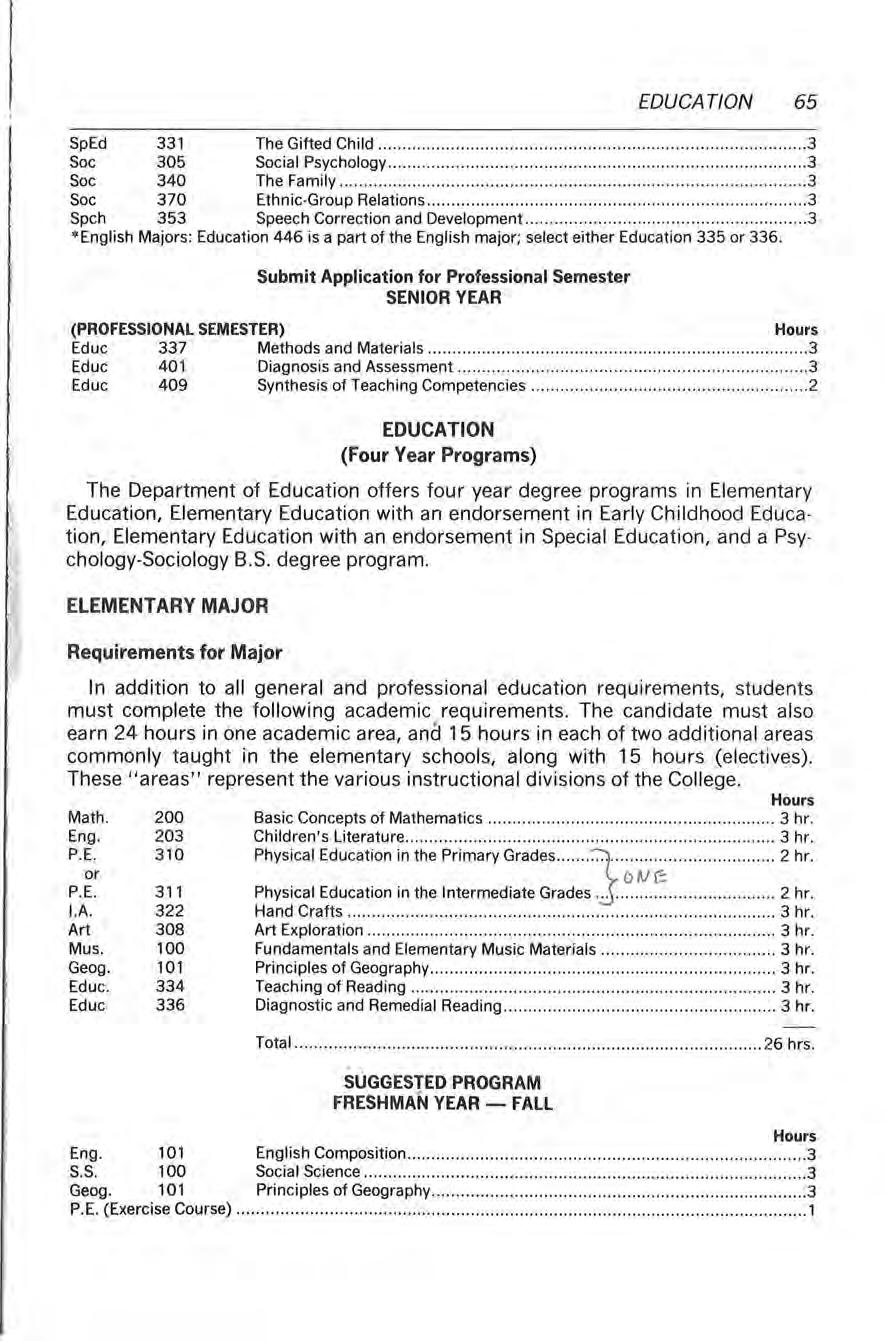
EDUCATION 65 SpEd 331 The Gifted Child 3 Soc 305 Socia l Psychology 3 Soc 340 The Family 3 Soc 370 Ethnic-Group Relations 3 Speh 353 Speech Correction and Development.. 3 *English Majors : Education 446 is a part of the English major; select either Education 335 or 336. Submit Application for Professional Semester SENIOR YEAR (PROFESSIONAL SEMESTER) Hours Educ 337 Methods and Materials 3 Educ 401 Diagnosis and Assessment 3 Educ 409 Synthesis of Teaching Competencies 2 EDUCATION
Math 200 Eng . 203 P.E. 310 or P.E. 311 I.A 322 Art 308 Mus. 100 Geog 101 Educ 334 Educ 336 Hours Basic Concepts of Mathematics 3 hr Children's Literature 3 hr. Physical Education in the Primary Grades 7...0.wr:: ······················2 hr Physical Education in the Intermediate Grades .J ..... ..... ....... ....... ....... .2 hr Hand Crafts 3 hr. Art Exp loration 3 hr Fundamentals and Elementary Music Materials ... .. ....................... ........ 3 hr . Principles of Geography . 3 hr. Teaching of Reading 3 hr Diagnostic and Remedial Reading 3 hr Total 26 hrs SUGGESTED PROGRAM FRE.SHMAN YEAR - FALL Hours Eng. 101 English Composition 3 S S. 100 Social Science 3 Geog 101 Principles of Geography 3 P E. (Exercise Course) 1
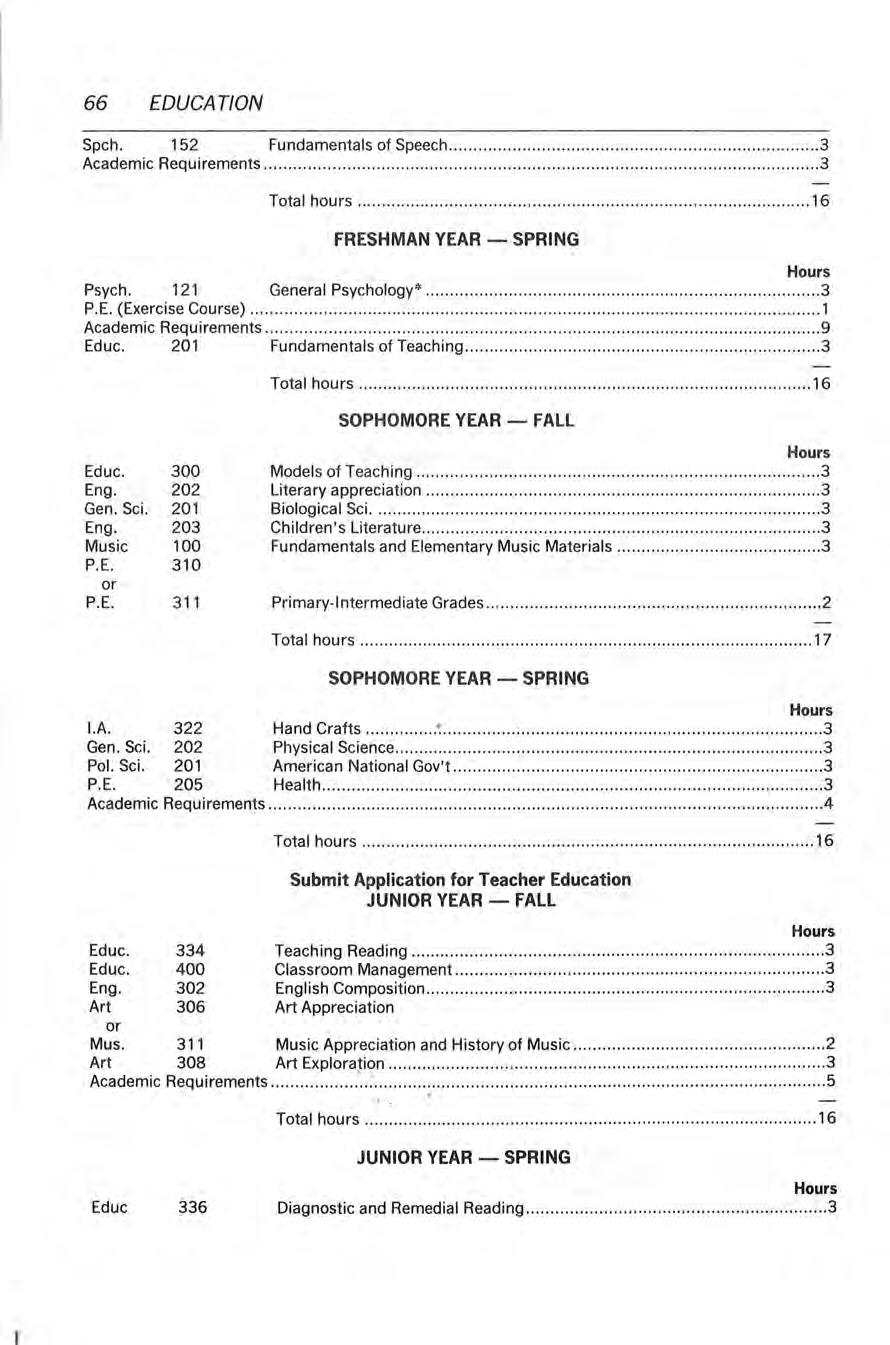
r 66 £DUCA TION Speh 152 Fundamentals of Speech .3 Academ ic Requirements .... ....... .... .... .. ........ .. ................. ... .. ........ ... ....... .. ..... ..... ........... .. .. ... ...... ...... .3 Total hours 16 FRESHMAN YEAR - SPRING Hours Psych. 121 General Psychology '' 3 P E (Exercise Course) . 1 Academic Requirements 9 Educ 201 Fundamentals of Teach in g 3 Tota l hours 16 SOPHOMORE YEAR - FALL Hour s Educ 300 Models of Teaching 3 Eng. 202 Literary appreciation 3 Gen Sci. 201 Biological Sci 3 Eng 203 Children's Literature 3 Music 100 Fundamentals and Elementary Music Materials 3 P.E 310 or P E. 311 Primary Intermediate Grades 2 Total hours 17 SOPHOMORE YEAR - SPRING Hours I.A. 322 Hand Crafts .3 Gen Sci. 202 Physical Science 3 Pol. Sci. 201 American National Gov't 3 P.E 205 Health 3 Academic Requirements .4 Educ. Educ. Eng Art or 334 400 3 02 3 06 Total hours 16 Submit Application for Teacher Education JUNIOR YEAR - FALL Hours Teaching Reading 3 Classroom Management 3 Eng lish Composition 3 Art Appreciation Mus 311 Music Appreciation and Hi story of Music .2 Art 308 Art Explora t ion 3 Academic Requirements : ~ · ···5 Total hour s 16 JUNIOR YEAR - SPRING Hours Educ 336 Diagnostic and Remedial Reading 3
ELEMENTARY MAJOR WITH AN ENDORSEMENT IN EARLY CHILDHOOD EDUCATION
Requirements for Major
The curriculum leading directly to a Bachelor of Science in Education degree for elementary majors with an endorsement in early childhood education is designed for those who wish to prepare for teaching in day care, preschool or kindergarten programs. The Curriculum follows the program for elementary teachers (which meets the academic requirements for elementary teaching certification) and requires the following sequence of courses which may be used in lieu of the 24 hour block ordinarily required in elementary education.
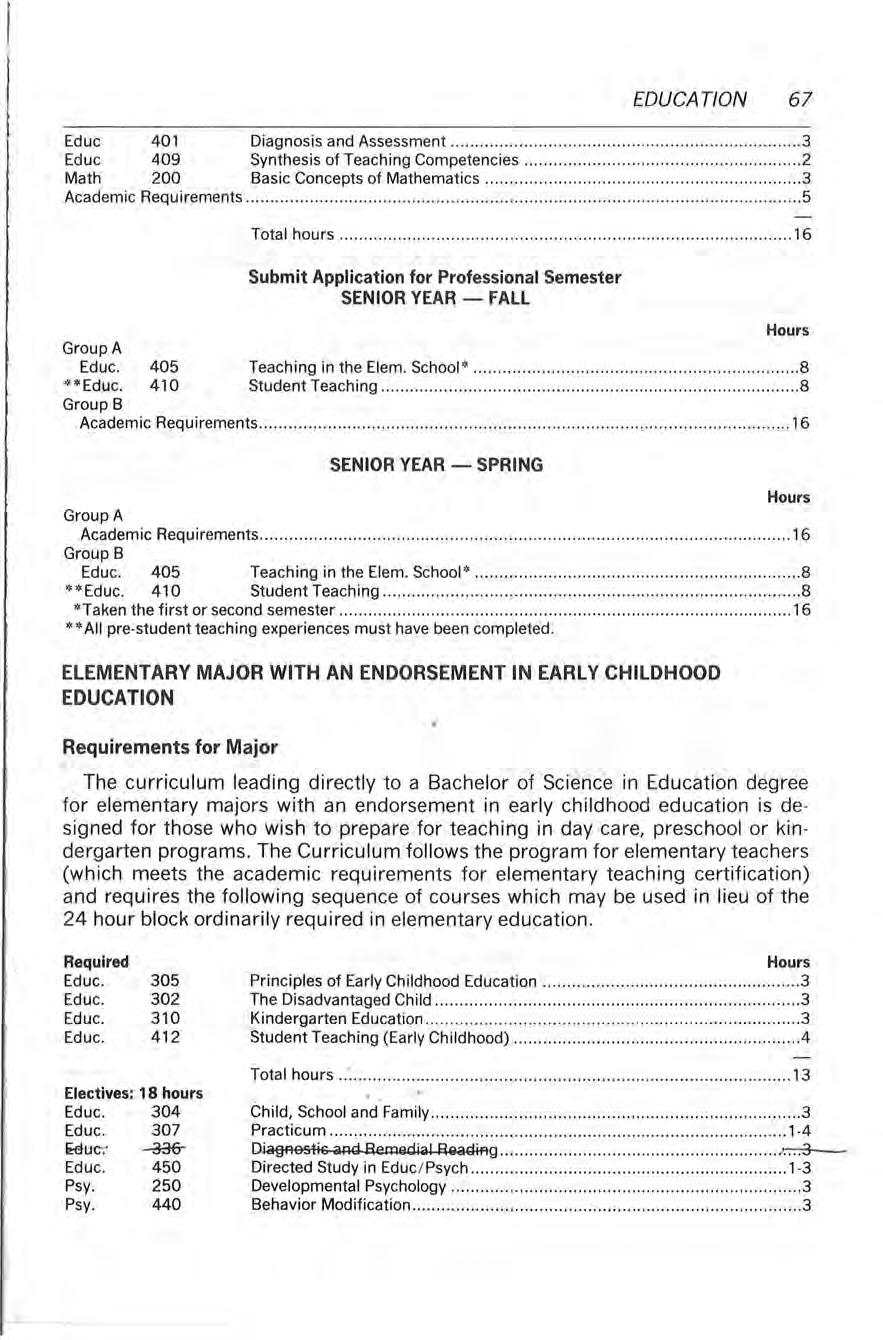
£DUCA TION 67 Educ 40 1 Diagnosis and Assessment 3 Educ 409 Synthesis of Teaching Comp etencies 2 Math 200 Basic Concepts of Mathematics 3 Academi c Requirements 5 Group A Educ. 405 ** Educ 410 Group B Total hours 16 Submit Application for Professio nal Se mester SENIOR YEAR - FALL Hours Teaching in the Elem School * 8 Student Teaching 8 Academic Requirem e nts 16 SENIOR YEAR - SPRING Hour s Group A Academic Requirements 16 Group B Educ. 405 Teaching in the Elem. Sc hool * 8 **Educ. 410 StudentTeaching 8 * Taken the first or second semester .................. .. . . . .. ... .. .... ... . .. ... . ...... ... . ... ......... . . . . . . .. .. .. ... .. .. ...... . . 16 ** All pre -student teaching experiences must have been completed.
Required Hours Educ. 305 Principles of Early Childhood Education ... ........ ....... ..... .... . . . ... ... .. ... .......... .. 3 Educ. 302 The Disadvantaged Child 3 Educ. 310 Kindergarten Education 3 Educ. 412 Student Teaching (Early Childhood) .4 Total hours ~ : : 13 Electives: 18 hours Educ. 304 Child, School and Family 3 Educ. 307 Practicum ... ... .. .. ... ... .. ........ ......... .. .... ..... ... . . ...... . ..... .. .. ....... ..... .. . .. ...... . . .. 1.4 l!ttuc-:- -3:36- Dia§A0S~i6 iiAd ReA111dial Riiidiflg ;r.:-:-:-3:'.'l-Educ 450 Directed Study in Edu c / Psych 1.3 Psy 250 Developmental Psychology 3 Psy. 440 Behavior Modification 3
ELEMENTARY MAJOR WITH AN ENDORSEMENT IN SPECIAL EDUCATION
Requirements for Major
The curriculum leading to a Bachelor of Science in Education degree for elementary education majors with an endorsement in special education is designed for those who (1) wish to prepare for teaching the educable or trainable mentally handicapped; and, (2) wish to prepare as a resource and itinerant teacher The Curriculum follows the program for elementary teachers (which meets the academic requirements for elementary teaching certification) and requires the following sequence of courses which may be used in lieu of the 24 hour -block ordinarily required in elementary education.

Requirements:
a. Have a bachelor's degree
b. Have had one year of teaching experience .
c. Have a current teaching certificate in some area of Special Education or related area.
Transcripts will be evaluated to determine if students have had courses in the following areas :
68 EDUCATION Soc. 340 The Family 3 P E 415 Development of Basic Learning Abilities 3 HEc 133 Food Preparat ion and Nutrition 3 HEc 134 Meal Management 3 HEc 232 Housing 3
Spec Ed 200 Spec. Ed . 240 Spec Ed 260 Hours Introduction to Special Education - Elementary 3 Introduction to EMH MR ............................................................................3 The Socially, Emotionally Maladjusted Student. .3 Speh 353 Speech Correction & Development 3 Spec. Ed 331 The Gifted Child 3 Spec. Ed . 350 Diagnosis and Remediation .... .... .. .... .... .. ............ ....... ...... .... ..... ... .. .... .. ......3 P. E. 415 The Development of Basic Learning Abilities ..... ...... ...... ...... .... ... ..... ...... .... .. 3 Spec. Ed. 420 Special Learning Disabilities 3 Spec. Ed . 423 Methods & Materials in Special Education .... ... ... .. .. ........... .......... ... ... ... ...... .3 :, p~;~~,i'-~~of lnstruction i~j Sf otal hours ··~-} -:- 34 SPECIAL EDUCATION RESOURCE ROOM TEACHER ENDORSEMENT
SpEd SpEd SpEd SpEd SpEd SpEd 200 240 260 331 350 420 Hours Introduction to Special Education 3 Introduction to EMH / MR .3 The Socially, Emotionally Maladjusted Student 3 The Gifted Child .3 Diagnosis and Remediation .3 Special Learning Disab ilities 3
' EDlfCATION (Two Year Program)
The Department of Education offers an Associate of Arts degree program in Early Childhood Education The curriculum is designed to prepare paraprofessional
for positions in early
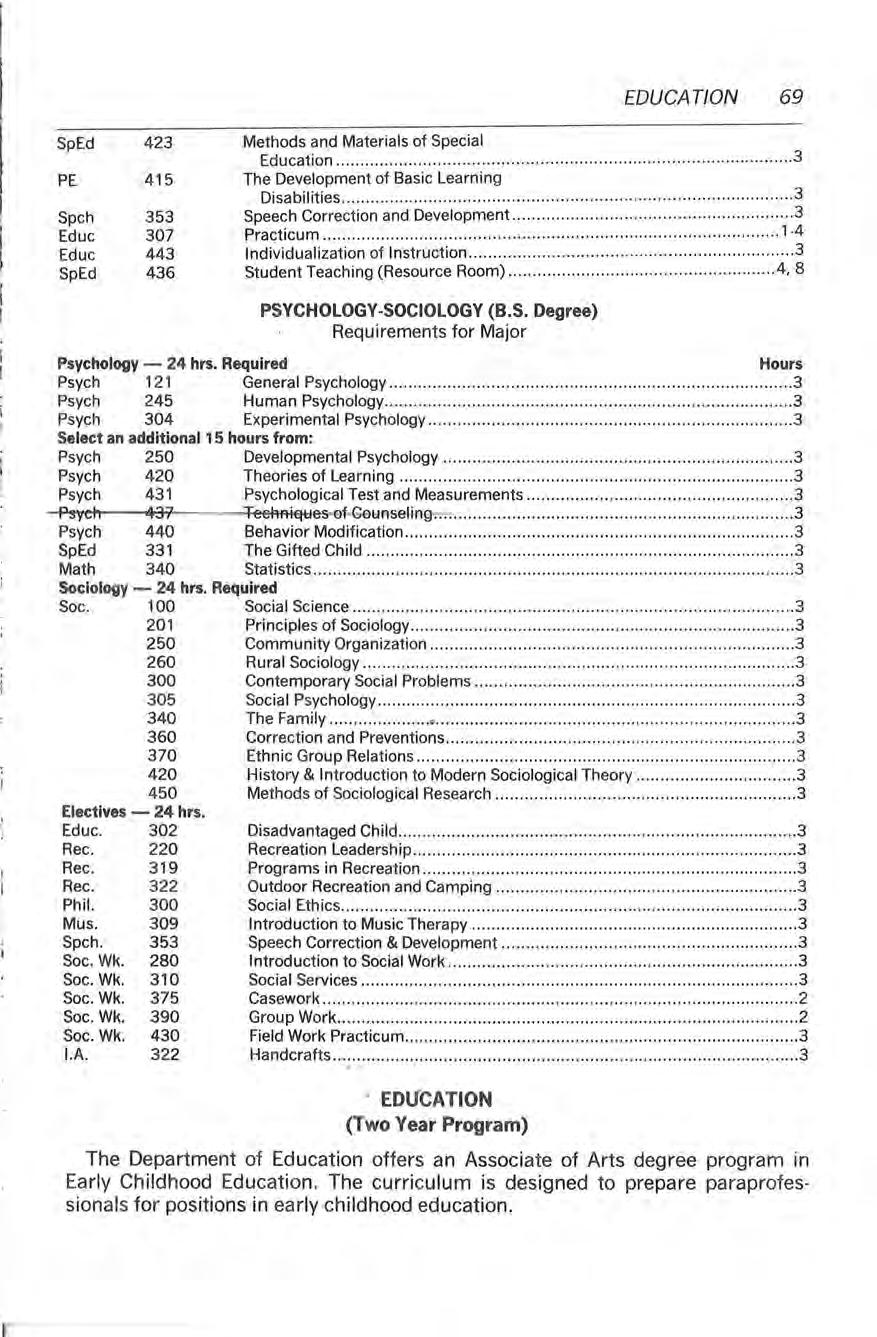
SpEd 423 PE 415 Speh 353 Educ 307 Educ 443 SpEd 436 EDUCATION 69 Methods and Mater ials of Spec ial Education •·· 3 The Development of Basic Learning Disabil ities : 3 Speech Corre ct ion and Development.. 3 Practicum 1-4 Individual ization of I nstruction 3 Student Teaching (Resource Room) 4, 8 PSYCHOLOGY-SOCIOLOGY (B.S. Degree) Requirements for Major Psychology - 24 hrs. Required Hours Psych 121 General Psychology 3 Psych 245 Human Psychology 3 Psych 304 Experimental Psychology 3 Select an additiona l 15 hours from: Psych 250 Developmental Psychology 3 Psych 420 Theories of Learning 3 Psych 431 Psychological Test and Measurements 3 Psyel, 437 Teel'lAiE11:Jes-0f-G0uRselin 3 Psych 440 Behavior Modification 3 SpEd 331 The Gifted Child 3 Math 340 Statistics 3 Sociology - 24 hrs. Required Soc 100 Social Science 3 201 Pr inciples of Sociology 3 250 Community Organization 3 260 Rura l Sociology 3 300 Contemporary Social Problems 3 305 Social Psycho logy 3 340 The Family 3 360 Correction and Preventions 3 37 0 Ethnic Group Relations 3 420 History & Introduction to Modern Socio logica l Theory 3 450 Methods of Sociologica l Research 3 Electives - 24 hrs . Educ. 302 Rec. 220 Rec. 319 Rec. 322 Phil. 300 Mus. 309 Speh . 353 Soc. Wk. 280 Soc. Wk . 310 Soc. Wk. 375 Soc Wk 390 Soc. Wk. 430 I.A. 32 2 Disadvantaged Child .3 Recreation Leadership 3 Programs in Recreation 3 Outdoor Recreation and Camping 3 Social Ethics 3 Introduction to Music Therapy ............... ............ .... . ....... .. .................. .. .. .... 3 Speech Correct ion & Development 3 Introduct ion to Soc ial Work 3 Social Se rvices . . ..... ........... . .... . ............... ... .......... . . . . ... ...... .. ........ ..... .. ... ... . .3 Casework 2 Group Work 2 Field Work Practicum .3 Ha ndcrafts _ ,. 3
s
childhood education.
£DUCA TION
All courses carry full credit toward the Bachelor of Science degree and may be applied to a regular four -year program . Students are encouraged to ultim at ely pur sue the baccalaureate degr ee.
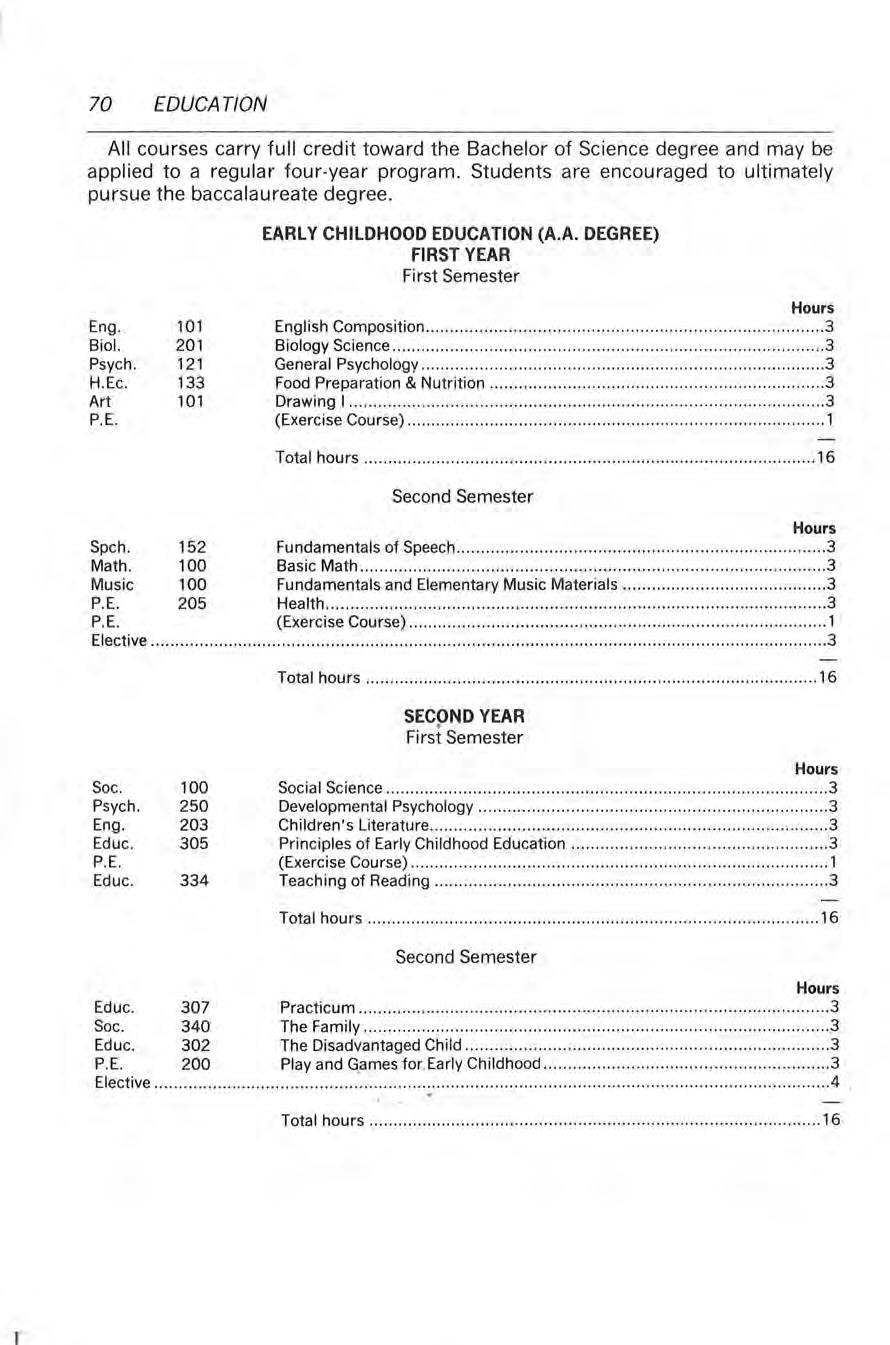
70
Eng. Biol. Psych H . Ec . Art P E 101 2 01 121 133 101 EARLY CHI LDHOOD EDU CAT ION (A.A. DEGR EE ) FIR ST YEAR First Semester Hou rs Engli sh Composition .3 Biology Scienc e .. ... ....... .... ........ ......... ....... .. .... .. ... .. ..... .. . .... .. .... .. ........ .. .. . ... 3 General Psychology 3 Food Prep a ration & Nutrition . .. .... . .... ... .. .... .... . .. . .... .. .. .. .... .... . ... ..... .. . .. .... . .. .3 Drawing 1 3 (E xerci se Cour se) 1 Tot al hours 16 Second Semester Hours Speh. 15 2 Fundamenta ls of Spee ch .. .... .. .. .. .. .... .. .... ...... .. ... ... .... . . .. ........ . .... ...... .. ..... .... 3 Math 100 Basic Math 3 Music 100 Fundamentals and El ementary Music Materials ..... .... .... ...... ... .. .. .... .. .......... 3 P.E 205 Hea lth 3 P.E (E xe r c ise Cour se) 1 Elective . . .... . . . .. ... . .. .. ... . . . . ... . . . .. . . . .... .. . ... .. .. .. . ..... .... . . . ... . . .. .... . ... .. . . .. ... . . . ..... . .. . . ... . ... ........ ..... ... ... . ...... ... 3 Soc. 100 Psych. 2 50 Eng 203 Edu c 305 P.E. Edu c 334 Total hou rs 16 SECp ND YEAR First Semester Hour s Soc ia l Sc ien ce .3 Developm e ntal Psyc hol ogy 3 Children' s Literature 3 Prin c iple s of Ea rly Childhoo d Edu c ation 3 (E xe r cise Co ur se) .... .. ...... ... .......... ....... . .. .. .... . .... . .. ...... .. ....... .. ... .. .. . .. .......... 1 Tea c hing of Re ading 3 Total hour s ....... . ...... . ...... .... ... .. ...... .. ... . ... .. .. ... .. .. . ... . ... .. . . . . . . . .. .. .. . .. .... ... .. .. 16 Second Semester Hours Educ 307 Pra cticum 3 Soc 340 The Family 3 Educ. 30 2 The Disadvantaged Child 3 P.E. 200 Play and G.ames for . Early Childhood .... ... ..... ... .. .. . .. .. .... .. .. .... .. ... .. .. .... .. .. . ..... 3 Elective .' .4 . Total hours 16
Curricula Outlines
Division of Humanities
MR. JOHN BARRETT, CHAIRMAN
The Division of Humanities offers programs in Engl ish , Geography, History, Journalism , Mass Communications, Socia l Science, Social Work, and Spee ch and Drama. Each discipline is structured and designed to provide background for a variety of professional careers. All programs offer the students the opportunity for enrichment and breadth of understanding .
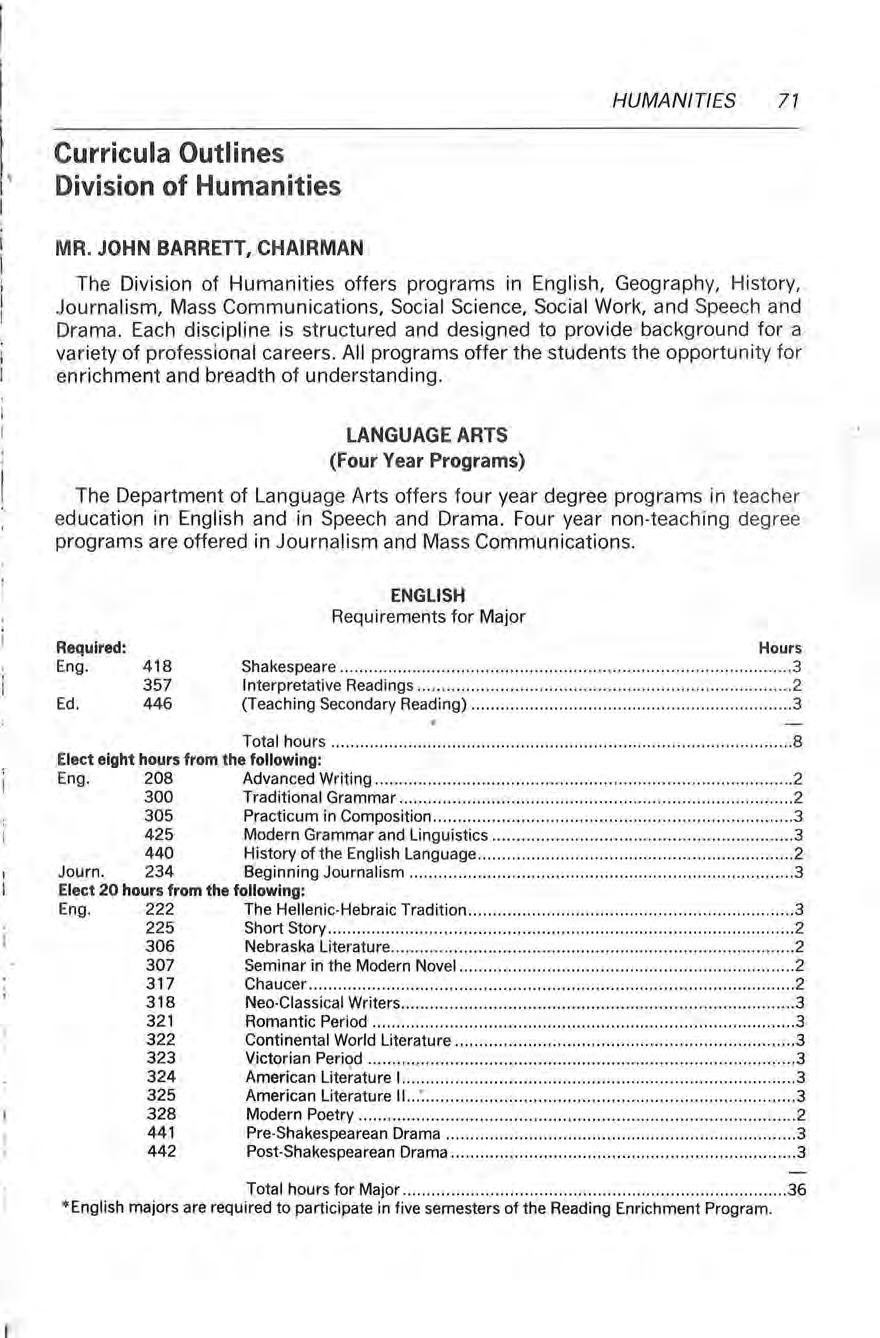
LANGUAGE ARTS
(Four Year Programs)
The Department of Language Arts offer s four year degree programs in t eac her education in English and in Speec h and Drama . Four year non -teaching degree programs are offered in Journalism and Mass Communications.
HUMANITIES 7 1
Required: ENG LISH Requirements for Major Hours Eng. 418 Shakespeare 3 357 Interpretat ive Readings 2 Ed 446 (Teaching Secondary Reading) 3 Total hours 8 Elect eight hours from the following: Eng. 208 Advanced Writing 2 300 Traditional Grammar 2 305 Practicum in Composition 3 425 Modern Grammar and Linguistics 3 440 Hi story of the Eng lish Language 2 Journ. 234 Beginning Journalism 3 Elec t 20 hours from the following: Eng 222 The Hellenic -Hebraic Tradition 3 225 Short Story 2 306 Nebraska Literature 2 307 Seminar in the Modern Novel 2 317 Chaucer 2 318 Neo-Classical Writers 3 321 Romantic Period 3 322 Continental World Literature 3 323 Victorian Periqd , 3 324 American Literature 1.......... .................. ............................... ........ .. ... .. .. .... .3 325 American Literatu r.e 11 3 328 Modern Poetry 2 441 Pre -Shakespearean Drama 3 442 Post.Shakespearean Drama 3 Total hours for Major 36 *E nglish majors are required to participate in five semesters of the Reading Enrichment Program

72 HUMANITIES Required SPEECH AND DRAMA Requirements for Major Hours Speh. 152 Fundamentals of Speech 3 254 353 357 Public Speaking 3 Speech Correction and Development.. 3 Interpretative Reading 2 Total hours ... .................. .............. ...... ...... .... .. .. ..... .. .......... ...... ........... ..... 11 Elect Six Hours from the Following: M C. 230 Intro to Dramatic Arts & Crafts 3 260 Radio and TV Announcing 3 363 Television Production 3 Speh. 327 Light & Sound Design Stage & T.V ....................................... .... .... . .. ... .... . .... 3 350 Contest Speech 1 404 Projects in Communications 1·3 Select 18 hours from the following: Speh. 256 Acting 1 3 Required 257 Acting 11 3 300 Summer Theatre Workshop 3 6 355 Play Production in the Sec. Schools 3 360 Scenery and Costume Design 3 363 Directing 1 3 364 Directing 11 3 369 Children's Theatre and Creative Dramatics 3 400 Theatre History 3 418 Skakespeare 3 441 Pre-Shakespearean Drama .' 3 442 Post-Shakespearean Drama 3 Total hours for Major 35 JOURNALISM (B.S. Degree) Requirements for Major Hours Journ. 234 Beginning Journalism 3 Journ. 235 Newspaper Editing 4 Journ. 435 Advanced Journalism ............. . ...... ... ......... ..... ... . ........ . . ..... ....... .. ........ . ..... .3 M.C. 300 Communications Law 3 Total hours .' 13 Elect 24 hours from the following: Art 111 Lettering .. ... :.... .. .. .............. .. .......... .... ..................... ...... .. .......................... 3 Eng. 208 Advanced Writing 2-3 Journ 226 Photography I 2-3 Journ. 237 Graphic Arts 3 M.C. 260 Radio and Television Announcing 3 Eng . 300 Traditional Grammar .......... ......... .... ...... .. ...... ......... ....... . . .................. ........ 2 Journ 325 Photography II 2 -3 Journ. 329 Advertising 2 Journ. 400 Internship in Journalism .... .......... ........ .. ................................................. 2-4 Journ 425 Advanced News Photography 2 Total hours for Major ............... .. : .... ....... .. ..... ...... ........ .... .................. ....... 37
SOC IAL
SCIENCES
(Four Year Program)

Required MASS COMMUNICATIONS (B.S. Degree) Requirements for Major HUMANITIES 73 Hours Journ. 234 Beginning Journalism 3 M C 100 Introduction to Mass Communication ........ ........ .. .. .... .... ...... ..... . ...... .. ......... 2 M.C. 300 Communications Law 3 Speh. 254 M C. 260 Public Speaking 3 Radio and Television Announcing . ...... ................ ........ ..... ....... ... ........ .. ...... 3 Total hours Required 14 Written Communications Select 6 hours from the following : Bus 329 Advertising 2 Journ. 235 News Editing 2 Eng. ?08 Advanced Composition 2 Journ. 435 Advanced Journalism 3 Visual Communications Select 22 hours from the following: Art 101 Drawing I 3 102 Drawing 11 3 111 Lettering 3 203 Design I 3 204 Design 11 .......................... .... . .. ............. ....... ......... .. .......... .... .. .. ..... .. .......... 3 210 Watercolor Painting 3 311 Painting 1 3 312 Painting 11 3 I.A. 226 Photography I 3 237 Graphic Arts 3 325 Photography II 3 M.C. 230 Introduction to Dramatic f- rts and Craft.. 3 275 Film Criticism 3 363 Television Production 3 Speh. 327 Light & Sound Design for Stage & T.V 3 404 Projects in Communication s .. ..... ........ ... .. .. .. . .. .... .. ........ ........ ............... ... 1 3 Verbal Communication Select 8-9 hours from the following: Speh. 152 Fundamentals of Speech ........ ..... ...... ... ... .. ......... .. ... ..... .. . .......... .... ... .. ........ 3 256 Acting 1 3 257 Actingll 3 357 Interpretative Reading ... ................................................. .. ........ .. ... ... ... ...... 3 Total hours for Major ............... .. ... ... ... . ...... ........ . .. . . .. ... ...... ....... .......... 50·51 Majors required to work 4 semesters in radio stations Majors required to work 4 semesters in publications • Recommended Cour ses : IA 233 Electrical Technology 1 3 IA 328 Electrica l Technology 11 3
The Socia l Science department offers four year degree programs in teacher education in Hi story, History -Geography, and Social Sc iences. Four yea r nonteaching degree programs are offered in Geography and Social Work.
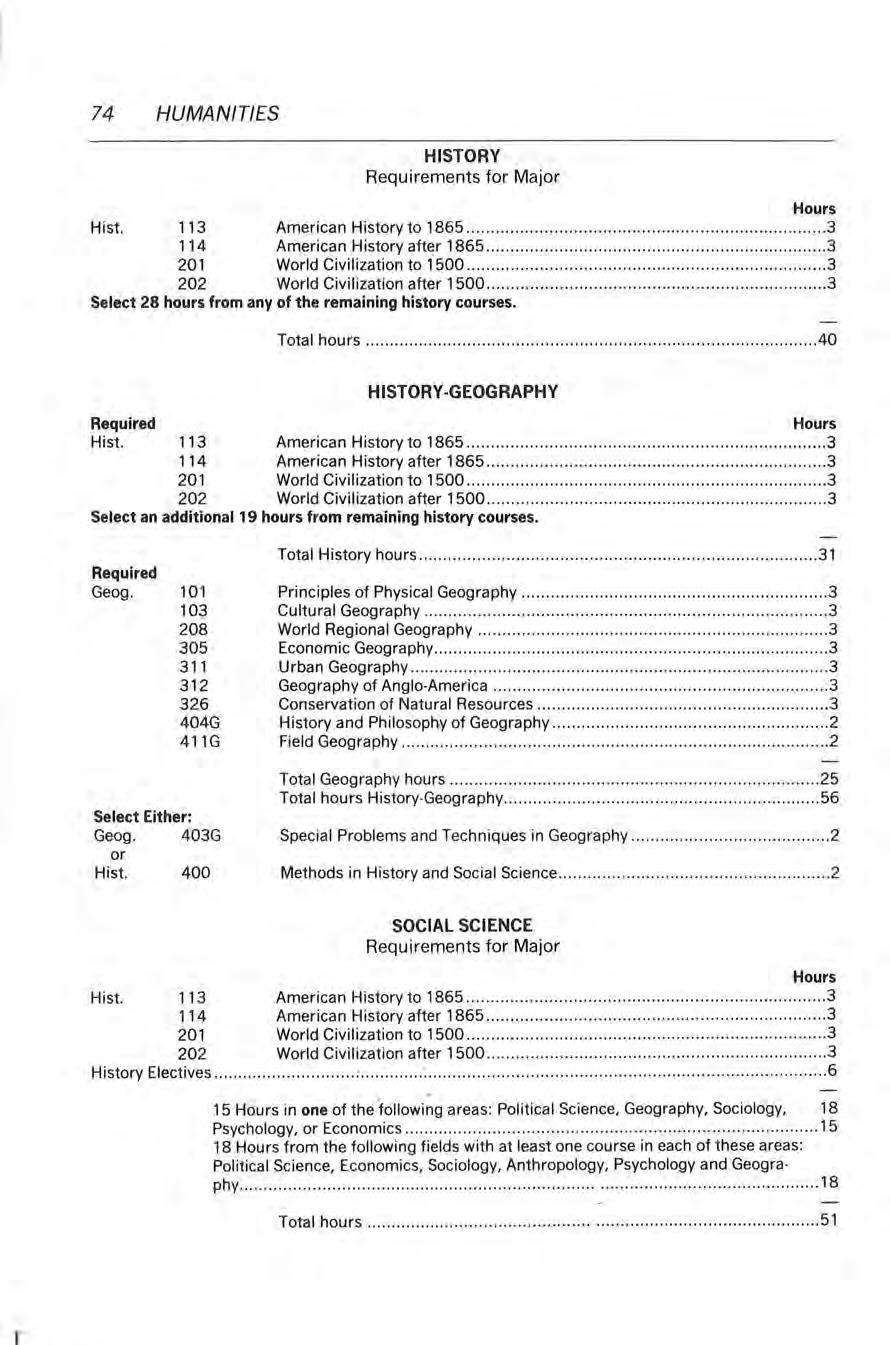
r 74
HISTORY Requirements for Major Hours Hist. 11"3 American History to 1865 3 114 American History after 1865 3 201 World Civilization to 1500 3 202 World Civilization after 1500 3 Select 28 hours from any of the remaining history courses. Total hours 40 HISTORY-GEOGRAPHY Required Hours Hist. 113 American Hi sto ry to 1865 3 114 American History after 1865 3 201 World Civilization to 1500 3 202 World Civilization after 1500 ...... .. .... ......... .... .... ............. .. ...... .. ... ... ... ........ .3 Select an additional 19 hours from remaining history courses. Required Geog. 101 103 208 305 311 312 326 404G 411G Total History hours 31 Principles of Physical Geography 3 Cultural Geography 3 World Regional Geography 3 Economic Geo graphy 3 Urban Geography 3 Geography of Anglo -Am erica 3 Con se rvation of Natural Resources 3 History and Philosoph.y of Geography 2 Field Geography 2 Total Geography hours 25 Total hours Histo ry-Geog raphy ............................ .... ..... ......... ... ..... ........ ... 56 Select Either: Geog 403G Spe c ial Problem s and Techniques in Geography 2 or Hist. 400 Methods in History and Social Science 2 SOCIAL SCIENCE Requirements for Major Hours Hi st. 113 American History to 1865 3 114 American History after 1865 3 201 World Civilization to 1500 3 20 2 World Civilization after 1500 .. .... .. .... ........ ..... ..... .... ...... ............. .. ....... ........ 3 History Electives ........... .. .. ..... ..... .... :... ..·........·...................... .. .............. ...... .. .. ......... .. .................. ... .. .6 15 Hours in one of the 'f ollowi ~g areas: Political Science, Geography, Sociology, 18 Psychology, or Economics ......... .... ......... ....... ........... .. ... ..... ....... ..... . ........ .... ... ... ... . 15 18 Hour s from the following fields with at least on e course in eac h of these areas: Political Science, Eco nomi cs, Sociology, Anthropology, Psychology and Geogra• phy 18 Total hours ................ .. .......... ... .. ... ... ...... . ..... .... .. .. ............ .. .... .... ... .... ... .51
HUMANITIES
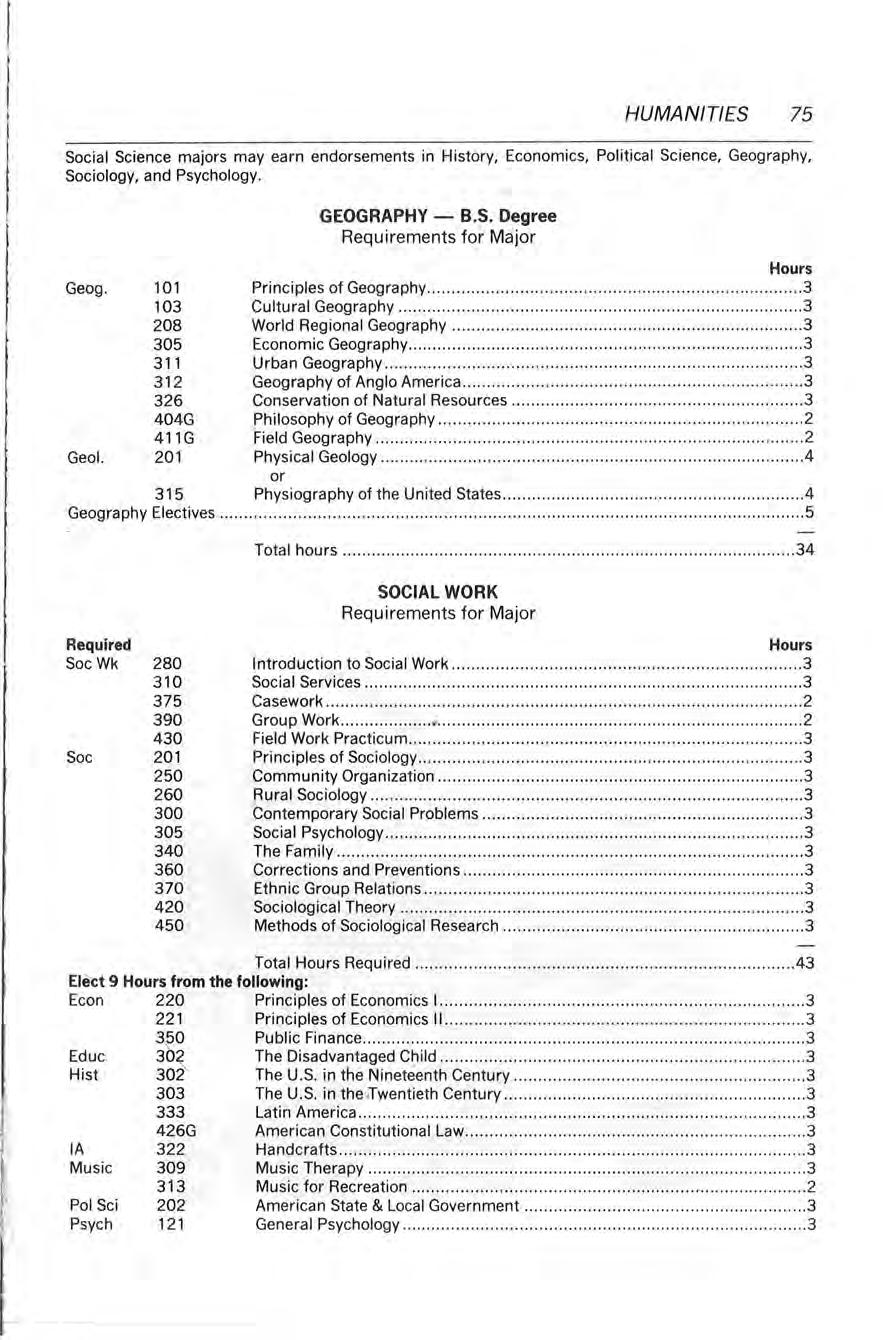
HUMANITIES 75 Social Science majors may earn endorsements in Hi story, Economi cs, Political Science, Geography, Sociology, and Psychology Geog . Geol. 101 103 208 305 311 312 326 404G 411G 201 GEOGRAPHY - B.S. Degree Requirements for Major Hour s Principles of Geography 3 Cultural Geography 3 World Regional Geography 3 Economic Geography 3 Urban Geography 3 Geography of Anglo America 3 Conservation of Natural Resources 3 Philosophy of Geography 2 Field Geography 2 Physical Geology .............. ...... .. .... ... ... ......... .. ..... .... ...... ......... . ................... 4 or 315 Physiography of the United States ............................ ....... ..... ............. ........ .4 Geography Electives ................ ............... ........... .... .... .. .. ........ .. ... ........... ... .. ..... . .. ....... ... .... ....... ........ 5 Required Soc Wk 280 310 375 390 430 Soc 201 250 260 300 305 340 360 370 420 450 Total hours ......... ......... .. .. .... .. .. ...... ......................................................... 34 SOCIAL WORK Requirements for Major Hours Introduction to Social Work 3 Social Services ...... ... .. ... .......... ..... . ......... .. .. .. .. ...... ..... ............. .. .. ...... .... ..... 3 Casework 2 Group Work .......... ...... ... .. ....... .... ...... ..... .. .... ...... .... .. ......... .... . .. .... .. ........... 2 Field Work Practicum 3 Principles of Sociology 3 Community Organization 3 Rural Sociology 3 Contemporary Social Problems 3 Social Psychology 3 The Family 3 Corrections and Preventions 3 Ethnic Group Relations 3 Sociological Theory 3 Methods of Sociological Research 3 Total Hours Required .43 Elect 9 Hours from the following: Econ 220 Principles of Economics 1 3 221 Principles of Economics 11 3 3.?0 Public Finance 3 The Disadvantaged Chi ld 3 The U S in the Ninetee nth Century 3 Educ 30 i Hist 302 303 The U S in the ,Twentieth Century 3 333 Latin America 3 426G American Constitutional Law ... .... ... .. ... .... .. .. .. ....... . ........ .. ..... ... ........... .... .... 3 IA 322 Handcrafts 3 Music 309 Music Therapy 3 313 Music for Recreation ................. .... ......... .. .. . .. .. ..... .... ... .. ... .. ,. . .. . ................. 2 Pol Sci 202 American State & Local Government 3 Psyc h 121 Genera l Psychology 3
PRE-PROFESSIONAL CURRICULA

Pre-Law
Prospective law students are urged to take a Bachelor's degree prior to beginning their legal studies. Application to the law school of th e stude nt' s choice should be made early in the fourth year of the pre -legal study.
Most students interested in law may choose much of their course work from those fields in which he has the most interest.
Some work in English composit ion is important sinc e the ability to use the Engli sh language effectively is highly recommended for law students. Pre -law st udents are assigned an advisor who works closely with them in programming the four years of study.
76 HUMANITIES Rec Soc Speh 245 250 304 437 319 322 470 353 Human Psychology 3 Developmental Psychology .3 Experimental Psychology 3 Techniques of Counseling 3 Programs in Recreation 3 Outdoor Recreation and Camping 3 In dependent Study in Sociology 1-3 Speech Correct ion and Development 3
Curricula Outlines Division of Natural Sciences
DR. DAVID PIPPERT, CHAIRMAN
The Division of Natural Sc ienc e off ers programs in Biologica l Science, General Science, Mathematics, and Physical Science. The programs are designed to provide an adequate background for teaching at the secondar y leve l, prov ide a background for graduate stud y, and provide for individu al enrichm ent. A wide variety of preprofessional programs are offered for students needing pre limi nary in struction prior to entry in a professional schoo l.
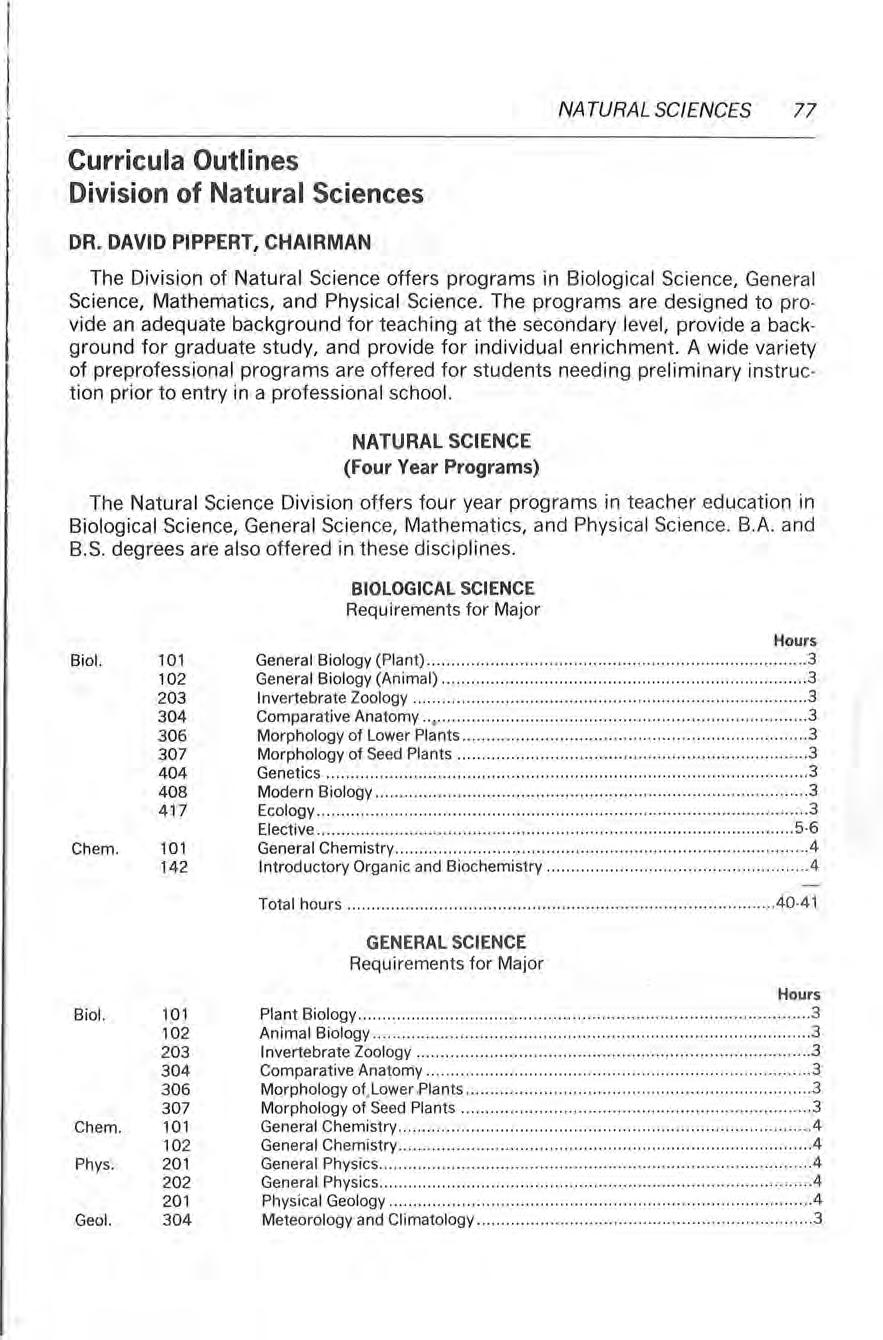
NATURAL SCIENCE
(Four Year Programs)
The Natural Science Division offers four year programs in teacher educat ion in Biolog ical Sc ience, Genera l Sc ience, Mathematics, and Physical Sc ience. B.A. and B.S. degrees are also offered in these d isc ip lin es .
NATURAL SC I ENCES 77
Biol. Chem. Bio l. Chem. Phys. 101 102 203 304 306 307 404 408 417 101 142 101 102 203 304 306 307 101 102 201 202 201 304 BIOLOGICAL SCIENCE Requirements for Major Hours General Biology (P lant) 3 Genera l Biology (Animal) 3 In vertebrate Zoo logy 3 Comparative Anatomy .. . ...... ....... ....... .. ......... .. .. ... ...... ....... ............. ............ 3 Morphology of Lower Plants 3 Morphology of Seed Plants 3 Gen et ic s 3 Mod ern Bio logy 3 Ecology 3 Elective 5-6 General Chemistry .4 Introductory Organ ic and Biochemistry 4 Total hours 40·41 GENERAL SCIENCE Requirements for Major Hours Plant Biology 3 Anim al Biology 3 Invertebrate Zoo logy 3 Comparative Ari atoniy 3 Morphology of, Lower P lants 3 Morphology of Seed Pl ant s 3 General Chem i stry 4 Genera l Chemistry .4 General Physics .. . .. .. .... ....... ... .... ... ..... .. . ... ..... ... .. ...... ....... .... .. .......... ....... .... 4 General Physics 4 Physica l Geo logy 4 Meteoro logy and Clim ato logy ... ............ .... ....... ..... .. .......... ................. .... ..... 3
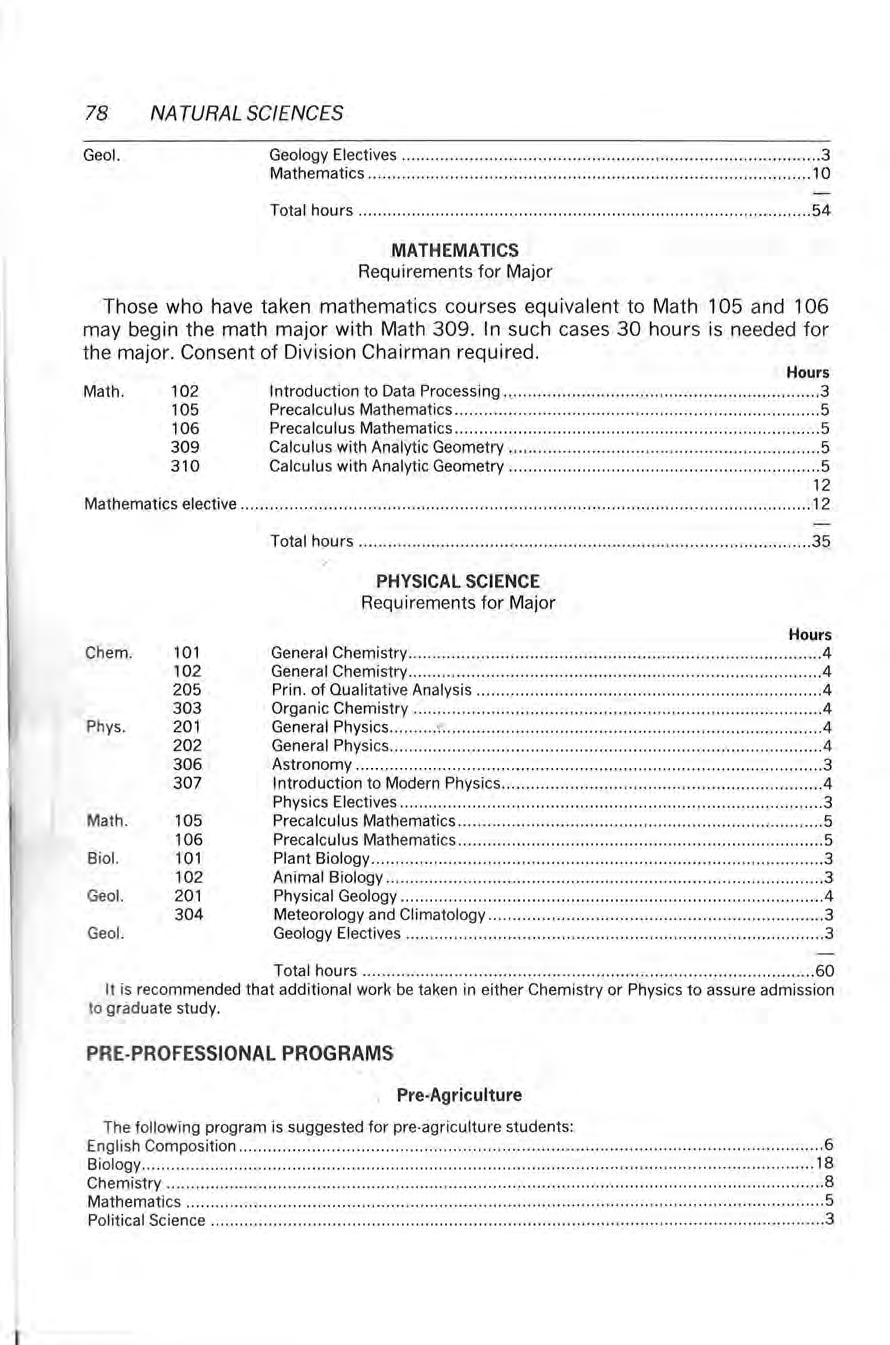
78 NATURAL SCI ENCES Geol og y Elec tiv es 3 Math em ati cs ... .... ... ..... .. .... ......... .. .............. ... ........ ....................... .. ......... 10 Tot al ho ur s 5 4 MATHEMAT ICS Requ ire ments fo r Major Thos e who have taken mathematic s cou rs es equivalent to Math 105 and 106 may begin the math major with Math 3 09. In su c h cases 30 hour s is need ed for the major . Consent of Division Ch airm an requir ed . Mat h 102 105 106 309 31 0 Hour s Introdu cti on to Data Process ing ........ .. ......... .. ............ .. ... ..... . .. .. ... .............. 3 Preca lculu s Math emat ics 5 Preca lc ulu s Math emati cs 5 Calculu s wi t h Analyti c Geom etry 5 Ca lc u l us with An alytic Geo m et ry . 5 12 Mat hem at ics el ec tive 12 Chem Phys. Math Biol. 101 102 2 0 5 303 2 01 2 0 2 306 3 07 10 5 106 101 102 2 01 304 Total hour s 3 5 PH YSICAL SC IENCE Requir ement s for Major Hour s Ge ner al Ch emi stry 4 Gener al Ch emi stry 4 Prin. of Qu alitativ e An alys is ...... ... .. .. ... .... .. .. ....... ... ....... .. .. ..... .. .................. .4 Org ani c Ch emi stry .. ......... ...... .... .... .... ...... .. . .. . .. ....... ...... .. .... . .. ....... ........... .4 General Phy sics 4 Gener al Phy sics ........... ..... ...... . .. .. .. .. ... ...... .. ....... . .. .. .. ... ............. ............. .... 4 Astronomy 3 Introdu ction t o Mod ern Phy sics .4 Phy sics El ec ti ves .3 Preca lculu s Mat hem ati cs 5 Preca lcul us Math emat ics 5 Plant Bi ology 3 Anim al Bio logy 3 Phy sica l Geo log y .4 Met eo rol og y and Cli mato logy 3 Geo log y El ect ives 3 Tot al hou rs 6 0 It is reco mm end ed that addi t ional work be ta ken in eith er Ch emi st ry or Phy sics to ass u re ad mi ss ion to graduate stud y PRE-PROFESSIONAL PROGRAMS , Pre •Agricu lture The following progra m i s suggest ed for p re-ag ri cu ltur e stud ents: English Compos it io n 6 Bio logy 18 Chem istry 8 Mat hemat ics .. ....... .... ... . .. .... .. ..... .... ...... ........................ ....... ....... .. ............ ....... .. .. .. .... .. ..... .. ....... .. .... 5 Poli t ica l Scie nce 3
Below is a suggested outline for both programs. The student is advi se d to se cure a catalog from the professional school he expects to attend, as individual sc hools vary in requirements for pr e- dental and pre
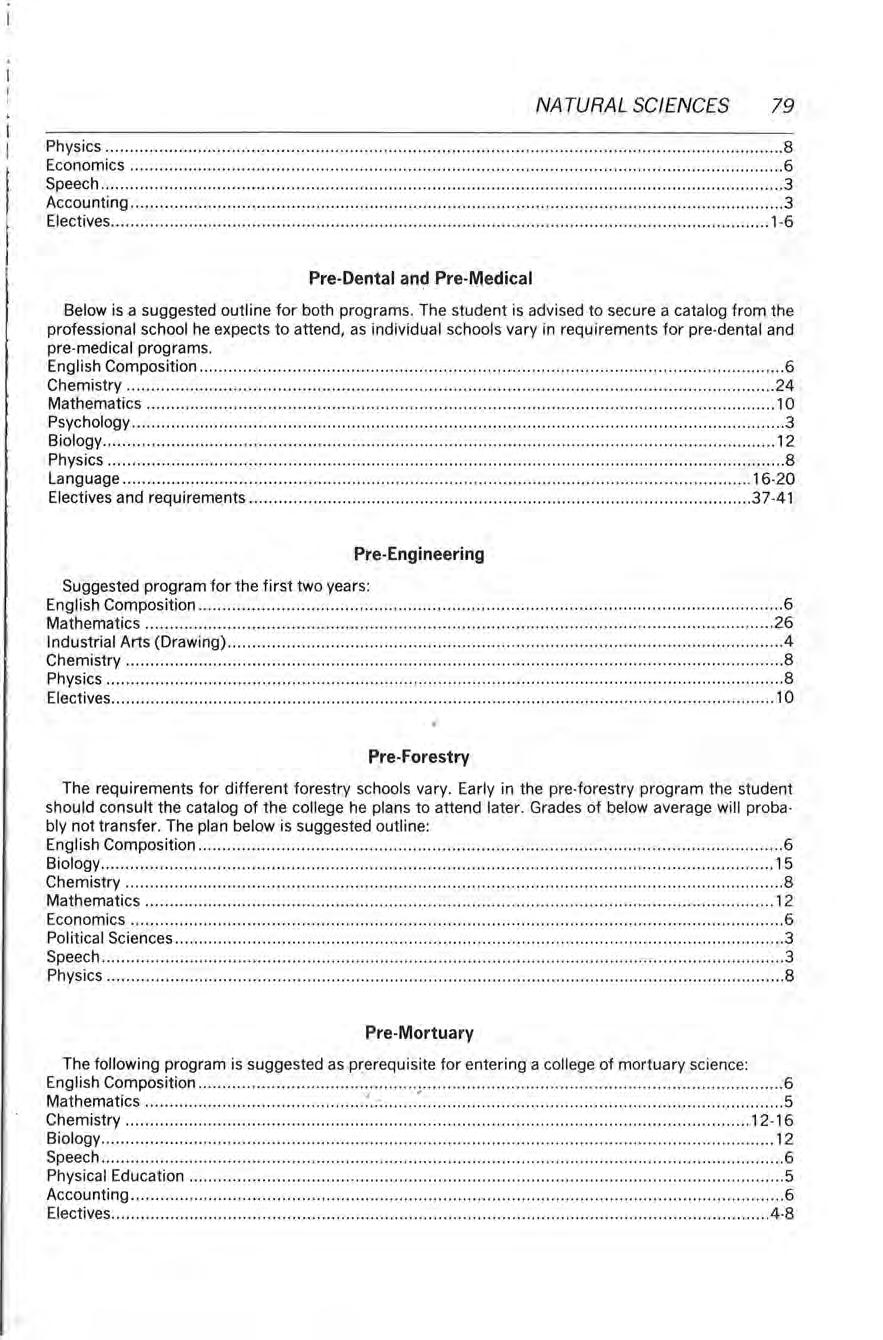
The requirements for different forestry schools vary Early in the pr e-forestry program th e student should consult the catalog of the college he plans to attend later. Grad es of below averag e will proba
The plan below is suggested
NA TURAL SCIENCES 79 Physics .. ... ..... ...... ..... ...... .. ....... ..... .... ....... ....... ..... ... .... ........ ... ... ..... ..... ....... ... ..... ...... ... ... ..... .... .... .. .. 8 Economics .. ... ........ .... .... ... ...... ..... .. .... .. ....... .. ..... ... ..... .... ....... ...... .. ...... ....... . ... ........ ... .. .. .... ...... ....... .6 Speech 3 Accounting 3 Electives 1-6 Pre-Dental and Pre-Medical
-medical program s English Composition 6 Chemistry 2 4 Mathematics 1O Psychology 3 Biology 12 Physics 8 Language 16-20 Electives and requirements ..... .... .. .. ....... ...... .. ...... ...... ... ... ..... .. .......... .. .. ............ .. ... ... .. .. .. ........ ..37-41 Pre-Engineering Suggested program for the first two years : English Composition 6 Mathematic s . 26 Industrial Arts (Drawing) .4 Chemistry 8 Physics 8 Electives 10 Pre-Forestry
bly not transfer
outline: English Composition 6 Biology .... ... ......... ... ..... .... ... .. .. ... .... ... ... .. .. .... ...... ....... . ....... ... .......... .. ... ... ..... ... ... ..... ..... .. ... .. ..... .... ... 15 Chemistry 8 Mathematic s . 12 Economics .. ............... ..... .... ... ........ ..... ... .... ... .... .. ....... ......... .... ...... ........ . .... .... .... .. ...... .. ...... ... ....... ... 6 Political Sciences 3 Speec h .3 Physics 8 Pre-Mortuary The following program is suggested as p~e requisite for
colleg e of mortuary sc ience : ~:~~!~;~~P·~~'.~'.~n. :::::: :::::: ::: ::::: ::::::::: ::::: ~::; :::::::~:::: :: :: ::: :::: :: :::: ::: :: ::::::::::: ::: ::: ::::::: ::: :::::: :::::::: :::: :: :~ Chemistry 12-16 Biology .... .... .. ... ......... ...... .... ........... ......... ....... ..... ....... .. ...... ... . .... ... .. ....... .... ...... .. ...... ....... .............. 12 Speech .6 Physical Educat ion 5 Accounting ................. ...... ... ..... ....... ... .... ... ..... ... .... ........... .. ..... ... .. ...... .. ...... ... ..... ....... .. .. ... .. .. ....... ....6 El ectives 4 -8
entering a
80 NATURAL SCIENCES
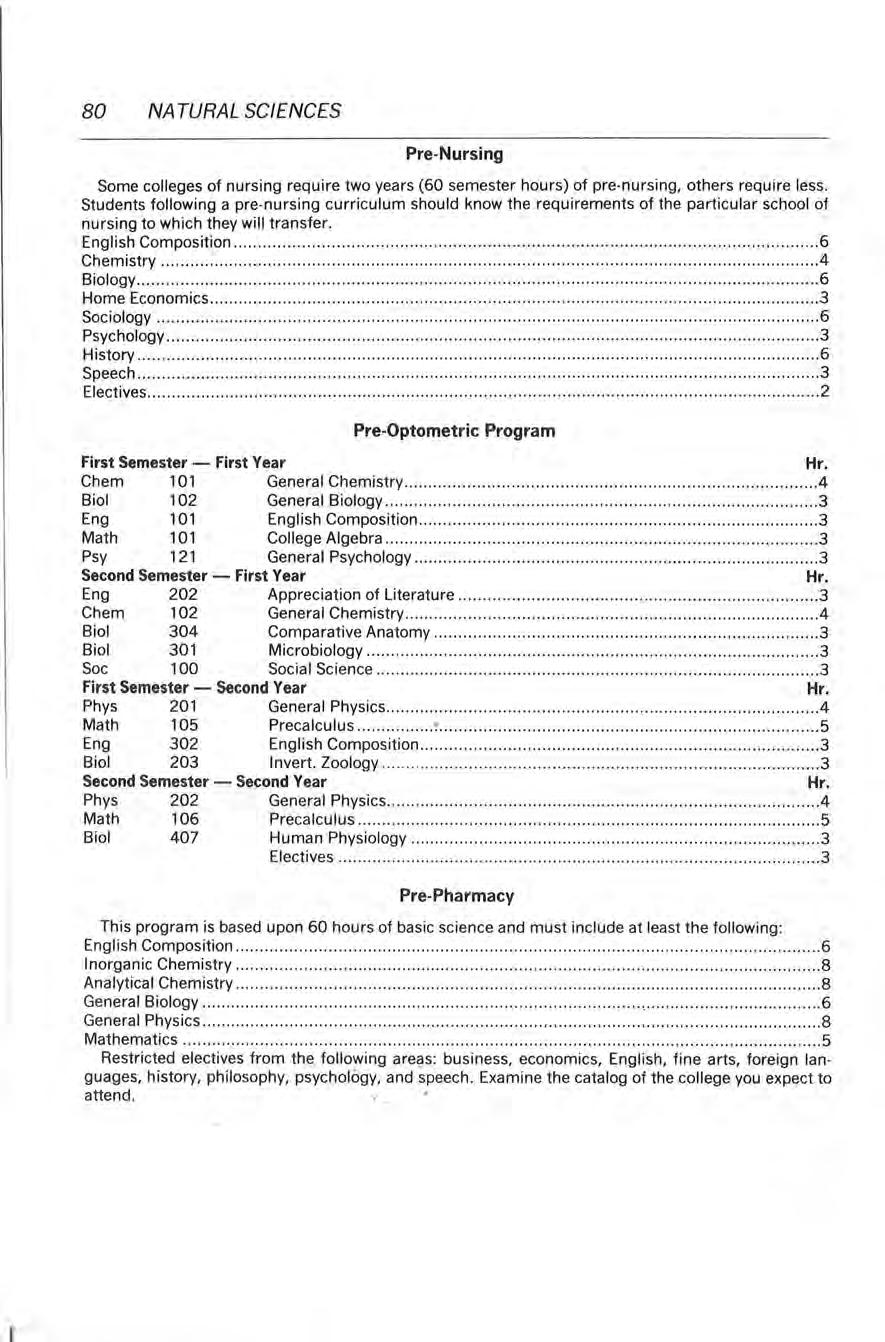
r
Pre-Nursing Some colleges of nursing require two years (60 semester hours) of pre-nursing, others require less. Students following a pre-nursing curriculum shou ld know the requirements of the particular school of nursing to which they will transfer. English Composition 6 Chemistry ................ .......................... ...... .......... ....... ................... ....... ...... ..... ... ........ .. .... ... ........... . .4 Biology 6 Home Econom ics 3 Sociology 6 Psychology 3 History 6 Speech 3 Electives 2 Pre-Optometric Program First Semester - First Year Hr . Chem 101 General Chemistry .4 Biol 102 General Biology 3 Eng 101 English Composition 3 Math 101 CollegeAlgebra 3 Psy 121 General Psychology .......... .... ............. .... ............. ....................................... 3 Second Semester - First Year Hr. Eng 202 Appreciation of Literature ............................ ....... .................... ..... ......... .. .. .3 Chem 102 General Chemistry 4 Biol 304 Comparative Anatomy 3 Biol 301 Microbiology ............ ........... ......... ......... ............................ .. ......... .. ........... 3 Soc 100 Social Science 3 First Semester - Second Year Hr. Phys 20 1 General Physics 4 Math 105 Precalculus L 5 Eng 302 English Composition 3 Biol 203 Invert. Zoology 3 Second Semester - Second Year Hr. Phys 202 General Physics ....... .... .......... .... ......... .... ....................... ....... ................ ..... 4 Math 106 Precalculus 5 Biol 407 Human Physiology ....................... .. ...... .. ........ .. ....... .. ............................. ... 3 Electives ......... ... ... .... ................ ........... .. ...... ........... ........ .. ........ ....... .... .. ... 3 Pre-Pharmacy This program is based upon 60 hours of basic science and must include at least the following: English Composition 6 Inorg an ic Chemistry 8 Analytical Chemistry 8 General Biology ..................... .............. ................... ......... .. .................... ..... ,.............. ... ... .... ... ..... .. .. 6 Genera l Physics 8 Mathematics ........ ..... ........ ... ........................... ..... ............................. ... ............. ..... ............ ............. 5 Restricted electives from the following are~s: business, econom ics , English, fine arts, foreign languages, history, philosophy, psychology, and speech. Examine the catalog of the co lleg e you expect to attend. •
Pre-Physical Therapy
The courses li sted in the suggested program are required in the Physical Therapy Program
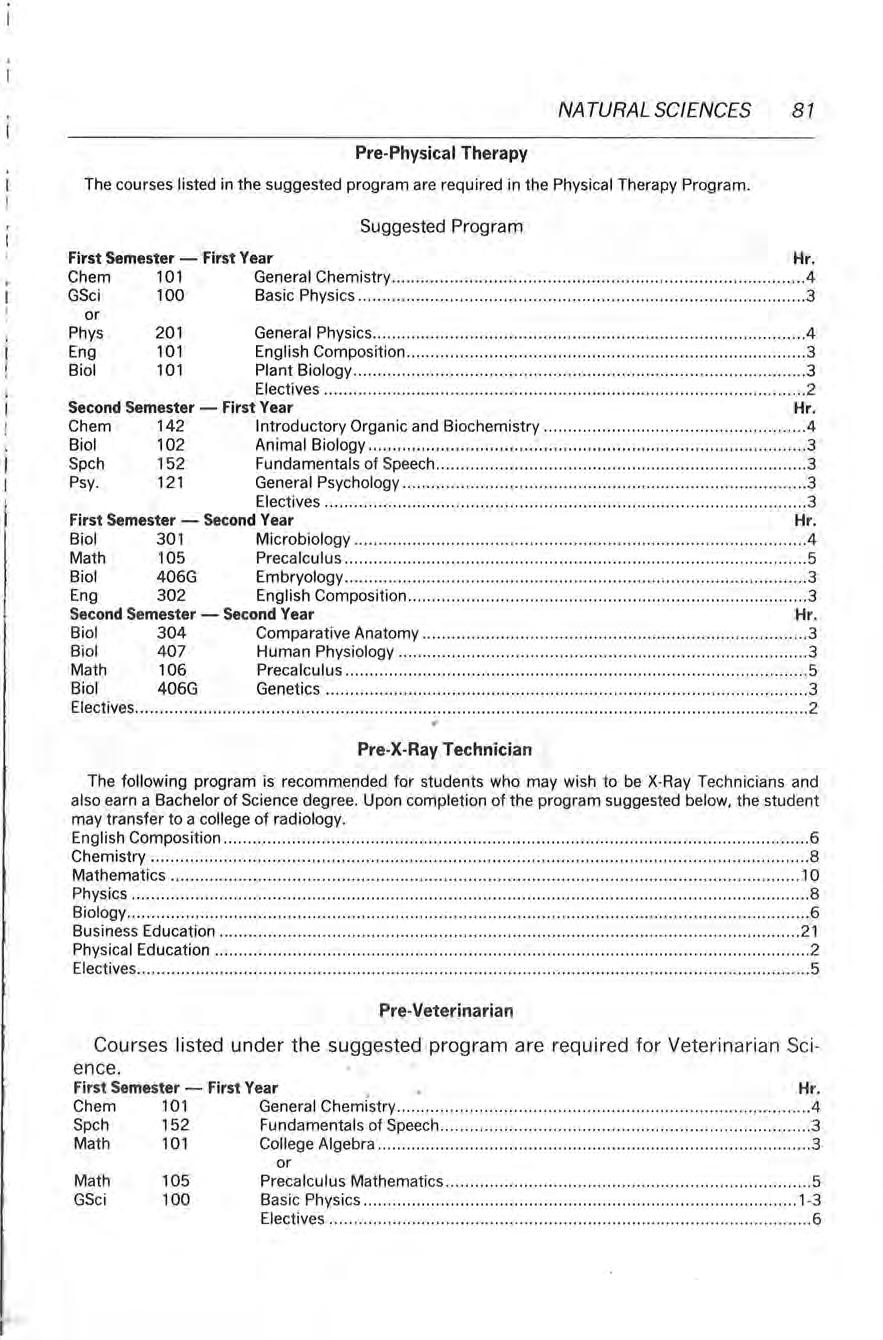
The following program is recommended for students who may wish t o be X•Ray Tec hnicians and also earn a Bachelor of Sc ience degree. Upon comp letion of the program suggested below, the student
Courses li sted under the suggested program are required for Veterin ar ian Sc ience.
NATURAL SC I ENCES 81
Suggeste d Program First Semester - First Year Hr. Chem 101 General Chemistry 4 GSci 100 Basic Physics 3 or Phys Eng Biol 201 101 101 General Physics .4 English Composition 3 Plant Biology 3 Electives 2 Second Semester - First Year Hr. Chem 142 Int roductory Organic and Biochemistry 4 Biol 102 Animal Biology 3 Speh 152 Fundamenta ls of Speech 3 Psy. 121 General Psycho logy 3 Electives ........ ..... ......... ........... .... ...................................................... ........ 3 First Semester - Second Year Hr. Bio l 301 Microbiology 4 Math 105 Precalculus 5 Biol 40 6G Embryo logy 3 Eng 30 2 English Composition 3 Second Semester - Second Year Hr. Biol 304 Comparat ive Anatomy 3 Biol 407 Human Physio logy 3 Math 106 Preca lcu lu s 5 Biol 406G Genetics 3 Elect ives .. ..... ........... .. ........ .... ...... .......... .. ... ....... ................................................... .. ...... .. ... .... .. ........ 2 Pre-X-Ray Technician
may transfer to
Eng li sh Compos it ion 6 Chemistry , . 8 Mathematics 10 Physics 8 Biology 6 Business Education 21 Physical Educat ion 2 Electives 5 Pre-Veterinarian
a college of radiology.
First Semester - First Year , Hr Chem 101 Genera l Chemistry ........ .... .... ..... ........... ...................................... ...... . .. ..... .4 Speh 152 Fundamentals of Speech .... .... ........................................ .. ................. .... ..... 3 Math 101 Co ll ege Algebra 3 Math GSci 105 100 or Precalculus Mathematic s 5 Basic Phys ics 1·3 Elective s .... ... .... ..... .... ..... .. ... ...... ... ... .. ... ... .... .... .... ... .................. ..... ....... .... 6
COOPERATIVE PROGRAMS
Medical Technology

Cooperative arrangements have been made between Peru State Coll ege and some schools of medical technology whereby a student may complete requirements for a Bachelor of Science degree with a major in Medical Technology . Under this program, the first three yea rs are spent on the Peru ca mpu s During these three years the student mu st satisfy the General Studies requirement for gradu ation, complete a minimum of 90 semester hours applicable toward a baccalaureate degree, complete 24 semester hours of chemistry, 15 hours of biology, and at lea st one course each in mathematics and physics .
The fourth year, which consists of a full twelve -month program, is spent in residence at an approved school of Medical Technology . Upon satisfactory completion of this year of training, the student may receive the bac ca lau rea te deg ree from Peru State College
Application to the school of Medi ca l Technology should be made early in the third year of training at Peru.
r 82 NATURAL SCIENCES Second Semester - First Yea r Hr Chem 102 Gene ra l Chemistry 4 Biol 102 Animal Biology 3 Eng 101 Engli sh Composition 3 Biol 407 Human Physiology 3 Electives 3 First Semester - Seco nd Year Hr. Chem 205 Principles of Qualitative Analy sis 4 Chem Eng Biol 303 302 406G or Organic Chemistry 4 English Composition 3 Embryology 3 Electives .6 Second Semester - Second Year Hr. Chem 206 Principles of Quantitative An alysis 4 Chem Biol Biol 304 304 404 or Organic Chemistry .. ......... ... ........ ..... ...... ......... ......... ..... . ...... ........ ..... .. ... .. .4 Comparative Anatomy 3 Genetics ......... ...... .... ... .......... .... ... ..... ................. .. .. ... ........... .. ... .. . .. .. .... .. .. 3 Electives ......... . .... .. ..... ........... ......... ..... .... . .... .... ... ...... .... ... .. .. ... .. ... ............ 6
Fir st Semester SUGGESTED PROGRAM FIRST YEAR English 101 i 3 hrs Mat h 105 5 hrs. Animal Biology 102 3 hrs. General Chemistry 101 4 hrs P.E. 101 or 103 1 hr 16 hrs.
SECOND YEAR
FOURTH YEAR
Fulfill Residence Requirement at Approved School of Medical Technology.
*The student would have some choice where General Studies courses occur due to the flexibility in General Studies Requirements.
NURSING
A cooperative arrangement has been made between Peru State College and Nebraska Methodist School of Nursing whereby a student may take one year of training at Peru State College and the remainder of his / her training at Nebraska Methodist Hospital in Omaha.
Under this arrangement the students are responsible for securing admission to the nursing program. During the year of schooling at Pe'ru, students would take those courses recommended by Nebraska Methodist as being desirable cours es preceding entrance into professional training
Students enrolled in this program do not receive a degree through Peru State College.
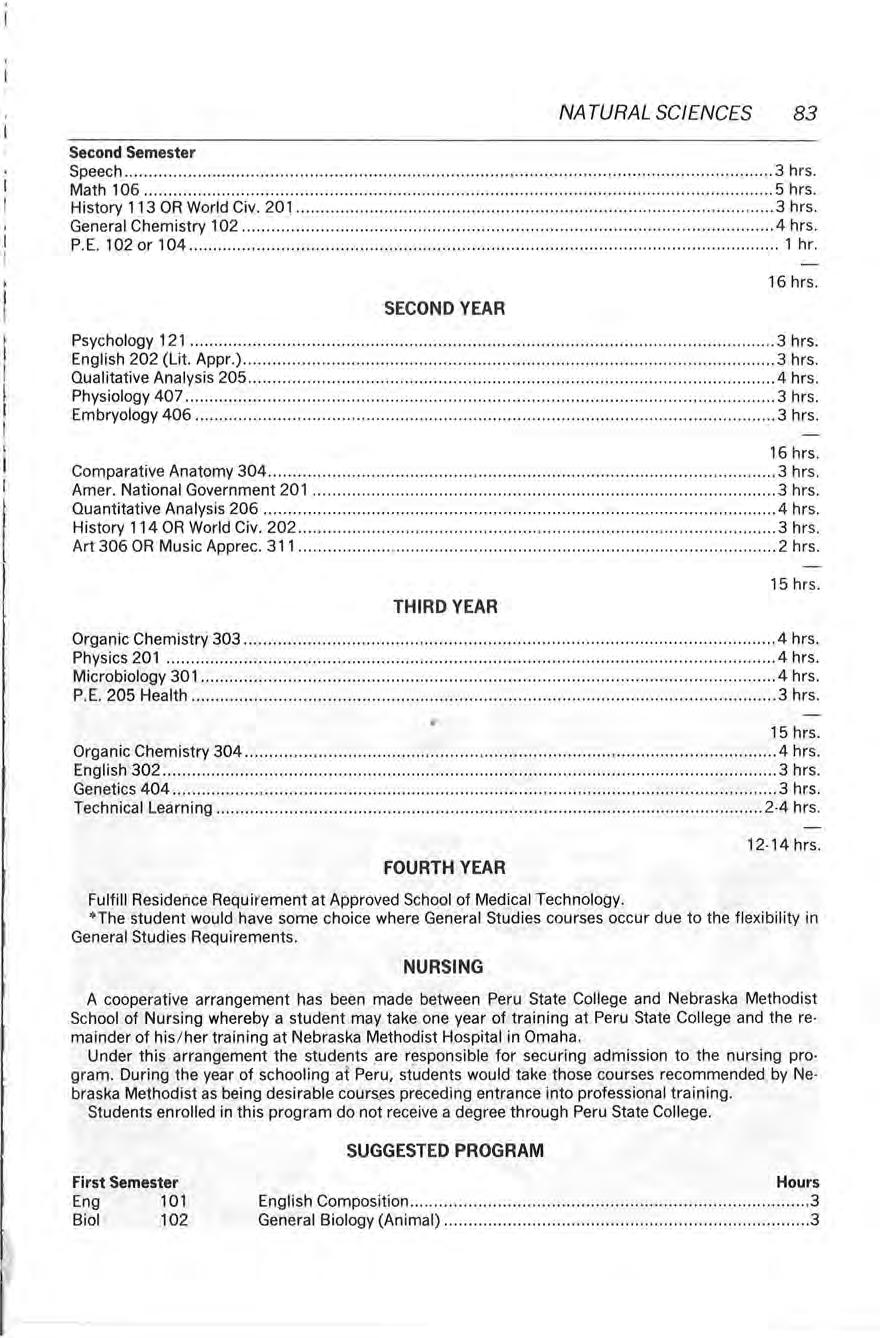
SUGGESTED PROGRAM
Second Sem ester Speech 3 hrs. Math 106 5 hr s History 113 OR World Civ. 201 3 hrs General Chemistry 102 ......................................................................... .. .................... .......... .... 4 hr s. P E. 102 or 104 1 hr. 16 hrs.
NATURAL SCIENCES 83
Psychology 121 3 hrs English 202 (Lit. Appr .) ...... .. ... .... .... ........... ... ......... ..... .... ... .......... .. ..... .. ... ..... .. .. .. .... .. ... ............. 3 hrs. Qualitative Analysis 205 4 hrs. Physiology 407 3 hrs. Embryology 406 3 hrs 16 hrs. Comparative Anatomy 304 .... ..... ...... .. ..... .. ..... .. .. .. ......... .. ............. ............ .. ... .. .. ...... ...... ............ 3 hrs . Amer National Government 201 3 hrs Quantitative Analysis 206 ..... ........... .. ................... ............. ... ...... ..... ..... ........... .. .. .. ................... 4 hrs. History 114 OR World Civ . 202 ............ ....... ........... ...... ........................ .... ... ............... .. .... ... ....... 3 hr s. Art 306 OR Music Apprec. 311 2 hrs 15 hrs. THIRD YEAR Organic Chemistry 303 4 hrs Physics 201 4 hrs. Microbiology 301 4 hrs. P.E 205 Health 3 hrs. 15 hrs Organic Chemistry 304 4 hrs English 302 3 hrs. Genetics 404 3 hrs Technical Learning 2-4 hrs. 12-14 hrs.
First Semester Hours Eng 101 English Composition 3 Biol 102 General Biology (Animal) 3
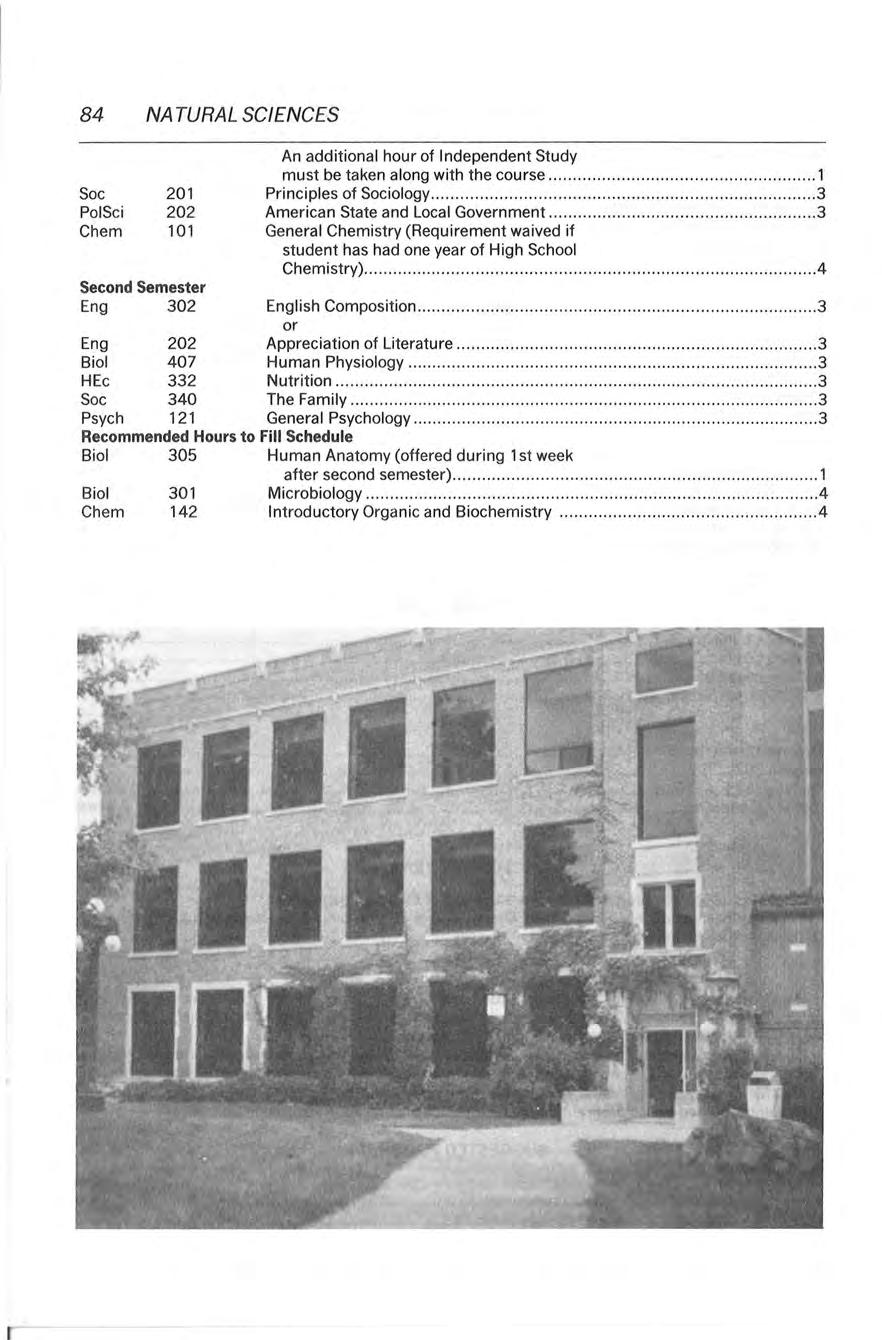
Soc PolSci Chem 201 202 101 Second Semester Eng 302 An add ition al hour of Independent Study must be taken along with the course .......... ...... ... ........ ... ......................... 1 Principles of Sociology .3 American State and Lo ca l Government 3 General Chem istry (Requirement waived if student has had one year of High School Chemistry) .... ... ... ... ............................ ..... .. .. .... ...... .. .............. ... ... ........ .. .4 En glish Composition 3 or Eng 202 Appreciation of Literature 3 Biol 407 Human Physiology 3 HEc 332 Nutrition 3 Soc 340 The Family 3 Psyc h 121 General Psychology 3 Recommended Hours to Fill Schedu le Biol 305 Human Anatomy (offered during 1st wee k after second semester) 1 Bio l 301 Microbiology 4 Chem 142 Introductory Org anic and Biochemistry .4
84 NATURALSCIENCES
Curricula Outlines Division of Performing Arts
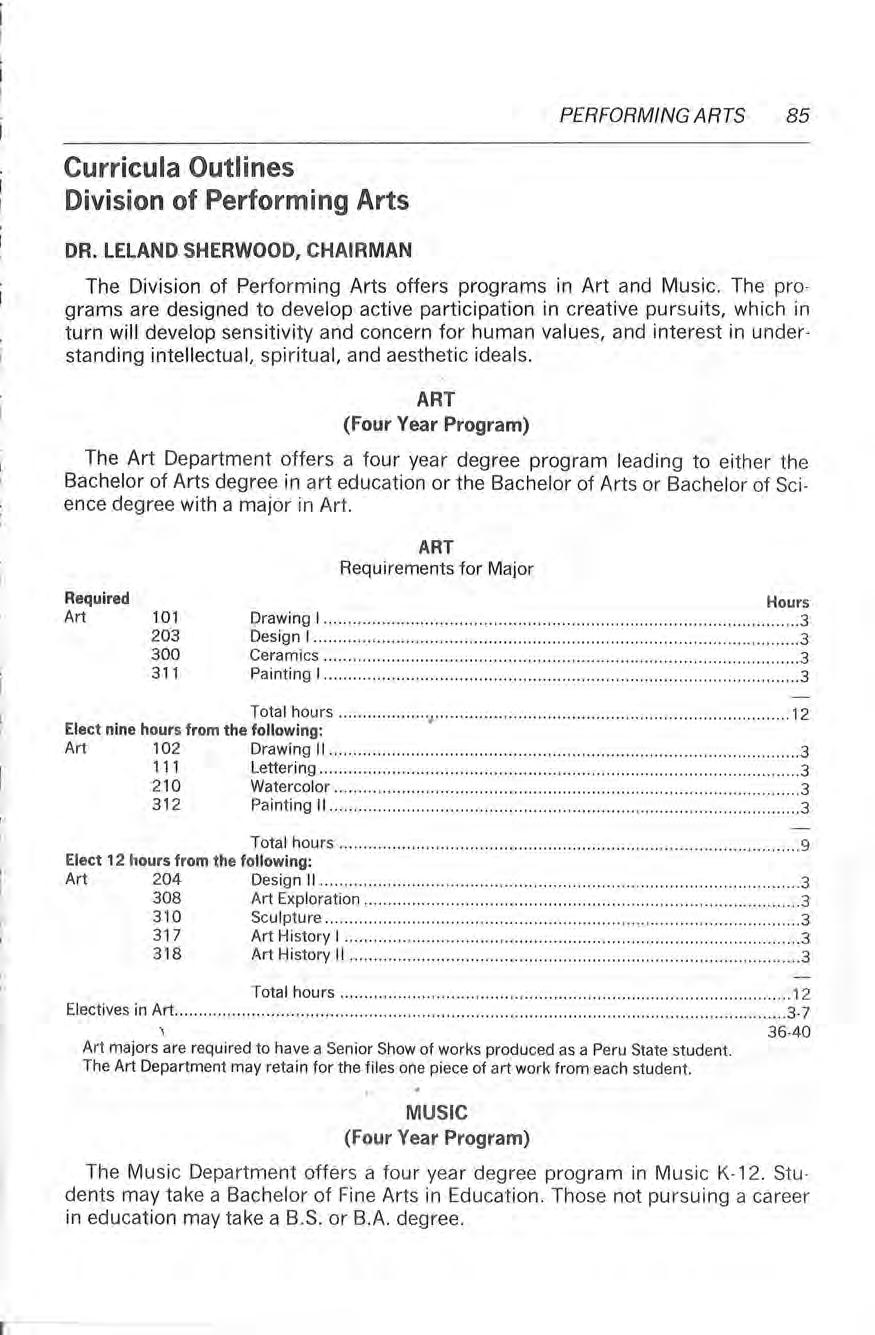
DR. LELAND SHERWOOD, CHAIR MAN
The Division of Performing Arts offers programs in Art and Music . The programs are designed to develop active participation in creative pursuits, which in turn will develop sensitivity and concern for hum an values, and interest in understanding intellectual , sp iritual, and aesthetic ide als .
ART
(Four Year Program)
The Art Departm ent offers a four yea r degree program lea ding to eith er the Bachelor of Arts degree in ar t education or the Bachelor of Arts or Bache lor of Science degree with a major in Art. ·
MUSIC
(Four Year Program)
The Mu sic Department offers a four yea r d egree program in Mu sic K-12. Students may tak e a Bache lor of Fin e Arts in Educat ion. Thos e not pursuing a career in educat
may take a B S. or B.A. degree.
PERFORMING ARTS 85
ART Requirements for Major Required Hours Art 101 Drawing 1....... .............. .. .............. .... .................... .. ............ .. ..... .... ............ 3 203 300 311 Design 1 3 Ceramics 3 Pa intin g I . ......... .... .. .. ............... ...... .. .... .. . .. ..... .. .... ..... .. ............ .. .. .. .... .. ...... 3 Tota l hours , 12 Elect nine hour s from the fo llowi ng: Art 102 Drawing 11 3 111 Lettering 3 2 10 Wat ercolor 3 3 12 Painting 11 3 Total hours 9 Elect 12 hours from the following: Art 204 Design 11 ............... .. ................. ........... . .. . ... ... . .............. .. ........ .. ............ ..... 3 3 08 Art Exp loration 3 310 Scu lpture 3 3 17 Art Hi story I 3 318 Art Hi stor y II 3 Total hours 12 Elect ives in Art 3-7 ' 36-40 Art ma j ors ar e requi re d to have a Sen ior Show of works produced as a Pe ru State student. The Art Department may retain for the files one piece of art work from eac h stu de nt.
ion
PERFORMING ARTS
PERFORMANCE
NOTE: It is the policy of the Music Department that all music majors should participate in band and choir each semester as this is a very important part of the student's training. During the semester in which the student presents his or her se nior recital, adjustments can be made
Music students are required to attend recitals and concerts as a partial fulfillment of the graduation requirement. Music majors working toward the Bachelor of Fine Arts·degree in Education are required to give a full recital.
Applied Music. Private instruction is provided in voice, piano, organ, strings, woodwinds, brass and percussion. There is no charge for private lessons to students within the department. Those outside the department may register for lessons at the-rate as indicated in the Financial Section. Music students are required to show a proficiency in piano to meet the demands of their classroom activities. At least one semester of private voice instruction is required of majors.
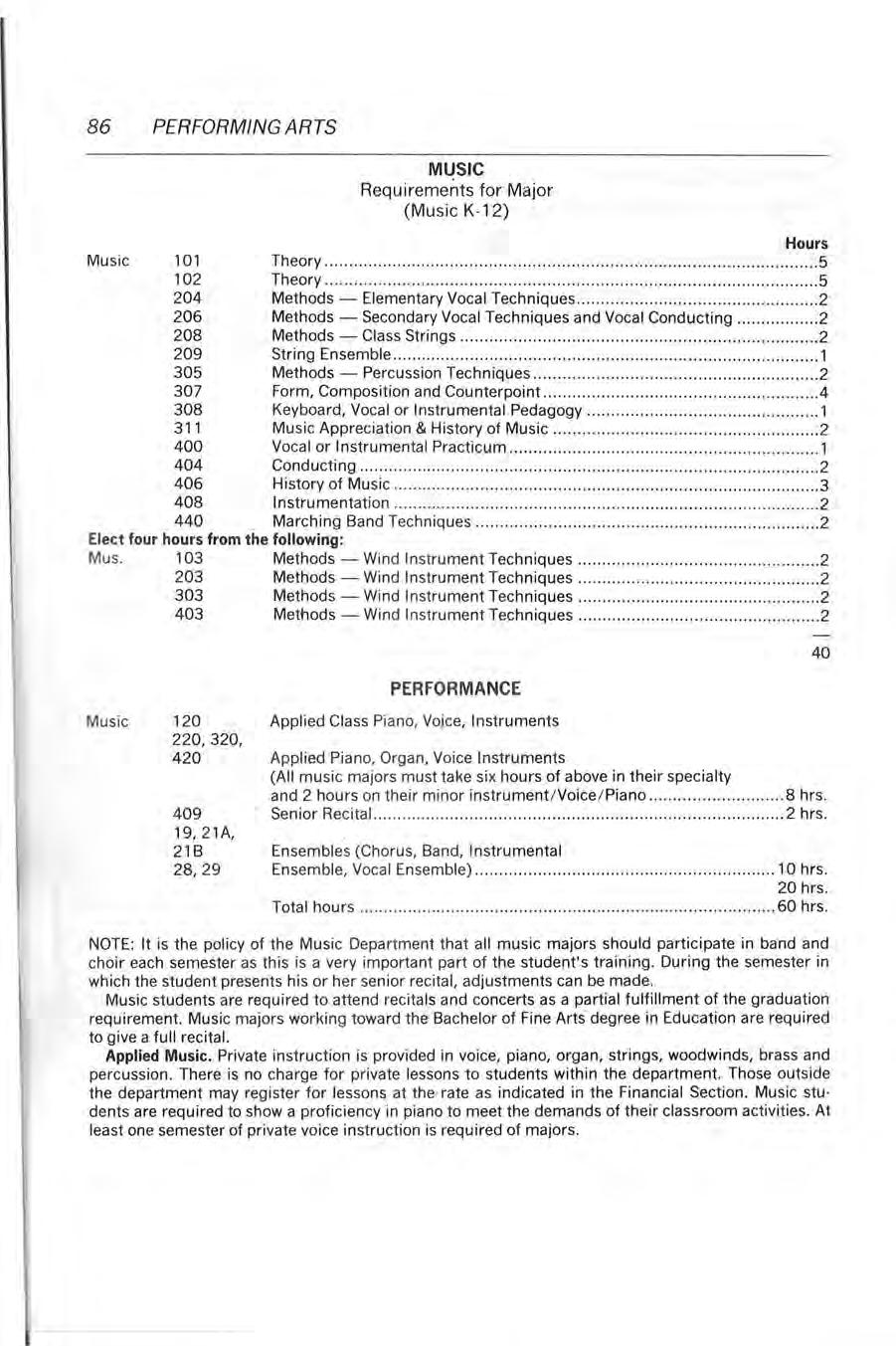
86
MUSIC Requirements for Major (Music K-12) Hours Music 101 Theory 5 102 Theory .. .. ...... ... ...... ... .................... .. ............................ ............ ... ............... 5 204 Methods - Elementary Vocal Techniques 2 206 Methods - Secondary Vocal Techniques and Vocal Conducting ........ ... ...... 2 208 Methods - Class Strings 2 209 String Ensemble 1 305 Methods - Percussion Techniques 2 307 Form, Composition and Counterpoint.. 4 308 Keyboard, Vo ca l or Instrumental Pedagogy 1 311 Musi c Appreciation & History of Music ....................................................... 2 400 Vo ca l or Instrumental Practicum 1 404 Conducting 2 406 Hi story of Music 3 408 Instrumentati on 2 440 Marching Band Techniques .............. ............................. .. .............. ...... .... .. 2 Elect four hours from the following: Mus 103 Methods - Wind Instrume nt Techniques 2 Mus ic 203 Methods - Wind Instrument Techniques 2 303 Methods - Wind In strume nt Tec hniques 2 403 Methods - Wind Instrument Techniques 2 120 220,320, 420 409 19, 21A, 21B 28,29 40
Appli ed Class Pi ano, Voic e, Instruments Applied Piano , Organ, Voice In st ruments (All music majors must take six hours of above in th eir specialty and 2 hour s on their minor in str ument/Voice / Piano 8 hrs. Senior Recital 2 hrs. Ensembles (Chorus, Band, Instrumental Ensemble, Vocal Ensemble) 10 hrs 20 hrs Total hour s 60 hrs
Curricula Outlines Division of Physical Education
MR . JERRY JOY, CHAIRMAN
The Division of Physical Education offers programs to prepare studen t s to teach physical educat ion, to coach, and to effect ively manage organized act ivitie s. The programs are designed to develop active participation in physical activit ies now, and to encourage contained particip at ion in appropr iate act iviti es in later ye ars
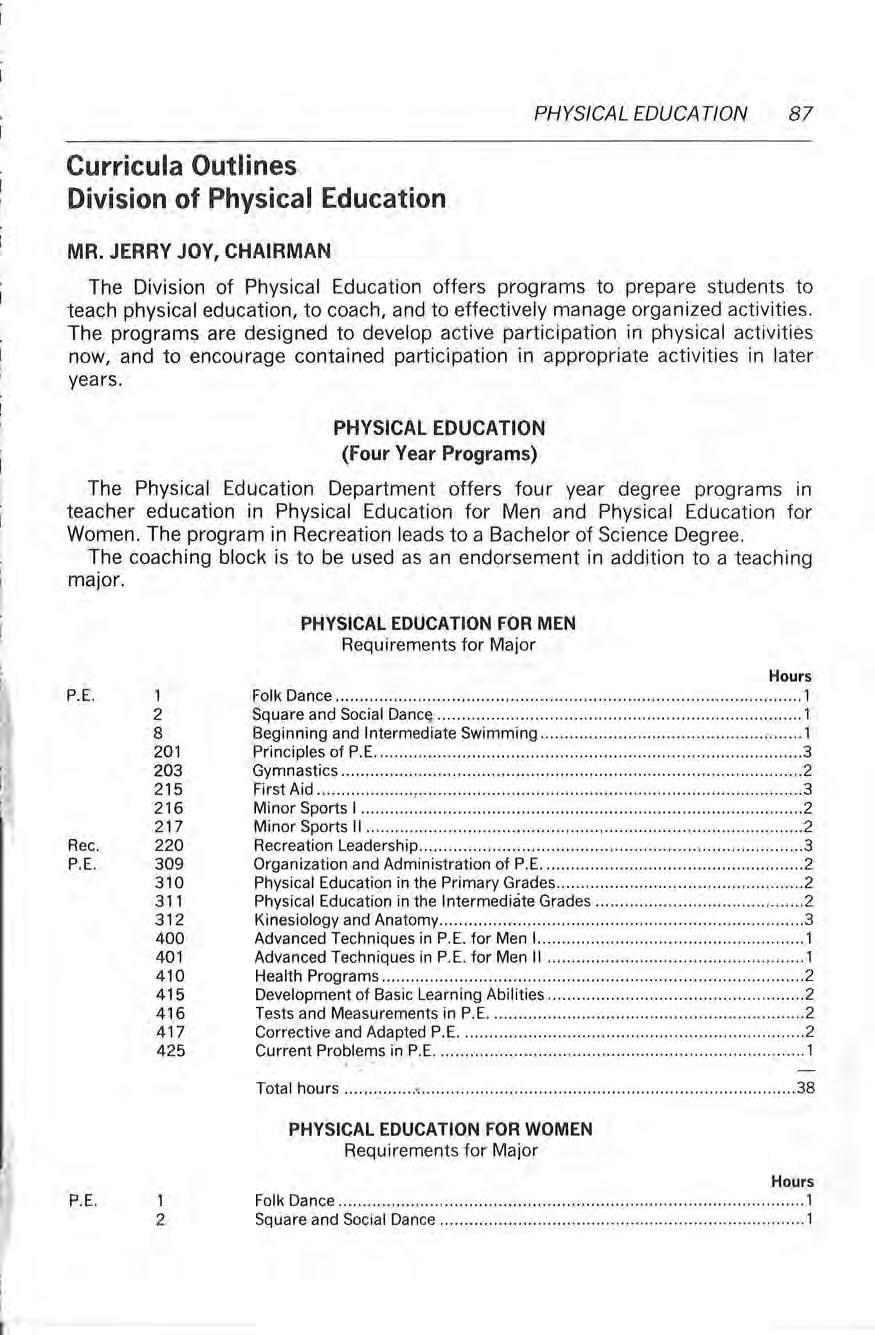
PHYSICAL EDUCATION
(Four Year Programs)
The Physical Educat ion Department offers four year degree programs in teacher education in Physical Educat ion for Men and Physical Educat ion for Women. The program in Recreation leads to a Bac helor of Sc ien ce Degree
T he coaching block is to be used as an endorsement in addit ion to a teaching major.
PHYSICAL £D UCA TION 87
P.E. Rec . P.E P.E. 1 2 8 201 203 215 216 217 220 309 310 311 312 400 401 410 415 416 417 425 1 2 PHYSICAL EDUCATION
Requirements for Major Hours Folk Dance 1 Square and Socia l Dane~ 1 Beginning and Intermed iate Swimming 1 Principles of P.E. 3 Gymnastics 2 First Aid ... .. .. . ... ... ..... ., .... ................ . ............................. . .. .. ....... . .... .. .......... 3 Minor Sports I 2 Minor Sports II 2 Recreation Leadership ... .................. ...... .... . ... ........ . .... ... . .. .. .. . . .. . .. .. . ... . ..... .. 3 Organization and Administration of P E 2 Physical Education in the Primary Grades 2 Physical Ed ucation in the Intermed iate Grades 2 Kine sio lo gy and Anatomy 3 Advanced Techniques in P.E. for Men 1. 1 Advanced Techniques in P.E. for Men II 1 Health Programs 2 Development of Basic Learning Abilities 2 Tests and Measurements in P.E 2 Corrective and Adapted P.E 2 Current Problems in P.E 1 Total hours •,:<·•····38 PHYSICAL EDUCATION FOR WOMEN Requirements for Major Hours Folk Dance ........................... . ............... . ...... . ........ . .... . .... . ............ . ........ .. .. . 1 Sq u are and Soc ia l Dance 1
FOR MEN
COACHING OF INTERSCHOLASTIC SPORTS
The following program is provided for those students interested in the coaching of interscholastic sports It is designed to fit the needs of the high schoo l coach and leads to institutional recommendation for endorsement. Students completing this program are required to have a major in another area. Students desiring the coaching block endorsement should select a minimum of four of the seven theory courses listed below. Select additional courses from the li st to acquire total hours .
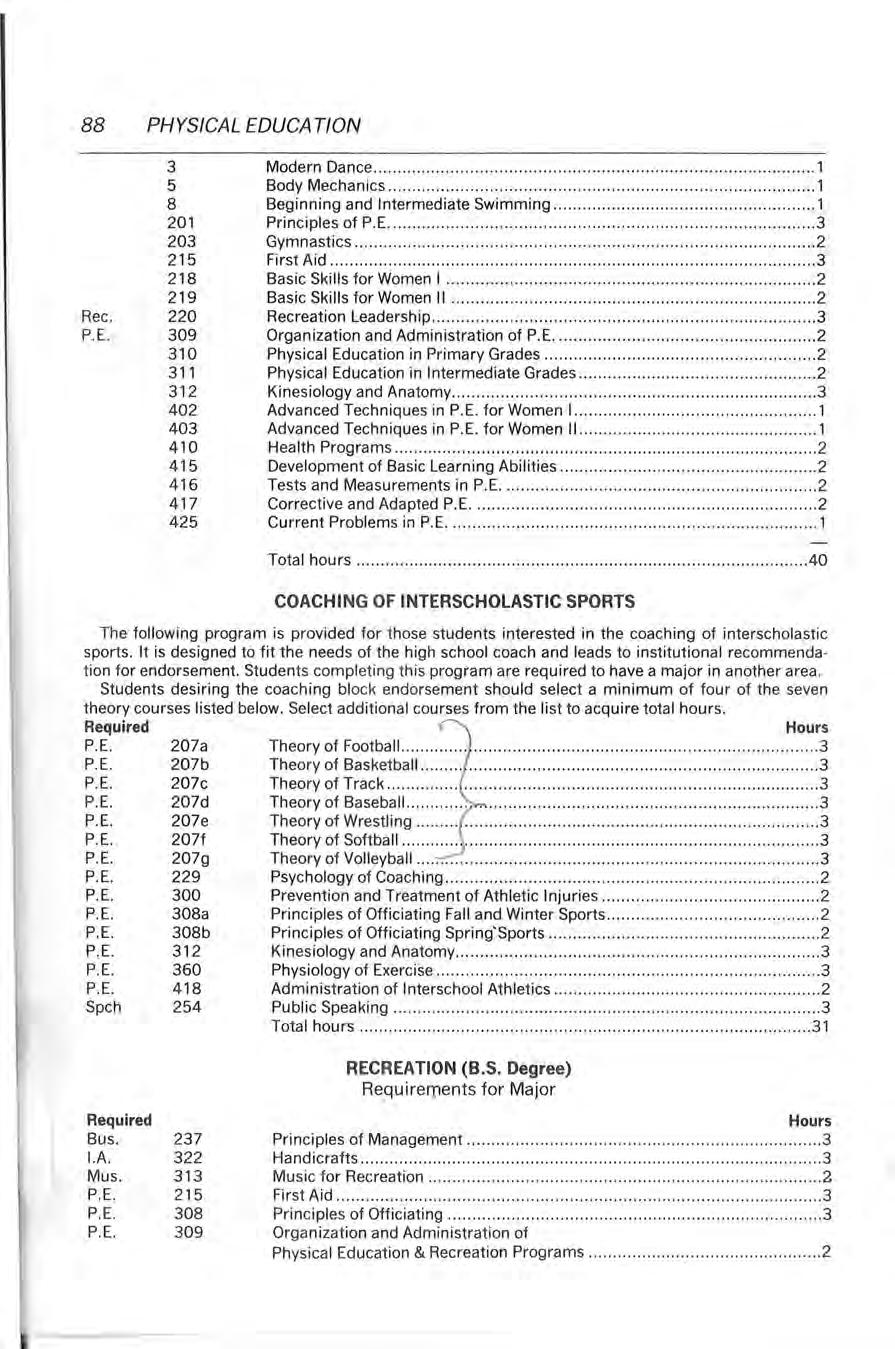
88 PHYSICAL £DUCA TION Rec. P.E. 3 5 8 201 203 215 218 219 220 309 310 311 312 402 403 410 415 416 417 425 Modern Dance 1 Body Mechanics 1 Beginning and Intermediate Swimming 1 Principles of P E 3 Gymnastics 2 First Aid 3 Basic Skills for Women I 2 Basic Skills for Women II 2 Recreation Leadership ............................. ......... ...... ........... ..... .......... ........ .3 Organization and Administration of P.E ................................... ................... 2 Physical Education in Primary Grades 2 Physical Education in Intermediate Grades ...... ... ............................ . .. ......... 2 Kinesiology and Anatomy 3 Advanced Techniques in P. E for Women I 1 Advanced Techniques in P.E. for Women 11................................................. 1 Health Programs 2 Development of Basic Learning Abilities 2 Tests and Measurements in P.E : 2 Corrective and Adapted P.E 2 Current Problems in P.E. ............. ............ ....... ........... ......... ............ ......... .. 1 Total hours .40
Required P.E. P.E. P.E. P.E. P.E. P.E. P.E. P.E. P.E. P. E. P.E. P.E. P.E. P.E Speh Required 207a 207b 207c 207d 207e 207f 207g 229 300 308a 308b 312 360 418 254 Bus. 237 I.A. 322 Mus. 313 P.E. 215 P.E 308 P.E. 309 Hours Theory of Footba ll. 3 Theory of Basketba ll 3 Theory of Track 3 Theory of Baseball......... 3 Theory of Wrestling 3 Theory of Softba 11 3 Theory of Volleyball 3 Psychology of Coaching 2 Prevention and Treatment of Athletic Injuries 2 Principles of Officiating Fa ll and Winter Sports 2 Principles of Officiating Spring'Sports 2 Kinesiology and Anatomy 3 Physiology of Exercise 3 Administration of lnterschool Athletics 2 Public Speaking 3 Total hours 31 RECREATION (B.S. Degree) Re,quirerpents for Major Hours Principles of Management .... . .. ........ .. ..... .. .... ............................................. 3 Handicrafts 3 Music for Recreation 2 First Aid ...................... ...... ...... ...... .. ........................ .. ... ... .......... ............ .. .. 3 Principles of Officiating 3 Organization and Administration of Physical Education & Recreation Programs 2

Rec. Rec. Rec. Rec Rec 220 308 319 322 405 460 PHYS I CAL £D UCA TION 89 Recreation Leader ship 3 Recreation Swimming 1 Programs in Recr eation 3 Outdoor Re creation and Camping .... .. .. . .. . .. .. .. ....... .. .. .. .... . .... ... ....... ... ...... . .. 3 Recreation Seminar 1 Recreation Internship 6·8 Elect 20 hours from the following: Art 111 Lettering 3 Art 300 Ceramics 3 ~~:~~:~::: ~~~~~~:~~.::: ::::: ::: ::::::::::::::::::::::::::::::::::::::::::::::::::::::::::: ::::::~ Bus 231 Econ 220 I.A. 226 Photography I 3 Journ 235 Newspaper Editing 2 Music 120 Class and App lied Piano 1 P.E. 1 Folk Dance 1 P E 2 Square and Social Dance 1 P.E . 8 Swimming ............... .......... ..... .. .. ...... .. ... ....... ... ..... ... .......... ... ... ...... .. ..... ..... 1 P.E. 10 Tennis 1 P.E. 201 Principles of Physi cal Education 3 P E. 300 Prevention & Treatment of Athletic lnjuries .. .... .. ... .. .. .... ......... ..... ... ............. 2 Rec. 406 Recreation Research 1 3 Speh. 254 Public Speaking .. .. . .. .. ... .. ...... .. ... ....... .. ...... ... ... ... ... . .. .. ... .......... . .. ... .. .......... 3 Speh. 256 Act ing 1 3
Division of Applied Arts
BUSINESS
100 Business Mathematics
3 hr.
A review of the four fundamental operations of arithmetic applied to whole numbers, fractions, and decimals; app li cations of percentage; computing in terest and discounting notes; consumer credit; cash and trade discount; computing markup, retail and commiss ion; marking goods; the arithmetic of payro ll s.
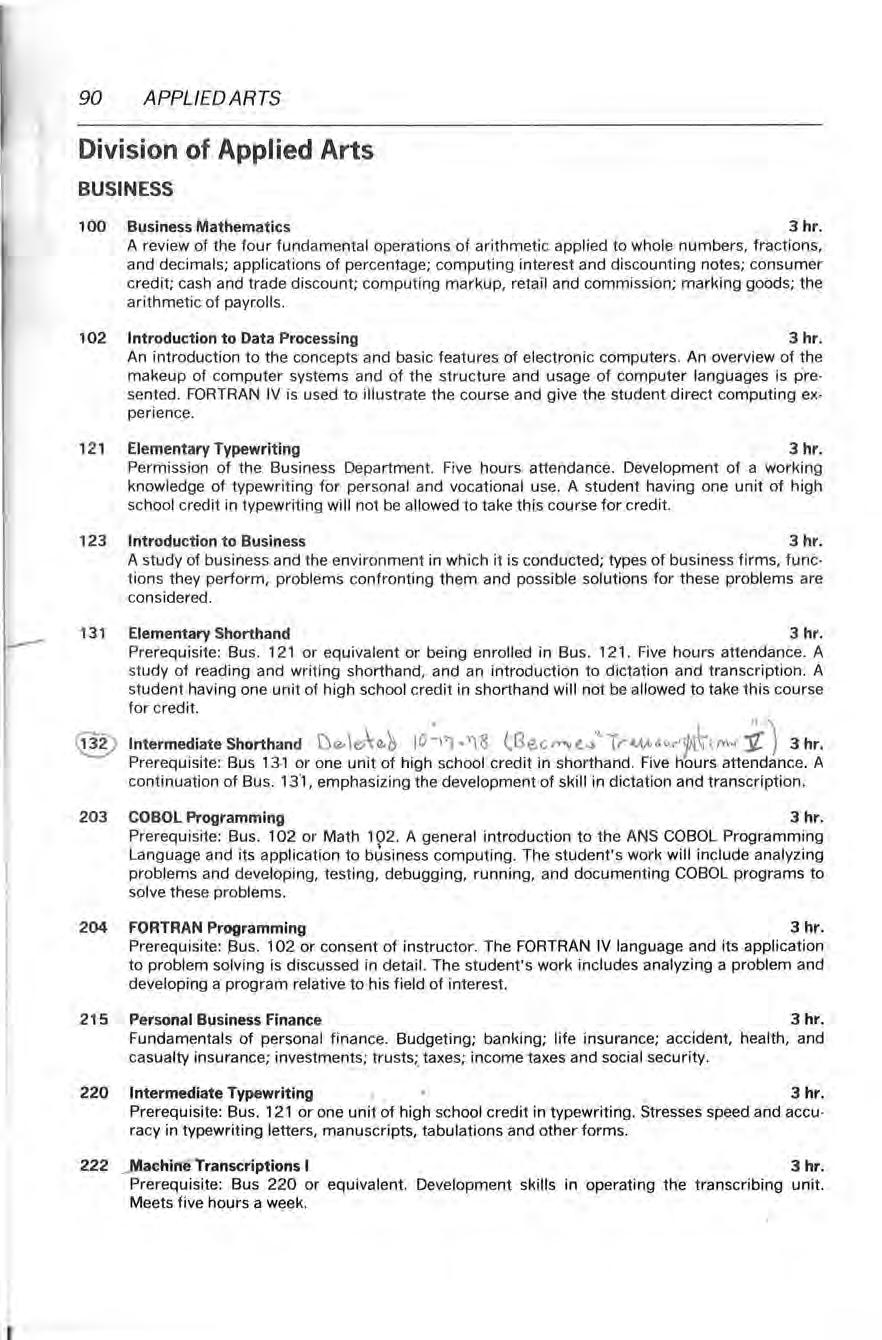
3 hr.
An introduction to the concepts and bas ic features of electronic computers. An overview of the makeup of computer systems and of the structure and usage of computer languages is presented. FORTRAN IV is used to illustrate the course and give the student direct computing experience .
Elementary Typewriting
3 hr.
Permission of the Business Department. Five hours attendance Development of a working knowledge of typewriting for personal and vocational use. A student having one unit of high school credit in typewriting will not be allowed to take this course for credit.
Introduction to Business
3 hr.
A study of business and the environment in which it is conducted; types of business firms, functions they perform, prob lems confronting them and possible solutions for these problems are cons id ered.
Elementary Shorthand
3 hr.
Prerequisite: Bus. 121 or equivalent or being enro ll ed in Bus. 121. Five hours attendance. A study of reading and writing shorthand, and an introduction to dictation and transcription. A student having one unit of high school credit in shorthand will not be a ll owed to take this course for credit.
Intermediate Shorthand De-\e,"";e.c, 10-1"}~'18
Prerequisite: Bus 13--1 or one unit of high school credit in shorthand. Five hours attendance. A continuation of Bus. 13'1, emphasizing the development of skill in dictation and transcription.
COBOL Programming
3 hr.
Prerequisite: Bus. 102 or Math 1~2. A general introduction to the ANS COBOL Programming Language and its app li cation to business computing. The student's work will include analyzing problems and developing, testing, debugging, running, and documenting COBOL programs to so lve these problems. ·
FORTRAN Programming
3 hr.
Prerequisite: l3us. 102 or consent of instructor. The FORTRAN IV language and its application to problem solving is discussed in detail. The student's work includes analyzing a problem and developing a program relative to his field of interest.
215 Personal Business Finance
3 hr.
Fundamentals of personal finance. Budgeting; banking; life insurance; accident, health, and casualty insurance; investmen!s; trusts;_taxes; income taxes and social security.
220 Intermediate Typewriting .
3 hr.
Prerequisite: Bus. 121 or one unit of high schoo l credit in typewriting. Stresses speed and accuracy in typewriting letters, manuscripts, tabulations and other forms.
222 ..Maehin-efranscriptions I
3 hr.
Prerequisite: Bus 220 or equivalent. Development skills in operating the transcribing unit. Meets five hours a week.
r 90 APPLIED
ARTS
102 Introduction to Data Processing
121 123 131 203 204
\\,•_,,j__""\
(Bec.lY'llt.~"TnM.&c.."f!"ifYW.li J 3hr.
222 J-1aehfiieTranscriptions II
2 hr.
Prerequisite: Bus. 220 or equivalent and permission. Further development of skills on the transcribing units. This course includes vocabularies for special emp loyment areas. Meets four hours a week.
222 .Maehinlf Transcriptions Ill
2 hr.
Prerequisite: Bus. 220 or equivalent and permission. Further development of the ski lls on the transcribing machine specializing in the area of medical terms and correspond ence Meets four hours a week.
222 Mac;hine,ranscriptions IV
2 hr .
Prerequisite : Bus. 220 or equivalent and permission. Further development of the skills on the transcribing machine specializing in the area of lega l terms, documents and correspondence. Meets four hours a week.
IIA,,.,,_L,b.-.o Ts'"" ..1cr,lll{1,,..s L + "T 1 -rrf' JO-l'}-"li
222 ~ n-arid'ftauscrrptit>nsV t.r\{(s"@<l> o rllflH,r'.j;)ttr,,-.1 .JLJ!.3hr
Prerequisites: Bus. 132 and 220 or two units High School shorthand . Four hours attendance. Emphasis is placed on increasing skil l s in taking dictation and transcribing it into mailable form.
Tfo,"-ic,r:bt111,..f + ,, 1 /J
222 .Oic;tation-and-+r-an5el'ipfiens-V
I) 1r-"'°'H,..")O'HIM~ "J[[J. 111--11\-'!83hr
Prerequisite: Bus 222 V. Four hours attendance. Greater increase in the speed and accuracy in taking timed dict;:ition. -,rr p + ,, "I o J...
231 Principles of Accounting l
e, : a,rl'l <J '"·
2-3 hr.
Four hours of attendance per week. An introduction to the processes of recording financial data and preparing periodic financial statements. The complet e accounting cyc le will be studied. One and two year secretaria l majors may register for the 2 hrs credit and will attend the first 10 weeks of the course. Those completing only the 2 hr. program are not eli gib le to enro ll in Bus. 232.
232 Principles of Accounting II
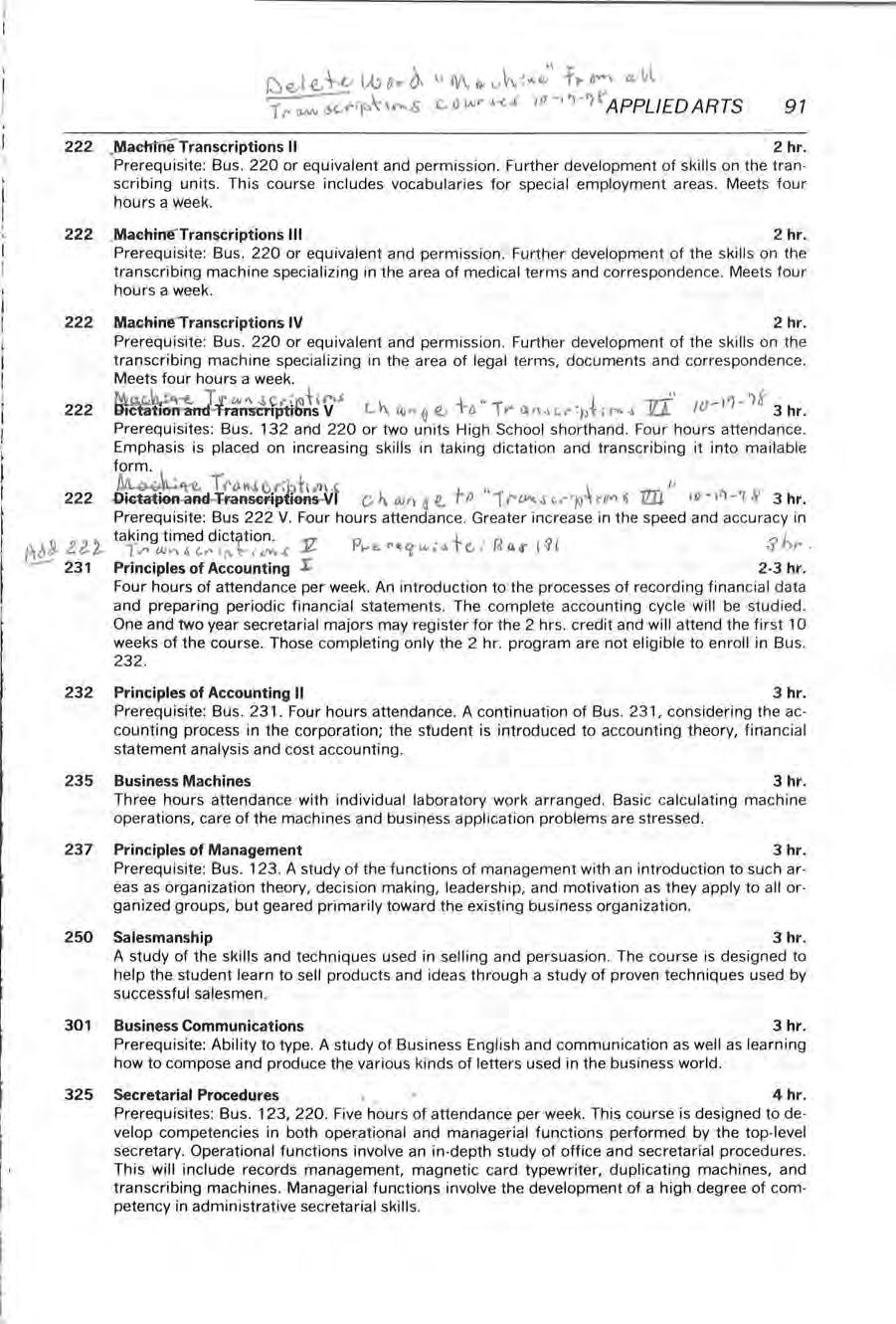
3 hr.
Prerequisite: Bus. 231. Four hours attendance. A continuation of Bus . 231, considering the accounting process in the corporation; the student is introduced to accounting theory, financial statement analysis and cost accounting.
235 Business Machines
3 hr.
Three hours attendance with individual laboratory work arranged Basic ca lculating machine operations, care of the machines and business application problems are stressed.
237 Principles of Management
3 hr.
Prerequisite: Bus 123. A study of the functions of management with an introduction to such areas as organization theory, decision making, leadership, and motivation as they app ly to all organized groups, but geared primarily toward the existing business organization.
250 Salesmanship
3 hr.
A study of the skills and techniques used in selling and persuasion The course is designed to help the student learn to se ll products and ideas through a study of proven techniques used by successfu l salesmen.
301 Business Communications
3 hr.
Prerequisite: Ability to type. A study of Business English and communication as well as learning how to compos e and produce tt-J.e ._various kinds of letters used in the business world.
325 Secretarial Procedures .
4 hr .
Prerequisites : Bus. 123, 220. Five hours of attendance per week. This course is designed to deve lop competencies in both operational and managerial functions performed by the top-level secretary. Operational functions involve an in-depth study of office and secretarial procedures. This will include records management, magnetic card typewriter, duplicating machines, and transcribing machines Managerial functions involve the development of a high degree of competency in administrative secretaria l skills
ue,le.,½ L-0 o..-b- \JM 9' uk-..~' fl- 6""" a, vl
c..o""rH.t ,o - ,'1-'lfAPPLIEDARTS 91
'·,i-u.M>~'-'"'l'>~',.._.S
c.~~"d~
A~sii.,,,_T,"W>-\~(.,-t"'"'°vv-,.(..l<-..,e."~<£...,;<l
.;...----
APPLIED ARTS
328 Principles of Marketing
3 hr. A study of the buying, selling, transporting and storing functions involved in marketing; the student is introduced to retailing, wholesaling and marketing management.
329 Advertising
2 hr.
Prerequisite: Bus. 328 . A study of advertisements and media from three viewpoints: management-marketing, communications-creativity, and consumer-citizen.
331 Insurance Cl\o,-..~-e,&, 1u y).,,--e,@. fww..s (:l >,.._.) Jb--../'1·')~ ,,,-{ hr.
Prerequisite: Bus. 123. A study of the major types of personal and business insurance, including lif e, property, health and accident, public liability and socia l insurance.
332 Investment
3 hr .
Prerequisite: Bus. 232. A study of the major uses of investment funds, including saving accounts in banks and other financial institutions, government bonds, corporate stocks and bonds, annuities and real estate
334 Advanced Typewriting
3 hr.
Prerequisite: Bus. 220. Three hours attendance. Stresses the development of a high degree of proficiency in composition, machine dictation and production typewriting.
335 Industrial Management
3 hr.
Prerequisite: Bus. 237. A study of the management of an industrial plant; location, construction, layout, equipment, supp li es and personnel are considered
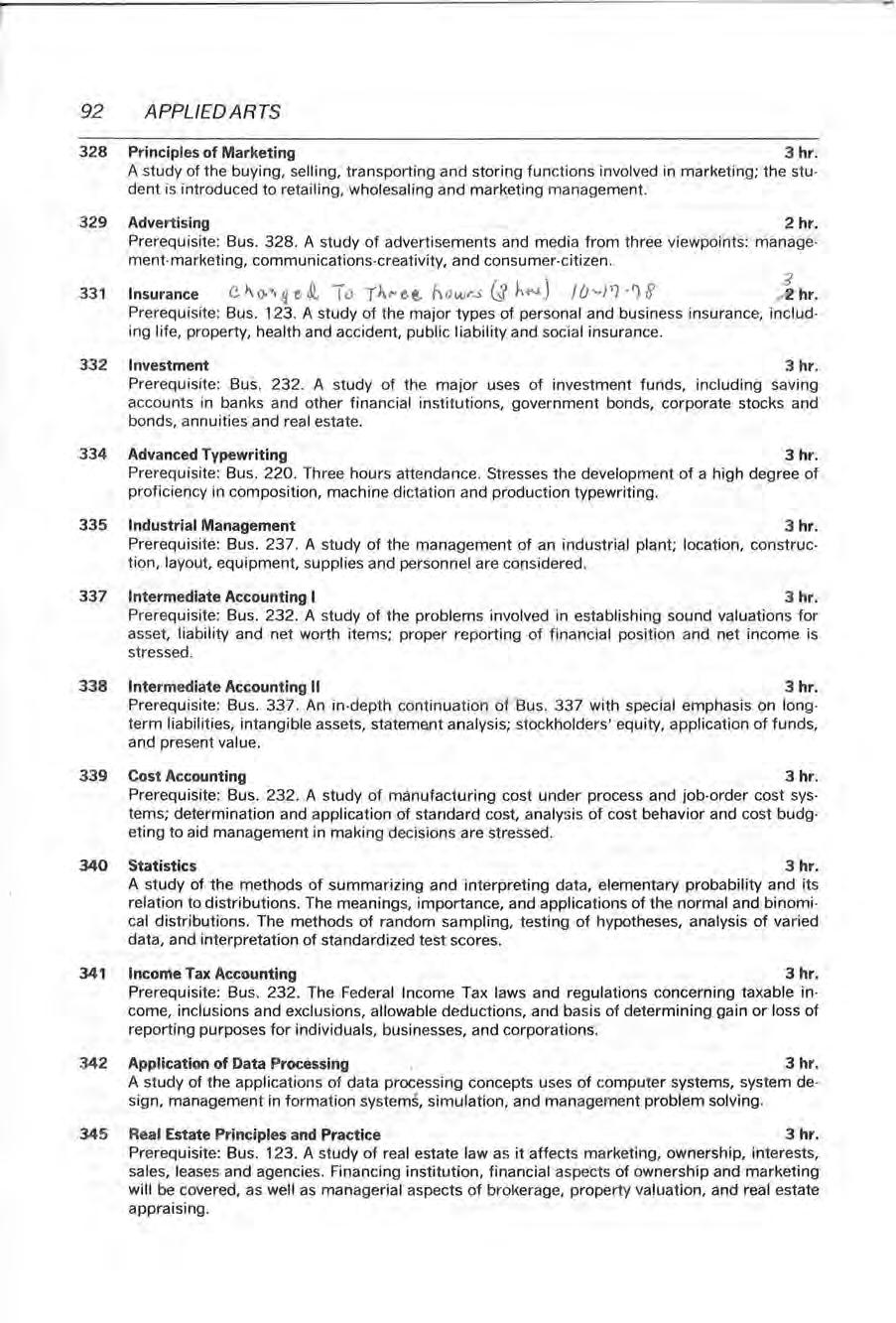
337 Intermediate Accounting I
3 hr.
Prerequisite: Bus 232 A study of the problems involved in establish ing sound valuations for asset, liability and net worth item s; proper reporting of financial pos ition and net in come is stressed.
338 Intermediate Accounting II
3 hr
Prerequisite: Bus. 337 An in-depth continuation of Bus. 337 with special emphasis on longterm liabilities, intangib le assets, statement analysis; stockho ld ers' equity, appl icati on of funds, and present value
339 Cost Accounting
3 hr.
Prerequisite: Bus. 232 . A study of manufacturing cost under process and job-order cost systems; determination and application of standard cost, analysis of cost behavior and cost budgeting to aid management in making decisions are stressed.
340 Statistics
3 hr.
A stud y of the methods of summarizing and interpreting data, elementary probability and its relation to distributions The meanings, importance, and applications of the normal and binomical distributions. The methods of random sampling, testing of hypotheses, analysis of varied data, and interpretation of standardized test scores.
341 Income Tax Accounting
3 hr.
Prerequisite: Bus 232. The Federal Income Tax l aws and regulations concerning taxable income, inclusions and exclusions, allowable deductions, and basis of determ ining ga in or loss of reporting purposes for individual s, businesses, and corporations.
34 2 Application of Data Processing _
3 hr.
A study of the app licat ions of data processing concepts uses of computer systems, system design, management in formation system s, simulation, and management problem solving.
345 Real Estate Principles and Practice
3 hr.
Prerequisite: Bus 123. A study of real estate law as it affects marketing , ownership, interests, sales, leases and agencies Fin ancing institution, financial aspects of ownership and marketing will be covered, as well as manageria l aspects of brokerage, property valuation, and real estate appraising
92
346 Money, Credit and Banking
3 hr.
A study of the origins and present roles of our monetary system, credit, commercial banking and the Federal Reserve System. It will be organized for students who se principal interest lies outside of going into bank management.
350 Business Law I
3 hr.
Prerequisite: Bus. 123. A study of the legal rights and obligations of parties to contracts concerned with such matters as exchange, property, agency, insurance and bankruptcy; special legal problems of partnerships and corporations are considered
351 Business Law II
3 hr .
Prerequisite: Bus. 350. A study of legal principles covering sales, negotiable instruments, security, bailments, the uniform commercial code, corporation and partnerships, and the laws governing real and personal property
360 Real Estate Finance
3 hr .
Prerequisite: Bus. 345. A detailed analysis of the methods and techniques of financing the purchase of real estate Areas of study include fund sources, analysis of mortgage risk, FHA underwriting, other Government influences and agencies, legal aspects involved, and the policies and procedures of lending institutions .
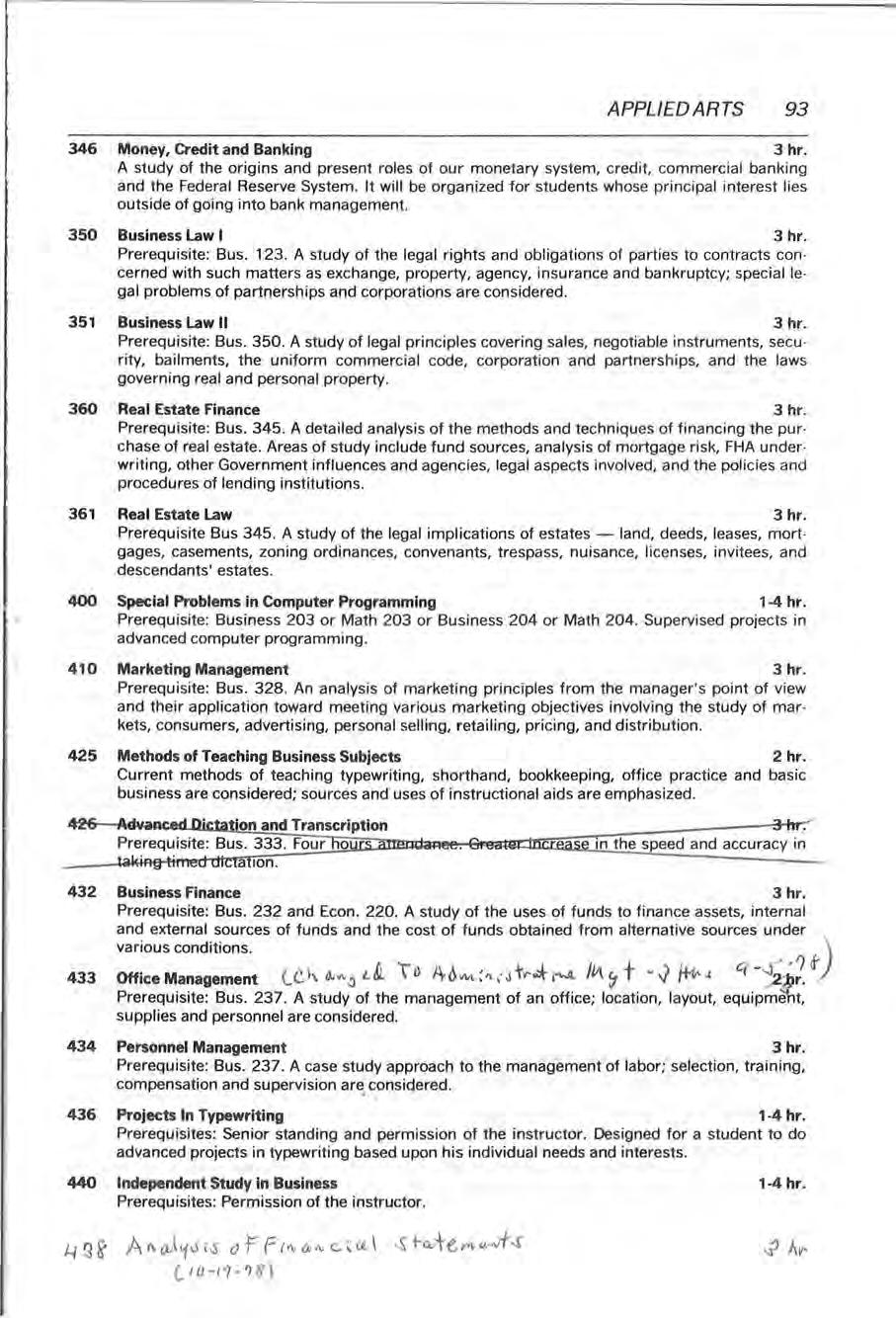
361 Real Estate Law
3 hr.
Prerequisite Bus 345 A study of the legal implications of estates - land, deeds, leases, mortgages, casements, zon in g ordinances, convenants, trespass, nuisance, licenses, invitees, and descendants' estates.
400 Special Problems in Computer Programming
1-4 hr.
Prerequisite : Business 203 or Math 203 or Business 204 or Math 204 Supervised projects in advanced computer programming .
410 Marketing Management
3 hr
Prerequisite : Bus. 328 An analysis of marketing principles from the manager ' s point of view and their application toward meeting various marketing objectives involving the study of markets, consumers, advertising, personal selling, retailing, pricing, and distribution.
425
Current methods of teaching typewriting, shorthand, bookkeeping, office practice and basic business are considered; sources and uses of instructional aids are emphasized .
ion and Transcription
Prerequisite : Bus. 333. Four o ,n the sp eed and accuracy in Business Finance
3 hr.
Prerequisite: Bus. 232 and Econ 220 A study of the uses of funds to finance assets, internal and external sources of funds and the cost of funds obtained from alternative sources under various conditions. )
Office Management (_ C.\\ "'"" j ,,&, ·r j) A-olM:", J + ... ~....,. Ill\ '1 +-.J
Prerequisite: Bus. 237 A study of the management of an office; location, layout, equipm~t, supp li es and personnel are considered
Personnel Management
3 hr.
Prerequisite : Bus. 237. A case study approach to the management of labor; selection, training, compensation and supervision ar~ ~onsidered.
Projects In Typewriting
1-4 hr.
2 hr. 432 433 434 436
Prerequisites : Senior standing and permission of the instru ctor Designed for a student to do advanced projects in typewriting based upon his individual needs and interests
Prerequisites : Permission of the instructor 1-4 hr.
APPLIED ARTS 93
Methods of Teaching Business Subjects
ff-v.-l
--£;, if
q
Independent
/.../ rl~ Ar.Cllllfo(S ()r° Pr"'(.c,"'c..,a\ -Stc.,fe,,~a,...f,.s (_ IQ•I?~ ?8J
440
Study in Business
APPLIED ARTS
441 Internship in Business
1-4 hr. On-the-job training with a business firm or industry. To be taken near the ending of formal colleg e courses by students in the areas of management, marketing, accounting, and secretarial. A student must intern in the area of his vocational career interest. One hour of college credit will be given for 115 hours of internship work. The student must attend a two hour seminar each month. Business majors only.
442 Managerial Accounting
3 hr.
Prerequisite: Bus. 232. Designed to study the uses of accounting information for managerial decisions and internal m a nagement purposes. Focus will be on cost controls, budgeting, performance evaluation, and financial information for planning and decision making.
443 Quantitative Management
3 hr.
The study of the methods of systems and management science. The co urse includes a development of analytical reasoning and logic and set concepts, as well as such topics as decision processes, linear programming, waiting lines, stochastic processes, forecasting methods, inventory co ntrol, input/output analysis, and general modeling
450 Advanced Accounting
3 hr.
Prerequisite: Bus. 338. A detailed study of accounting problems arising out of partnerships, combinations, installment sales, and the preparation of consolidated financial statements. Also included is home office and branch accounting.
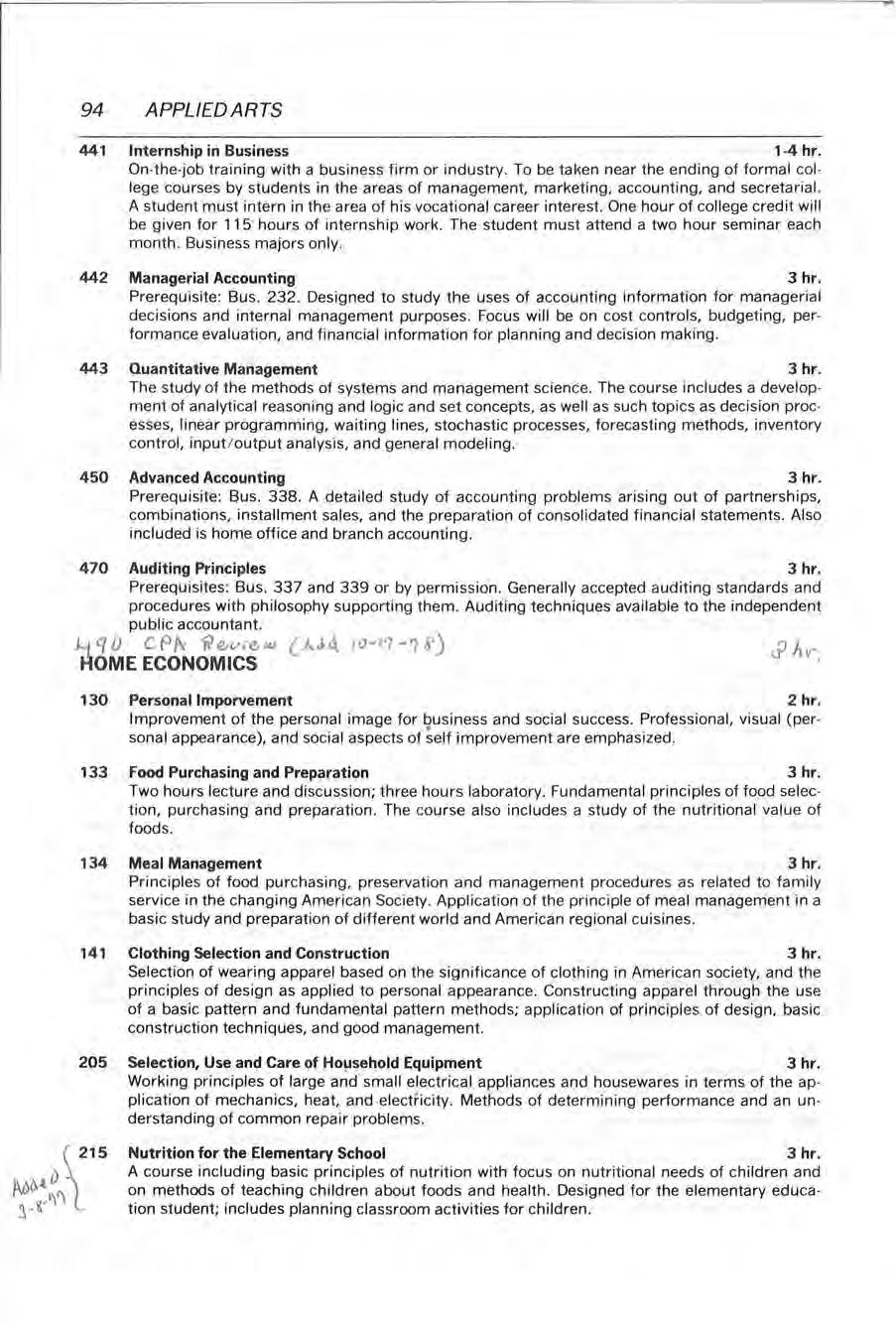
470 Auditing Principles
3 hr.
Prerequisites : Bus. 337 and 339 or by permission. Generally accepted auditing standards and procedures with philosophy supporting them Auditing techniques available to the independent public accountant.
ECONOMICS
2 hr.
Improvement of the personal image for business and social success. Profession al, visual (personal appearance), and social aspects of ; elf improvement are emphasized. Food Purchasing and Preparation
3 hr.
Two hours lecture and discussion; three hours laboratory. Fundamental principles of food selection, purchasing and preparation. The co urse also include s a study of the nutritional value of foods.
Meal Management
3 hr .
Principles of food purchasing, pres ervation and management procedures as related to family service in the changing American Society. Application of the principle of meal management in a basic study and preparation of different world and American regional c uisines.
Clothing Selection and Construction
3 hr.
Selection of wearing apparel based on the significance of clothing in American society, and the principles of design as applied to personal appearance. Constructing apparel through the use of a basic pattern and fundamental pattern methods; application of principles of design, basic construction techniques, and good management.
Selection, Use and Care of Ho11sehold Equipment
3 hr. Working principles of large and · small electrical appliances and housewares in terms of the application of mechanics, heat, and -electricity. Methods of determining performance and an understanding of common repair problems
Nutrition for the Elementary School
3 hr.
A course including basic principles of nutrition with focus on nutritional needs of children and on methods of teaching children about foods and health. Designed for the elementary education student; includes planning classroom activities for children.
94
J--i q D C(l/1( °j\)e,v,e,w (AJ£\. { 0- 1'] -')&') (? Av-, HOME
133 134 141 205
130
Personal lmporvement
n2 Hoo~~
3~
Social, physical, aesthetic and econom ic aspects of housing as it concerns the family during stages of the family life cycle. Principles of buying, building or remodeling to meet family needs.
302 Child Development
3 hr.
Scope of course covers from prenatal through preschool ages. Course content include s a four week preschool laboratory.
310 Methods and Media in Home Economics Demonstration
2 hr .
Prerequisites: H.Ec. 133 and 141. Selection and applicat ion of methods and media for use in presentation of programs in home econom ics by the teacher, home economics agent and commercial demonstrator.
321 Human Relationships
Readings in current literature on human relationships.
322 Home Furnishings
1-3 hr
3 hr.
The se lect ion, arrangement and care of furnishings from the standpo int of comfort, beauty, economy and family needs. Includes laboratory experience in furniture refinishing.
332 Nutrition
3 hr.
Fundamental principles of human nutrition, it s development through research as related to the needs of individuals accord ing to their age, sex, and occupation. Course requirements include readings in latest developments of nutrition.
333 Textiles
3 hr.
A study of fabric construction, yarn s, fibers and finishes as they affect the se lection, use and care of fabrics for c lothing and for the home.
334 Tailoring
3 hr.
A course designed to meet the student's need for the more difficult construct ion problems which are encountered in tailoring.
400 Special Problems in Home Economics
1, 2 or 3 hr. Special research or study as needed by the individual. Home Economics majors only.
410 The Consumer in American Society
3 hr. Study of the economic problems and responsibilities of consumers. Basic definitions and analyses of economics judged to be helpful in the activities of consumer or household buying.
421 Home Management
3 hr.
Emphasis on present day decisions and management problems of families. Application of management techniques for household activities and family living
INDUSTRIAL ARTS
121 Technical Drawing I
3 hr.
A course concerned with the fundamentals of graphic language. The course includes proper use and care of instruments, geometric construction, letter ing, sketching and shape description, multi-view projection, sectional views and auxiliary views.
123 Woodworking Technology I
The development of basic skills in t~e _ use of both hand tools and woodworking machines.
124 Woodworking Technology II
Prerequisite: I.A 123. Advanced techniques and instruction in industrial wood processes
132 Metals Technology I
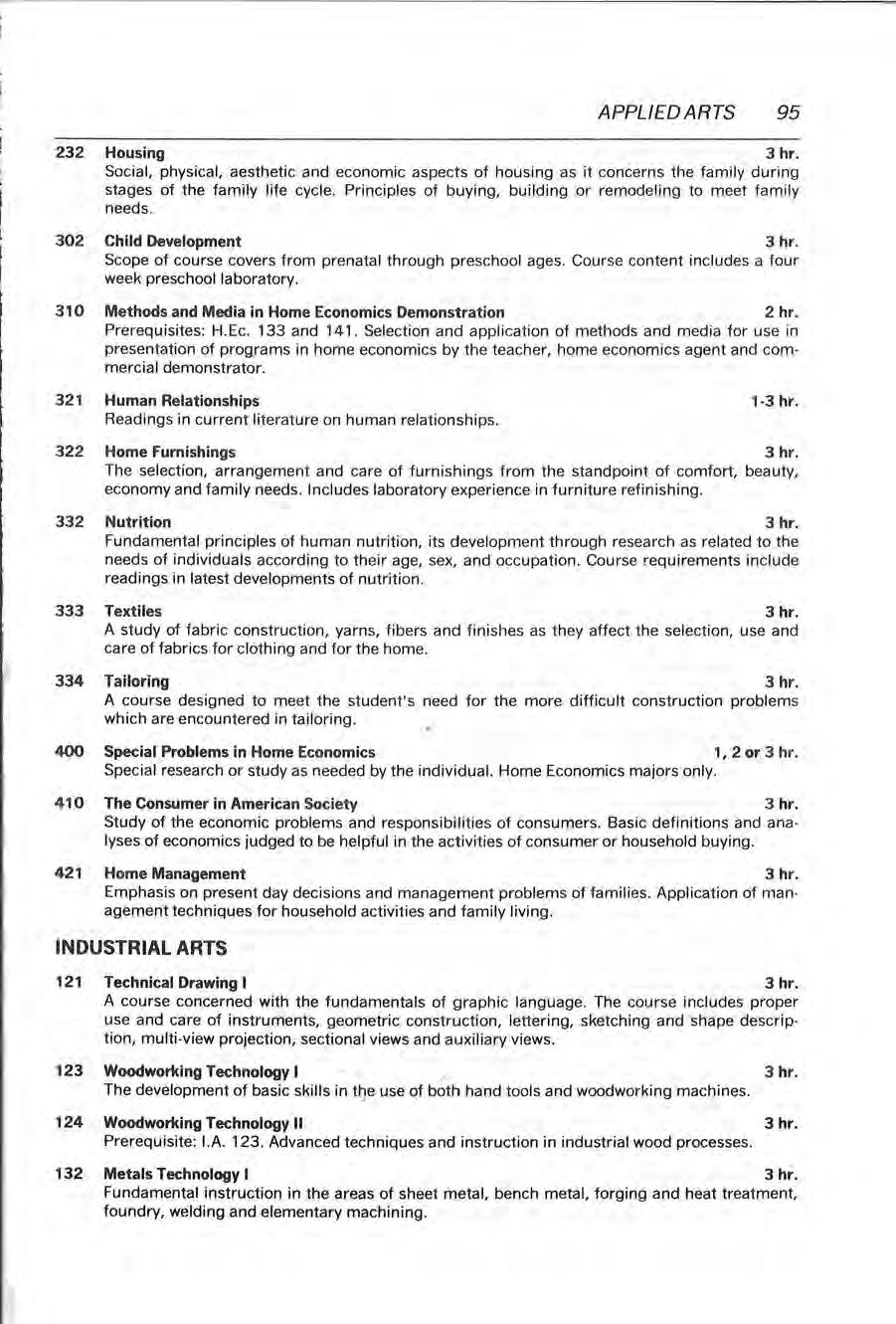
3 hr.
3 hr.
3 hr.
Fundamental instruction in the areas of sheet metal, bench metal, forging and heat treatment, foundry , welding and elementary machining
APPLIEDARTS 95
APPLIED ARTS
222 Technical Drawing II
3 hr .
The course includes shop processes, dimensioning, threads and fasteners, design and working drawings, axonmetric projection, oblique projection, perspective projection, intersections and developments, gearing and cams, welding representation, graphs and the use of drafting machines.
226 Photography I
2 -3 hr.
Theory and practice in the basic fundamentals of photography including composition, exposure, lighting, developing, contact printing and enlarging. The third hour credit gained by additional assignments Each student must have a camera.
231 Industrial Crafts I
3 hr.
Open to all students. Basic experiences in working with a variety of craft media; including plastics, art metal, ceramics, and leather.
232 Leatherwork
Experiences in the tooling, carving, and fabrication of leather.
233 Electrical Technology I
2 hr.
3 hr.
Basic theory, principles, and applications of electricity in industry and the home. Areas of instruction include the production of electricity, magnetism, theory and basic circuits, residential wiring, motors and generators , automotive electricity, appliance repair, electro-chemistry
237 Graphic Arts
3 hr.
Study and practice in basic processes of printing and allied industries, including work in letterpress, silkscreen printing, bookbinding, rubberstamp making and goldleaf stamping Also beneficial for those interested in journalism.
3 18 Finishing Technology
3 hr.
Instruction in surface preparation, materials, and finishing applications and processes Primary concentration on wood finishing. Refinishing, airbrush work, and spot finishing will also be studied.
320 Motor and Appliance Repair and Servici ng
3 hr.
Prerequisite : I.A. 233 Study and practice in techniques of testing, trouble shooting, repairing , and maintaining electrical motors and appliances.
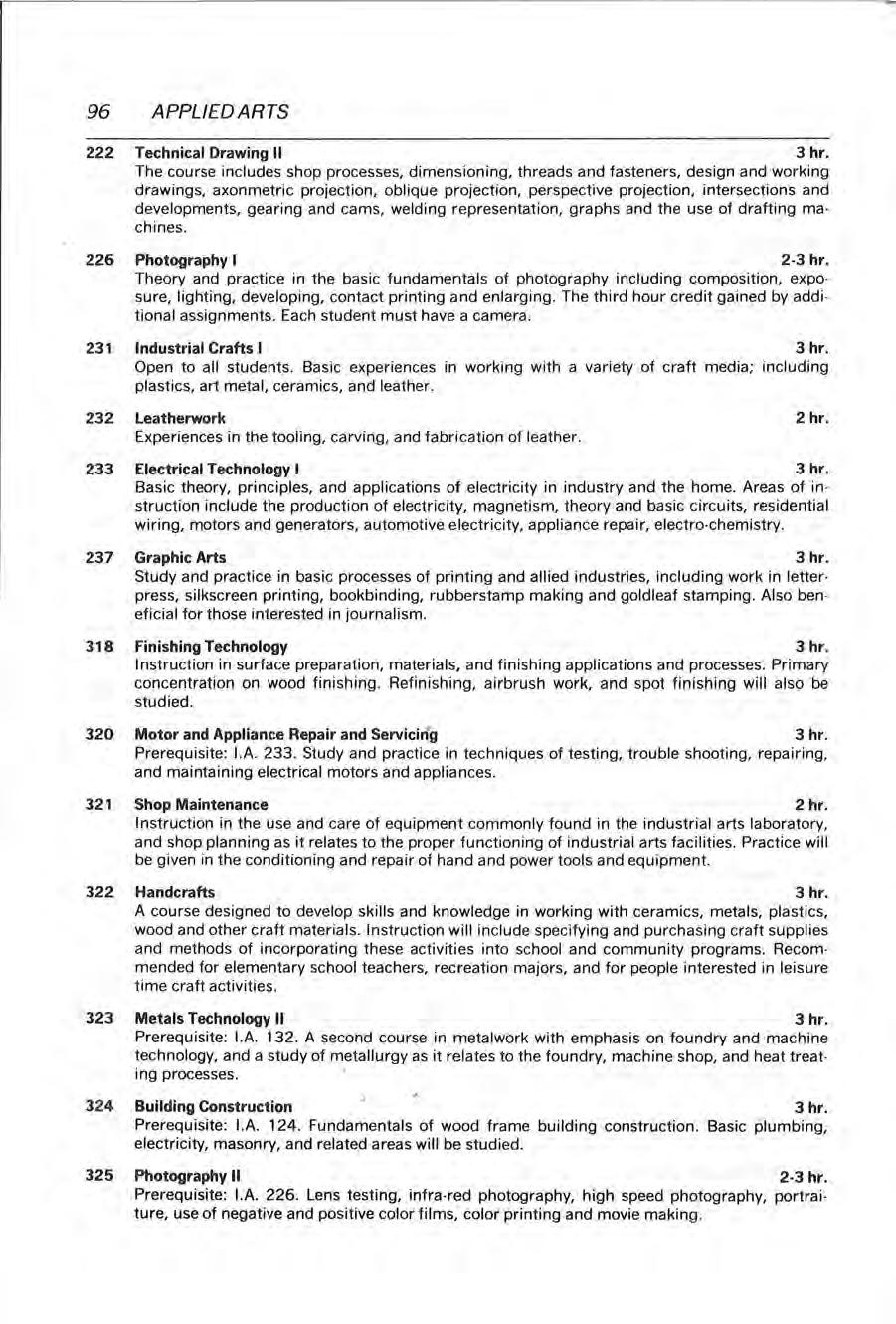
321 Shop Maintenance
2 hr.
Instruction in the use and care of equipment commonly found in the industrial arts laboratory, and shop planning as it relates to the proper functioning of industrial arts facilities. Practice will be given in the conditioning and repair of hand and power tools and equipment.
322 Handcrafts
3 hr.
A course designed to develop skills and knowledge in working with ceramics, metals, plastics, wood and other craft materials. Instruction will include specifying and purchasing craft supplies and methods of incorporating these activities into school and community programs Recommended for elementary school teachers, recreation majors, and for people interested in leisure time craft activities
323 Metals Technology II
3 hr.
Prerequisite: I.A 132 A second course in metalwork with emphasis on foundry and machine technology, and a study of metallurgy as it relates to the foundry, machine shop, and heat treating processes · ·
3 2 4 Building Construction
3 hr.
Prerequisite: I.A 124. Fundamentals of wood frame building construction Basic plumbing, electricity, masonry, and related areas will be studied.
3 25 Photography II
2 -3 hr.
Prerequi•site: I.A. 226. Lens testing, infra-red photography, high speed photography, portraiture, use of negative and positive color films, color printing and movie making.
96
326 Upholstery
APPLIEDARTS 97
3 hr.
Prerequisite: I.A 124 or by special permission. Designed to give experience in and information about various methods of construction in upholstery both with and without use of springs.
327 Furniture Making
Prerequisite: I.A. 123. The design and construction of a contemporary piece of furniture.
328 Electrical Technology II
3 hr.
3 hr.
Prerequisite: I.A. 233 or by special permission. A study of the principles of application of electronics and their applications in circuits, test equipment, vacuum tubes, transistors, radio and television.
329 Plastics Technology
3 hr.
Prerequisite: I.A. 231 or by special permission. A study of the industrial utilization, manufacture, and processing of plastics. Instruction and practice in tooling, thermo forming, casting, coating, and molding with plastics.
330 Industrial Arts Design
2 hr.
A study of the principles of design as applied to problems of construction. Drawing and sketching of projects for the major areas of Industrial Arts Also, the study of current furniture styles.
331 Welding
3 hr.
Prerequisite: I.A. 132 or by special permission. Instruction and practice in the use of electric welding machines and the o xyacetylene torch in welding and cutting.
3 hr.
The study of the sources of power and of the machines used in its development with emphasis upon the internal combustion engine. Small
3 hr .
Instruction in caring for and repairing engines commonly used on boats, motorcycles, snowmobiles, and lawn and garden equipment.
Automotive Maintenance and Tune-up
3 hr .
A course in which students will gain technical information, analyze automotive functional problems and make necessary adjustments and repairs to maintain economic operation of the automobile.
Survival Preparedness
A study of facts related to surviral in time of local, state or national disaster .S<1,f.c,\.'1.
Driver Education and Traffic SttNly I
1 hr.
3 hr .
Prerequisite: Twenty thousand miles or two years of driving experience free of repeated chargeable accidents and moving violations This course will include presentation of materials and methods of traffic safety and driver training with emphasis upon attitude, development, organization and administration, driving regulations and safe motor car operation.
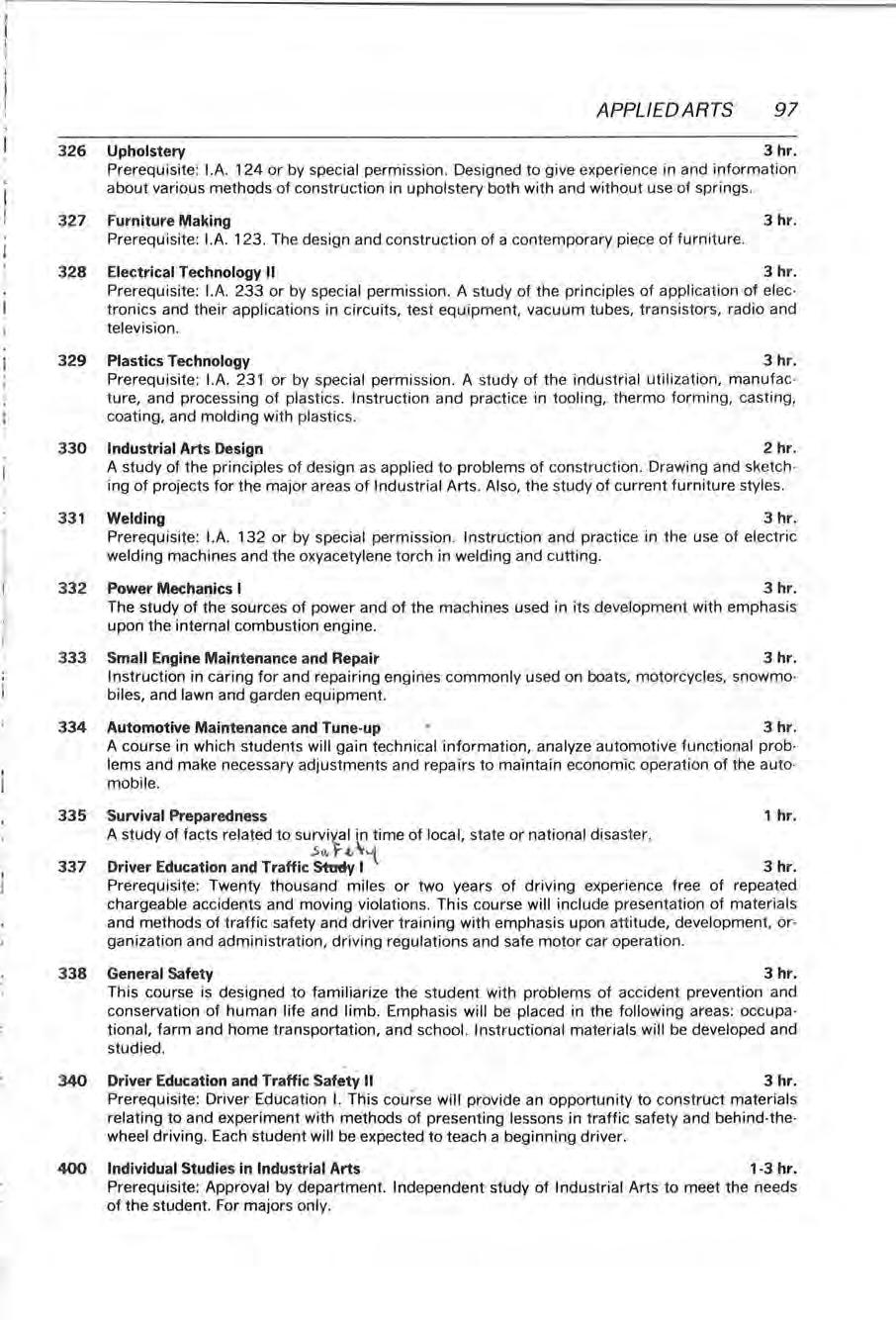
General Safety
3 hr.
This course is designed to familiarize the student with problems of accident prevention and conservation of human life and limb. Emphasis will be placed in the following areas: occupational, farm and home transportation, and school. Instructional materials will be developed and studied.
Driver Education and Traffic Safety II
3 hr.
Prerequisite: Driver Education I. Ttiis cou r se will provide an opportunity to construct materials relating to and experiment with methods of presenting lessons in traffic safety and behind-thewheel driving Each student will be expected to teach a beginning driver.
Individual Studies in Industrial Arts
1-3 hr.
Prerequisite: Approval by department. Independent study of Industrial Arts to meet the needs of the student. For majors only.
332 Power Mechanics I
333 334 335 337 338 340 400
Engine Maintenance and
Repair
APPLIED ARTS
401 Career Education
3 hr.
A stud y providing st ud en t s from K- 12 the direction to acq uire the sk ill s which will all ow him to make a live lih ood for him se lf and for his future family, no matter at which step of the lad der of th e educat iona l system he leaves.
405 Electrical Technology Ill
3 hr.
Prerequisite: I.A. 328. A study of so lid state dev ices a nd electron ic circ uit s in commun ication and in d ustr ia l app li cat ion s
407 Machine Shop Technology
3 hr.
Prerequisite: I.A 323. An advanced course in machine tool t heory a nd practic e. Emph asis on operation of eng in e lathe, m ill ing machines, drill presses, shapers , gear hobbing mach ine s, saws, and gr inders.
425 Industrial Arts Methods and Observation
2 hr. The course w ill emphasize teaching methods and a id s, course co n struct ion, testing, shop d i scipline, grading, safety and ot her problems pert in ent to the teaching of the in d u str ia l arts
427 Architectural Drawing
3 hr.
Prerequisite: I.A. 222. The principles of plan nin g a dwelling to fit modern needs. Drawings wi ll inc lude a plot plan, floor plan , four e levations, sect ion s and details. Spec ifi cat ions will be determ in ed by the student for the dwe ll ing.
428G The World of Construction
3 hr .
The co urse is designed to deve lop an understand in g of t he goa l s and techniques of IACP instructi on. Methods of co nducting learning act ivit ies through ro le playing, gro up act iviti es, a nd simul at ion games will be emphas ized as they re late to t he prob lems invo lved in construction on a site.
A study of t he Ind ustr ial Art s Curricu lum Pro j ect World of Construction
429G The World of Manufacture
3 hr.
The cou r se is designed to develop an understanding of tl;ie goals and techniques of IACP in str uction. Methods of conducting learn in g activ ities through ro le playing, group activit ies, and simulation games will be emph asized as they relate to the problems involved in manufacturing products in a plant.
A study of the Industrial Arts Curricu lum , Project World of Manufacturing
431 Welding II
3 hr.
Prerequisite: I.A. 331. An advanced course in welding with e mphasi s on shielded metal arc , m eta l in ert gas, t un gsten in ert gas and other modern welding techniques.
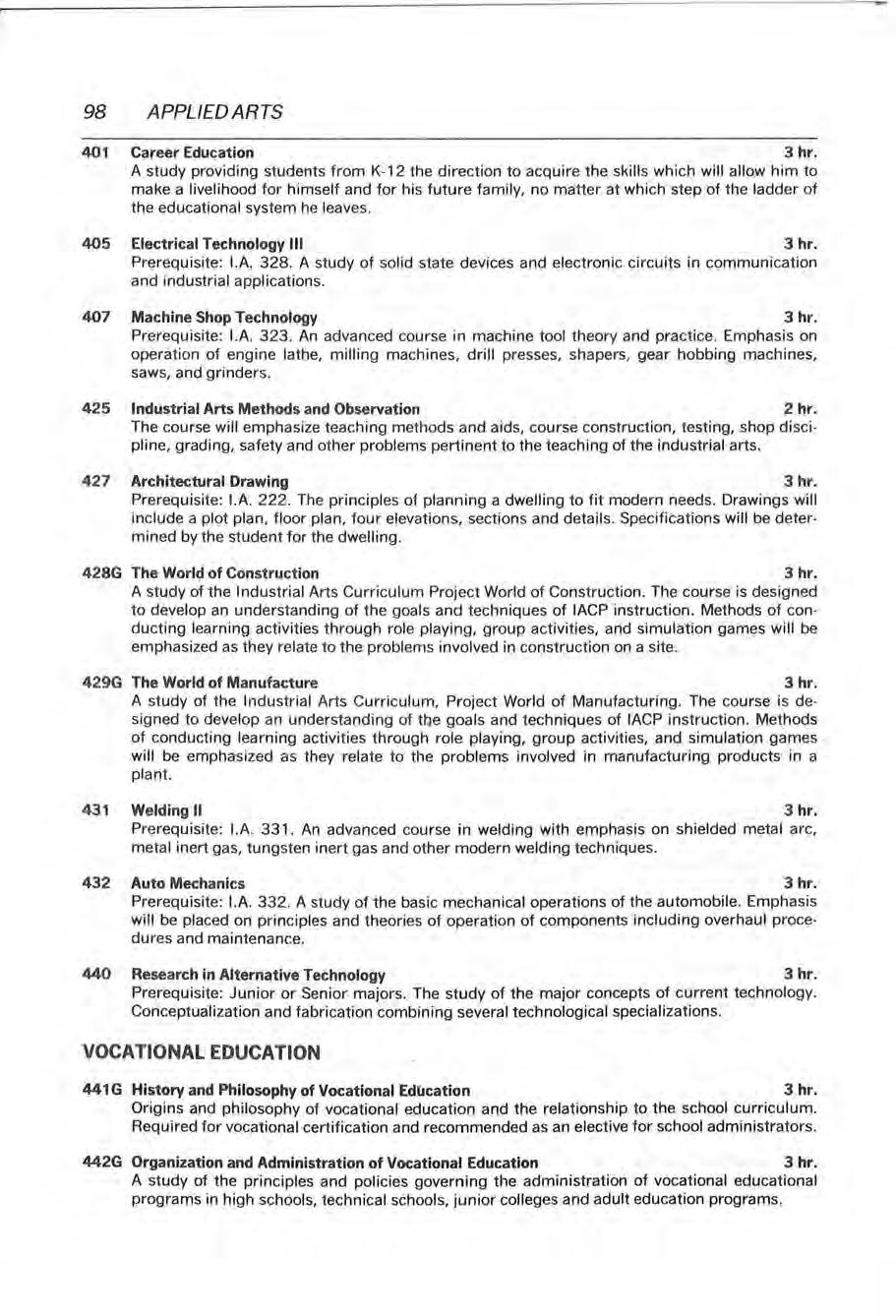
432 Auto Mechanics
3 hr.
Prerequisite : I.A. 332. A study of the basic mec hani ca l operations of the automob il e. Emphasis will be placed on pr in c ipl es and theories of operation of co mpon ents inc ludin g overhaul procedures and maintena nce .
440 Research in Alternative Technology
3 hr
Prerequisite: Junior or Sen ior majors. The study of the major co ncepts of c urrent technology Conceptualization and fabrication combining several technological specializations.
VOCATIONAL EDUCATION
441 G History and Philosophy of Vocationa l Education
3 hr .
Origins and philosophy of vo catio nal education and the relationship to the sc hool curriculum. Required for vocational certif icat ion and recommended as an e lect ive for sc hool administrators .
442G Organization and Administration of Vocat ional Education
3 hr.
A stud y of the principles and policies governing the adm inistrat ion of vocat ional educational programs in high schools, technical schools, junior colleges and adult education program s.
98
443G Coordination Techniques in Vocational Education Programs
3 hr.
Analysis of Vocational Cooperative Programs and their re lationsh ip to the high school, junior college, and adult vocational programs. Emphasis on the organization and supervision of cooperative programs, duties and responsibilities of the coordinator, selection and placement of students, and eva lu ation of students, training stations and the cooperative program.
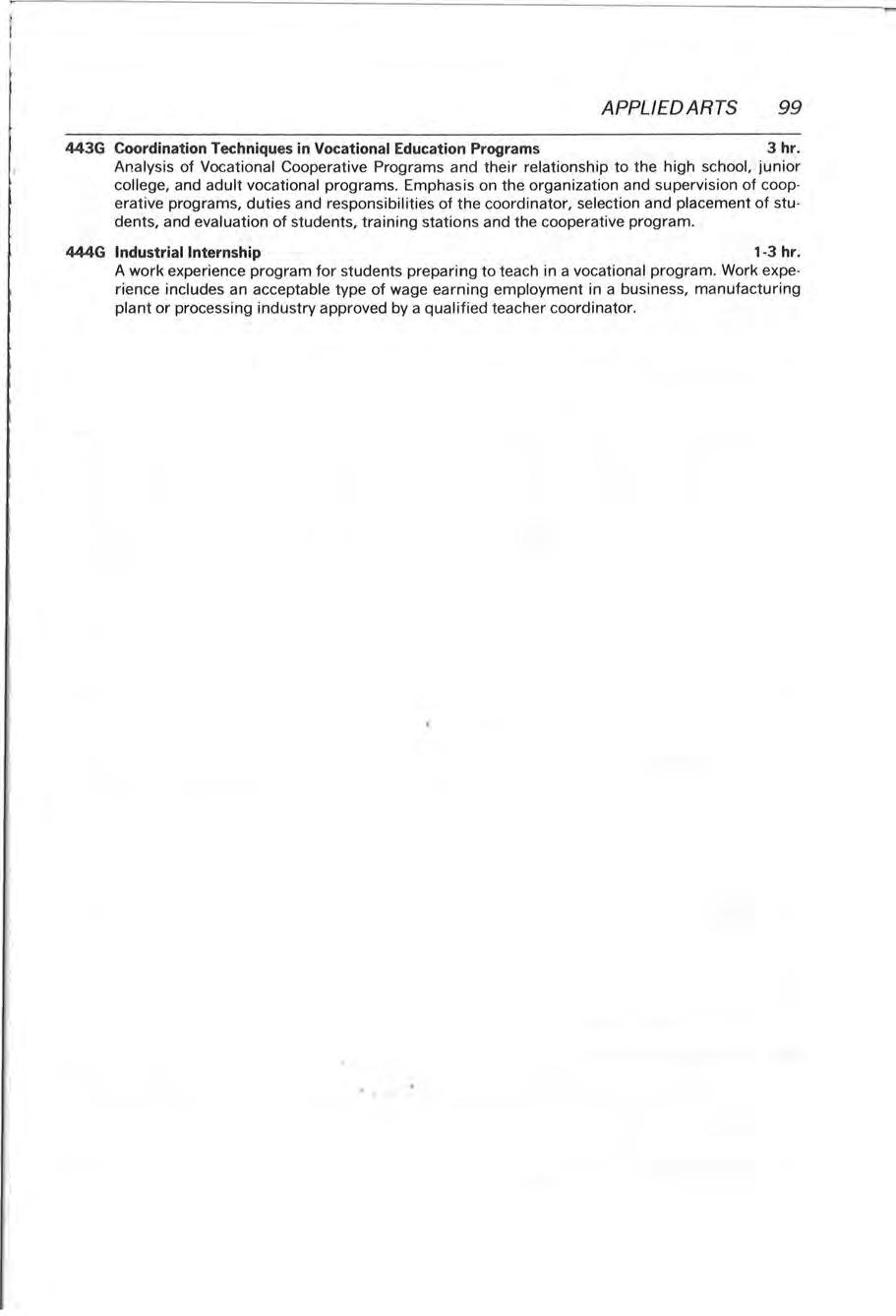
444G Industrial Internship
1-3 hr.
A work experience program for students preparing to teach in a vocationa l program. Work experience includes an acceptable type of wage earning employment in a business, manufacturing plant or processing industry approved by a qua li fied teacher coordinator.
APPLIEDARTS 99
Division of Education
201 Fundamentals of Teaching
3 hr.
Basic psychological and instructional principles of teaching a nd their application. Content includes identifying and specifying goals / objectives; teaching of concepts and skil!s; giving directions; use of basic AV equipment and materials; basic motivational and reforcement techniqu es; microteaching
300 Models of Teaching
3 hr.
Practice and application of the basic models of teaching such as synectics, inquiry training, etc.
302 The Disadvantaged Child
3 hr.
Prerequisites: Psych. 121 and 301. An interdisciplinary seminar designed to interpret the influences of culture in regard to the institution of family, school, government, and religion.
304 Child, School and Family Relationships
3 hr.
A study of the relationships between the individual in the school and family, the art of living cooperatively with other s and the responsibility of each person in the school and home in the development of satisfactory relationships.
305 Principles of Early Childhood Education
3 hr.
Prerequisite: Psych. 300. Theory and practice of early c hildhood education in the nursery school and primary grades. The course deals with curriculum, program planning , use of materials and equipment, role of teacher, techniques of classroom management, and meeting the ne eds of individual children in the group situation.
307 Practicum
Approval. Laboratory based experiences with teaching and nonteaching responsibilities.
310 Kindergarten Education
1-8 hr.
3 hr.
Prerequisites: Psych 121 and 300. Mod ern methods and study of materials that are used in the kindergarten program
334 Teaching Reading
3 hr.
Prerequisite: Approval of Instructor A study of current methods of teaching developmental reading, study of reading materials and their uses, evaluating reading progress, and relating deve lopmental reading to an understanding of children.
335 Problems in Reading Seminar
3 hr.
A seminar designed to give a mutual understanding of the problems in reading, grades 1 to 12 inclusive.
336 Diagnostic and Remedial Reading
3 hr.
Prerequisite: 15 hours professional education or instructor' s permission. Techniques of recognizing and classifying reading problems.
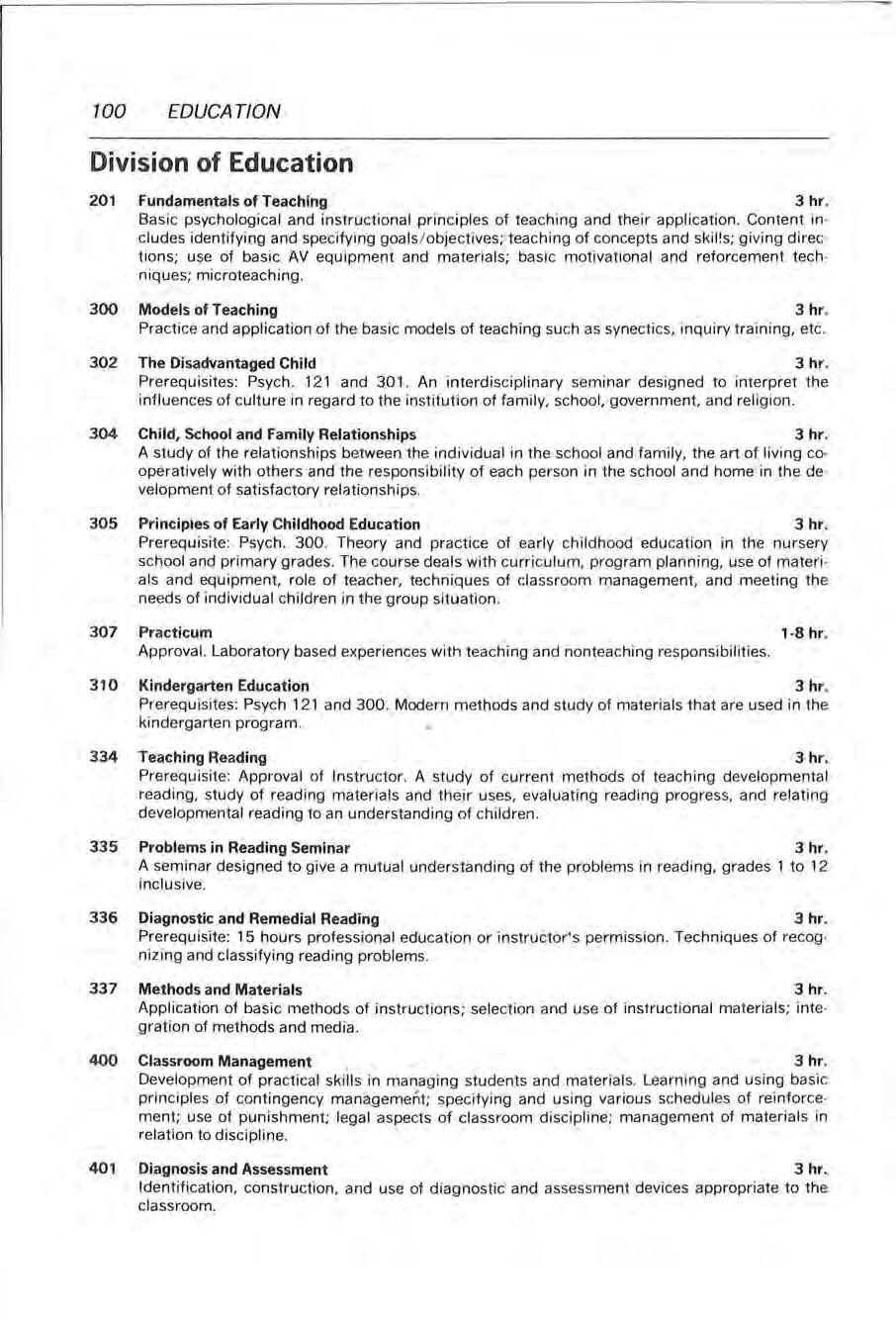
337 Methods and Mater ials
3 hr.
Application of basic methods of instructions; selection and use of instructional materials; integration of methods and media.
400 Classroom Management ,
3 hr.
Development of practical skills in managing students and materials. Learning and using basic principles of contingency manageme nt; specif ying and using various schedules of reinforcement; u se of punishment; legal aspects of classroom discipline; management of materials in relation to discipline.
401 Diagnosis and Assessment
3 hr.
Identification, construction, and use of diagnostic and assessment devices appropriate to the classroom.
100
£DUCA TION
405 Teaching in the Elementary School
EDUCATION 101
8 hr.
Prerequisite: Approval for professional semester. Students will have an opportunity to consider approaches to in struction including most subjects commonly taught in the elementary school and participation in the clinical teaching laboratory.
409 Synthesis of Teaching Competencies
2 hr.
An individualized approach in which each student must demonstrate that he is prepared to stu• dent teach Appropriate activities will be planned by the student and by the faculty team.
410 Student Teaching (Elementary)
4 hr., 8 hr.
Prerequisite: Psych 121, 201, and 401; Educ. 300 and 405. A practical application of principles of learning in the classroom. Progressive induction into full teaching responsibility at the elementary level. Students teach full-time for nine weeks. Application for student teaching mu st be made at the end of the junior year.
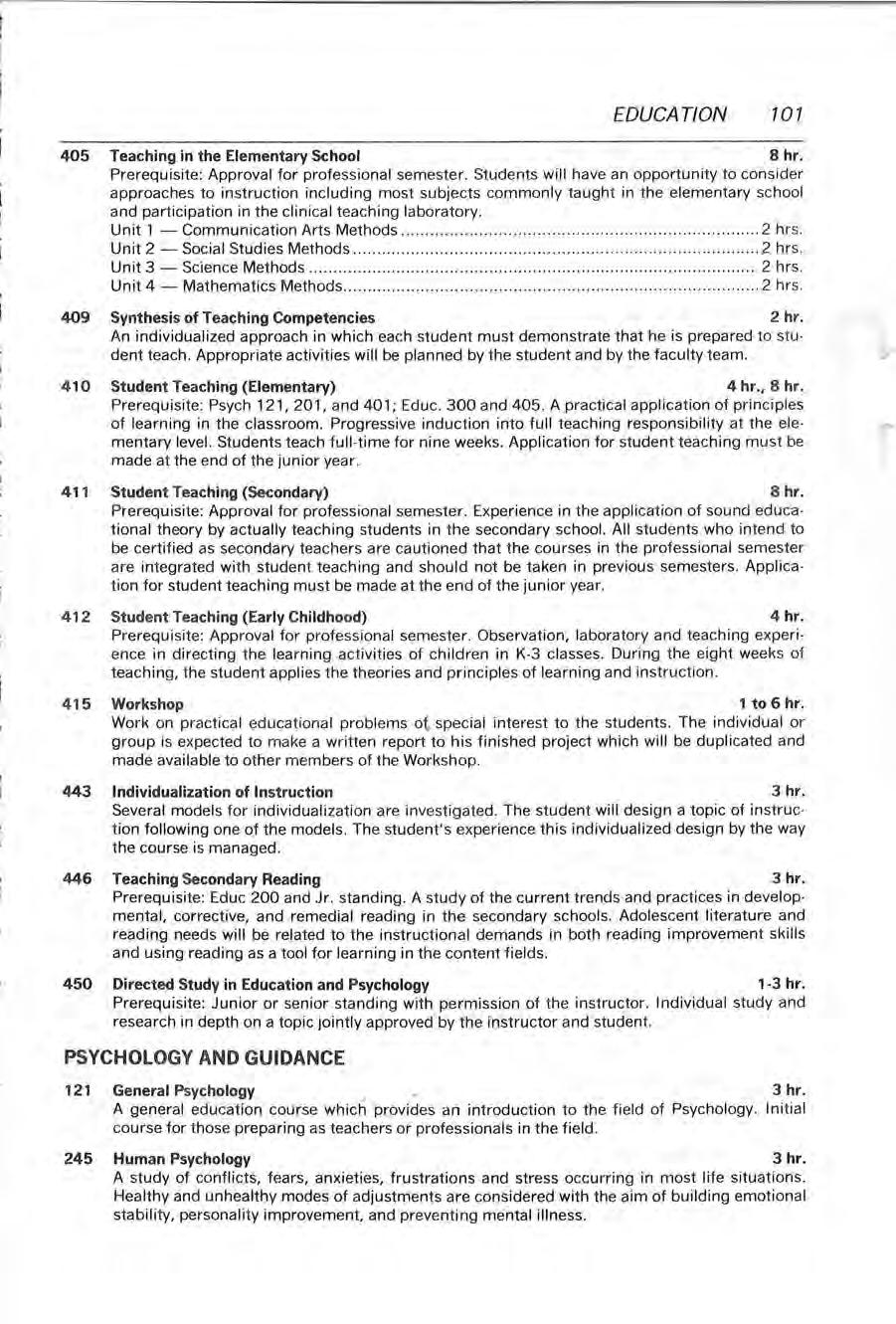
411 Student Teaching (Secondary)
8 hr.
Prerequisite: Approval for professional se me ster Experience in the application of sound educational theory by actually teaching students in the seco ndary school. All students who intend to be certified as secondary teachers are cautioned that the courses in the professional semester are integrated with student teaching and should not be taken in previous semesters. Application for student teaching must be made at the end of the junior year.
412 Student Teaching (Early Childhood)
4 hr.
Prerequisite: Approval for professional semester. Observation, laboratory and teaching experie nce in directing the learning act ivities of children in K·3 classes. During the e ight we eks of teaching, the student applies the theories and principles of learning and instruction
415 Workshop
1 to 6 hr.
Work on practical educationa l problems ot, special intere st to the students. The individual or group is expected to make a written report to his finished project which will be duplicated and made available to other members of the Workshop.
443 Individualization of Instruction
3 hr.
Several models for individualization are invest igated. The student will design a topic of instruc • tion following one of the models. The student' s expe rience this individualized design by the way the course is managed.
446 Teaching Secondary Reading 3 hr.
Prerequisite: Educ 200 and Jr. standing. A study of the current trends and practices in develop• mental, corrective, and remedial reading in the secondary schools. Adolescent literature and reading needs will be related to the instructional demands in both reading improvement skills and using reading as a tool for learning in the content fields.
450 Directed Study in Education and Psychology
1-3 hr.
Prerequisite: Junior or senior standing with permission of the instructor. Individual study and research in depth on a topic jointly approved by the instructor and student.
PSYCHOLOGY AND GUIDANCE
121 General Psychology
3 hr.
A general ed ucation course which provides an introduction to the field of Psychology. Initial course for those preparing as teachers or professionals in the field.
245 Human Psychology
3 hr.
A study of conflicts, fears, anxieties, frustrations and stress occurring in most life situations. Healthy and unhealthy modes of adjustments are considered with the aim of building emotional stability, personality improvement, and prev e nting mental illness.
Unit 1
Communication Arts Methods
Unit
- Social Studies Methods 2 hr
Unit 3 - Science Methods 2
Unit 4 - Mathematics Methods
-
2 hr s.
2
s.
hrs.
2 hrs.
£DUCA TION
250 Developmental Psychology
3 hr.
A presentation of an analysis of behavioral development a nd changes occurri ng during the life spa n from birth through ado lescence.
304 Experimental Psychology
3 hr.
Prerequisites: Psy 121, Math 340. Lectures, demonstrations, and experiences designed to ass ist the stud ent in the comprehensio n and use of experimenta l methods, basic statistica l analys es , and experimenta l literature.
305 Social Psychology
3 hr.
Prerequisite: Soc. 201 Analysis of processes involved in the interaction between person and group, including dynamics of group influ ence on personal behavior and the impact of personal variab les on the fu nctioning of primary and secondary groups in the contemporary society.
3~
Prerequisites: Psy 121. Evaluation of current theories in terms of their success in accounting for the observed phenomena of comp lex learning; the problems of integrating learning theory into a systematic theory of behavior
431 Psychological Tests and Measurements
3 hr.
Prerequisite: Psy 121 . Construction and character isti cs of tests and measurement scales; survey of individual and group tests in psychological, eductional and c linical setti ngs
437 Techniques of Counseling
3 hr .
Prerequisites: Psyc h 121 and 300. Various techn iqu es of counse lin g and experience in using these techniques
440 Behavior Modification
A study of the basic principles of and practical experiences in behavior modification.
SPECIAL EDUCATION
200 Introduction to Special Education - Elen'ientary
3 hr
3 hr.
Introduction to the field of specia l education. The course will cover curricu lum materials and techniques useable for preventive and remedical instruction.
240 Introduction to EMH/MR
3 hr.
Prerequisites: Spec. Ed 200. A survey course of the characteristics, abilities and needs; the psychological, env ironm enta l and cu ltu ra l factors which contribute toward retardation. Appropriate teaching materials and techniques are taught.
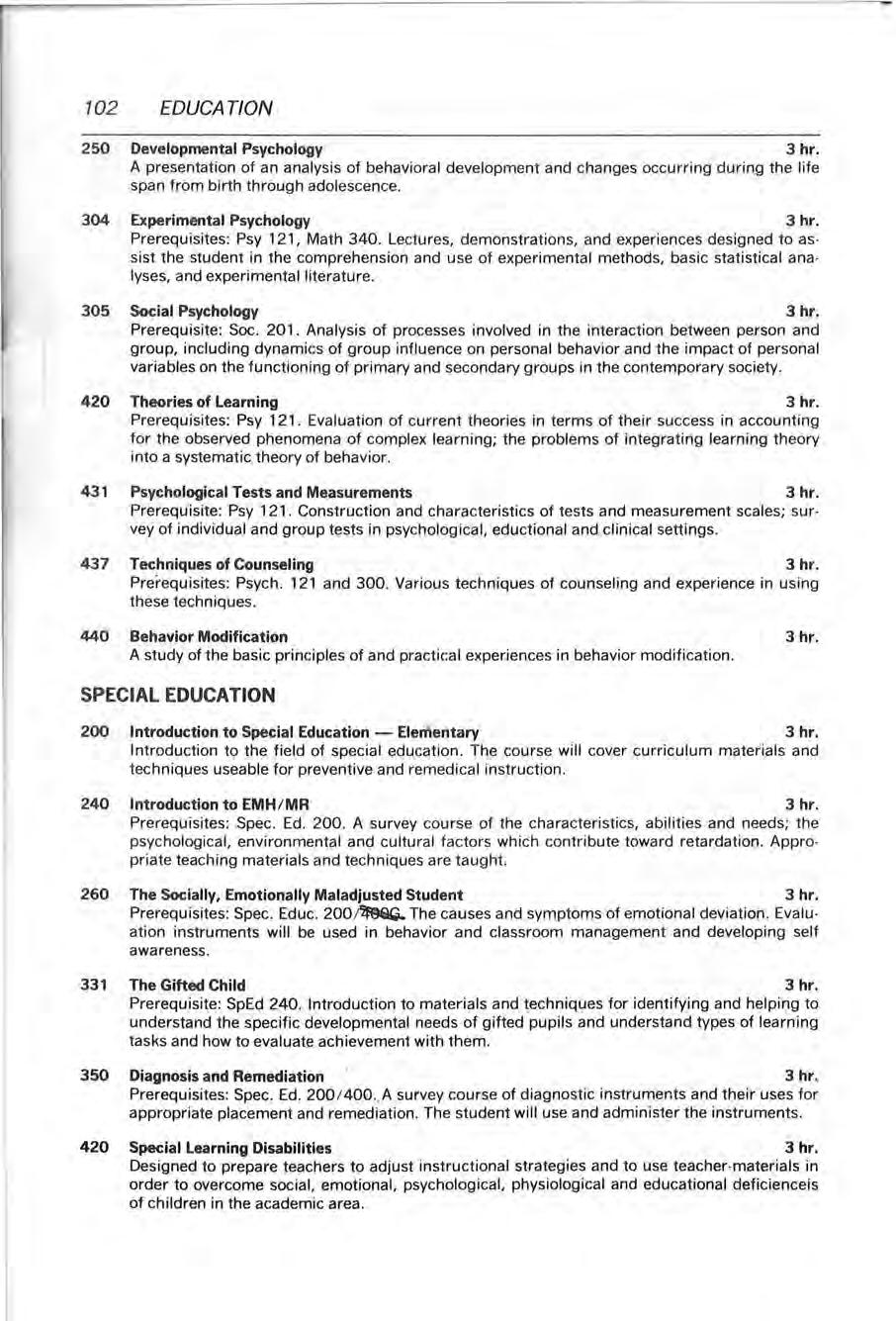
260 The Socially, Emotionally Maladjusted Student
3 hr.
Prerequisites: Spec. Educ. 200~ The causes and symptoms of emotiona l deviation. Evaluation instruments will be used in behavior and classroom management and developing se lf awareness
331 The Gifted Child
3 hr.
Prerequisite: SpEd 240. Introduction to materials and techniques for identifying and helping to understand the specific developmental needs of gifted pupils and understand types of learning tasks and how to eva luate achievement with them.
350 Diagnosis and Remediation
3 hr.
Prerequisites: Spec . Ed. 200 / 400 .. A survey course of diagnostic in struments and their uses for appropriate placement and remediation. The student will use and adm ini ster the instruments.
420 Special Leaming Disabilities
3 hr. Designed to prepare teachers to adjust instructional strategies and to use teacher-materials in order to overcome social, emotional, psychological, physiological and educationa l deficienceis of children in the academic area.
102
~o
423 Methods and Materials in Special Education
EDUCATION 103
3 hr.
Prerequisite: Sp Ed 240. A course in developing appropriate materials in the major area of academic study. Emphasis will be on developing knowledge, skills and techniques for successfully teaching in the special education classroom.
435 Student Teaching (Exceptional Children)
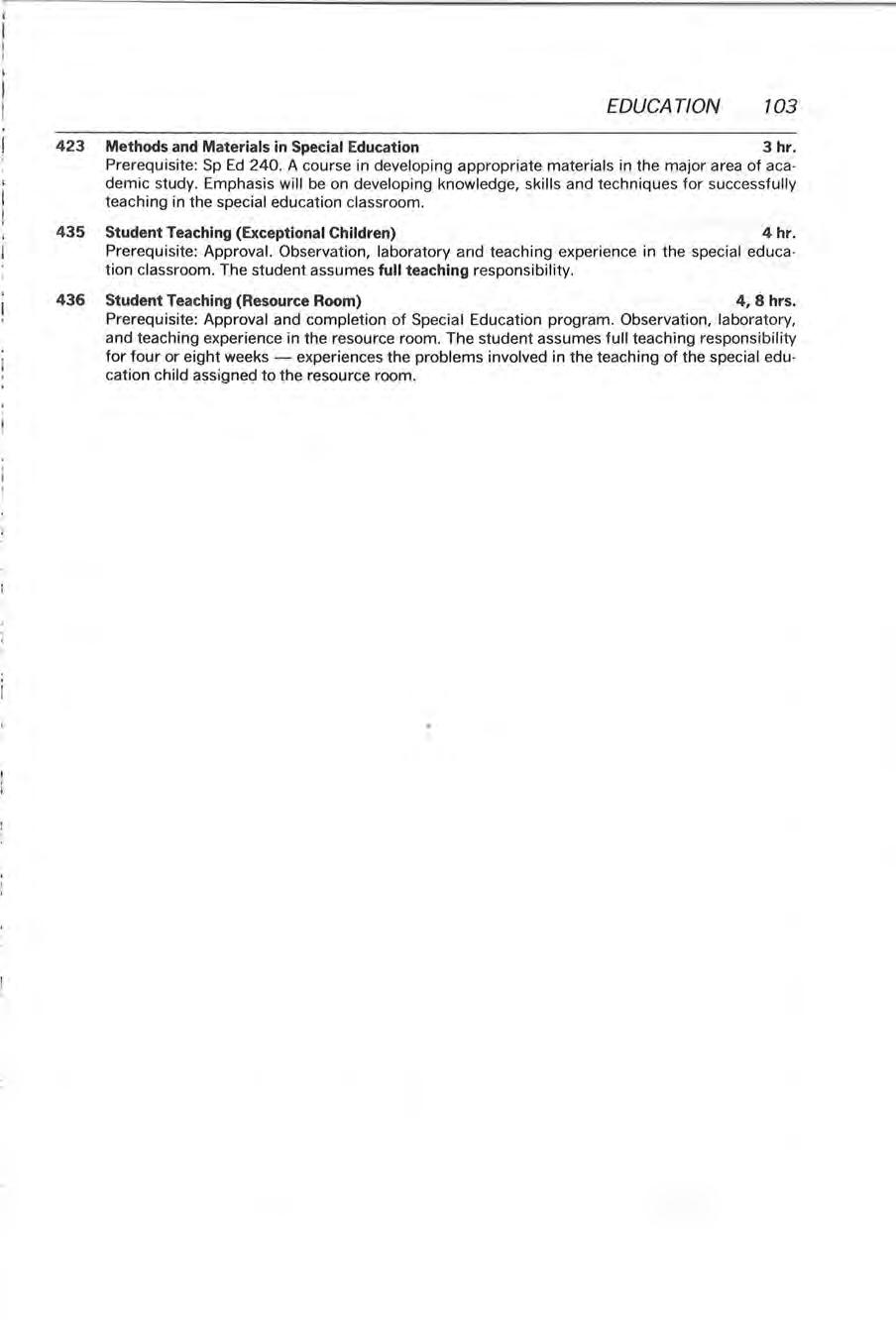
4 hr.
Prerequisite: Approval. Observation, laboratory and teaching experience in the special education classroom. The student assumes full teaching responsibility.
436 Student Teaching (Resource Room)
4, 8 hrs.
Prerequisite: Approval and completion of Special Education program Observation, laboratory, and teaching experience in the resource room. The student assumes full teaching responsibility for four or eight weeks - experiences the problems involved in the teaching of the special education child assigned to the resource room.
Division of Humanities
LANGUAGE ARTS
ENGLISH
101 English Composition
3 hr .
A study of the principles of clear and effective expression as applied to the sentence, paragraph, and the whole composition. A review of grammar, mechanics, and correct usage. Training in organization, and the writing of short and long papers. Required course for all freshmen. (Note: Students who rank at the 85th percentile or higher on the English portion of the ACT may be excused from Eng. 101.)
202 Appreciation of Literature
3 hr.
General education requirement designed to increase the student's appreciation with emphasis on modern forms.
203 Children's Literature
A survey of children's literature tracing the history from earliest times to modern literature.
208 Advanced Writing

3 hr.
2 hr.
Special project for third hour Study of description, narration, exposition, and poetry as rhetorical forms with extensive practice in writing .
222 The Hellenic -Hebraic Tradition
3 hr.
Prerequisite: English 202. An introduction to the roots of English Literature in Greek, Roman, and Hebrew literature.
225 Short Story
2 hr. Major emphasis on the development of th e short story in America.
301 Traditional Grammar
2 hr. Designed to provide students with a sound and comprehensive knowledge of traditional grammar: nomenclature, punctuation, sentence, and analy sis .
302 English Composition
3 hr.
Prerequisite: Eng. 101 and junior standing. Further training in theme writing, with emphasis on organization and research, practice in the use of logic, and evidence to support generalizations . Required course for all juniors.
305 Practicum in Composition
3 hr.
A study of the relationship of such factors as the study of grammar, reading level, and listening skills to a student's ability to write effectively.
306 Nebraska Literature
2 hr.
Prerequisite : Consent of the department. An introduction to the works of Nebraska writers and literature about Nebraska
307 Seminar in t he Modern Novel , 2 hr.
The study of modern fiction as it mirrors the philosophical, sociological, psychological, and scientific thought of the twentieth dmtury _-
317 Chaucer
The Fourteenth Century as revealed by Chaucer and his contempories
318 Neo-Classical Writers
2 hr.
3 hr. The philosophy and esthetics of the eighteenth century as reflected in the major writers.
104 HUMANITIES
lC,~11."'-\':\\\,.:.."\\- 2,.-'\i')
321 Romantic Per iod
3 hr. Characteristics of Romantic Period writers , as reflected in Pre -Romantics, such as Blake and Burns. Chief emphas is is on the major Romantic poets, with some attention to the novel and the Ballard Revival.
322 Continental World Literature
3 hr .
Emphasis on a few major pieces of continental literature (chiefly novel) from the Renaissance to the present. A study of the writer as thinker and the lit erature as a mirror of the times. Dostoevsky, Tolstoy, Flaubert, Voltaire, Mann, and Cervantes are among the authors studied.
323 Victorian Period
3 hr. Nineteenth century England as seen by her major poets and novelists; some attention given to prose writers.
324 American Literature I
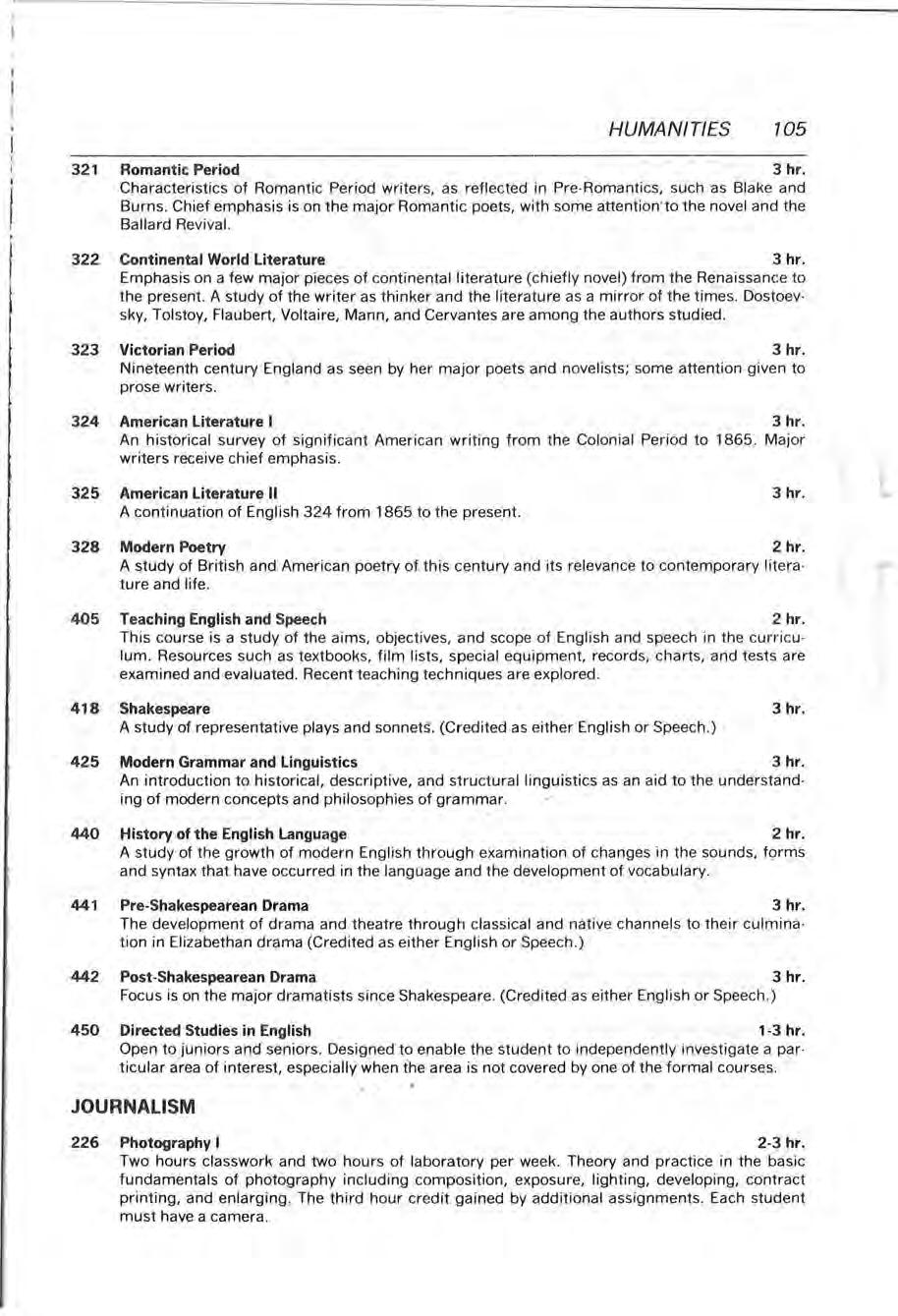
3 hr.
An hi storica l survey of significant American writing from the Colonial Period to 1865 . Major writers receive ch ief emphasis.
325 American Literature II
A continuation of English 324 from 1865 to the present
328 Modern Poetry
3 hr.
2 hr.
A study of British and American poetry of this century and its relevance to contemporary literature and life.
405 Teaching English and Speech
2 hr.
This course is a study of the aims, objectives, a nd scope of English and speech in the curriculum . Resources such as textbooks, film lists, special equipment, records, charts, and tests are examined and evaluated. Recent teaching techniques are exp lored.
418 Shakespeare
A study of representative plays and sonnets. (Credited as eith er English or Speech.)
425 Modern Grammar and Linguistics
3 hr.
3 hr.
An introduction to historical, descriptive, and structural linguistic s as an aid to the understanding of modern concepts and philosophies of grammar.
440 History of the English Language
2 hr.
A study of the growth of modern English through exam inati on of c hanges in the sounds, forms and syntax that have occurred in the languag e and the development of vocabulary.
441 Pre-Shakespearean Drama
3 hr.
The development of drama and theatre through classical and native channe l s to their culmination in Elizabethan drama (Credited as either English or Speech.)
442 Post -S hakespearean Drama
3 hr. Focus is on the major dramatists since Shakespeare. (Credited as eit her English or Speech.)
450 Directed Studies in English
1-3 hr. Open to juniors and seniors. Designed to enab le the student to ind epe nd e ntl y investigate a particular area of interest, especially when the area i s not covered by one of the formal courses.
JOURNALISM
226 Photography I
2-3 hr.
Two hours classwork and two hour s of laboratory per week. Th eory and practice in the basic fundamentals of photography including composit ion, exposure, lighting , developing, contract printing, and en larging. The third hour cred it gained by additional assignments. Each student must have a camera.
HUMANITIES 105
HUMANITIES
234 Beginning Journalism
3 hr.
Prerequ isite : Ability to type. Th e fundamental principles of gathering and writing news; practice in reporting campus news; work on The Pedagogian, College newspaper.
235 Newspaper Editing
2 hr .
Prerequisite: Journ. 234. Credit not to exceed a total of four hours. An intensive course in journalistic desk work that includes copy preparation, headline writing, page layout; extensive work on The Pedagogian desk.
237 Graphic Arts
3 hr.
Six hours laboratory Study and practice in basic processes of printing and allied industries, including work in letterpress, silkscreen printing , bookbinding, rubberstamp making , and goldleaf stamping
325 Photography II
2-3 hr.
Lens, testing, infra -red photography, high speed photography, portraiture, use of negative land positive color films, color printing , and oil coloring of prints.
329 Advertising
2 hr .
A study of advertisements and media from three viewpoints: management-marketing, communications-creativity, and consumer-citizen.
400 Internship in Journalism
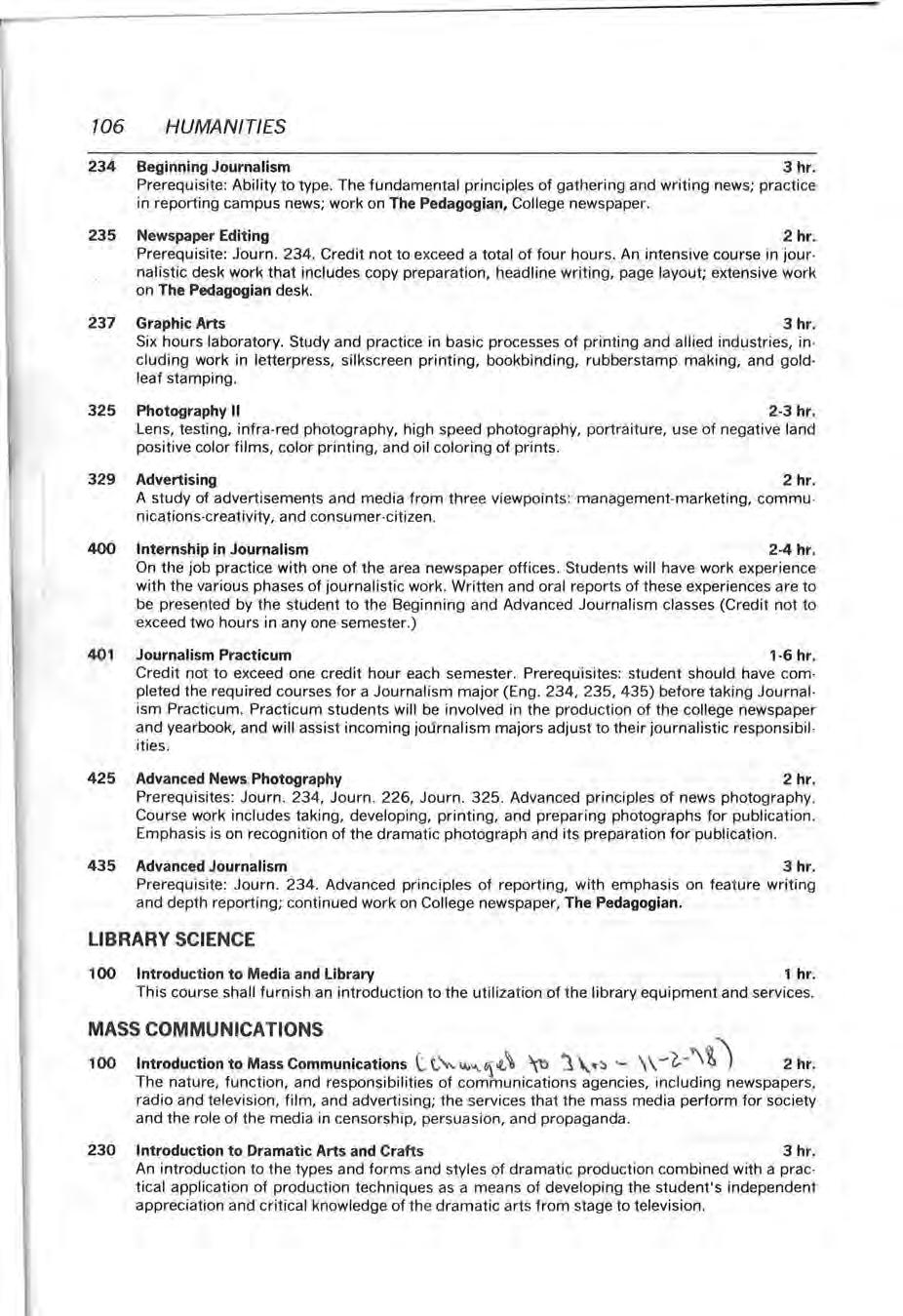
2-4 hr.
On the job practice with one of the area newspaper offices. Students will have work experience with the various phases of journalistic work Written and oral reports of these experiences are to be presented by the student to the Beginning and Advanced Journalism classes (Credit not to exceed two hours in any one semester.)
401 Journalism Practicum
1-6 hr.
Credit not to exceed one credit hour each semester. Prerequisites: student should have completed the required courses for a Journalism major (Eng 234, 235, 435) before taking Journalism Practicum. Practicum students will be involved in the production of t he college newspaper and yearbook, and will assist incoming joi.\rnalism majors adjust to their journalistic responsibilities
425 Advanced News Photography
2 hr.
Prerequisites: Journ. 234, Journ. 226, Journ 325. Advanced principles of news photography. Course work includes taking , developing, printing, and preparing photographs for publication. Emphasis is on recognition of the dramatic photograph and its preparation for publication.
435 Advanced Journalism
3 hr.
Prerequisite: Journ 234. Advanced principles of reporting, with emphasis on feature writing and depth reporting; cont inued work on College newspaper, The Pedagogian.
LIBRARY SCIENCE
100 Introduction to Media and Library
1 hr. This course shall furnish an introduction to the utilization of the library equipment and services.
MASS COMMUNICATIONS
100 lntrodu~tiontoMassCommunications
2hr. The nature, function, and responsibilities of communications agencies, including newspapers, radio and television, film, and advertising; th e services that the mass media perform for society and the role of the media in censorship, pers uas ion, and propaganda.
230 Introduction to Dramatic Arts and Crafts
3 hr. An introduction to the types and forms and styles of dramatic production combined with a practical application of production technique s as a means of developing the student's independent appreciation and critical knowledge of th e dramatic arts from stage to television.
106
(:_t,'\"~"'-6\-t,\ -~ '1\•:> - \\-c..-'\t)
260 Radio and TV Announcing
3 hr.
An introduction to radio and television as communication m ed ia. Introdu ction to modern facilities and practices Laboratory proje cts r elated to both medi a.
275 Film Criticism
3 hr.
Prereq uisite : Eng. 202 or Permission of Instructor. An examination of the several points of view from which film may be criticized with emphasis on authorship and techniques of the filmmaker.
300 Communications Law
3 hr.
The laws regarding m edia responsibility, placing the legal problem s of media work in a practi ca l context; libel, contempt, constitutional guarantees, access to publi c records; the invasion of privacy , criticism, and copyright
363 Television Production
3 hr.
Prerequisite : MC 261. An individual approach to television production which allows the student to produce and direct his own production s.
SPEECH AND DRAMA
152 Fundamentals of Speech
3 hr. Each semester and summer
The principles of speech. Development of bodily freedom, distinct utteranc e, and improved oral co mmunication. Includes fundamental process of speech correction and development, with emphasis on the development of exce llent speech habits and the diagn os is and treatment of elementary speech defects
254 Public Speaking
3 hr
Training in effective methods of adapting composition and delivery to various types of audiences. A study is made of the forms of address, impelling motives, speec h ends, speec h organization, composition , and delivery. Practice is given in gathering, c hoosing , working and mastering speech materials.
256 Acting I
3 hr.
A concentration on stage movement, pantomime with emphasis on the development of the creative imagination.
257 Acting II
3 hr .
Prerequisite : Speh 256. Intensive training in stage business , dialogue and c haracterization, analyzation of character a nd the principles of dramatic interpretatio n
260 Radio and Television Announcing
3 hr.
An introduction to radio and television as co mmunication media Introdu ctio n to modern facilities and practices. Laboratory proje ct s related to both media.
300 Summer Theatre Workshop
3 hrs . credit per session
Practical training in all aspects of the atre production; acting set design, lighting, costuming, make-up, improvisation, music , and dan c ing Public performance every weekend. Offered both sessions, no prerequisites, may be taken either or both sessions for a total of six hours credit.
327 Light and Sound Design for Stage ·and Teievision
3 hr.
Prerequisite : MC 230. Theory and, practi Ce of stage and television lighting and sound systems. Study of instruments and control system s employed in light and sound in various media s ituations. Study of color in light, its effect upon costumes, scenery and mak e- up. Acousti ca l problem s analyzed. Plan ning of light a nd sound plots.
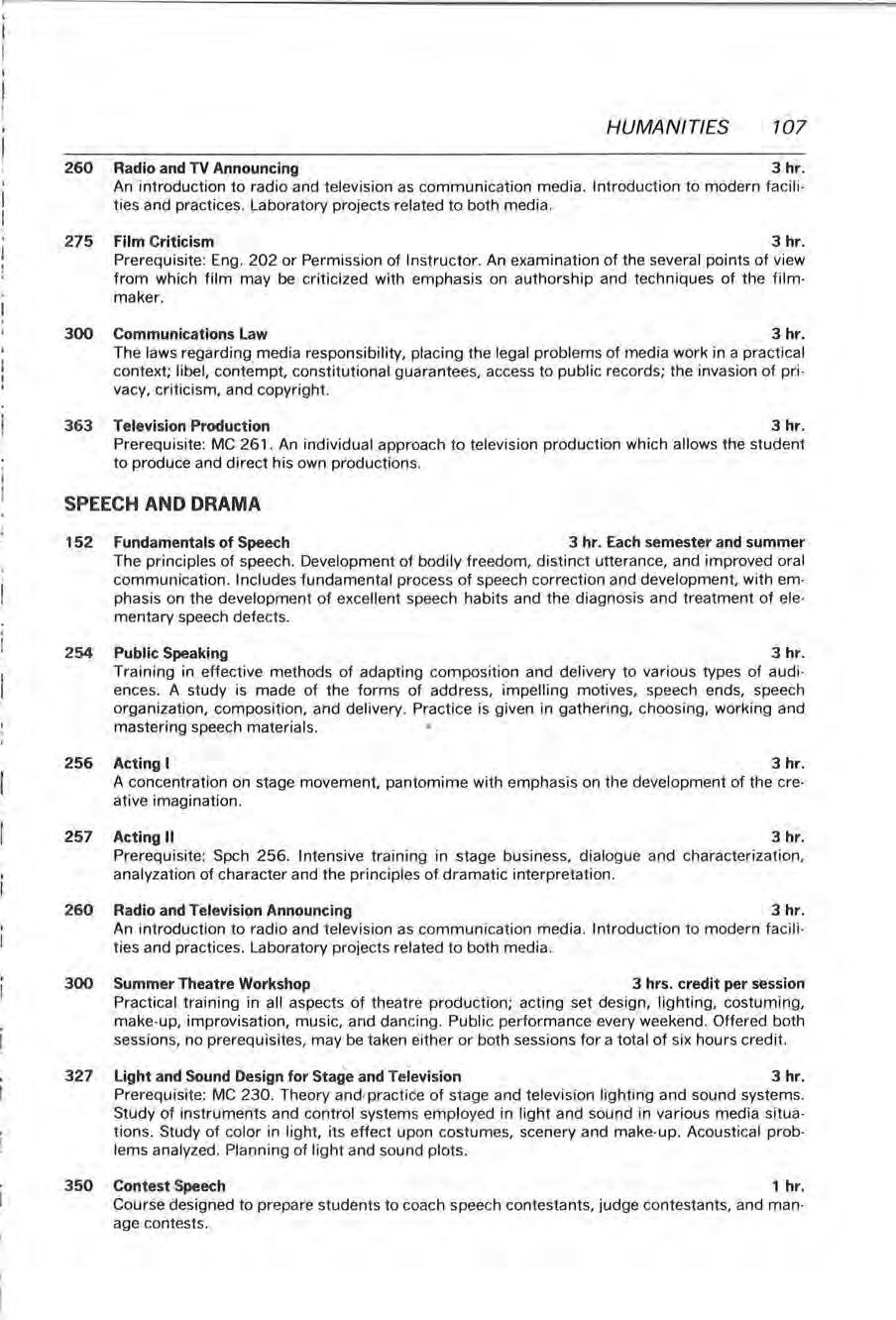
350 Contest Speech
1 hr .
Course designed to prep are stude nts to coac h speech contestants, judg e contesta nts, and manage contests.
HUMANITIES
7
10
HUMANITIES
353 Speech Correction and Development
3 hr.
Prerequisites: Spec. Educ. 200 for Edu catio n majors o nly. A s urvey course emphasizing the uniqu e educational problems and techniques relating to children with sight, so und and speech defici encies. The focus is on identification and support ing remediation
355 Play Production in the Secondary School
3 hr
A course for the directo r of dramatics in schools and communities. It answers the fundamental questions pertaining to play selection, cast ing, directing, steps in rehears a l, sce nery, lighting, costume, make -up, and business organization .
357 Interpretative Reading
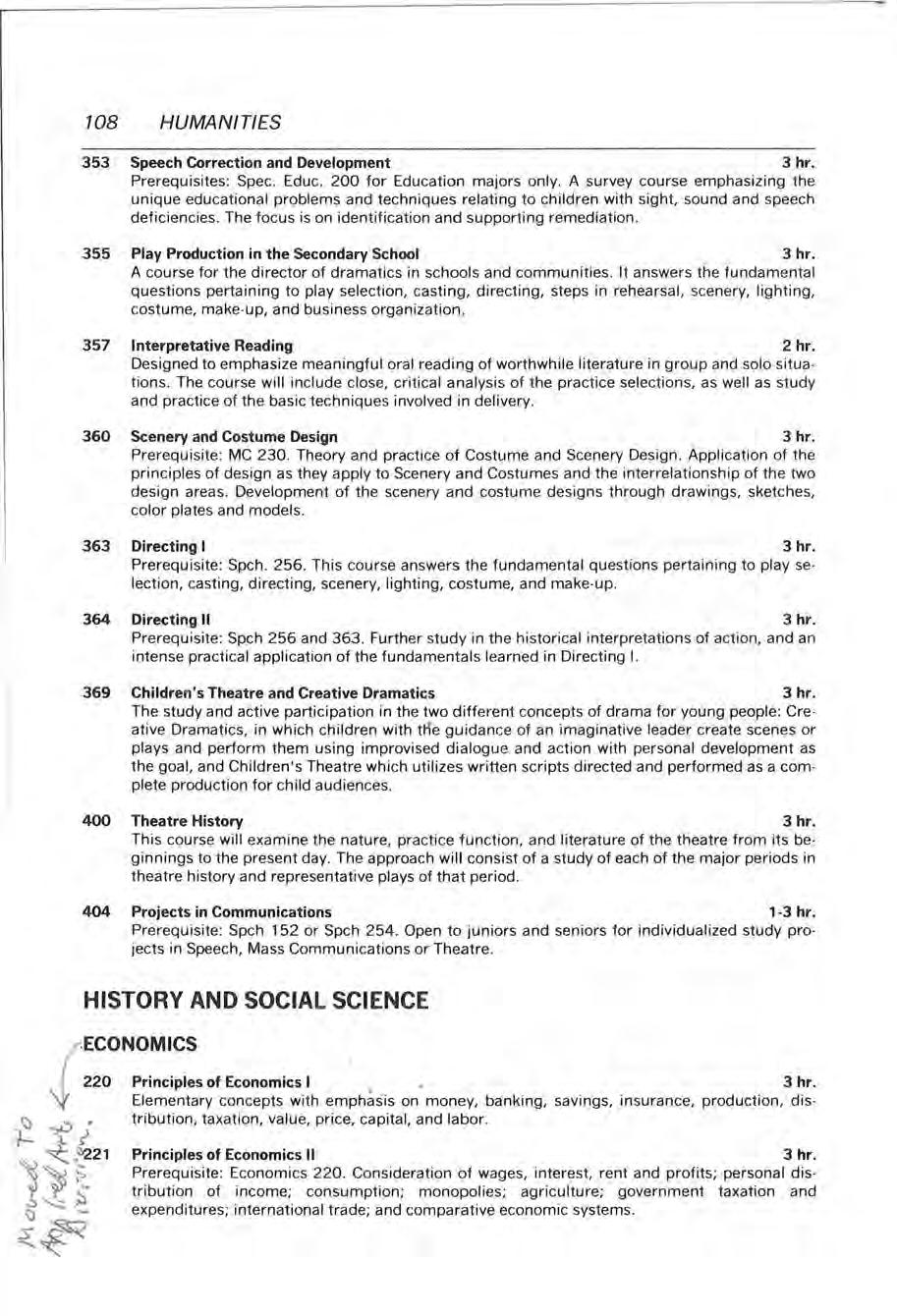
2 hr.
Designed to emphasize meaningful ora l reading of worthwhile literature in group and so lo situations The course will include close, critical ana ly sis of the practice selections, as well as study and practice of the basic techniques involved in delivery.
360 Scenery and Costume Design
3 hr.
Prerequisite : MC 230. Theory and pra ct ice of Costume and Scenery Des ign. Application of the principles of design as they apply to Scenery and Costumes and the interrelationship of the two design areas Development of the scenery and cos tume designs through drawings, sketches, co lor plates and model s.
363 Directing I
3 hr.
Prerequisite : Speh 256. This course answers the fundament al questions pertaining to play selection, casting, directing, scenery, lighting, costume, and make-up.
364 Directing II
3 hr.
Prerequisite : Speh 256 and 363. Further stu dy in the historical interpretations of action, and an intense practical application of the fundamentals learned in Directing I.
369 Children's Theatre and Creative Dramatics
3 hr.
The study and active participation in the two diff erent co ncepts of dra ma for young people : Creative Dramatics, in which chi ldren with t tfe guidance of an imaginative leader create scenes or plays and perform them using improvised dialogue and action with persona l development as the goal, and Children's Theatre which utilizes written scripts directed and performed as a complete production for child audiences.
400 Theatre History
3 hr.
This course will examine the nature, practice fun ction, and literature of the theatre from its beginnings to the present day. The approach will consist of a study of each of the major periods in theatre history and representative plays of that period.
404 Projects in Communications
1-3 hr.
Prerequisite: Speh 152 or Speh 254. Open to juniors and seniors for individualized study projects in Speec h, Mass Communications or Theatre.
HISTORY AND SOCIAL SCIENCE
·.ECONOMICS
220 Principles of Economics I
Elementary concepts with emph ~s is on money, banking, savings, in surance,
, tribution, taxation, value, price, capital, and labor.
Principles of Economics II
3 hr. production, dis-
3 hr.
Prerequisite : Economics 220. Consideration of wages , interest, rent and profits; personal distribution of incom e; consumption; monopolies; agriculture; government taxation and expenditures; international tr ade; and comparative economic systems.
108
i
-/:_ "7f
~~1 2, Jli
222 Contemporary Economic Problems
3 hr .
Prerequisites: Economics 220 a nd 221. Analysis of major eco nomi c prob lems relating to wage and income distribution, money and credit, business cycles, domesti c and international trade and tariffs.
333 Econom ic History of United States
3 hr. U .S. economic history from co loni al times to the present.
350 Public Finance
3 hr.
Prerequisites : Econ 220 and 221. A cr iti ca l a n alysis of the capitalistic economic systems fo llowed by a survey and critica l analysis of soc ia li sm and communism.
375 Labor and Industrial Relations
3 hr Eco n 220 and 221. Labor, management and gove rnment as they are interrelated involving co llective bargaining, labor laws, and wage theories.
380 Environmental Economics
3 hr.
Prerequisites: Econ. 220 -22 1. An economic ana ly sis of the environmental crisis and possible solutions. The ro le of the market system and its failure to compensate for the suffering generated by a highly advanced society.
470G Special Problems in Economics
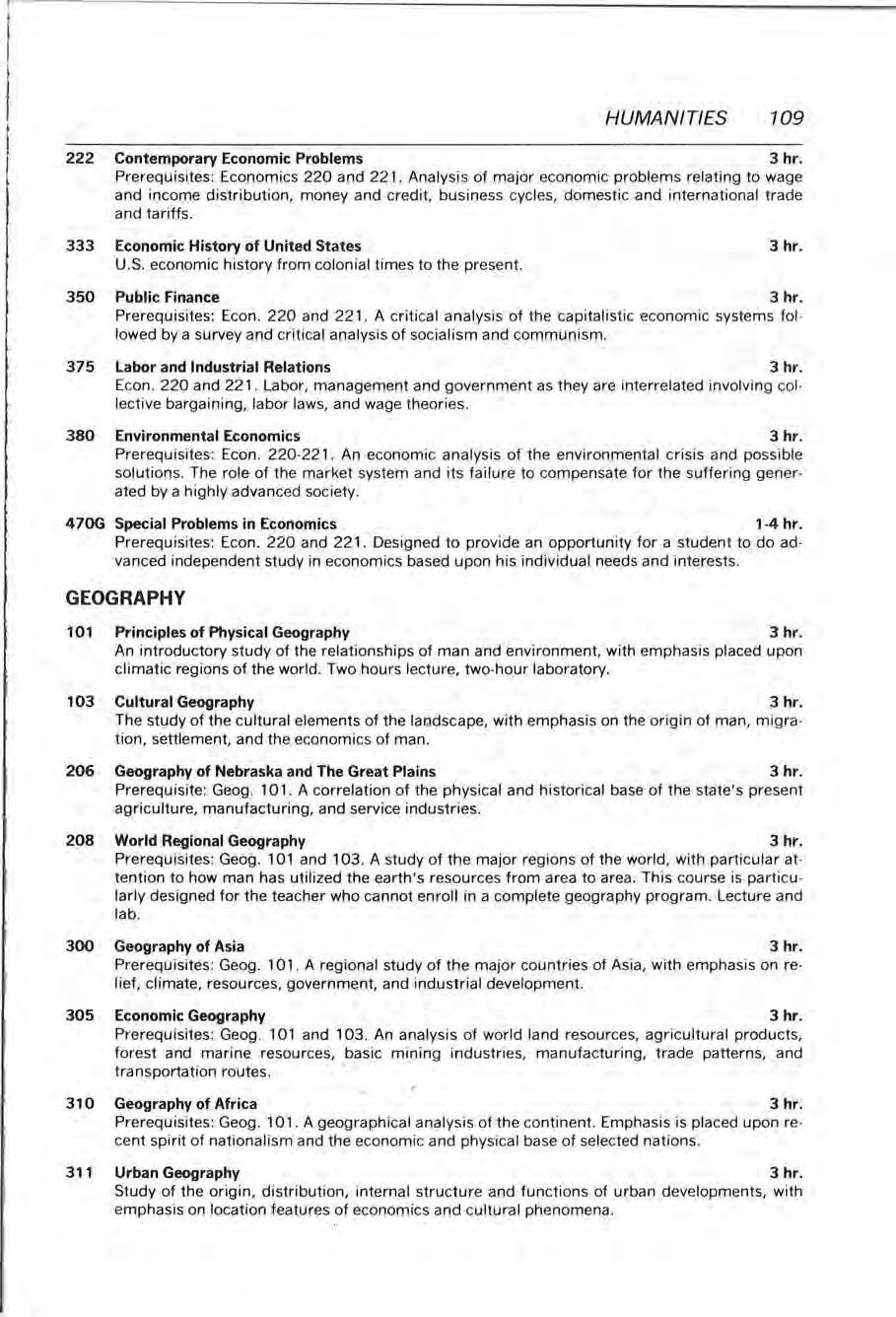
1 4 hr.
Prerequisites: Econ. 220 and 221. Designed to provide an opportun ity for a student to do advanced independent study in economics based upon his individual needs and interests.
GEOGRAPHY
101 Principles of Physical Geography
3 hr.
An introductory study of the relationships of man and environment, with emphasis placed upon climatic regions of the world Two hours lectur e, two-hour laboratory.
103 Cultural Geography
3 hr
The study of the cu ltural elements of the laradscape, with emphasis on the or igin of man, migration, settlement, and the eco nomi cs of man.
206 Geography of Nebraska and The Great Plains
3 hr.
Prerequisite: Geog. 101 A correlation of the physical and historical base of the state's present agriculture, manufacturing, and service industries
208 World Regional Geography
3 hr.
Prerequisites: Geog. 101 and 103. A study of the major regions of the world, with particular attention to how man has utilized the earth's resources from area to area This course is particularly designed for the teacher who cannot enroll in a complete geography program. Lecture and lab.
300 Geography of Asia
3 hr.
Prerequisites : Geog. 101. A regional stud y of the major count ri es of Asia, with emphasis on relief , climate, resources, government. and industrial development.
305 Economic Geography
3 hr.
Prerequisites: Geog 101 and 103 An analysis of world land resources, agricu ltural products, forest and marine resources, basic m[ning indu stries, manufacturing, trade patterns, and transportation routes.
310 Geography of Africa
3 hr.
Prerequisites: Geog 101. A geographical analysi s of the continent. Emphasis is placed upon recent sp irit of nationalism and the economic and physical base of selected nations.
311 Urban Geography
3 hr .
Study of the origin, distribution, internal structure and functions of urban developments, with emphasis on location features of econom ic s and cu ltural phenomena.
HUMANITIES
109
HUMANITIES
312 Geography of Anglo-America
3 hr.
Prerequisite : Geog. 101 or senior standing. A study of the United States and Canada by natural regions In each case an evaluation of the physical and economic base will b e made in the light of present economic development.
313 Geography of South America
3 hr.
Prerequisite : Geog. 101. Th e geographic regions of South America analyzed in their n atu ral, political and economic settings. The economic relations between South America and the United States.
326 Conservation of Natural Resources
3 hr.
An evaluation of soil, water, mineral, forestry, fish, air, and recreation resources in order to develop an appreciation of their importance and the seriousness of the problem.
304G Special Problems and Techniques in Geography
2 hr.
Designed to provide an opportunity for stude nts to experiment with and learn new technique s in geography instruction based upon individual needs and interest of each student. For teacher education candidates
404G History and Philosophy of Geography
2 hr.
Prerequisites: Geog. 101 and 103. A study of the basic philosophies of geography including the study of the history of geographic thought from ancient to modern times.
411G Field Geography
2 hr .
Prerequisite: Geog. 101. An intensive course of training in the geographic field methods and in the direct application of geographic principles to important problems in selected districts. Two hours lecture, laboratory by arrangement.
470 Independent Study Geography/Geology

1 to 3 hr.
Prerequisite: junior or senior standing, with adequate preparation in the field and the in structor's permission. Individual instruction in the techniques of research, with either extensive readings and reports or a term paper req u ired.
494 Current Topics in Geography
3 hr.
A geographic study of current topics generally involving such subjects as pollution, space geography, agricultural geography, geography of transportation, geography of primary production, a nd rocks and minerals.
495 ·Regional Topics in Geography
3 hr.
A study of world areas by physical divi sio n, with emphasis on the interrelationships between cultural and physical features of each region. Course topics selected from the following regions: Middle East, Southeast Asia, U .S.S. R., Asia , Middle America, South America, Austr a lia, and the islands , Eastern Europe and Western Europe.
499G Political Geography
3 hr.
Prerequisites: Geog. 101 and 102. Geography as a factor in the differentiation of political phenomena in various parts of the world. The modern state in relation to its environment and the interrelationship of nations as a result of their geographical strengths and weaknesses.
HISTORY
113 American History to 1865
3 hr. Discovery a nd exploration, colonization, the Revolution, and th e U.S. and its problems until the end of the Civil War
114 American History After 186 5
3 hr. Recon struction, the last frontiers, the ri se of big busin ess, imperialism, and the role of the U.S . in two World Wars and their aftermaths.
110
201 World Civilization to 1500
3 hr.
A survey of the beginnings of civilizations in the great river valleys and their diffusion to later civilizations in the Middle East and Europe. Particular attention will be given to the cultural and political institutions of the West, which furnish our own cultural heritage.
202 World Civilization After 1500
3 hr.
The rise and decline of European predominance will be analyzed, with emphasis upon the major social, political, and economic ideologies and institutions that evolved.
299 Historiography
3 hrs.
Techniques of Historical Research. This course deals with the following: Distinguishing between primary and secondary source material, the art of collecting historical evidence, and the writing of the paper.
301 Colonial America
3 hr.
Colonial rivalry between the Spanish, French, English, and Dutch in North America, the Revolution, and U.S. history to 1823.
302 U.S. in the Nineteenth Century
3 hr. The U.S from 1823 through Manifest Destiny and the Civil War down to the War with Spain.
303 U.S. in the Twentieth Century
3 hr. The U.S. in modern times, with emphasis upon the changing social and economic theories of the period, and the internal forces that influenced its development.
329 History of Nebraska
2-3 hr.
A survey of the political, economic, social, and constitutional development of Nebraska from prehistoric times to the present.
333 Latin America
3 hr.
The evolution of the states of modern Latin America following their independence, their political and economic development and their inter ri ational relations .
343 English History from 1688
2 hr.
A survey of the social, political, and economic development of England since the Glorious Revolution. Covers the social and religious impact on the development of the English Parliamentary system, the effects of the Industrial Revolution upon the British Empire, and the prospects of the modern welfare state on contemporary England.
344 Social and Cultural Europe 1500-1815
3 hr.
An historical description and analysis of European society and culture from the Renaissance to the Congress of Vienna. Particular attention will be given to correlate the fine arts and literature to the rise of national states, absolutism, and religious developments. ·
345 Modern Europe
3 hr.
A comparative historical analysis of the ongoing process of modernization in Europe. Emphasis on movements and institutions such as Liberalism, Conservatism, Romanticism, Socialism, Imperialism, and Totalitarianism.
361 Non-Western Civilizations
3 hr.
A broad survey of the Soviet Union and ,of the principal areas of the Middle East, Asia, and Af · rica, with particular emphasis on c ontemporary social, political and economic developments
400 Methods in History and Social Science

2 hr. Instruction in the methods of teaching high school history and social sciences.
411G American Frontier
The importance of the frontier in American history from colonial times to the 20th Century.
3 hr .
HUMANITIES 111
112 HUMANITIES
426G American Constitutional Law
3 hr.
Prerequisite: Pol. Sci. 201 or 202 or instructor 's permission. A study of the historical and politica l context of the cases. Traces constitutional doctrine through major decisions. Empha s is on co nstitutional growth that relates closely to th e fundamental structure of the American government and social order.
455 Twentieth Century Russia
3 hr.
An analysis of the social and cultural, political, and economic evolution of Russia under the Tsars through the Bolshevik Revolution, and the formation of the Soviet Union to the present.
467 The Far East
3 hr.
Concerned with political traditions and historical evolutions of the member states of this area, the impact of the West and its profound influ ences on political order, and the issues that co m e to the fore in today's revolutionary and fluid situation.
470 Independent Study in History
1 to 3 hr.
Prerequisite: junior or senior standing, with ade quat e preparation in the field and instructor's permission. Individual instruction in the techniques of hi stor ical research, with either extensive readings and reports or a term paper required. Recommended for students contemplating graduate work in history.

PHILOSOPHY
201 Introduction to Philosophy
3 hr.
An introdu ctio n to philosophy through selected writing from so m e of the outstanding philosophers, classical and current. Lectures and class discussions on such topics as ethics, philosophy of history, philosophy of religion, and m etap hysics .
300 Social Ethics 3 hr. A study of morals and principles for judging human action and responsibility
301 Philosophy and History of World Religions 3 hr. Traces the historical origins and philosophie s of the world's major religions and their developments
POLITICAL SCIENCE
201 American National Government
hr. The government of the United States, its origins, philosophy, aims and powers
202 American State and Local Government
hr. The nature and extent of government of the state and local levels and its contributions to the political life of the nation.
301 Comparative Government 3 hr . A comparison and analysis of political systems and institutions of the major countries.
426G American Constitutional Law 3 hr.
Prerequisite: Pol. Sci. 201 or 202 or instructor' s permission. A study of the histori ca l and political context of the cases. Traces ,constitutional doctrine through major decisions. Emphasis on constitutional growth that relate dosely to the fundamental structure of the American government and social order.
467 The Far East 3 hr.
Concerned with political traditions and historical evolutions of the member states of this area, the impact of the West and its profound influences on political order, and the issues that come to the fore in today's revolutionary and fluid situation.
3
3
470 Resea rch Topics in Political Science
1 to 3 hr .
Prerequisites: junior or senior standing, with adeq u ate preparation in political sc ience and hi story , and in structor' s per mi ss i o n Individu a l r esearc h in t o a c h ose n aspect of government or political theory, with either ex t ensive reading s and r epo rt s or a term paper r eq uir ed On demand
SOCIAL WORK
280 Introduc t ion to Soc ial Work
3 hr .
An introduction to th e profess ion of soc ial work with emph asis o n the history, phi losop hy, methods, and processes of soc ial work
310 Social Serv ices
3 hr
Prere qui si t e: Soc Wk 280. The study of the public and pr ivate social se r vices age n cies; emp has i s o n spec iali zed social welfare agencies a nd se r vices .
375 Casework
2 hr .
Prere qui site: Soc Wk 28 0 . Th e art, theory , and practice of th e dynamics o f casework with emph as is on c urrent social work tec hn iques u sed in meeting gro up a nd individual n eeds.
390 Group Work
2 hr.
Prerequisite : Soc Wk 280. Th e the ory and practice of the dynamics of gro up work, wit h emphasis on techniques used in meeting group and individu a l n eeds.
430 Fie ld Work Practicum
Prerequ i site: 10 h o urs Soc Wk and permission. Supervised expe ri ence in soc i al work
SOCIOLOGY
100 Social Sc ience
3 hr .
3 hr.
An integrated, interdi scip linary s urvey co ur se in the soc ia l sc iences des igned to cove r c urrent topics from different social science p erspec ti ves. Th e co ur se will be team-taught by the hi story and social science in st r u cto r s. •
201 Principles of Sociology
3 hr
Culture an d its relation s to spec ifi c soc ial prob lems. The soc ia l in stitutions of American lif e in relation to population c hange s, ethni c groups and m aj or problems o f soc ia l policy. Th e soc ial co n seq u ences of social co ntrol in the metropolitan world.
225 Introduction to Anthropology
3 hr
Th e n at ure a nd sco p e of anthropol ogy: origi n s o f man a nd the co n cept of man as a c ultur al being . Part ic ul ar empha s i s is pl aced u pon f oss il man a nd pre-history.
25 0 Community Organization
3 hr.
Prerequi site: Soc. 201. Major differentiating character i stics, wi th special emp h as i s on the urban community, basic patterns of socia l a nd eco logi ca l organization, and fa ctors co ntributin g t o co mmunity integration a nd disorganization.
260 Rural Sociology 3 hr
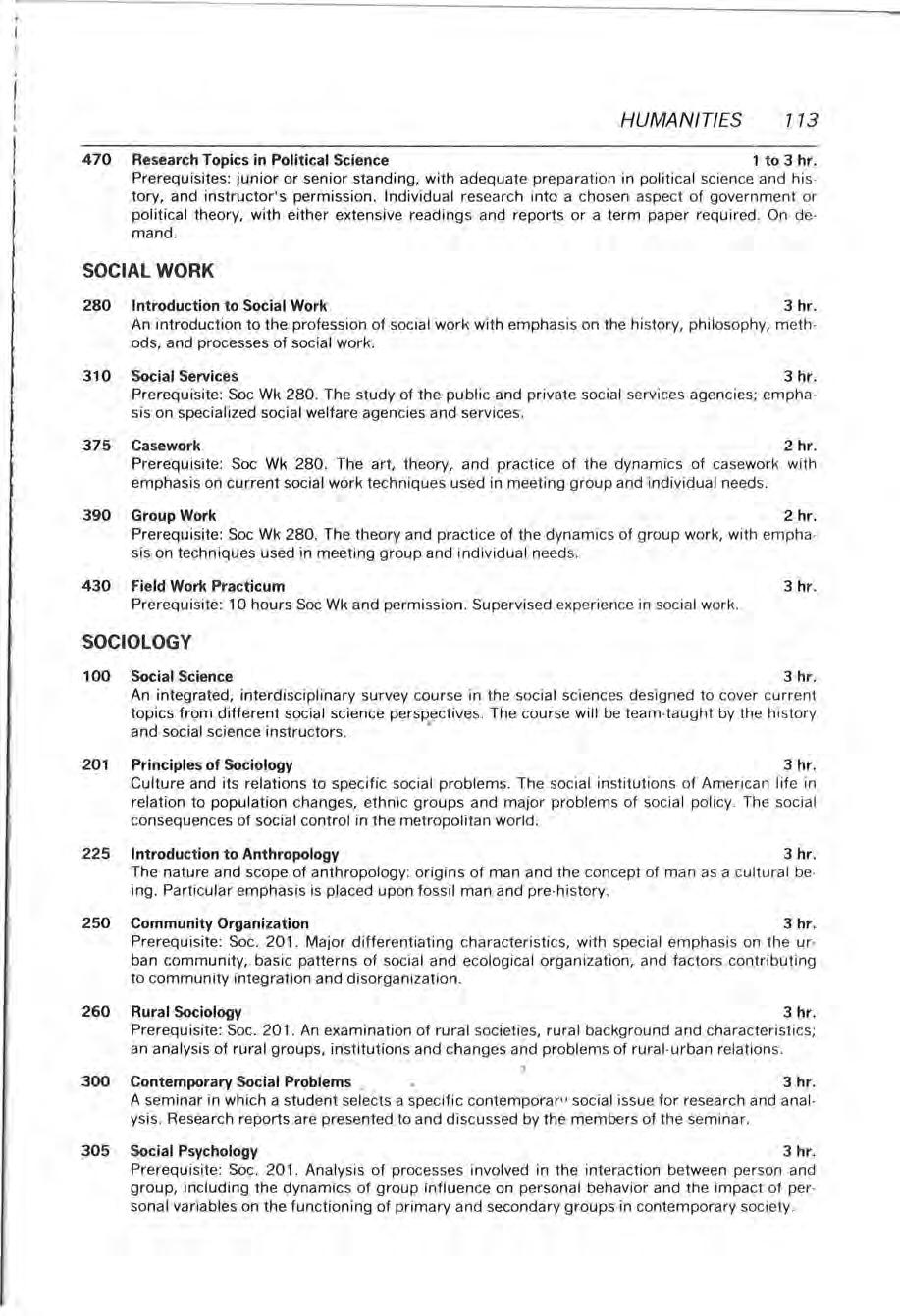
Prerequisite: Soc. 20 1. An exa min ati o n of rur al socie ti es, r ur a l background and c harac t erist ics; a n analysis of rural groups, in,st itution ~ and c h a nges and problem s of rur a l-urb an relat ions.
300 Contemporary Socia l Problems , 3 hr.
A se min ar in which a stud e nt se lects a spec ifi c conte m po r ar" soc ia l iss u e for research and a na lysis. Researc h reports a re presented to a nd discussed by th e mem be r s of the se min ar.
305 Soc ial Psychology 3 hr
Pre requi sit e: Soc. 20 1 Analy sis of processes in vo lved in th e interaction between person and group, including the dynamic s of grou p influen ce on personal b ehav ior a nd the im pact of perso nal variables on th e f u nct ioning of primary and seco ndar y groups in co ntempo rary society.
HUMANITIES 113
114 HUMANITIES
340 The Family
3 hr.
Prerequisite: Soc. 201. The role of the family in contemporary society, factors influencing trends in family structure, functions, roles, stability, and their implications for both the community and individuals at varying stages of the family life cycle.
360 Corrections & Preventions
3 hr. Theory and methods of dealing with criminals and juvenile delinquents; analysis of current correctional programs . ·
370 Ethnic-Group Relations
3 hr.
Prerequisite: Soc. 201. The nature of minority groups and their distribution in American society; and an examination of the melting pot concept vs. the pluralistic society.
420 History and Introduction to Modern Sociological Theory
3 hr.
Prerequisite: Soc. 201. and permission. An overview of the earlier sociological theorists and their contributions to current sociological theories.
450 Methods of Sociological Research
3 hr.
Prerequisite: Soc . 201 . Analysis and applications of methods of sociological research with emphasis on nonparametric statistics.
470 1 Independent Study in Sociology
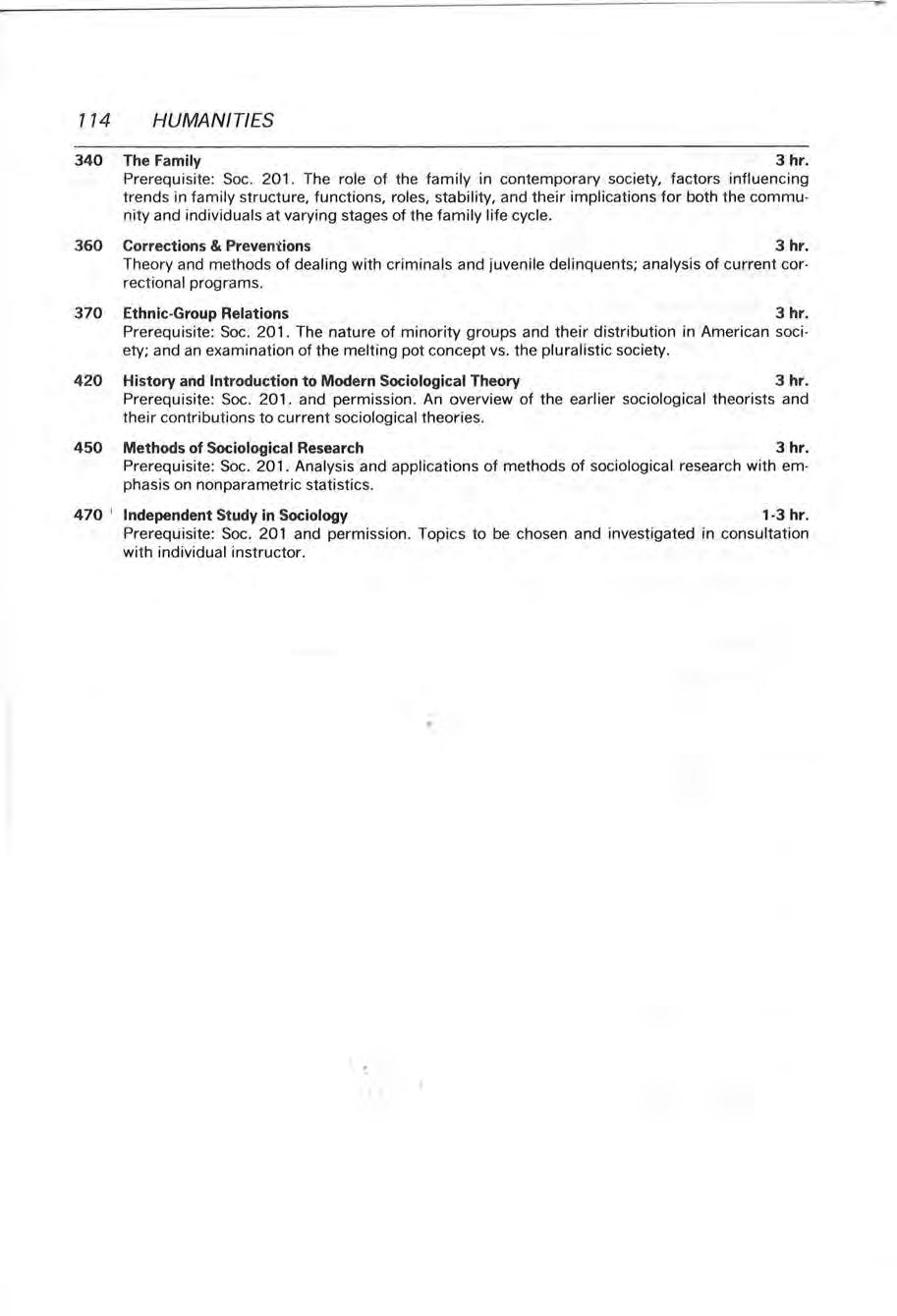
1-3 hr.
Prerequisite: Soc. 201 and permission. Topics to be chosen and investigated in consultation with individual instructor.
Division of Natural Sciences BIOLOGICAL
SCIENCE
101 General Biology (Plant)
Two hours c la sswork. Two or three ho urs laboratory. A bas ic course in botany.
102 General Biology (Animal)
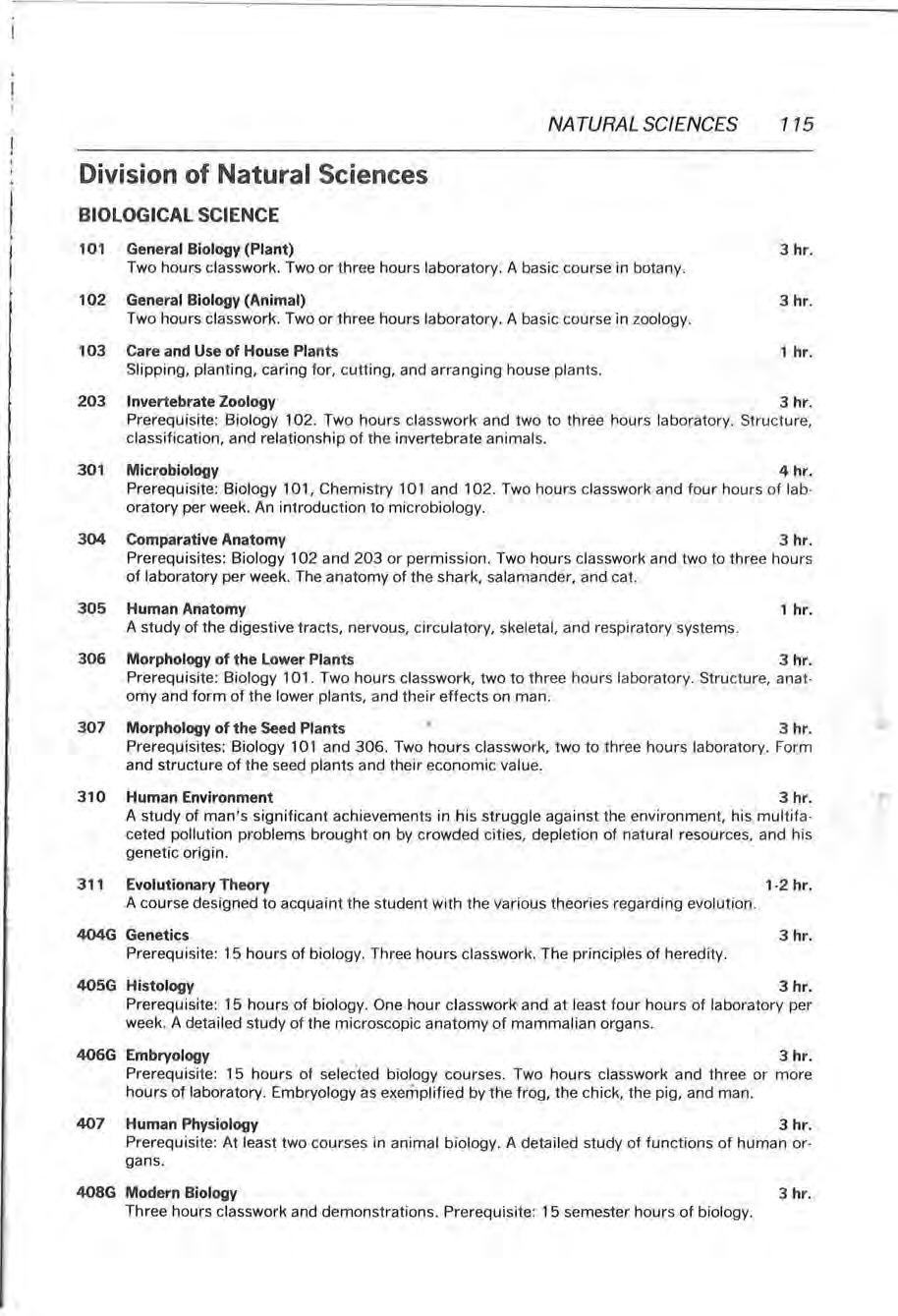
Two hours classwork Two or three hour s laboratory. A bas ic course in zoo logy.
103 Care and Use of House Plants
Slippin g, planting, car ing for , cutti ng, and arrangi ng house p lants.
203 Invertebrate Zoology
3 hr.
3 hr.
1 hr
3 hr.
Prerequisite: Biology 102. Two hours classwork and two t o three hours laboratory. Structure, c l ass ification, and re lat ion sh ip of t he invertebrate a nim als
301 Microbiology
4 hr.
Prerequisite: Biology 101 , Chem i stry 101 and 102 Tw o hours classwork and four ho ur s of laboratory per week. An introd uction to microbiology.
304 Comparative Anatomy
3 hr.
Prerequisites: Biology 102 and 203 or permission Two hours classwork and two t o three hours of laborator y per week. The anatomy of the shark, sa lamander, and cat.
305 Human Anatomy
A study of the digestive tracts, nervous, c irc ul atory, skeleta l, and respiratory systems
306 Morphology of the Lower Plants
1 hr.
3 hr.
Prerequisite: B iol ogy 101. Two hours classwork, two to three hours laboratory. Stru cture , a natom y a nd form of the lower plants, and their effects o n man.
307 Morphology of the Seed Plants
3 hr.
Prerequisites: Bio logy 101 and 306. Two ho ur s c lasswork, two to three hours laboratory. Form and structure of t he seed p lants and the ir eco n om ic va lu e.
310 Human Environment
3 hr.
A st udy of man's s ignificant achievements in hi s strugg le aga in st the env ironme nt, hi s multifaceted po llut ion problems brought on by crowded cit ies, dep let ion of nat ural r eso urces, a nd his genetic origin.
311 Evolutionary Theory
A course designed to acq ua int t he student with t he var ious theories regarding evo lut ion
404G Genetics
Prerequisite: 15 hours of biology. Three hours c lasswork The principles of heredity.
405G Histology
1-2 hr.
3 hr
3 hr.
Prerequisite: 15 hours of biology. One ho ur classwork and at least four hou rs of laboratory per week. A detai led st udy of the microscopic anatomy of mammalian organs .
406G Embryology , 3 hr.
Prerequisite: 15 ho urs of selec ted b iol ogy courses. Two hours c la sswork and three or more hour s of laboratory. Embryo log y as exemp lifi ed by the frog , the c hi ck, t he pig, and man.
407 Human Physiology
3 hr.
Prerequisite: At least two co urses in an ima l biology. A deta il ed st udy of funct io ns of human o rga ns.
408G Modern Biology
Three hours c lasswork and demonstrations
Prerequisite: 15 se m ester hour s of biology.
3 hr.
NATURAL SC IENCES 11 5
NATURAL SCIENCES
409 Plant Physiology
3 hr.
Study of the function and structure of th e different living plant ce ll s, their contro l mechanisms, and how th ey operate under the c hemical and physical laws .
41 7G Ecology
Three hours classwork. A study of organisms in relation to the ir environments.
450 Environmental Biology
3 hr.
3 hr .
A study of the effects of population growth on the earth's resources and env ironm ent. An overview of the needs of man to adapt to changes resulting from biotic and abiotic factors.
CHEMISTRY
101 General Chemistry
4 hr.
Three hours classwork and two h ours laboratory. The fundamentals of chemistry Non-metals a nd th eir co mpound s. For those who have not had high school chemistry
102 General Chemistry
4 hr.
Prerequisit e: Chemistry 101. Three hours c lasswork, two hours lab oratory. Application of the fundamental s of c h emi stry , metals, and their compounds, a nd an introduction to organ ic and analytical c hemistry.
142 Introductory Organic and Biochemistry
4 hr.
Three hour s c lasswork, two hours laboratory A terminal course in organic and biochemi stry.
205 Principles of Qualitative Analysis
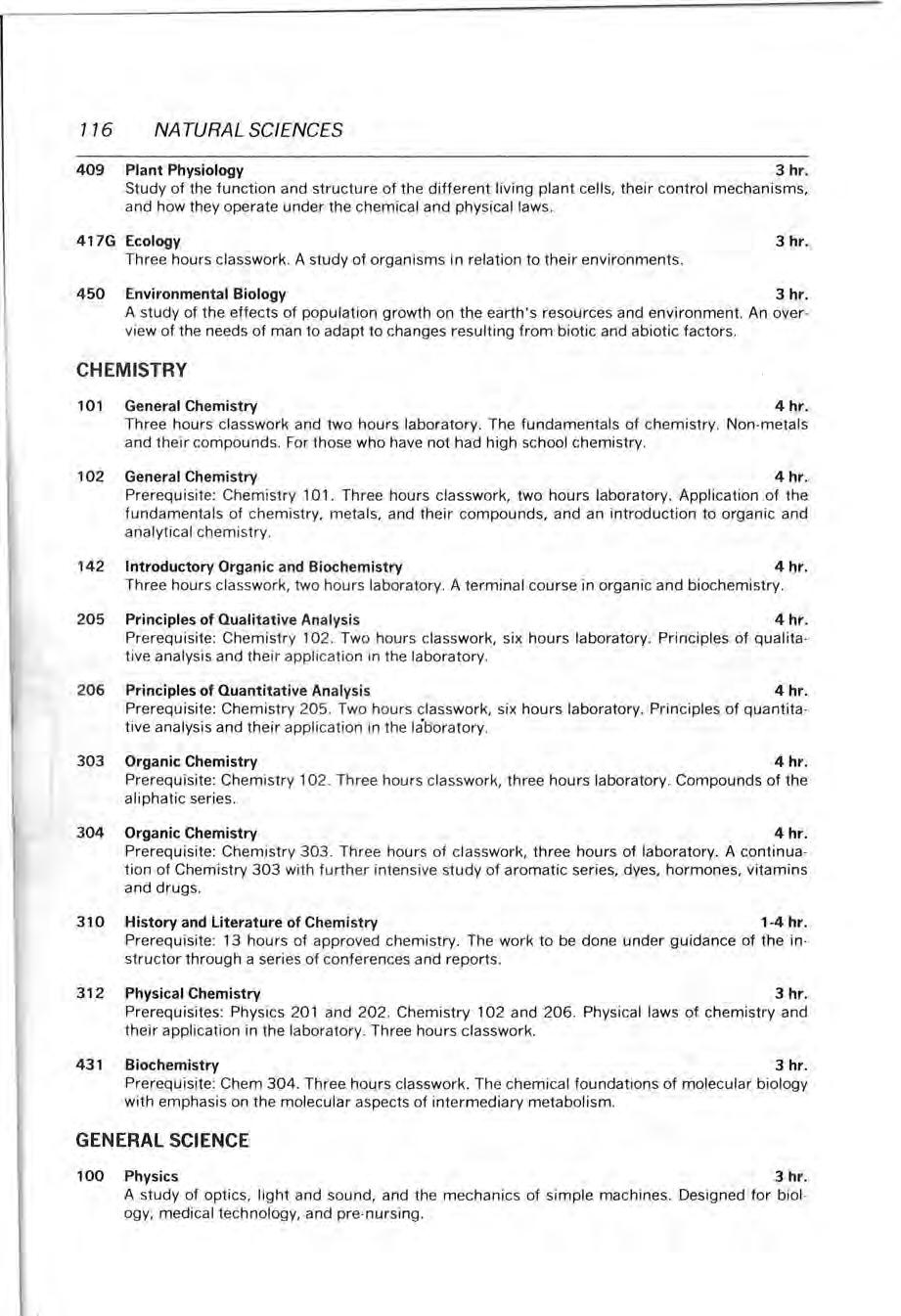
4 hr.
Prerequisite: Chemistry 102 Tw o h ou r s c lasswork, six hours laboratory. Principles of qualitative analysis and their applicatio n i n the laboratory
206 Princip les of Quantitative Analysis
4 hr.
Prerequisite: Chemistr y 205 . Two hours classwork, six hours laboratory. Principles of quantitative ana lys i s and their application in the latforatory.
303 Organic Chemistry
4 hr.
Prerequisite: Chemistry 102 Three hours c lasswork, three hours laboratory Compounds of the a liph atic series.
304 Organic Chemistry
4 hr .
Prerequisite: Chemistry 303 Three hours of classwork, three hours of laboratory. A continuation of Chemistry 303 with further in t ensive study of aromatic series, dyes, hormones, vitamins and drugs.
310 History and Literature of Chemistry
1-4 hr.
Prerequisite: 13 h ours of ap proved chemistry. The work to be done under guidance of the instructor through a series of co nf ere n ces and reports .
312 Physical Chemistry
3 hr .
Prerequisites: Physics 2 01 and 202. Chemistry 10 2 and 206. Physical laws of c h em istr y and their app lication in the laboratory Three hours c lasswork.
431 Biochemistry
3 hr.
Prerequisite: Chem 304. Th ree hows clas~work The chemical foundatio n s of molecular biology with emphasis on the molecular aspects of intermediary metabolism.
GENERAL SCIENCE
100 Physics
3 hr.
A study of opt ics, li ght and sound, and the mechanics of simp le machines. Designed for biology, medical technology, and pre -nursing
116
201 Biological Science
NATURAL SCIENCES 117
3 hr.
Two hours classwork and two to three hours of laboratory per week. An integrated course covering the various phases of natural science.
202 Physical Science
3 hr .
Two hours of classwork and two or three hours of laboratory per week. An integrated course covering the various phases of physical science.
205 The Principles of Biological Sciences

3 hr .
An integrated course specifically designed for the non-science student, covering the variou s phases of man's biotic world, by a variety of learning experiences in demonstrations, ex perimentation and visual aids. Does not apply on the major or support in biology.
206 The Principles of Physical Science
3 hr.
An integrated course specifically designed for the non -science student, covering the various phases of man's physical and chemical world. Experiences in a variety of learning situations, such as demonstrations, experiments, instructional television, and other visual aids. Does not apply on the major or support in physical science.
207 The Inquiry Science for Middle School Teachers
3 hr. Methods, techniques, and academic information employed by teachers in carrying out a lablearning situation in the middle school.
232 Energy
3 hr.
A study of energy resources. Attention will be focused on both nuclear and conventional power stations, design operation, cost, governmental regulations, safety and environmental effects. Field trips to nuclear and conventional generation stations are required.
301 Earth Science
3 hr.
Prerequisite : Junior or senior standing, 6 hours of laboratory science. A course dealing with the physical aspects of our environment, including astronomy, climatology, meterology, geology, and oceanography.
421 Independent Study in General Science
1 hr.
Permit students to do advanced work in the various fields of science and math, thus promoting extensive individual study Permission must be given by the instructor.
430G Environmental Science
3 hr.
A workshop designed to provide an understanding of the ecological problems of confronting modern man and proposed techniques for their solution.
476 Methods of Teaching Science and Mathematics
2 hr. Objectives, content and methods of teaching science and mathematics in high school.
499G Aerospace Science
3 or 4 hr.
A workshop designed to provide an understanding of aerospace developments which are vital to our social, economic, and political environment The fourth hour consists of oral instruction, briefing, and dual flight instruction
GEOLOGY
201 Physical Geology
4 hr.
An introduction to the theories of the earth ' s origin, the study of the earth's structure and materials with special emphasis on rocks, minerals, and landforms. Two hours lecture, Four hours laboratory.
202 Rock and Minerals
1-3 hr.
An introductory course to the study of the physical properties of rocks and minerals; stressing field work at mineral and rock localities in S.E. Nebraska .
NATURAL SCIENCES
203 Introduction to Fossils
1-3 hr.
An introductory course to method s of interpret ing the fossil record; fossils as ev idence of the history of life; evo lution of form structure, mainly in th e study of invertebrate species; through actua l field work at fossil localitie s in S.E. Nebraska.
301 Historical Geology
4 hr.
Geological history of the ea rth and the evolution of its animal and plant inhabitants Will include work at fossil localitie s in S.E. Nebra ska, utilizing stratigraphic methods Thre e lecture periods, one two-hour lab
304 Meteorology and Climatology
3 hr.
The physical factors influencing the climate with practical work in interpreting meterological reco rd s and forecasting. Two hour s lectu re, two hour s laboratory.
315 Physiography of the United States
4 hr.
Prerequisites: Geog. 101 and 103. A regional study of landform provi•nces, with special emphas is on the relationship between landforms , climate, soils, vegetation, and mineral resources
Three hour s lect ure, two hours laboratory.
MATHEMATICS.
10 Elementary Descriptive Statistics
1 hr.
Organization and representation of data. Normal distribution, measures of central tendency, and variation. Prerequisite: Non -mathematics major or minor
20 Probability
1 hr.
Permutations, combinations, probability, odds, and games of chance. Prerequisite : Nonmathematics major or minor.
30 Logic and Sets
1 hr.
Statements truth tables, co nn ectives, symbol ic proofs, a nd relationship of logic and sets. Prerequisite: Non -mathematics major or min 9 r.
40 Geometry
1 hr.
Prerequisite: Non -mathematics major or minor. The study of geometric concepts from an intuitive approach.
50 Practical Trigonometry
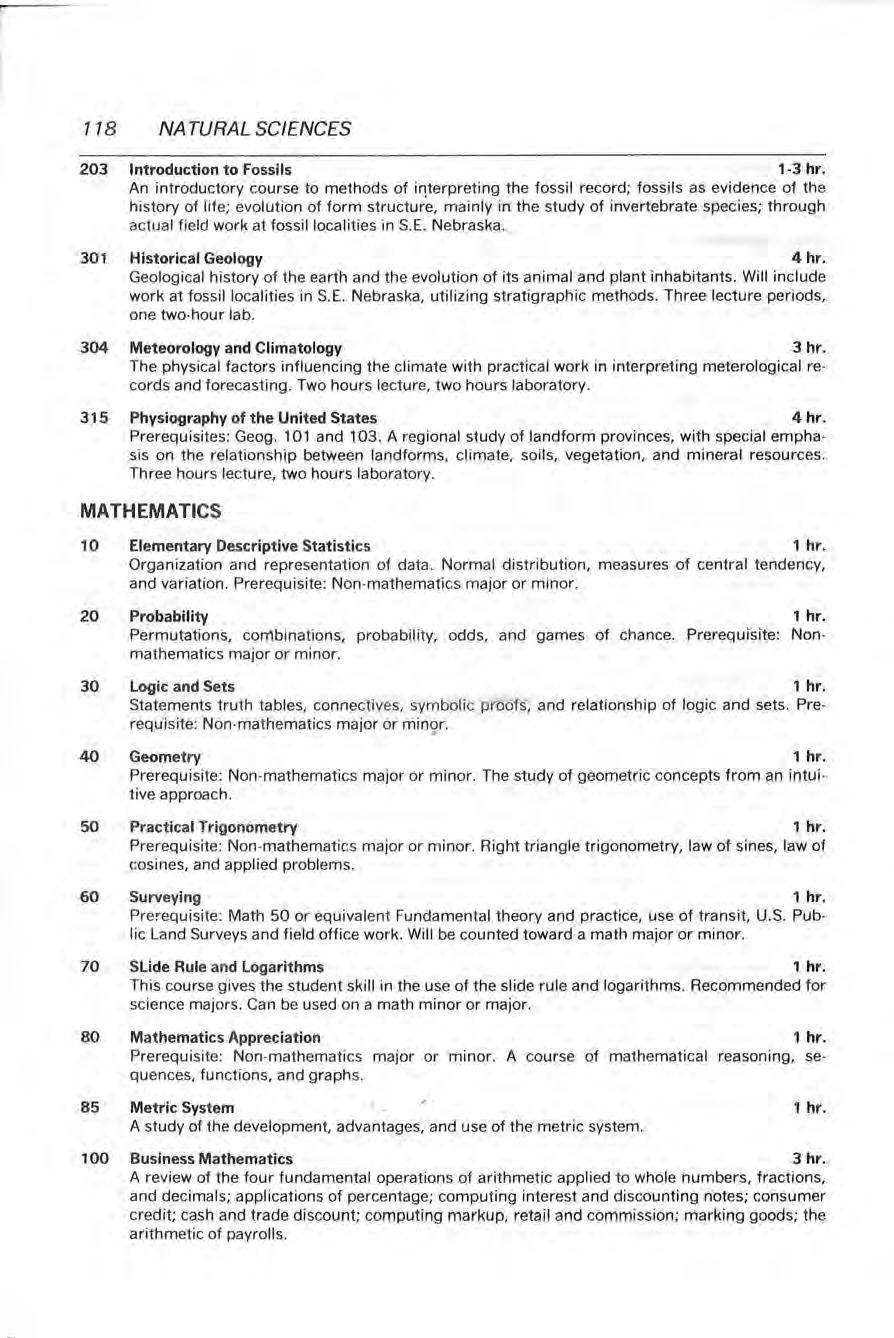
1 hr.
Prerequisite: Non-mathematics major or minor. Right triangle trigonometry, law of sines, law of cos ines, and applied problems.
60 Surveying
1 hr.
Pre~equisite: Math 50 or equ ivalent Fundamenta l theory and practice, use of transit, U.S. Public Land Surveys and field office work Will be counted toward a math major or minor.
70 Slide Rule and Logarithms
1 hr
This course gives the st udent skill in the use of the slide rul e and logarithms Reco mmended for sc ience majors. Can be used on a math minor or major.
80 Mathematics Appreciation
85
1 hr.
Prerequisite: Non-mathematics major or minor. A course of mathematical reasoning, sequences , functions, and graphs
Metric System
A study of the development, advantages, and use of the metric system.
100 Business Mathematics
1 hr.
3 hr .
A review of the four fundamental operations of arithmetic applied to whole numbers, fractions, and decimals; applications of percentage; computing intere st and discounting notes; consumer credit; cash and trade discount; computing markup, retail and commission; marking goods; th e arithmetic of payrolls.
118
101 College Algebra
3 hr.
Prerequisite: one year of high school algebra. For terminal students or those who specifically need algebra in certain pre-professional programs. Fundamental algebraic principles and subsequence algebraic processes. This course not to be taken for credit by students who have completed Math. 105.
102 Introduction to Data Processing
3 hr.
An introduction to the concepts and basic features of electronic computers. An overview of the makeup of computer systems and of the structure and usage of computer languages is presented. FORTRAN IV is used to illustrate the course and give the student direct computing experience.
105 Precalculus Mathematics
5 hr.
A course intended for the student who plans to pursue a college program requiring a substantial amount of training in mathematics. The content of this course includes an introduction to symbolic logic and set theory of applications, a study of the number system, elementary theory of groups and fields, an introduction to the function concert, and study of algebraic functions.
106 Precalculus Mathematics
5 hr.
Prerequisite: Math. 105. Content includes the study of trigonometric, exponential and logarithmic functions, and introduction to analytic geometry, and some calculus.
200 Basic Concepts of Mathematics
3 hr.
An introduction to the various number bases and the development of concepts fundamental to each. Other topics included are: elementary set theory, algebra, geometry, and problems related to the field of business; does not apply on the mathematics major.
204 FORTRAN Programming
3 hr.
Prerequisite: Math 102 or consent of instructor. The FORTRAN IV Language and its application to problem solving is discussed in detail. The student's work includes analyzing a problem and developing a program relative to this field of interest. Second semester.
300 Algebraic and Geometrical Concepts
3 hr.
Prerequisite: Math 200 or permission. A course dealing with algebraic and geometrical concepts. Specific topics include logic, sets, positive and negative numbers, equations and inequalities. Geometric phrases include measurements, space, plane, line and properties of such closed curves as the triangle, rectangle, and circle, as well as other figures with their properties developed intuitively; does not apply on the mathematics major.
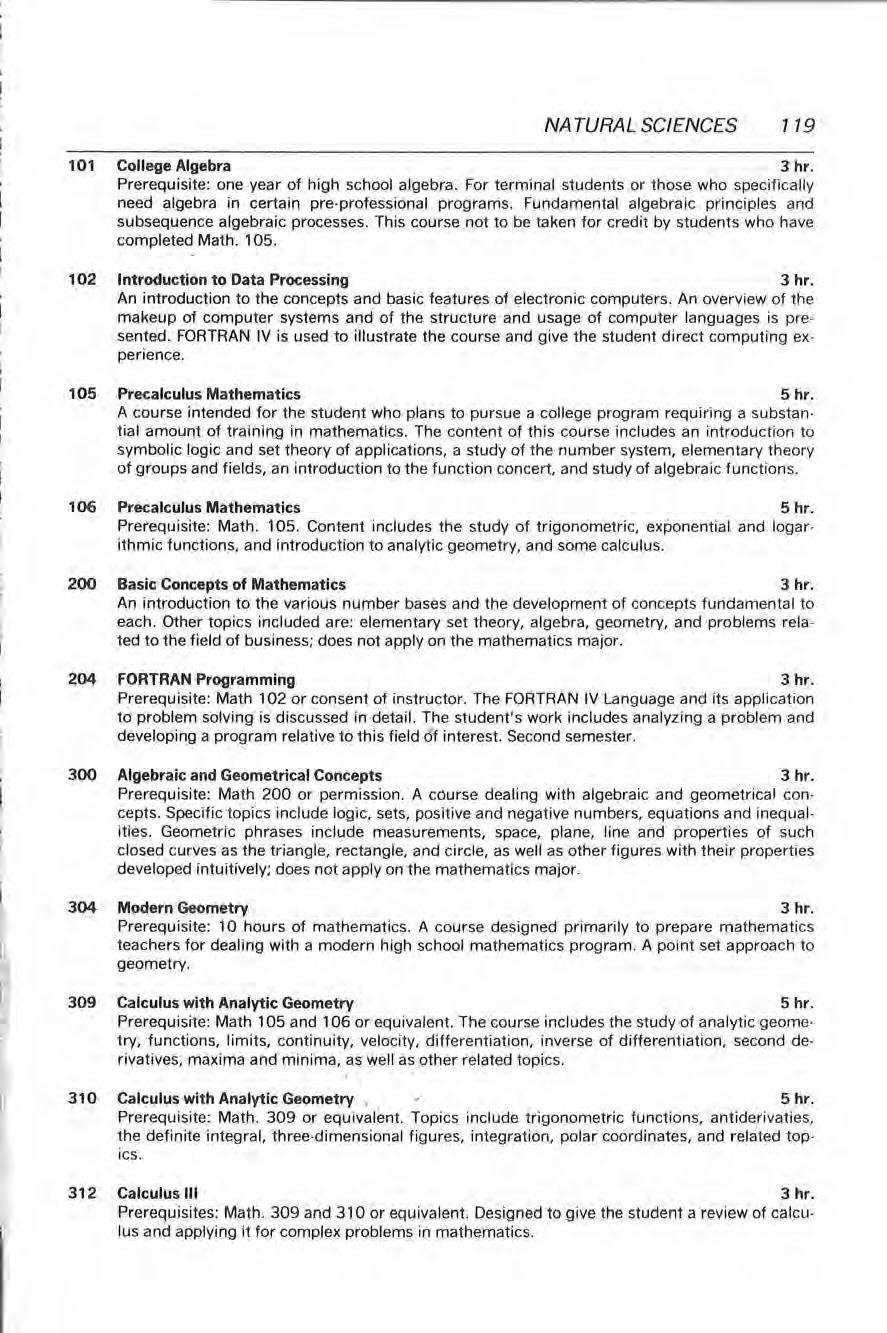
304 Modern Geometry
3 hr.
Prerequisite: 10 hours of mathematics. A course designed primarily to prepare mathematics teachers for dealing with a modern high school mathematics program. A point set approach to geometry.
309 Calculus with Analytic Geometry
5 hr.
Prerequisite: Math 105 and 106 or equivalent. The course includes the study of analytic geome• try, functions , limits, continuity, velocity, differentiation, inverse of differentiation, second derivatives, maxima and minima, as well as other related topics.
310 Calculus with Analytic Geometry ,
5 hr
Prerequisite : Math. 309 or equivalent. Topics include trigonometric functions, antiderivaties, the definite integral, three-dimensional figures, integration, polar coordinates, and related topics.
312 Calculus Ill
3 hr.
Prerequisites: Math. 309 and 310 or equivalent. Designed to give_the student a review of calculus and applying it for complex problems in mathematics.
NATURAL SCIENCES 119
340 Statistics
3 hr.
A study of the methods of summarizing and i nterpreting da ta, e lementary probability, and its relation to distributions. The meanings, importance, and app li ca tions of the normai and binomica l distributions Th e methods of ran dom sa mpling, testi ng of hypotheses, ana lysis of paired data, and interpretation of standardized test scores.
406 Modern Algebra
3 hr.
Prerequisites: Mat h 105, 106, 309 and 3 10 or equ iva lent. A study of va ri o u s alg eb r aic systems arising in modern mathematical com put at io n s. Control includ es a stud y of sets, mappings and operat ions, re lations, de velopme n t of rea l numbers systems, integra l domains and fields, po ly nom i al doma in s, and comp lex number f ield.
407 Modern Algebra
3 hr.
Continuation of Math. 406. A study of groups, vector spaces, lin ear transformations and matrices, li near eq u at ions and determinants, linear algebras, r in gs and Boolean a lgebras.
416 Different ial Equations
3 hr.
Formation of differential equat io n s, eq u ations of high order, linear equat ion w ith consta n t and var iab le co-e fficients, partia l differe nti at ion, application of geometry, mechanic s, and physics. St ud ents must have proficiency in ca lcu lu s
417G Introduction to Real Analysis
3 hr .
Prereq ui site: Math 310 Topics included are number, l imits, co nvergence, co ntinu i ty differentiabi li ty, the Re imann integra l, sequences, series, and spec ial funct ions of the Real Calculus

418G Linear Algebra
3 hr
The th eo ry of lin ear transformations in vector spaces, the representation of linear spaces in mat ri ces, lin ear functionals, and th e app li cat io n of these concepts.
419G Topology
3 hr.
A modern treatment of topology with emph asis on fundamental co ncepts and principal results of h omo logy theory, topolog ica l spaces, lir.i ear g r ap h s, set theory, metric interpretation, as well as other related topics.
PHYSICS
201 General Phys ics
4 hr .
Prerequisite: Mathematics 105. Three ho ur s c lasswork, two h our s laboratory. Mechanics, sound, and heat.
202 General Physics 4 hr.
Prerequisite: Physics 20 1 or per mi ss ion. Three hour s classwork, two h our laboratory. Li g ht, e lectr ic ity, a nd ma gnetis m.
302 Analytical Mechanics 3 hr .
Prerequisite: Phy sics 202 and Mat h 310. The development of t h e principl es of mechanics by the use of calc ulus a nd vector ana lysis.
304 Elements of Optics
4 hr .
Prerequisite: Physics 202. Three hours classwork, two h o ur s labora tory . Geometrical optics, physical opt ics, quantum opt ics, optica l•instruments, a nd polarization.
306 Astronomy 3 hr .
A bas ic course dealing with a st udy of the heavenly bodies , the so lar system, and the universe. Telescopic obse rvation is a part of this co urse.
307 Introduction to Modern Physics 4 hr.
Prerequisites: Physics 202 and Chem istry 101 Three hours classwo r k, two hours laboratory. Atomic and nuclear relativity. Bohr at om theory, quantum th eory, X-ray s, nucl ear instrum ents, radioactivity, nuclear reactions, and eleme ntary particles.
120
NATURAL SC I ENCES
NATURAL SCIENCES 121
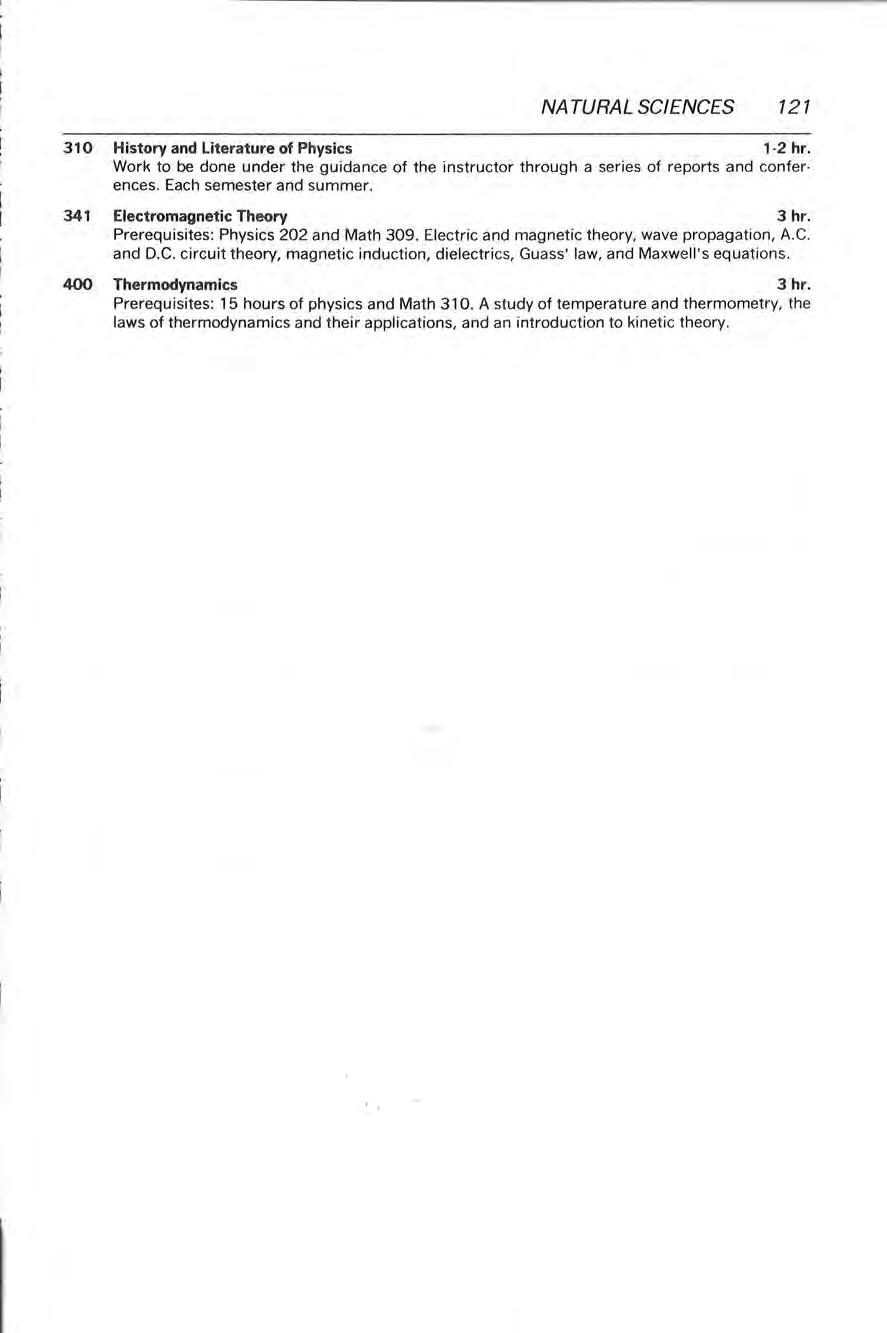
310 History and Literature of Physic s 1-2 hr. Work to be done under the guidance of the instructor through a series of reports and conferences. Each semester and summer.
341 Electromagnetic Th eo ry 3 hr.
Prerequisites: Physics 202 and Math 309. Electric and magnetic theory, wave propagation, A.C. and D.C. circuit theory, magnetic induction, dielectrics, Guass' law, and Maxwell's equations.
400 Thermodynamics 3 hr .
Prerequisites: 15 hours of physics and Math 310. A study of temperature and thermometry, th e laws of thermodynamics and their applications, and an introduction to kinetic theory.
PERFORMINGARTS
Division of Performing Arts
FINE ARTS
ART
101 Drawing I
A study of basic drawing techniques using a variety of drawing media.
102 Drawing II
3 hr.
3 hr.
Prerequisite: Art 101. Continuation of Draw in g I with emphasis on figure drawing and im proving of techniques.
111 Lettering
3 hr.
Single stroke. Gothic Roman and manuscript alphabets, poster design, and commercia l techniques.
203 Design I
A study of two-dimensional design with emphasis on co lor theory.
204 Design II
A study of three dimensional design using a var iety of media .
210 Water Color Painting
3 hr.
3 hr.
3 hr.
Prerequisites : Art 101, 102, 203. Compositions in color, using opaque, and transparent water color.
221 Printing Proces se s
3 hr.
History of the graphic arts of block printing, etch in g, lithography, and si l k screen printing Reading on the techniques of each process, followed by the making of prints in three or more of the methods.
300 Ceramics
3 hr.
Exper iences in hand built and thrown projects. Includes a basic study of glaze preparation and clay ana lysis.
305 Methods and Supervision
2 hr .
Prerequisites: Art 101, 103, and 203 or 204. Study of relation of art education to other school subjects; and contemporary art education teaching techniques, lesson plans, teaching experiences, and the ordering of mliterials Emphasis is also placed upon the use of materials in the schoo l art program.
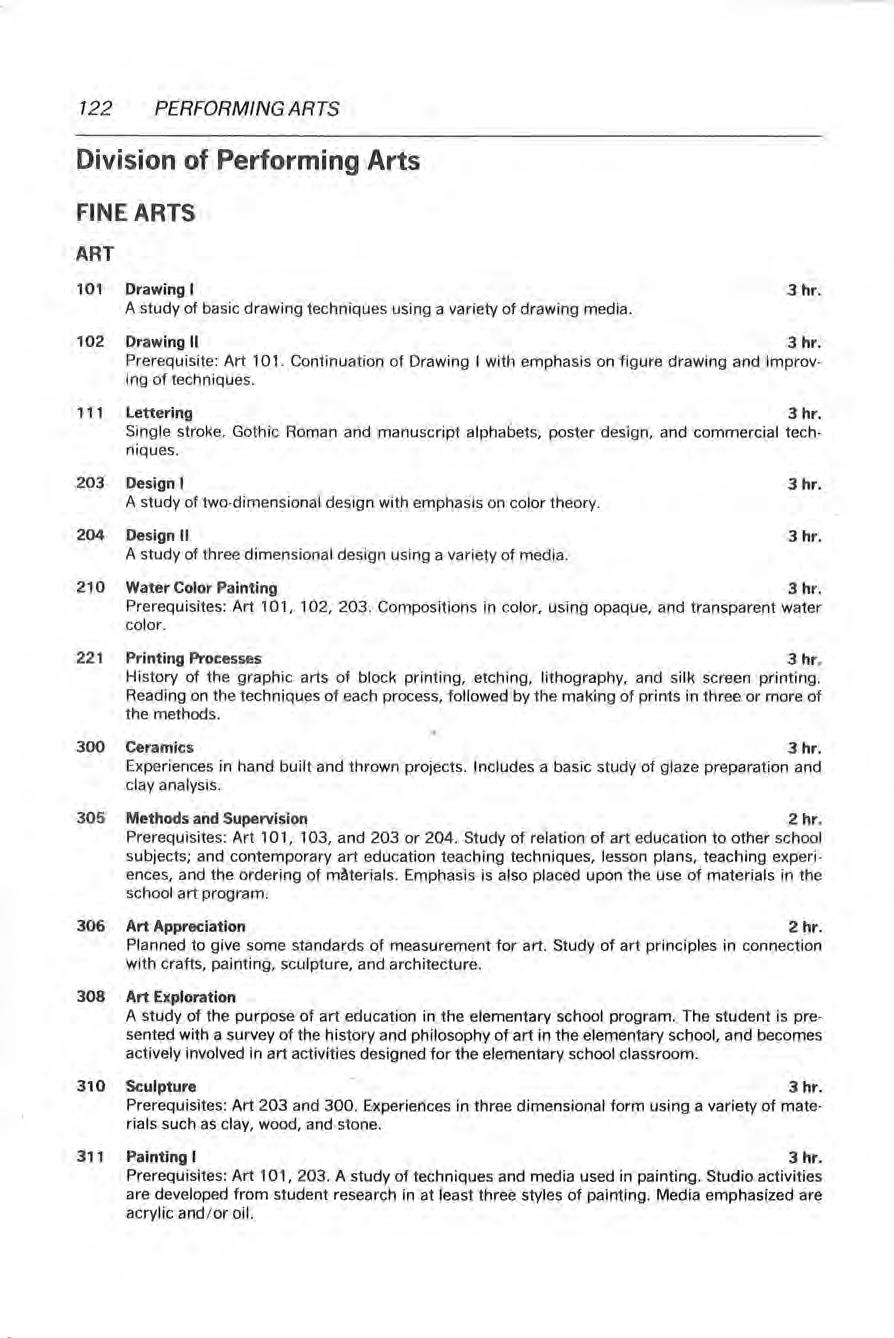
306 Art Appreciation
2 hr. Planned to give some standards of measurement for art Study of art principles in connection with crafts, painting, sculpture, and architecture.
308 Art Exploration .
A study of the purpose of art education in the elementary school program. The student is presented with a survey of the history and philosophy of art in the elementary school, and becomes actively involved in art activities designed for the elementary schoo l classroom.
310 Sculpture
3 hr.
Prerequisites: Art 203 and 300. E•xperier1ces in three dimensional form using a variety of materials such as clay, wood, and stone.
311 Painting I
3 hr.
Prerequisites: Art 101, 203. A study of techniques and media used in painting. Studio activities are developed from student research in at least three styles of painting. Media emphasized are acry lic and / or oil.
122
312 Painting II 3 hr.
Prerequisite: Art 311. Continuation of Painting I with emphasis on development of a personal sty le .
313 Mural Painting 3 hr.
Study of the history and procedures used in mural production. Group projects in the execution of murals.
317 Art History I 3 hr.
A study of painting, sculpture, and architecture from ancient times to the Renaissance.
318 Art History II 3 hr.
A study of art in the West since the Renaissance.
319 Midwestern Museums of Art 3 hr.
A survey of some of the major museums in the midwest, including field trips designed to promote on -site ana lysis of art collections.
400 Studio Activities
1-6 hr.
Prerequisite: Consent of instructor. Suggested for advanced art students wanting to gain additional competence in a particu lar area. The student may choose to do additiona l work in his area of interest.
MUSIC
19 Chorus 1 hr.
Open to all col lege students with consent of the instructor. Performance and study of representative choral works of all periods.
21A Band 1 hr.
(Fall Semester) This organization is primarily a marching band. It functions at Pep Rallies, Parades, and Footba ll Games during the fall semester The General Studies P E. Activity Requirement can be fulfilled by participating in Mu:;. 21 A. 4 hours attendance.
21B Band 1 hr.
This organization is primarily a Concert Band. During the semester concerts are presented both on and off campus. 3 hours attendance.
28
Choral Ensemble
A select membership for the study and performance of chora l works for small groups.
1 hr.
29 Instrumental Ensembles 1 hr. (Brass Choir) A se lect membership for the study and performance of brass composit ions for small emsemble 1 hr. (Woodwind Choir) A select membership for the study and performance of woodwind compositions for small ensemble. 1 hr. (Stage and Pep Band) This organization functions primarily as a pep band and for the performance and study of popular music.
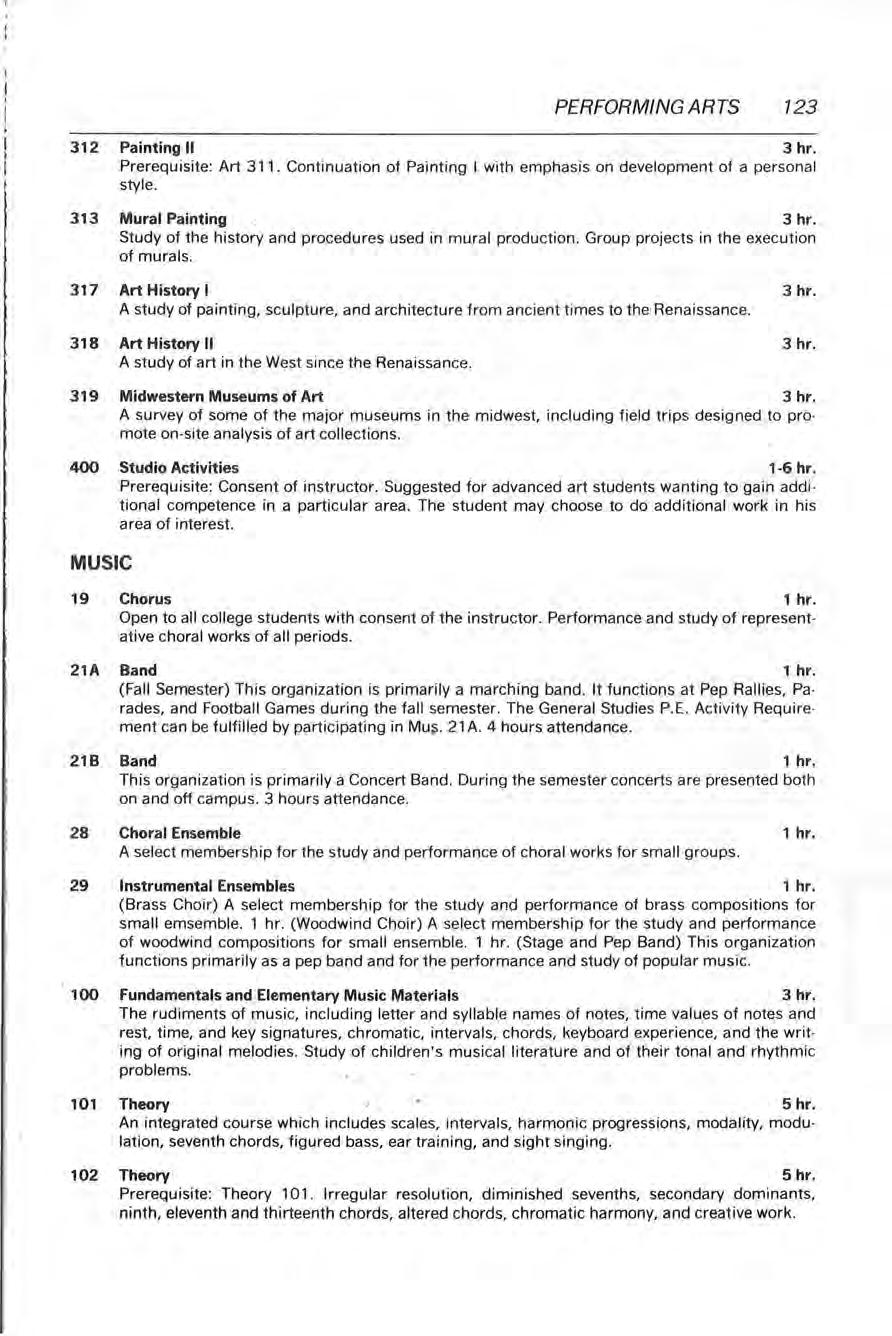
100 Fundamentals and Elementary Music Materials 3 hr. The rudiments of music, including letter and syl lab le names of notes, time va lu es of notes and rest, time, and key signatures, chromatic, intervals, chords, keyboard experience, and the writing of original melodies. Study of children's musical literature and of their tonal and rhythmic problems.
101 Theory 5 hr.
An integrated course which includes sca les, intervals, harmonic progressions, modality, modulation, seventh chords, figured bass, ear training, and sight singing.
102 Theory 5 hr.
Prerequisite: Theory 101. Irregular resolution, diminished sevenths, secondary dominants, ninth, eleventh and thirteenth chords, altered chords, chromatic harmony, and creative work.
PERFORMING ARTS 123
307 Form, Composition, and Counterpoint 4 hr. Prerequisites: Theory 101 , 102. Analyti cal st udy of the different forms a nd styles in m us ic and their application, including two and three part eighteenth century style, descant and invention . 308 Keyboard, Vocal or Instrumental Pedagogy
hr.
expe'rience in teaching appli ed music to the individua l for piano, voice, or instruments (May be repeated.)
hr
An orientation course presenting a survey of effective therapeutic uses of the elements of music.
311 Music Appreciation and History of Music
2 hr.
Various forms and styles of music, ranging from folk songs to opera, oratorio and symphony, analyzed and d iscussed through the use of records.
313 Music for Recreation
2 hr.
Practical guide for the planning and execut ion of music programs for community recreation, camping, correct ional and clinical institut ions, sen ior citizens, industry and the armed services .
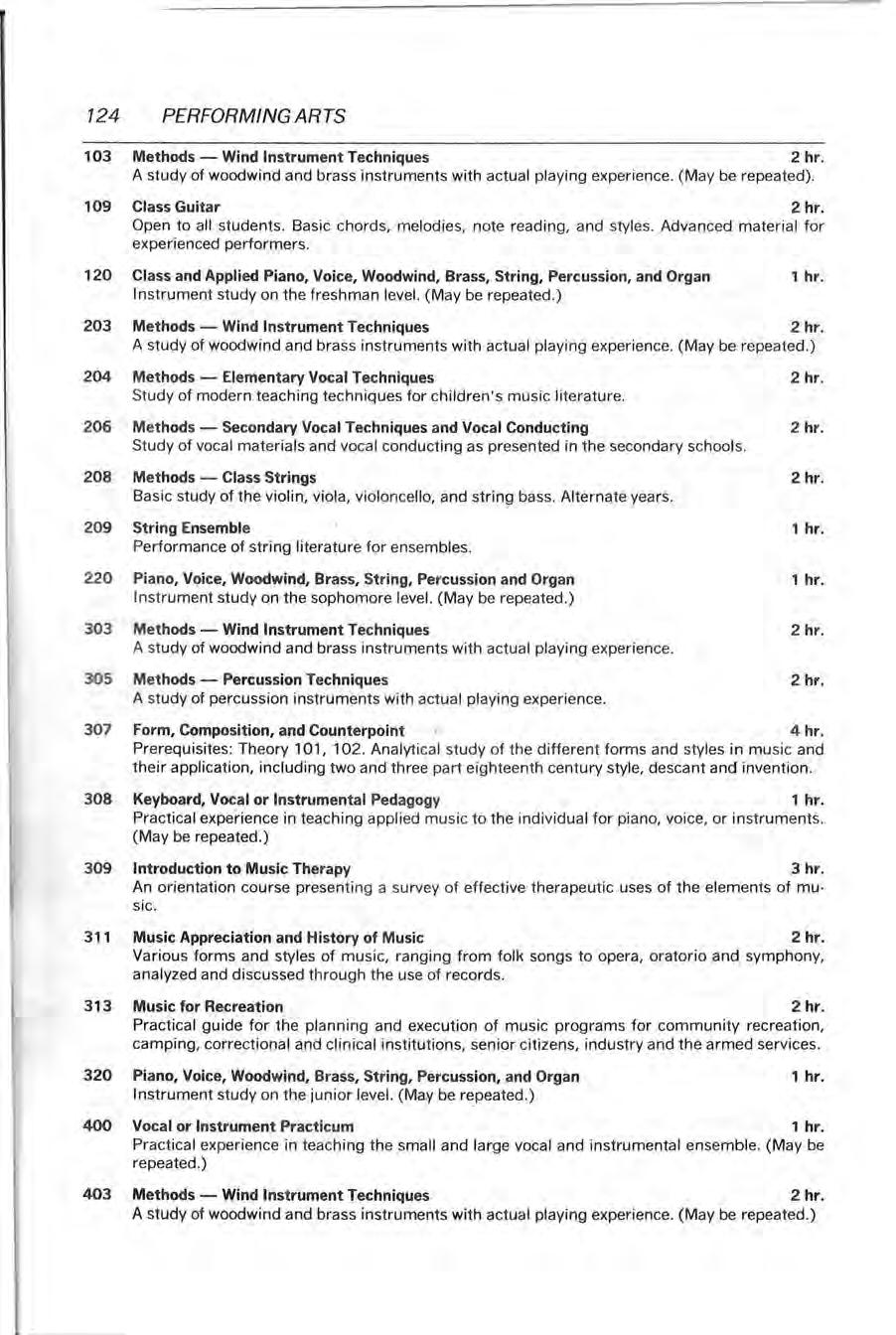
320 Piano, Voice, Woodwind, Brass, String, Perc ussion, and Organ Instrument study on the junior lev:el. (May be repeated.)
400 Vocal or Instrument Practicum
1 hr.
1 hr .
Practica l experience in teaching th e small and large voca l and instrumental ensemb le. (May be repeated.)
403 Methods - Wind Instrument Techniques
2 hr.
A study of woodwind and brass instruments with actual play i ng experience. (May be repeated )
124
103 Methods - Wind Instrument Techniques 2 hr . A study of woodwind and brass instruments with actual playing experience. (May be repeated). 109 Class Guitar 2 hr. Open to all students. Basic chords, melodies, note reading , and sty les. Advanced materi a l for experienced performers 120 Class and Applied Piano, Voice, Woodwind, Brass, String, Percussion, and Organ Instrument study on the freshman level. (May be repeated.) 1 hr. 203 Methods - Wind Instrument Techniques 2 hr. A study of woodwind and brass instruments w ith ac tual playing experience. (May be repeated.) 204 Methods - Elementary Vocal Techniques 2 hr. Study of mod ern teaching techniques for chi ldren's mu s ic lite rature. 206 Methods - Secondary Vocal Techniques and Vocal Conducting 2 hr Study of vocal materials and vocal conducting as presented in the secondary schools. 208 Methods - Class Strings 2 hr. Ba s ic study of the v io l in, viola, violoncello, and string bass. Alternate years. 209 String Ensemble 1 hr. Performance of string literature for e n se mbles. 220 Piano, Voice, Woodwind, Brass, String, Percussion and Organ 1 hr. Instrument study on the sophomore level. (May be repeated.) 303 Methods - Wind Instrument Techniques 2 hr. A study of woodwind and brass instruments with ac tu a l playing experience. 305 Methods - Percussion Techniques 2 hr. A st udy of percussion instruments with actual playing experience.
PERFORMINGARTS
1
Practical
3
309 Introduction to Music Therapy
PERFORMING ARTS 125
404 Conducting 2 hr
Knowledge of baton technique , reading and interpretation of a musical score and the pr ese ntation of techniques in rehearing instrume ntal organizations.

406 History of Music 3 hr.
The development of music from antiquity to the present, with sty listic analysis of music exa mples.
408 Instrumentation 2 hr
Practical sc oring for band and orchestra. Required of ca ndid a t es for the A B in Education degree in Music
409 Senior Recital
A public re c ital is required for all students majoring in mu s ic.
420 Piano, Voice, Woodwind, Brass, String, Percussion, and Organ Instrument study on th e senior level. (May b e rep eated.)
440 Marching Band Techniques
Te c hniques and problems, planning shows and other publi c a pp ea rance s
2 hr. 1 hr. 2 hr
Division of Physical Education
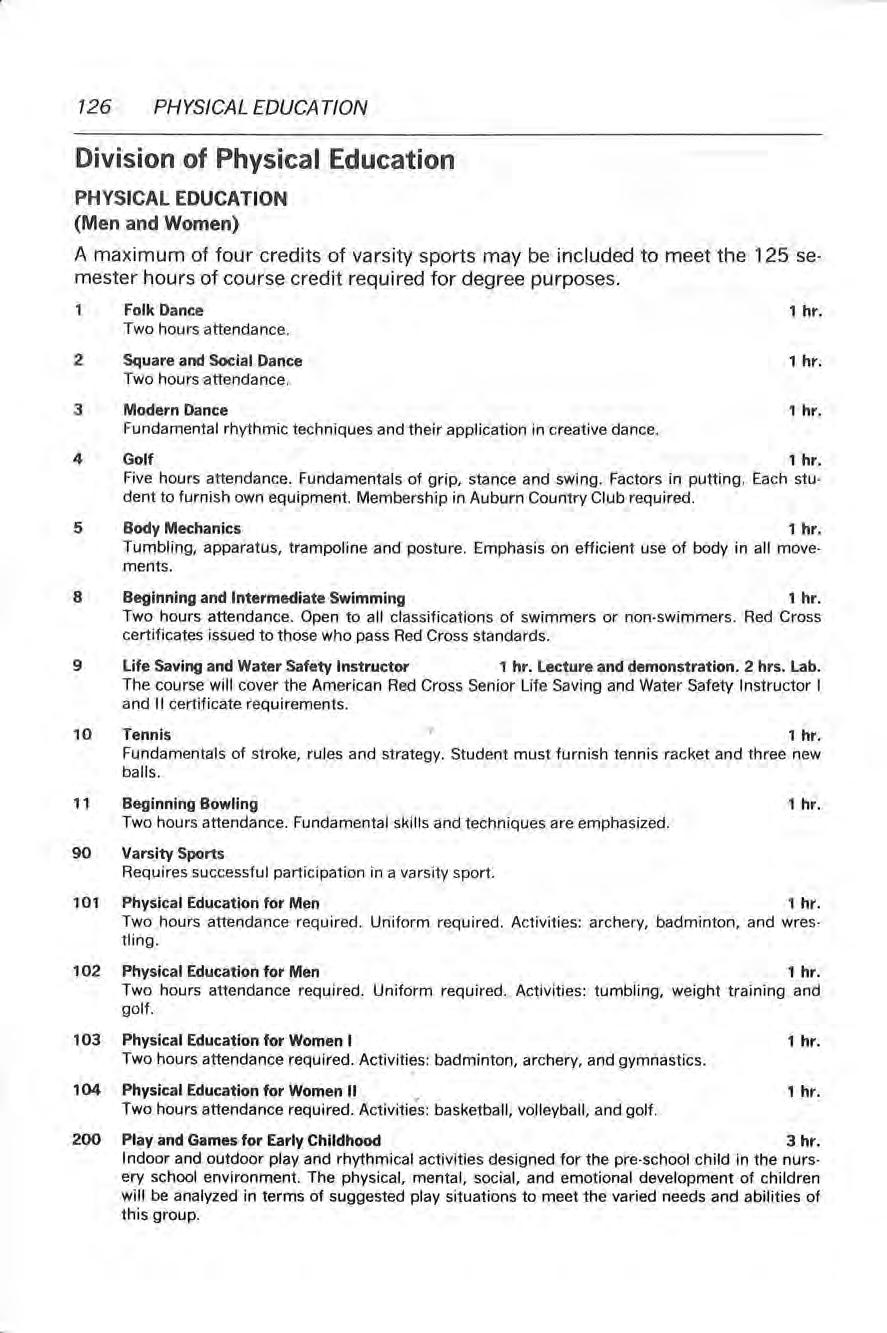
PHYSICAL EDUCATION (Men and Women)
A maximum of four credits of varsity sports may be includ ed to meet the 125 semester hours of course credit requ i red for degree purposes.
activities designed for the pre-school child in the nursery sc hool environment. The physical, mental, soc ial, and emotional development of children
be analyzed in terms of suggested play situations to meet the varied needs and a biliti es of this group.
126 PHYSICAL EDUCA T/ON
2 3 4 Folk Dance Two hours attendance Square and Social Dance Two hours attendance. Modern Dance Fundamental rhythmic techniques and their application in creat ive dance. Golf 1 hr. 1 hr . 1 hr. 1 hr . Five hours attendance. Fundamentals of grip, stance and sw ing Factors in putting. Eac h student to furnish own equ ip ment. Membership in Auburn Country Club required . 5 Body Mechanics 1 hr. Tumbling, apparatus, trampoline and posture. Emphas is on eff ici ent use of body in all movements. 8 Beginning and Intermediate Swimming 1 hr Two hours attendance. Open to a ll classifications of swimmers or non-swimmers. Red Cross cert ificates issued to those who pass Red Cross standards. 9 Life Saving and Water Safety Instructor 1 hr. Lecture and demonstration 2 hrs Lab The course will cover the American Red Cross Sen ior Life Saving and Water Safety In structor I and II cert ificate requ irements 10 Tennis 1 hr. 11 Fundamentals of stro ke, rules and strategy. St ud ent must furnish tenni s racket and three new balls. Beginning Bowling 1 hr Two hours atte nd a nce. Fundamenta l ski ll s and techniques are e
90 Varsity Sports Requires succe ssfu l participation in
101 Physica l Education for Men 1 hr. Two hours atte nd ance
badminton, and wrestling. 102 Physical Education for Men 1 hr. Two hours attendance
Activities: tumbling, weight training and go lf 103 Physical Education for Women I 1 hr . Two hours attendance required. Activities: badminton, archery, and gymnastics 104 Physical Education for Women II
hours attenda nce
1 hr. 200 Play and Games for Early Childhood 3 hr. Indoor and outdoor
and
mph as ized.
a vars ity sport.
required. Uniform required. Activities: arc hery,
required. Unifo rm required.
Two
required. Act iviti e's: basketball, voll eyba ll, a nd golf.
play
rhythmical
will
Scope of
field of physical educat ion and its relation to modern educational theory; history, principles of physical education furnished by the basic sciences, and the philosophies of physical education.
hours attendance. In struction in tumbling, trampoline, mini-trampoline, side horse, vaulting box, high bar, paralle l bar, and balancing Uniform required.
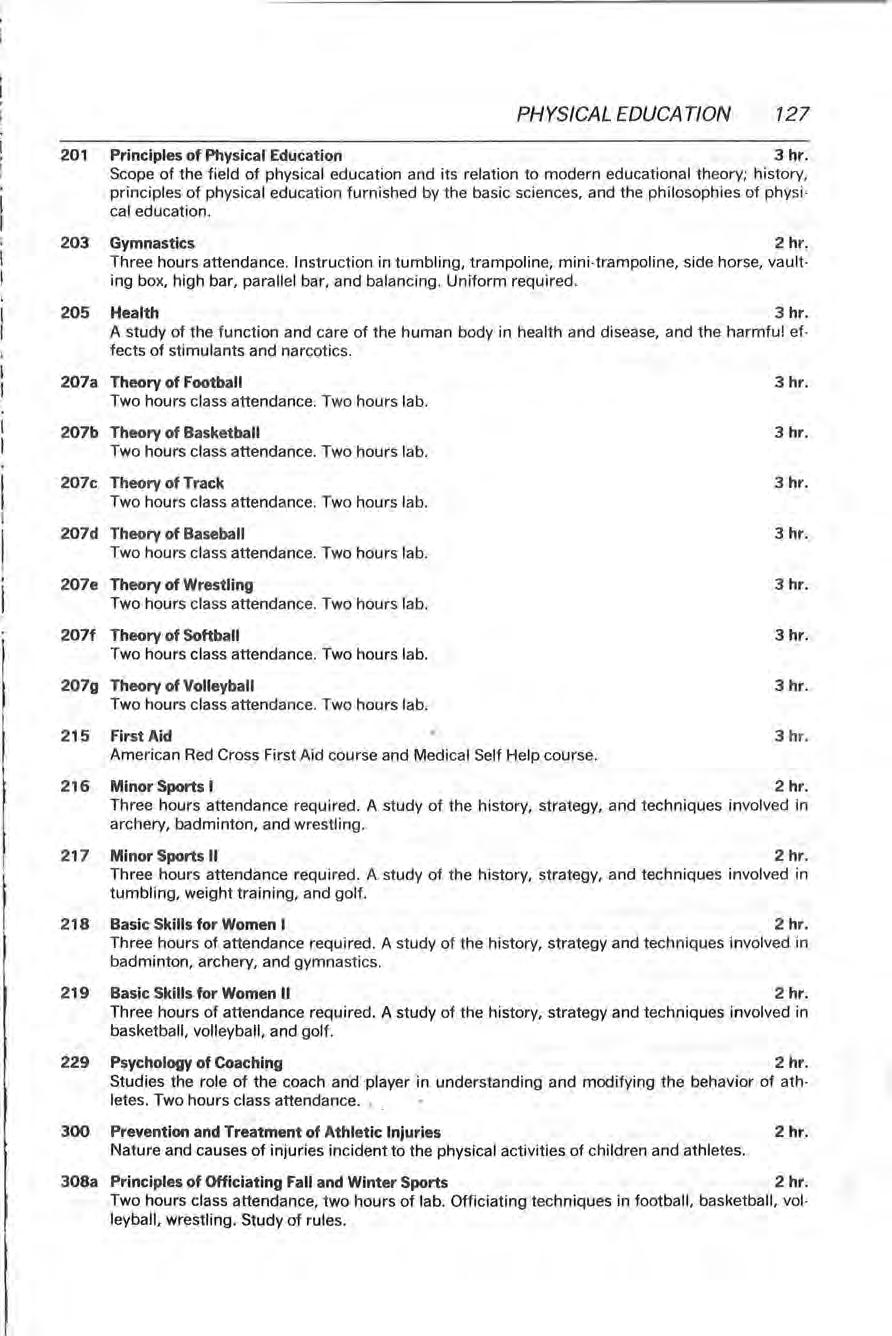
A study of the function and care of the human body in health and disease, and the harmful effects of stimul ants and narcotics.
hours attendance required A study of the history, strategy, and techniques invo lved in tumb li ng, weight training, and golf.
A study
the
A study
the role of the coach ancf·piayer 1n understanding and modifying the behavior of athletes. Two hours class attendance. ,
hours class attendance, two hours of lab. Officiating techniques in football, basketball, volleyball, wrestling. Study of ru les
PHYSICAL £DUCA TION 127 201 Principles of Physical Education 3 hr.
203 Gymnastics 2 hr.
205 Health 3 hr. 207a 207b · 201c 207d 207e 207f 207g 215
the
Three
Theory of Football 3 hr. Two hours class attendance. Two hours lab Theory of Basketball 3 hr. Two hours class attendance. Two hours lab. Theory of Track 3 hr . Two hours class attendance Two hours lab. Theory of Baseball 3 hr. Two hours class attendance. Two hours lab. Theory of Wrestling · 3 hr. Two hours class attendance. Two hours lab. Theory of Softball 3 hr. Two hours class attendance. Two hours lab. Theory of Volleyball 3 hr . Two hours c la ss attendance. Two hours lab First Aid 3 hr . American Red Cross First Aid course and Medical Self Help course. 216 Minor Sports I 2 hr. Three hours attendance required. A study of the history, strategy, and techniques involved in archery, badminton, and wrestling. 217 Minor Sports II 2 hr. Three
218 Basic Skills for Women I 2 hr. Three
219 Basic Skills for Women II 2 hr. Three
Psychology of Coaching 2 hr.
300 Prevention and
of
2 hr. Nature
causes of
.
of
2
Two
hours of attendance required.
of
history, strategy and techniques involved in badminton, archery, and gymnastics.
hours of attendance required.
of the history, strategy and techniques involved in basketball, volleyball, and golf 229
Studies
Treatment
Athletic Injuries
and
injuries incident to the physica l activities of ch ildren and athletes
308a Principles
Officiating Fall and Winter Sports
hr.
PHYSICAL EDUCATION
308b Princ iples of Offic iating Spring Sports
2 hr. Two hour s class attendance, two hours of lab. Officiating techniques in baseball , softball, track and field. Study of rul es.
309 Orga niz at ion and Admin istration of Progr ams in Phys ica l Ed ucation and Recreation
2 hr . Consideration of general principl es of ad ministrativ e techniques and responsibilities and related to fields of Phy s ical Education and Rec rea tion
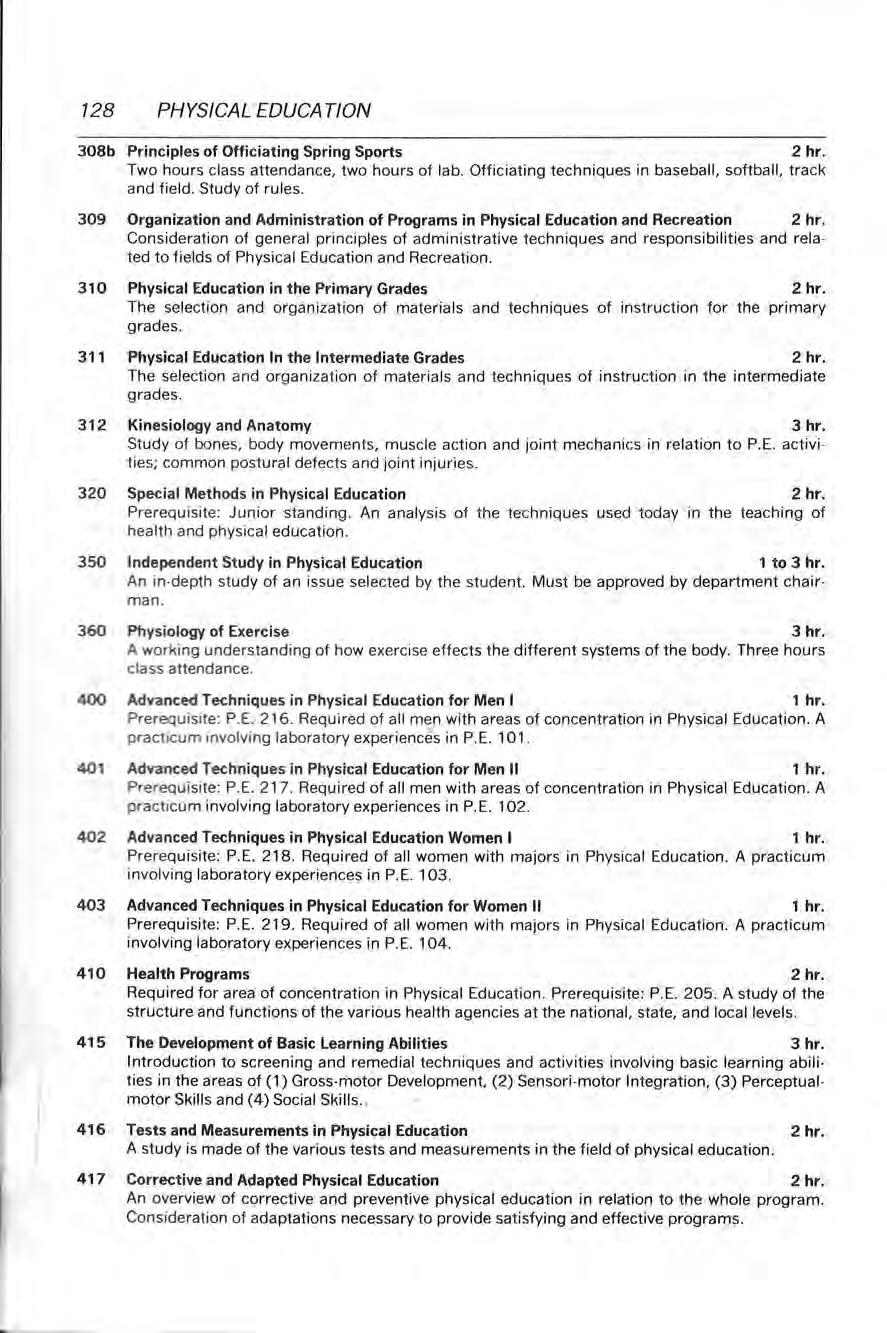
310 Physical Education in the Primary Grades
2 hr. The selection and organization of materials a nd techniques of in st ru ction for the primary grades.
31 1 Physica l Educat ion In the Intermediate Grades
2 hr. The selection a nd organization of mater ial s and te c hniqu es of in str uction in the intermediate grades.
3 12 Kinesiology and Anatomy
3 hr. St udy of bones, body mo ve m ents, muscle action and joint mechani cs in relation to P. E. activiti es; common postura l defects a nd joint injuri es
320 Special Methods in Physical Educat ion
2 hr.
Prerequisite: Jun ior sta ndin g An a na ly sis of th e techniques u sed today in th e t eac hing of health and physica l ed ucation
350 Independent Study in Physical Education
1 to 3 hr. An i n -dept h st udy of an iss u e se lected by th e student. Mu st be approved by department chairman.
360 Physiology of Exerc ise
3 hr.
Three hours cla ss attendance
A working understanding of how exercise effects the diff erent systems of the body
400 Advanced Techniques in Physical Education for Men I
1 hr.
Prerequi site : P.E. 216. Requ i red of a ll m en with areas of concentration in Physical Education. A pract ic um involv i ng laboratory exper ienc es in P. E. 101.
401 Advanced Techniques in Physical Education for Men II
1 hr.
Prerequisi te : P.E 2 17 Required of all men with areas of concentration in Physi ca l Edu ca tion. A practic um involving laboratory experiences in P E 102.
402 Advanced Techniques in Phy sica l Education Women I
1 hr.
Prerequ isite: P E. 218. Required of all wom en with maj o r s in Phy sica l Education. A practicum inv o lv ing laboratory experiences in P.E. 103.
403 Advanced Techniques in Physical Education for Women II
1 hr.
Prerequisite: P.E. 219. Required of all women with majors in Physical Education. A practicum involving laboratory experiences in P.E. 104 .
410 Health Programs
2 hr.
Required for area of c oncentration in Physi ca l Education. Prerequisite: P. E. 205. A study of the structure and functions of the various health agencies at the na tional, state, and local level s
415 The Deve lopment of Basic Learning Abilities
3 hr.
Introduction to screening and remedial te c hniqu es and ac tivities involving basic learning abilities in the areas of (1) Gross-motor Development, (2) Sensori-motor Integration , (3) Perceptualmotor Skills and (4) Social Skills. , .
416 Tests and Measurements in Phys ical Education
A study is made of the various tests and measurements in the field of physical education.
417 Correct ive and Adapted Physical Education
2 hr.
2 hr.
An overv iew of corrective and prev e ntive physical education in relation to the whole program Consideratio n of adaptations neces sa ry to provide satisfying and effective programs.
128
418 Administration of lnterschool Athletics
2 hr. Includes a history of the development of athletic programs, a study of various national and state athletic organizations, the role of athletics in education, and the responsibilities of the athletic director.
425 Current Problems in Physical Education
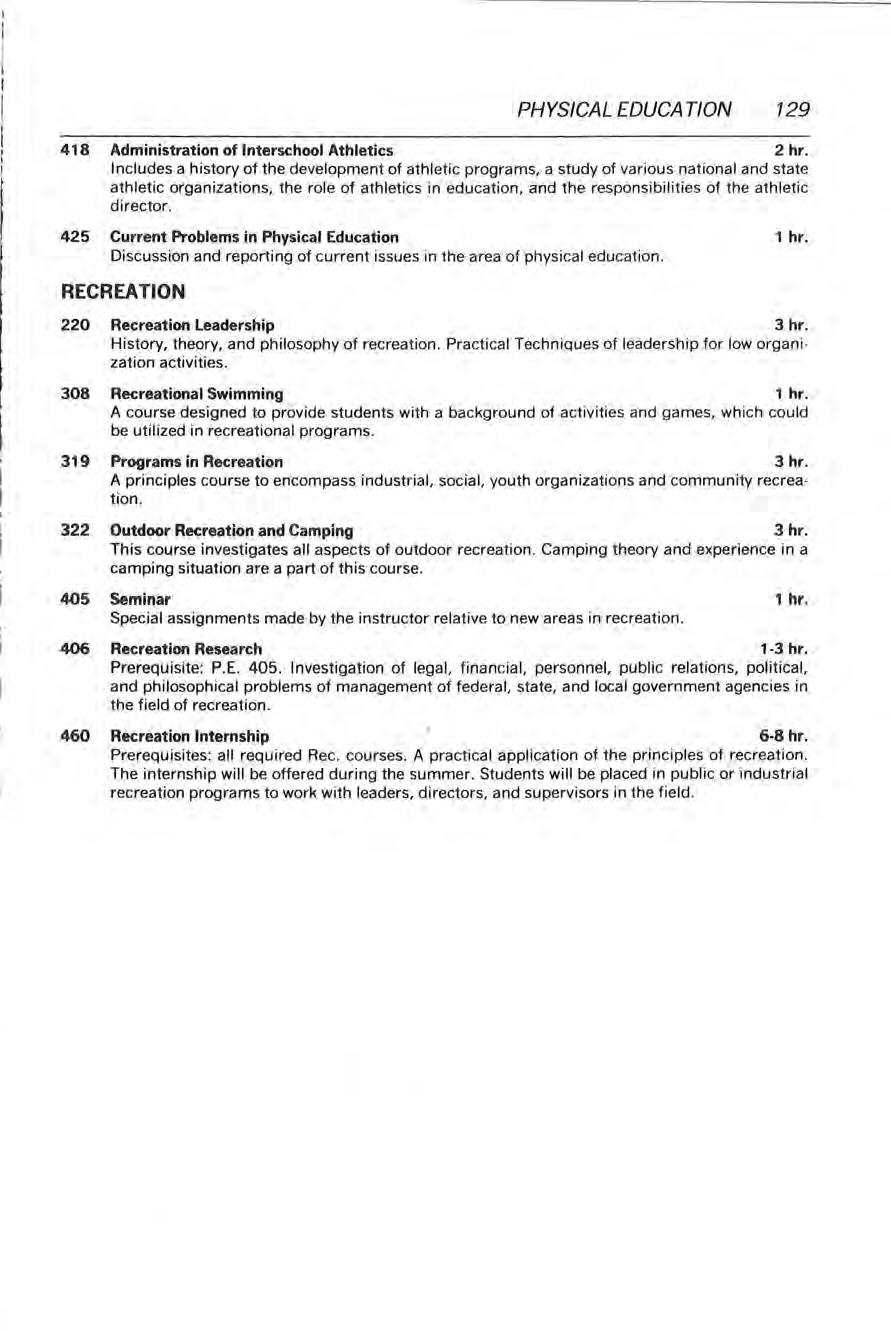
1 hr. Discussion and reporting of current issue s in the area of physical education.
RECREATION
220 Recreation Leadership
3 hr. History, theory, and philosophy of recreation. Practical Techniques of leadership for low organization activities.
308 Recreational Swimming
1 hr .
A course designed to provide students with a background of activities and games, which could be utilized in recreational programs.
319 Programs in Recreation
3 hr.
A principles course to encompass industrial, social, youth organizations and community recreation.
322 Outdoor Recreation and Camping
3 hr.
This course investigates all aspects of outdoor recreation Camping theory and experience in a camping situation are a part of this course.
405 Seminar 1 hr. Special assignments made by the instructor relative to new areas in recreation.
406 Recreation Research
1-3 hr.
Prerequisite: P E 405 Investigation of legal, financial, personnel, public relations, political, and philosophical problems of management of federal, state, and local government agencies in the field of recreation.
460 Recreation Internship
6-8 hr.
Prerequisites: all required Rec. courses. A practical application of the principles of recreation . The internship will be offered during the summer. Students will be placed in public or industrial recreation programs to work with leaders, directors, and supervisors in the field
PHYSICAL £DUCA TION 129
Board of Trustees of The Nebraska State Colleges
College Personnel
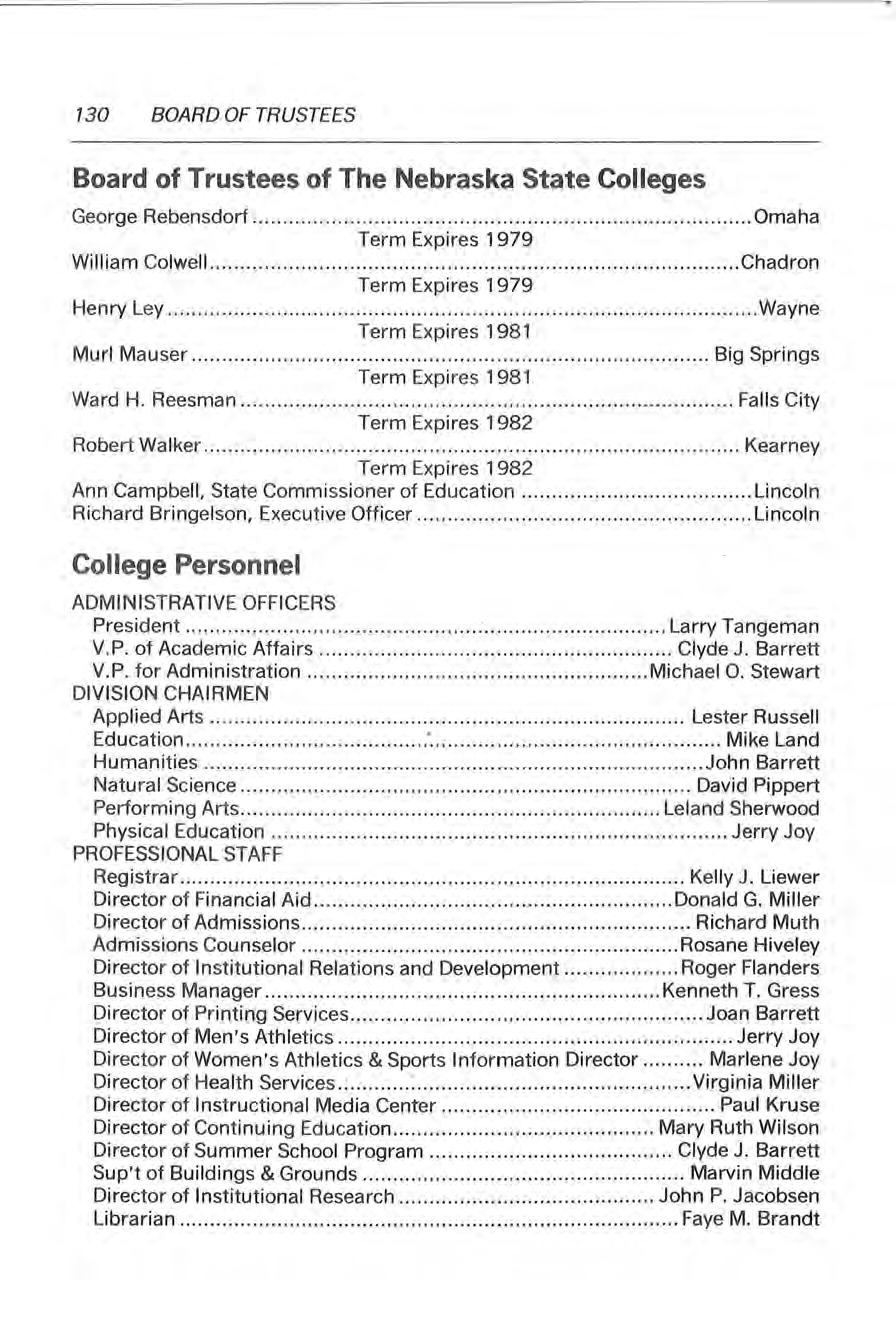
130 BOARD OF TRUSTEES
George Rebensdorf Omaha Term Expires 1979 William Co lwell Chadron Term Expires 1979 Henry Ley .. ... .... ...... .. .... .. ........... .. . ..... .......... .......... ........ .. ......................... Wayne Term Expires 1981 Muri Mauser Big Springs Term Expires 1981 Ward H . Reesman ............................... ..... .......... . ................ .... ...... .. ...... Fa ll s City Term Expires 1982 Robert Walker ........................................ .. ... .. .... . ............................ . ....... Kearney Term Exp ires 1982 Ann Campbe ll, St ate Commiss io ner of Educat ion Lincoln Rich ard Bringe lson, Executive Officer Lincoln
ADMINISTRATIVE OFF IC ERS President .- Larry Tangeman V.P. of Academic Affairs ........... .. ............................. . ............... Clyde J. Barrett V. P. for Administration ... .... .................. .. .... .... . .. ............... ... Michael 0. Stewart DIVIS ION CHAIRMEN App li ed Arts ...... ... ......... . ... ... ....... .. .... ........ ............ . ........ . ......... . Lester Russell Education Mike Land Humanities John Barrett Natura l Science ............................. ... ..................... ........... .. ..... ... David Pippert Performing Arts ................ ...... .......... ...... . ... . .. .... . ................... Leland Sherwood Physical Educat ion Jerry Joy
STAFF Registrar Kelly J. Liewer Director of Financial Aid Donald G. Miller Director of Admiss ion s .. .... ... .... ..... .......................... ...... ....... ...... . Richard Muth Admissions Counselor ...... ... .......... ....... ........ ... .. ...... ............. .... Rosane Hiveley Director of"lnstitut io nal Relations and De velopment Roger Flanders Business Manager ............ ............ .. .. . ..... . .............................. Kenneth T. Gress Director of Pr intin g Services Joan Barrett Director of Men's Athletics Jerry Joy Director of Women's Athletics & Sports Inform ation Director ... .... ... Mar lene Joy Director of Health Serv ice s. : .- : : Virginia Miller Director of Instruct ional Media Center ....................................... .. .... Pau l Kruse Director of Cont inuin g Educat ion ........... ........ . ........ .. ..... ........ Mary Ruth Wilson Director of Sum mer Sc hool Program .......... .......... ...... ..... ..... .. .. Clyde J. Barrett Sup't of Buildings & Grounds .......... ........ .. ........ ... .... .. ..... ........ ... Marvin Midd le Director of Institutional Research John P Jacobsen Librarian Faye M. Brandt
PROFESSIONAL

COLLEGE PERSONNEL 131
Librarian .. ........ ...... .. .... ... .... ..... .... ... ..... .. ................. Sharon Mccaslin
Librarian ....................... .. ... ...... .... .. ................................ Patti Spare
of Data Processing Stanley Mccaslin
of Student Teaching ............... ... ......... ... ........................ Evan Van Zant
for Student Development. ... ..... .. .. . .. .... ...... . .. .. . .. ....... ... ... .. .. Myron Apilado
of Placement .. ... ..................... ........ ........ ................ ....... .. Don Schu lz e
of Intra murals & Recreat ion Tom Fitzgerald
of Musical Activities ... . ....... .. ...... ........ . ........ ....... ........ Gilbert E. Wilson
of Bookstore .. . .... ....................... .. . .... . ..... ....... ................ Jeanie Jones
of Food Se rvic e
Assistant
Reference
Director
Director
Dean
Director
Director
Director
Manager
Manager
Bill Andrews
132 FACULTY Faculty
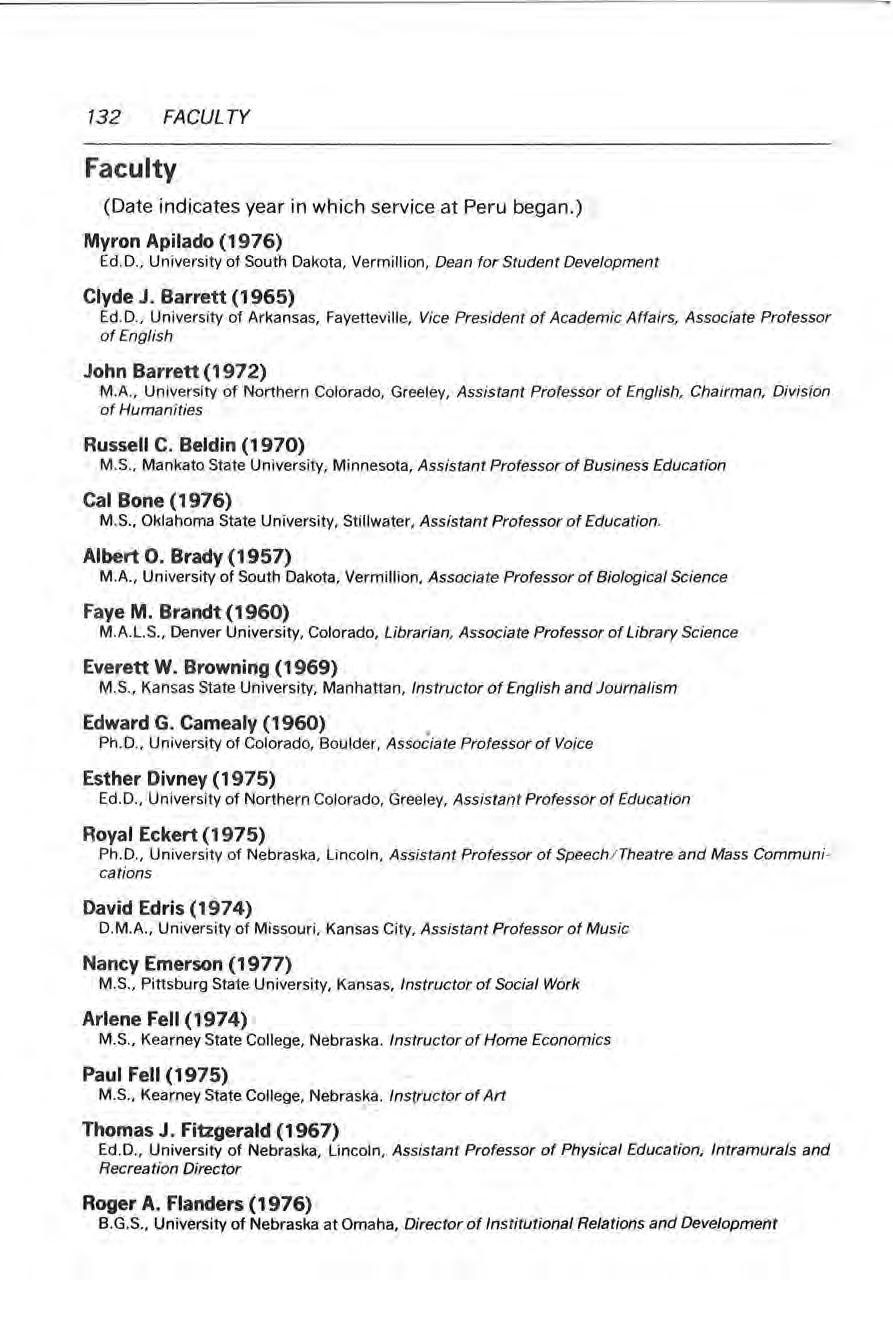
(Date indicates year in which service at Peru began.)
Myron Apilado (1976)
Ed. D , University of South Dakota, Vermillion, Dean for Student Development
Clyde J . Barrett (1965)
Ed D., University of Arkansas, Fayetteville, Vice President of Academic Affairs, Associate Professor of English
John Barrett (1972)
M.A., Univers ity of Northern Colorado, Greeley, Assistant Professor of English, Chairman, Division of Humanities
Russell C. Beldin (1970)
M.S ., Mankato State University, Minnesota, Assistant Professor of Business Education
Cal Bone (1976)
M S , Oklahoma State University, Stillwater, Assistant Professor of Education.
Albert 0. Brady (1957)
M.A., University of South Dakota, Vermillion, Associate Professor of Biological Science
Faye M. Brandt (1960)
M A.L.S , Denver University, Colorado, Librarian, Associate Professor of Library Science
Everett W. Browning (1969)
M S., Kan sas State University, Manhattan, Instructor of English and Journalism
Edward G. Camealy (1960)
•
Ph.D., University of Colorado, Boulder, Associate Professor of Voice
Esther Divney (19 75 )
Ed . D., University of Northern Colorado, Greeley, Assistant Professor of Education
Royal Eckert (1975)
Ph D., Universi ty of Nebraska, Lincoln, Assistant Professor of Speech / Theatre and Mass Communications
David Edris (1974)
D.M.A , University of Missouri, Kansas City, Assistant Professor of Music
Nancy Emerson (1977)
M S , Pittsburg State University, Kansas, Instructor of Social Work
Arlene Fell (1974)
M S. , Kearney State College, Nebraska Instructor of Home Economics
Paul Fell (1975)
M S , Kearney State College, Nebras~~- Ins tructor of Art
Thomas J. Fitzgerald (1967)
Ed D , University of Nebraska, Lincoln, Assistant Professor of Physical Education, lntramurals and Recreation Director
Roger A. Flanders (1976)
B G S , University of Nebraska at Omaha, Director of Institutional Relations and Development
Pamela Gere (1976)
M.A., University of Illinois, Urbana, In structor of Music
Patricia A. Gilbert (1976)
M.A., University of Northern Iowa, Cedar Fall s, Instructor of Physical Education
Terry Gilliland (1977)
M.S., Kearney State College, Nebraska, Instructor of Physical Education
Susan Gladstone (1977)
M B A., Northwest Missouri State University, Maryville , Instru c tor of Business
Kenneth T. Gress (1969)
B.A ., Peru State College, Nebraska, Business Manager
Richard Gulizia (1974)
Ed . D., University of Nebraska, Lincoln, Assistant Professor of Education.
John Hahn (1968)
M.A., University of Minnesota, Minneapolis, Associate Professor of Political Science
Fredrick Hamann (1973)
M.S., Fort Hays Kansas State University, Hays, Assistant Professor of Science
Jack Hamilton (1972)
M.S ., Pittsburg State University, Kansas , Assistant Professor of Business Education
Wreathea Hicks (1968)
M .A., Emporia Kansas State University, Emporia, Assistant Professor of English
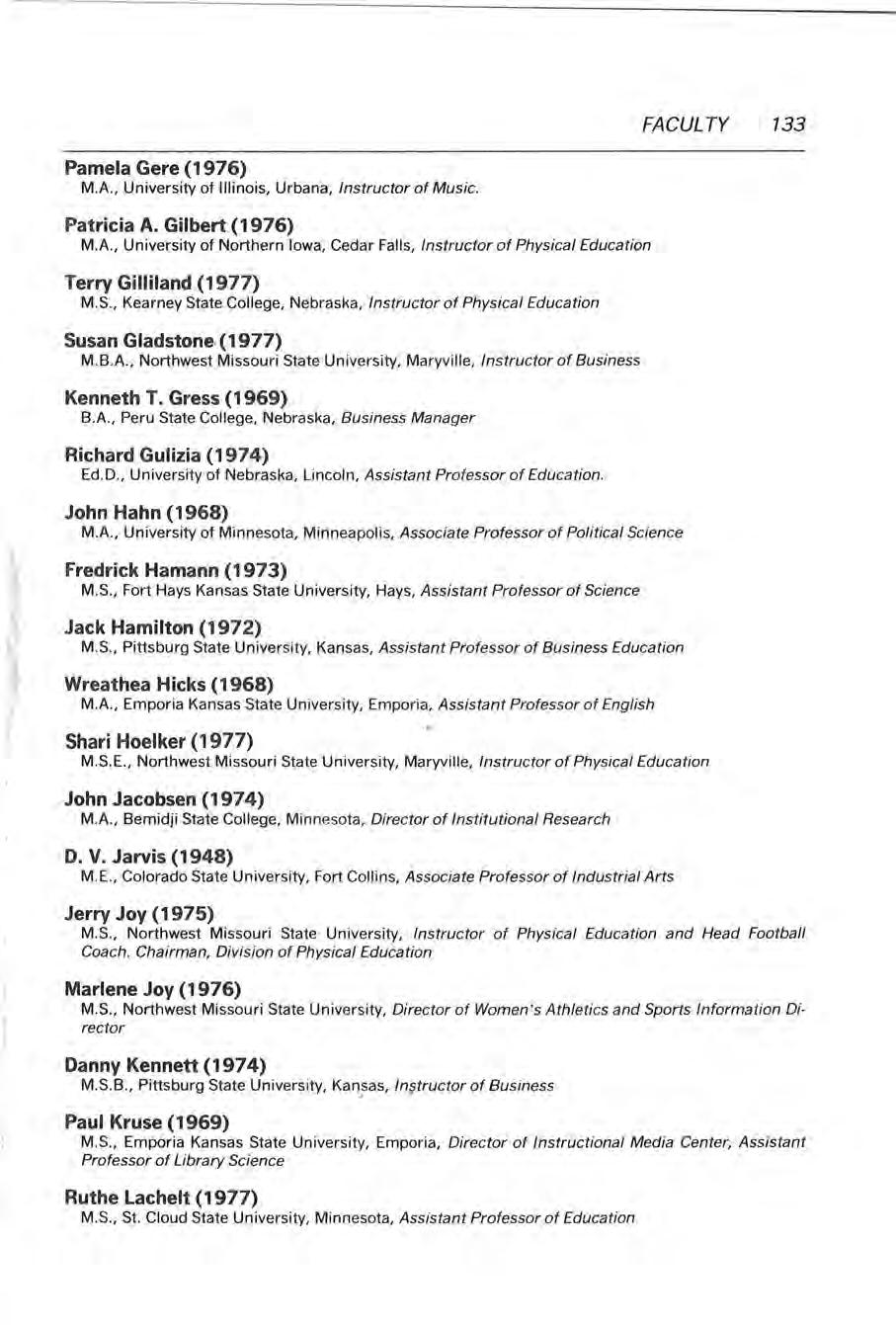
Shari Hoelker (1977)
M .S. E., Northwest Missouri State University, Maryville, Instructor of Physical Education
John Jacobsen (1974)
M .A., Bemidji State College, Minn esota, Director of Institutional Research
D. V. Jarvis (1948)
M.E ., Colorado State University, Fort Collins, Assoc iate Profes so r of Indu s trial Arts
Jerry Joy (1975)
M.S., Northwest Missouri State University , Instructor of Physical Education and Head Football Coach. Chairman, Division of Physical Education
Marlene Joy (1976)
M S., Northwest Missouri State University, Director of Women's Athletics and Sports Information Director
Danny Kennett (1974)
M.S.B ., Pittsburg State University, Kan,s~s, ln §tructor of Business
Paul Kruse (1969)
M S , Emporia Kansas State University, Emporia, Director of Instructional Media Center, Assistant Profe sso r of Library Scien ce
Ruthe Lachelt (1977)
M S., St. Cloud State University, Minnesota, Assistant Professor of Education
FACULTY 133
Mike Land (1976)
Ph.D., Texas A & M, College Station, Associate Professor of Education, Chairman , Division of Education
Robert Lewellen (1972)
M.S., Northwest Missouri State University, Maryville, Assistant Professor of Business Administration
Kelly Liewer (1968)
Ed.D ., University of Nebraska, Lincoln, Registrar
Daryl C. Long (1967)
Ph.D ., University of Nebraska, Lincoln, Associate Professor of Science
Sharon Mccaslin (1971)
M.l., Emporia Kansas State University , Emporia, Assistant Librarian
Stanley Mccaslin (1971)
M.S , California Institute of Technology, Pasadena, Director of Data Processing
Lyle C. McKercher (1959)
M.S., University of Iowa, Iowa City, Associate Professor of Mathematics

Michael McKibbin (1975)
M.S ., University of Wisconsin - Stout, Instructor of Industrial Arts .
Donald Miller (1969)
M.S., Kansas State University, Manhattan, Director of Financial Aid, In structor of Educational Psychology
Virginia Miller (1970)
B.S ., Peru State College, Nebraska, College Nµrse
Richard Muth (1977)
Ed.D., University of South Dakota, Vermillion , Director of Admissions
Robert Pettit (1977)
M.S., State University College, Oswego, New York, In structor of Indu strial Arts
David Pippert (1977)
Ph.D., University of Wyoming, Laramie, Associate Professor and Chairman of Division of Natural Science
Ervin R. Pitts (1964)
Ed.D., University of Missouri, Columbia, Head Golf Coach , Profe sso r of Health and Physical Education
Paul D. Read (1976)
M.S ., Northwest Missouri State, Kirksville, In structor of Physical Education
Anthony Rizzi (1977)
Ph.D., Purdue University, Indiana, As:;i?tant.Professor of Busines s
Lester Russell (1956)
Ed.D., University of Nebraska, Lincoln, Professor of Industrial Arts, Chairman, Division of Applied Arts
George Schottenhamel (1957)
Ph . D., University of Illinois, Urbana, Professor of History and Social Sciences
134 FA9ULTY
Donald Schulze (1977)
M.S. Emporia Kansas University, Emporia, Director of Placement
Leland H. Sherwood (1963)
Ed.D. , Indiana University, Bloomington, Professor of Art, Chairman, Division of Performing Arts
Patti Spare (1977)
M.L.S., Emporia Kansas State University, Emporia, Reference Librarian
Michael 0. Stewart (1974)
Ph.D., Kansas State University, Manhattan, Vice-President for Administration
Larry Tangeman (1977)
Ed.D., University of Colorado, Boulder, President
Evan Van Zant (1961)
M.A , University of Nebraska, Lincoln, Associate Professor of Education
Scott J. Williams (1966)
M A., Arizona State University, Tempe, Assistant Professor of Geography
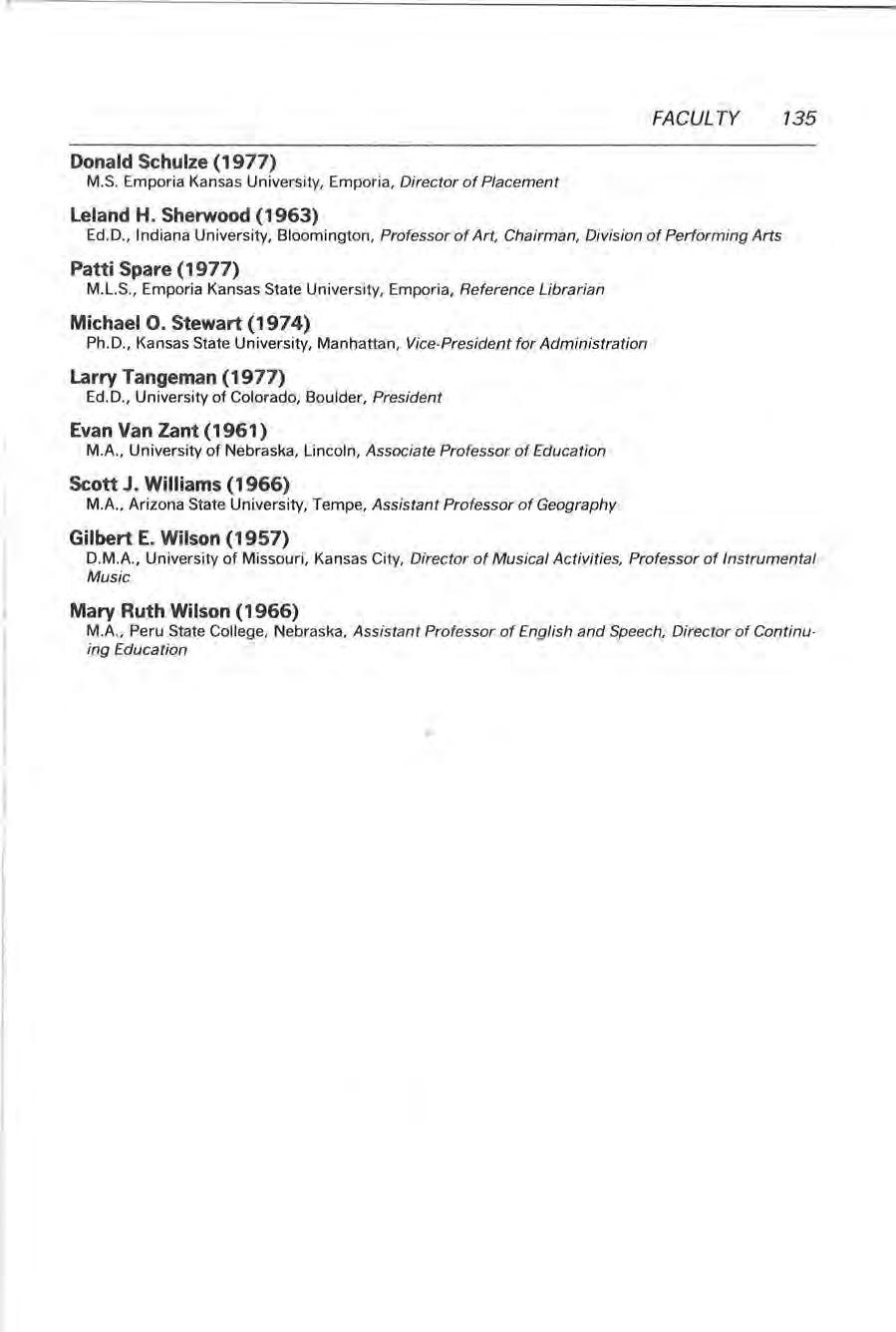
Gilbert E. Wilson (1957)
D.M .A., University of Missouri, Kansas City, Director of Musical Activities, Professor of Instrumental Music
Mary Ruth Wilson (1966)
M.A., Peru State College, Nebraska, Assis tant Professor of English and Speech, Director of Continuing Education
FACULTY 135
Faculty Emeriti
PHYLLIS DAVIDSON (1929 - 1957) . .. . ... .. ......... ... . ....... .. .. ..... Professor of Women's Physical Education
EDNA WEARE (1929 - 1957) Professor of Home Economics
L. B MATHEWS (1927 - 1961) Professor of Physics
MARY CLARKE (1951 - 1964) ... . ... .. .. . .... ..... ........ ... . .. .. ....... Professor of Education
ALFRED G. WHEELER (1938· 1965) Professor of Health and Physical Education
HAROLD 0. BORASS ( 1951-1966) Professor of Education Psychology

ROBERT D. MOORE (1937 • 1970) ... ... ..... . .. .. ....... Professor of English and Speech
ALMA ASHLEY (1946 - 1970) Professor of Elementary Education
FRIEDA D ROWOLDT (1952-1970) Professor of Business Education
HANFORD MILLER (1947-1971 ) .................. ...... ... .... ... .. ... Professor of Chemistry
HAROLD JOHNSON 1951-1972) .... .................................. Professor of Education
SILAS SUMMERS (1960 - 1972) .. .. ....... . ........................... ..... . Professor of English
JOHN C CHRIST (1947-1973) Professor of Biology
LUCY HOVEY ( 1967 - 1973) Professor of Home Economics
NEAL S. GOMON (1950 - 1973) ..... .... ....... .......... ...... .......... .. ......... ......... President
LOUISE KR EGEL (1957 - 1974) Assistant Professor of Home Economics
JUANITA BRADLEY (1956-1976) Associate Professor of Education
136 FACULTY
Official Committees
COLLEGE AFFAIRS COUNCIL
The Council is the representative of the professional staff of the College and is concerned with the general welfare of the professional staff and the students. It establishes and revises all policies related to the internal affairs of the college .
ACADEMIC AFFAIRS COMMISSION
The Commission carries on a continuous study of the instructional program and recommends policy to the College Affairs Council. It is concerned with interschool and interdepartmental coordination and relationships. The various instructional programs are evaluated in terms of accrediting standards and guidelines of national academic association. It evaluates the work and responsibility of its various committees.
INSTITUTIONAL RELATIONS COMMITTEE
The Committee works on a continuing basis for the enhancement of the public image of Peru State College. All public relations related matters are a concern of this Committee.
LIBRARY COMMITTEE
The Committee reports regularly to the Academic Affairs Commission and recommends policy to the Commission. 1t •serves in a liaision capacity between the Library and the faculty-student bodies. It advises in regard to the administration of the policies and regulations related to the Library, and makes suggestions regarding the services, the budget, purchases, allocation of funds, accreditation standards, and over -a ll needs.
TEACHER EDUCATION COMMITTEE
The Teacher Education Committee explores and identifies areas needing policy statements. Since the responsibility of the Committee is chiefly in academic affairs, the Commission on Academic Affairs is advised of all recommendations that will be made to the College Affairs Council. It formulates these policies and recommends them to the College Affairs Council. The Committee is authorized to delegate some of its responsibilities, such as Admission to Teacher Education, to a subcommittee .
STUDENT AFFAIRS COMMISSION
The Commission recommends policy to the College Affairs Council. It interprets the philosophy and policy to students, faculty, parents, and the public It provides for the centralized administration and coordination of all student personnel functions. The Commission serves as an appeal of hearing body on decisions related to non-academic matters of the student. The Commission shall advise the Director

OFFICIAL COMMITTEES 137
138 COOPERATING SCHOOLS
of Financial Aid, as he requests, in the administration of Financia l Aids and awards scho larship s which are available.
FACULTY ASSOCIATION
The membership of the committee representing the Faculty Association consi sts of the Executive Committee of the Association. The Chairman of the Executive Council is the chairman of this committee. The Committee concerns itself with both academic and personnel matters of the faculty and reports to either the Academic Affairs Commission or the College Affairs Council. The Faculty Association has the responsibility of assisting with the orientation of new faculty members, and assisting in the evaluation of objectives, policies, and with the professional growth and development of faculty members.
COOPERATING SCHOOLS in The Student Teaching Program
1977-1978
Auburn Albert C. Austin, Superintendent
Principal: Marvin H. Gerdes
Beatrice .................. .. .......................................... Robert Cothren, Superintendent
Assistant Superintendent: W. A. Schlichting
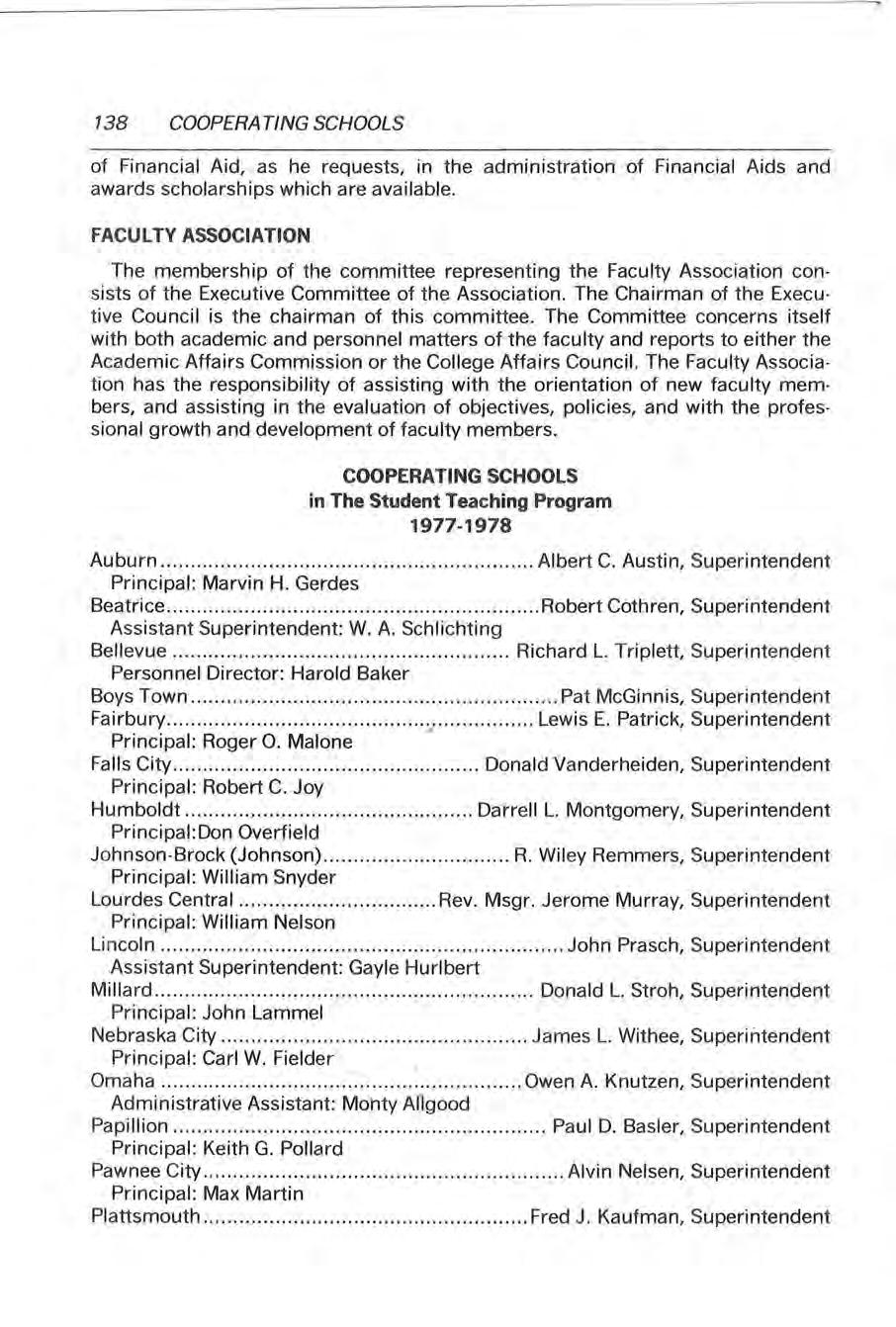
Bellevue .................... ........................ .. ....... . .. Richard L. Tr iplett, Super intendent
Personnel Director: Harold Baker
Boys Town Pat McGinnis, Superintendent
Fairbury Lewis E. Patrick, Superintendent
Principal: Roger 0. Malone • Falls City
Principal: Robert C. Joy
Donald Vanderheiden, Super intendent
Humboldt Darrell L. Montgomery, Superintendent
Principal:Don Overfield
Johnson-Brock (Johnson) .. . ..... .. .. .. ..... . ........ .. . R. Wiley Remmers, Superintendent
Principal: William Sn yder
Lourdes Central ..... .. .. ........ .. .... ..... ..... Rev. Msgr. Jerome Murray, Superintendent
Principal: William Nelson
Lincoln John Prasch, Superintendent
Assistant Super intendent: Gayle Hurlbert
Millard Donald L. Stroh, Superintendent
Pr incipal: John Lammel
Nebraska City ... .... . .............................. . .. . .. . .. . ... James L. Withee, Superintendent
Principal: Carl W. Fielder
Omaha : : : Owen A. Knutzen, Superintendent
Administrative Assistant: Mohty Allgood
Papi llion ..... ............................................ ........ .. .. . Paul D. Basler, Superintendent
Principal: Keith G. Pollard
Pawnee City .... .............. .... .. ............... ......... . ... ........ Alvin Nelsen, Superintendent
Principal: Max Martin
Plattsmouth Fred J. Kaufman, Superintendent
... .. ..
. .......
.. ..... .
............................
Pr incipal: John J. Beck, Jr.
Ra lston . .... .... .............. ... ...... . .. ... ...... ....... .. .. ... .. . Jerry Kleinsmith, Super intendent
Principal: Lonnie Bernth
Southeast Nebraska ( Ste lla)
Principal: William Jenkins
Spr ingfield ( Plattev iew)
Principal: Louis V. Dambrosia
Dwain Myers, Superintendent
Oscar Mussman, Super intendent
Syracuse-Dunbar-Avoca (Syracuse) ... ... .................... Ed Johnson, Superintend en t
Principal: John Rhodus
Tecumseh Paul Heller, Superintendent
Principal: Dean Stewart
Westside (Omaha)
Assistant Super intendent: William Hoyt
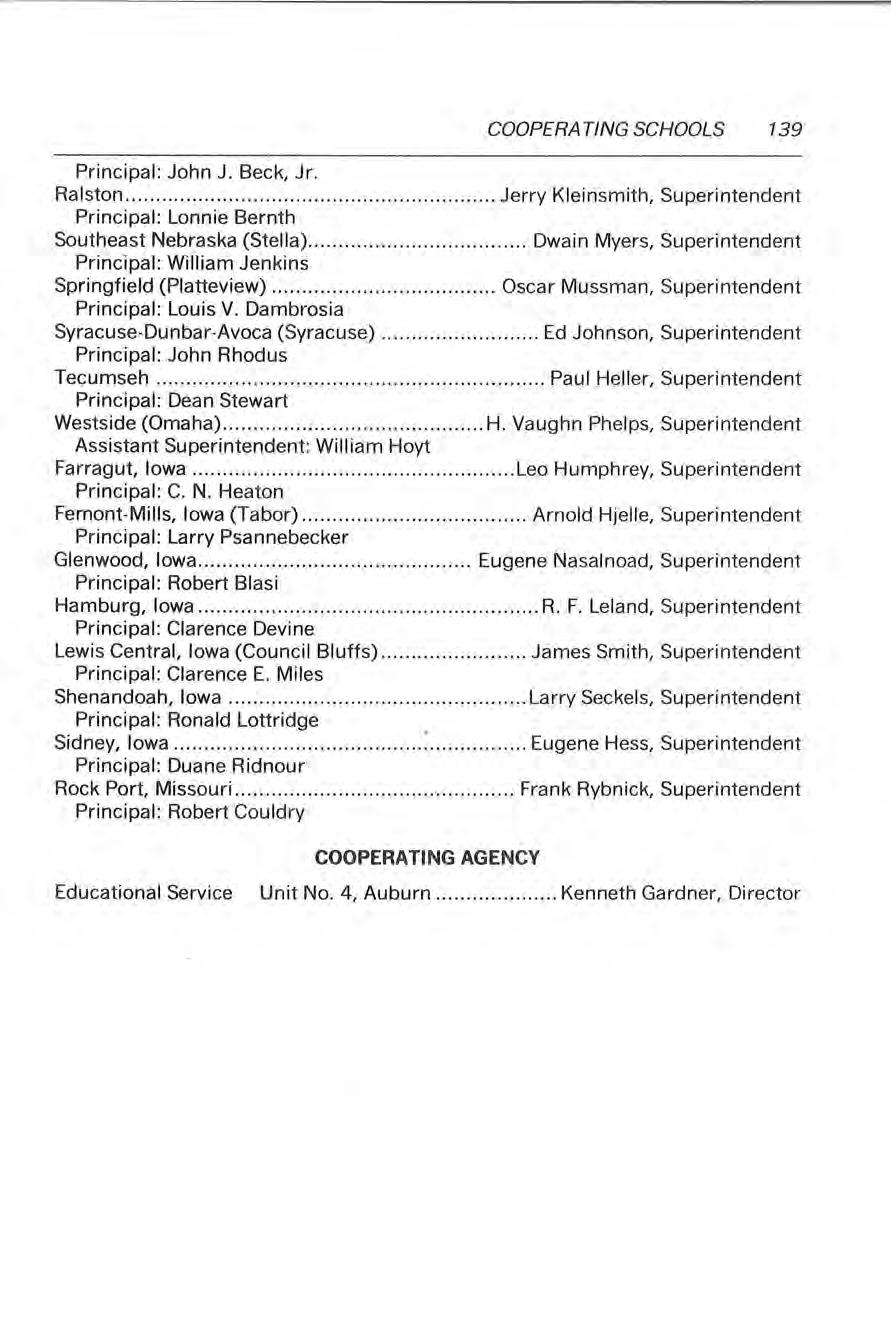
H. Vaughn Phelps, Super intendent
Farragut, Iowa .................... .. ............. . .... .. ........ ...
Principal : C. N . Heaton
Leo Humphrey, Superintendent
Femont-Mills, Iowa (Tabor) .......... .......... .................
Principal: Larry Psannebecker
Glenwood, Iowa
Principal: Robert Blasi
Arnold Hjelle, Superintend ent
Eugene Nasalnoad, Superintendent
Hamburg, Iowa ........................ .. ..... .. .......... ..... ... ... .. R. F. Leland, Super intendent
Principal: Clarence Devine
Lewis Ce ntral, Iowa (Council Bluffs) ........................
Principal: Clarence E. Miles
Shenandoah, Iowa .................................................
Principal : Ronald Lottridge
Sidney, Iowa
Princ ip al : Duane Ridnour
Rock Port, Missouri
Principal: Robert Cou ldry
James Smith, Superintendent
Larry Seckels, Super intendent
Eugene Hess, Super intendent
Frank Rybnick, Superintendent
COOPERATING AGENCY
Educationa l Service Unit No. 4, Auburn .................... Kenneth Gardner, Director
COOPERATING SCHOOLS 139
140 COOPERATING SCHOOLS
1978-79 CALENDAR
FALL SEMESTER - 1978
AUGUST 26 Faculty Meeting (Saturday)
27 Freshman We lcome and Orientation
28-29 Orientation - Reg i stration - Late registration
after this date
SEPTEMBER
OCTOBER
30 4 6-11 8 29 7 25
Classes Begin
Labor Day (no classes)
Payment of Tuition and Fees
Final Date for Adding Full Semester Course(s)
App li cations due for mid year Certificat ion of Completion
HOMECOMING
End of First Half of Semester
NSEA Convention (classes dismissed 5:00 pmOctober 25)

NOVEMBER
DECEMBER
11 - 15 19 21.~
Thanksgiving Recess (classes dismissed 5:00 pmNovember 22)
Night classes to be completed during this week
Final day of exams and/or classes
Semester ends
SPRING SEMESTER - 1979
JANUARY 8 -9 Registration - Late Registration after this date
10 Classes Begin
17-22 Payment of Tuition and Fees
FEBRUARY 9 Application due for May Graduation (August graduates may apply)
MARCH 9 End of First Half of Semester
19 -23 Spring Recess (classes dismissed 5:00 pm - March 16)
26 Classes Resume at 8:00 a.m.
APRIL 13-16 Easter Recess (classes dismissed 5:00 p.m.April 12)
17 Classes Resume at 8:00 a.m.
APRIL 30 -MAY 4 Night classes to be comp leted during this week
MAY 8 Final day of exams and/or classes
11 Semester Ends
12 Commencement (Saturday)
JUNE 4 Registrati9n Summer School
23-24
26-27
,).lt
Y
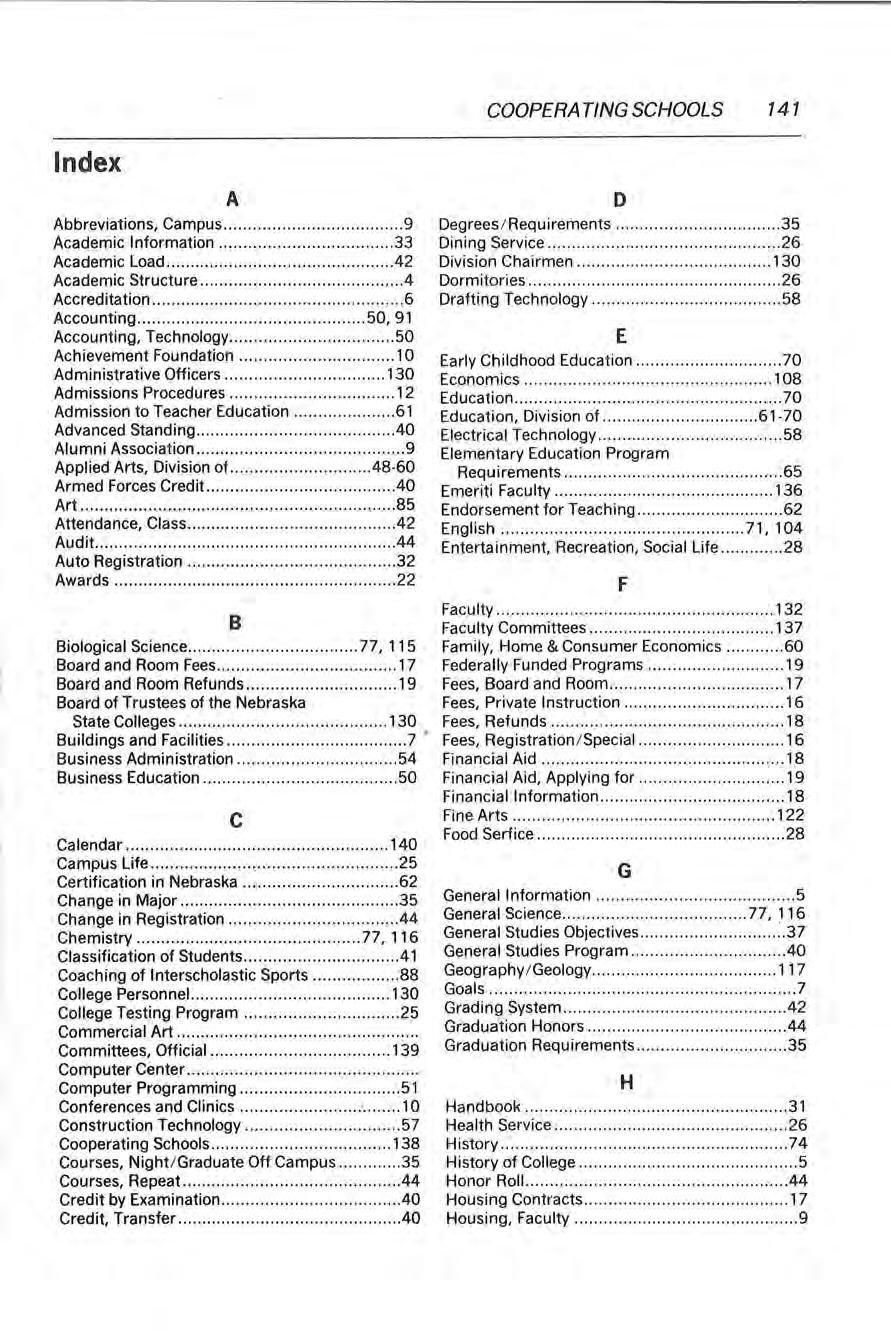
COOPERATING SCHOOLS 141 In dex A D Abbreviations, Campus ........... .......... .. .............. 9 Degrees / Requirements ......... .......... .. ............. 35 Academic Information 33 Dining Service .... .. .. .. ........ ... ... ......... ....... .... ... .26 Academic Load .42 Division Chairmen 130 Academic Structure 4 Dormitories ........ ............ ......... . .. ...... ... ... .... . .. .26 Accreditation 6 Drafting Technology 58 Accounting 50, 91 Accounting, Technology ... .. .... ..... .... ................ 50 E Achievement Foundation 10 Administrative Officers 130 Early Childhood Education 70 Economics 108 Admissions Procedures .... ... . .. ........ .. .... .......... 12 Education 70 Admission to Teacher Education ... .. .. .... ... ....... 61 Advanced Standing 40 Alumni Association 9 Applied Arts, Division of .48·60 Armed Force s Credit .......... ....... .... .. ..... ........... 40 Art 85 Attendance, Class 42 Audit. 44 Auto Registration 32 Education, Division of 61 •70 Electrical Technology 58 Elementary Education Program Requirements 65 Emeriti Faculty 136 Endorsement for Teaching 62 English 71, 104 Entertainment, Recreation, Social Life 28 Awards 22 F B Faculty 132 Faculty Committees 137 Biological Science 77, 115 Family, Home & Consumer Economics 60 Board and Room Fees 17 Federally Funded Programs 19 Board and Room Refunds 19 Fees, Board and Room 17 Board of Trustees of the Nebraska Fees, Private Instruction 16 State Colleges 130 Buildings and Facilities 7 • Fees, Refunds 18 Fees, Registration / Special 16 Business Administration 54 Financial Aid 18 Business Education ...... .......... ...... ..... ... .... ... ...50 Financial Aid, Applying for 19 Financial lnformation ............. ..... ...... ........... ... 18 C Calendar 140 Fine Arts 122 Food Serf ice 28 Campus Life ... ... .. ....... .. .. .-.. . .. .......... . ............... 25 Certification in Nebraska 62 G Change in Major 35 Change in Registration .............. ............. ........ 44 Chemistry 77, 116 Classification of Students .41 Coaching of Interscholastic ~ports 88 College Personnel. 130 College Testing Program 25 Commercial Art ...... .. .... . .. ... ........ ......... ............ .. . Committees, Official 139 General Information ... .. .. ......... .... .. . ....... . .. ..... ... 5 General Science 77, 116 General Studies Objectives :. 37 General Studies Program .... .... . ............ .. ... .. .... 40 Geography / Geology 117 Goals .7 Grading System 42 Graduation Honors 44 Graduation Requirements ..... ............ .... .......... 35 Computer Center , , Computer Programming ............. .. ....... .:. .. ...... 51 H Conferences and Clinics .. . .. .... ..... ......... . .'.. .... .. 10 Handbook ... .... ... .... ....... ...... .......... .... .... .. .. ..... 31 Construction Technology 57 Health Service 26 Cooperating Schools 138 History 74 Courses, Night/Graduate Off Campus .. .... ... .. .. 35 History of College 5 Courses, Repeat .... .. .... . .. ............. ................... 44 Honor Roll. 44 Credit by Examination 40 Housing Contracts 17 Credit, Transfer .40 Housing, Faculty 9
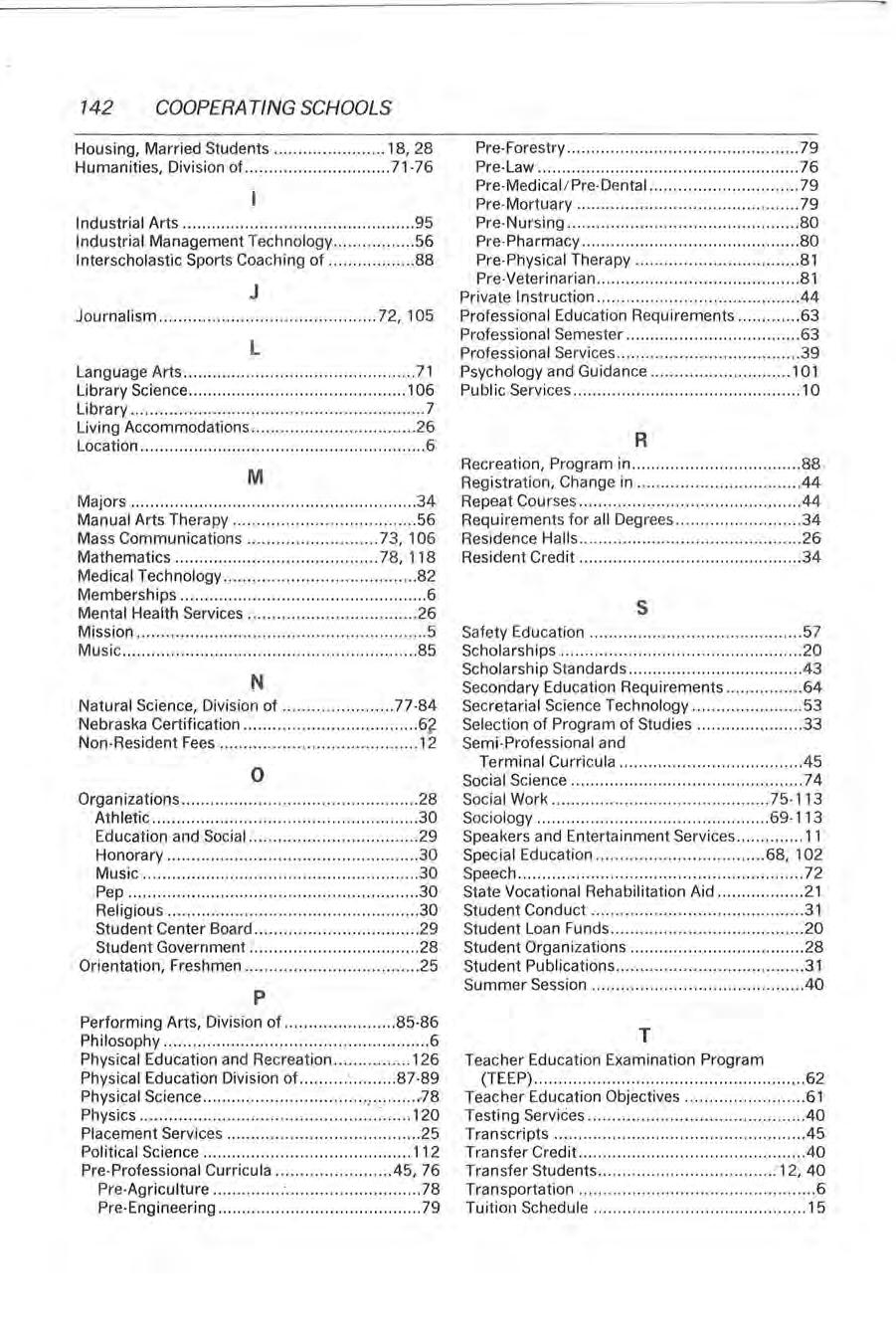
142 COOPERATING SCHOOLS Housing, Married Students 18, 28 Pre-Forestry 79 Humanities , Division of.. 71-76 Pre•Law 76 Pre •Medical / Pre•Dental 79 Pre-Mortuary ...... ............... . .. ..... ... ...... .. .... .. 79 Industrial Arts 95 Pre -Nursing .. .. . .. ............... ........... .... ........... 80 Industrial Management Techno logy 56 Pre Pharmacy 80 Interscho lastic Sports Coaching of 88 Pre-Physical Therapy 81 J Pre Veterinarian 81 Private Instruction 44 Journalism ...... .... ... .. .... .. .......... .... .. .. ...... 72, 105 Professional Education Requirements 63 L Professiona l Semester 63 Professional Services 39 Language Arts 71 Psychology and Guidance 101 Library Science ....... ........ ... .. .... .... ...... . ...... .... 106 Public Service s 10 Library ..... .. ...... .. .... .......................................... 7 Living Accommodation s 26 Location 6 R M Recreation, Program in 88 Registration, Change in .44 Majors 34 Repeat Courses .44 Manual Arts Therapy 56 Requirement s for all Degre es 34 Mas s Commun ic ations ...... ..... .. ......... ..... 73, 106 Residence Halls 26 Mathematics 78, 118 Resident Credit .... ... .... ......................... ... ....... 34 Medica l Technology 82 Memberships 6 Mental Health Services 26 s Mission 5 Safety Education 5 7 Music 85 Scho larships 20 N Scho larship Standards .... .. ....................... ....... 43 Secondary Education Requirements 64 Natural Science, Division of 77 ·84 Secretaria l Sc ience Technology 53 Nebraska Certification 6f Se lect ion of Program of Studies 33 Non ·Resident Fees 12 Semi•Professional and 0 Terminal Curricu la 45 Socia l Sc ience 74 Organizations ............. ........ ... ......... ................ 28 Social Work ........ .. ....... .......... ... ... ....... ... .. 75• 113 Athletic 30 Sociology 69· l 13 Education and Soc ial 29 Speakers and Entertainment Services 11 Honorary ...... ......... ... ...... .. .... .. ........ . ..... ...... 30 Special Education 68, 102 Music ...... ... ..... ...................... ...... ....... ........ 30 Speech 72 Pep 30 State Vocational Rehabilitation Aid , 21 Religious 30 Student Conduct 31 Student Center Board ........ . .. .......... . .. .......... 29 Student Loan Funds 20 Student Government ....... ............... ............. 28 Student Organi zat ions 28 Orientat ion, Freshmen 25 Student Publications 31 p Summer Ses sion .40 Performing Arts, Division of 85·86 Philosophy 6 T Physical Education and Recreation 126 Teacher Education Examination Program Physical Education Division of '. : 87-89 (TEEP) 62 Phys ic al Science , ,78 Teacher Education Objectives 61 Physics : 120 Testing Services ......................... ................... .40 Placem ent Services 25 Transcripts .45 Political Science 112 Transfer Credit 40 Pre -Professional Curricu la .45, 76 Transfer Students 12, 40 Pre•Agricu lture : 78 Transportation 6 Pre•Engineering 79 Tuition Schedu le 15

COOPERATING SCHOOL S 143 V W Veter ans 21 Well Ch ild Conference 11 Vocational Education 55 , 98 Withdrawal from Class 45 Withdrawal from College 45
